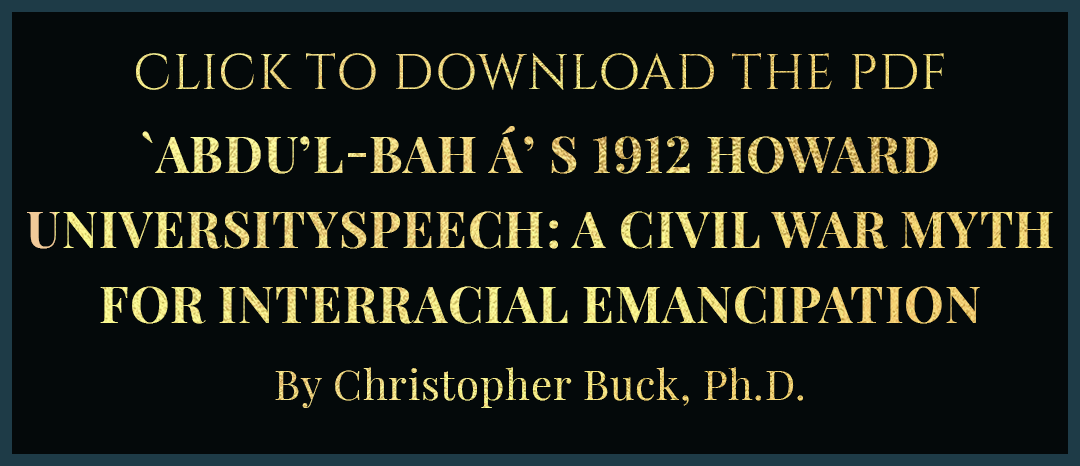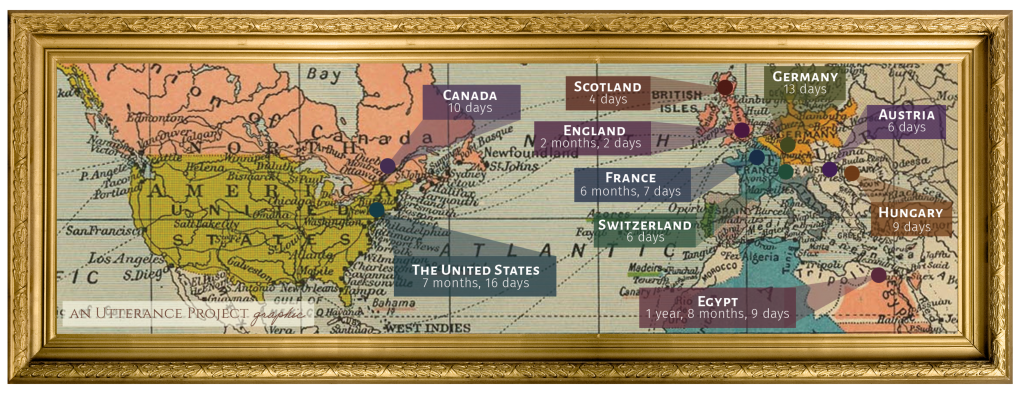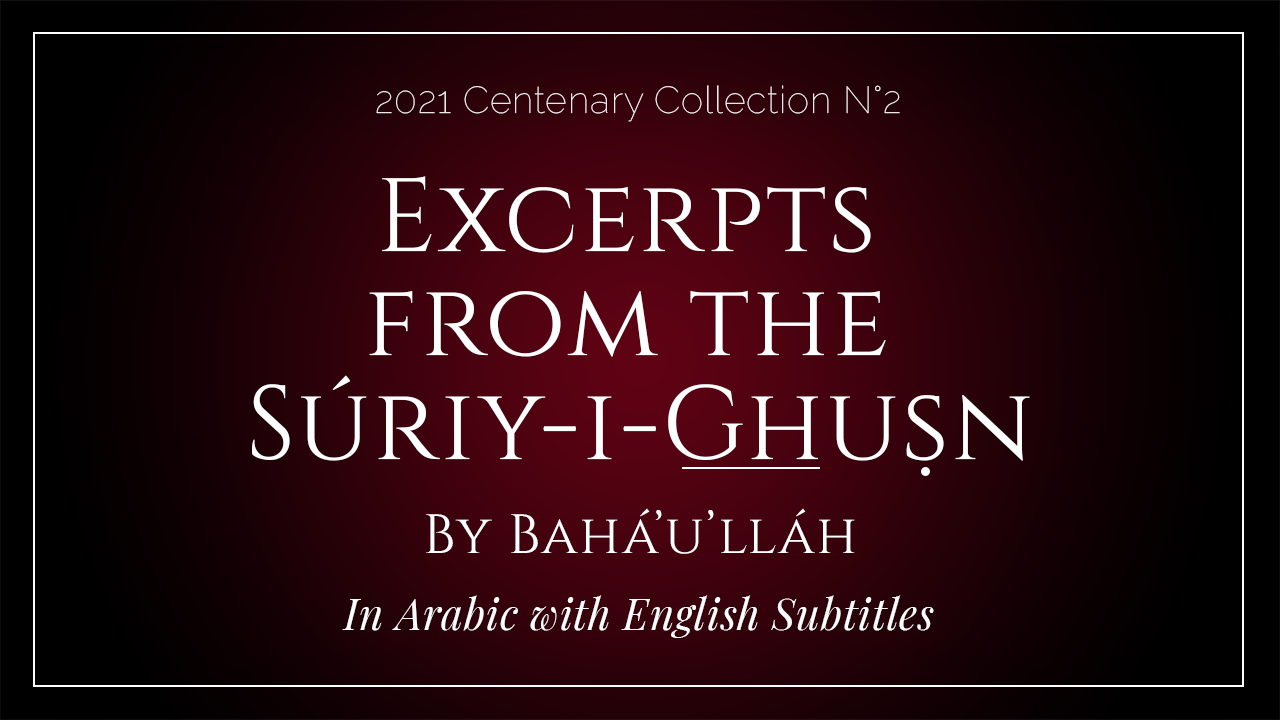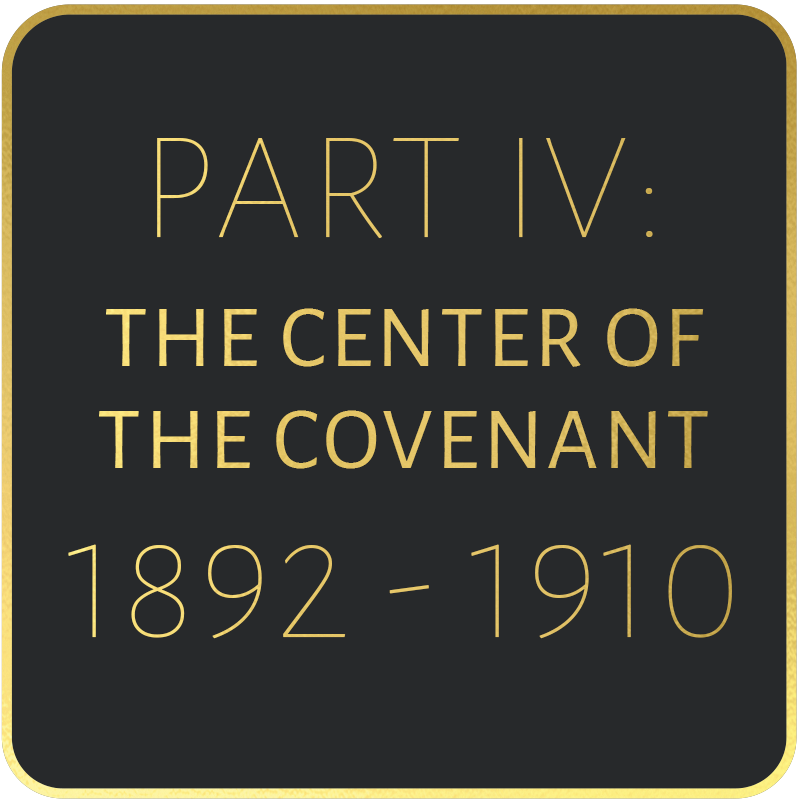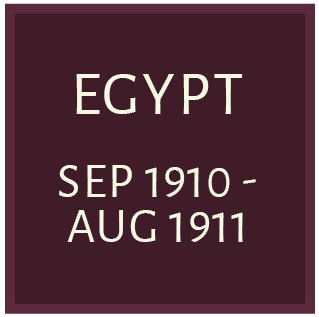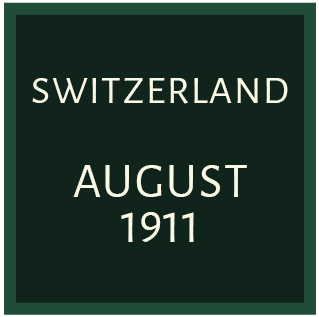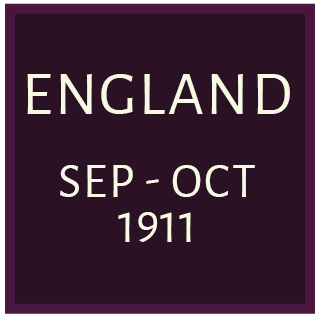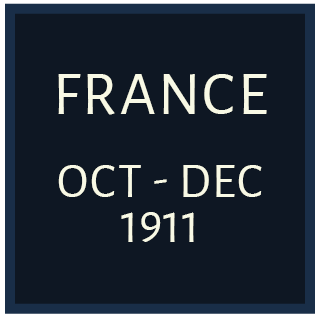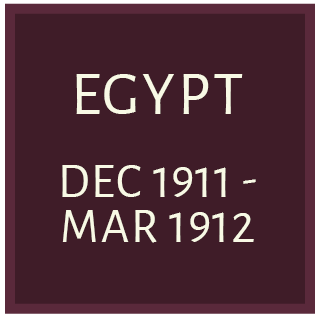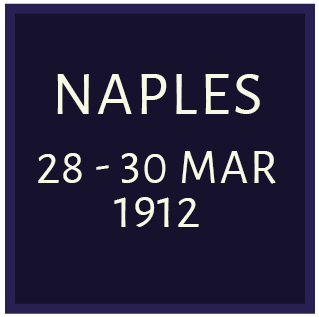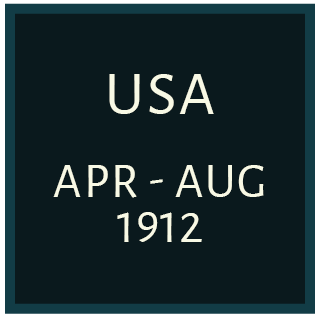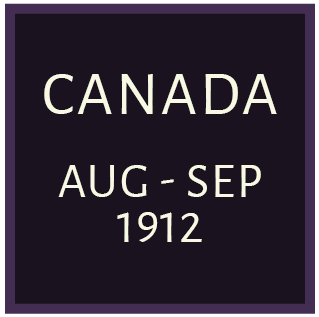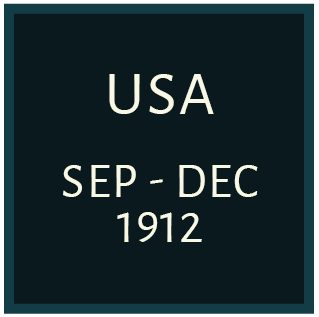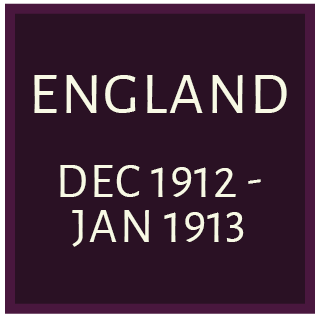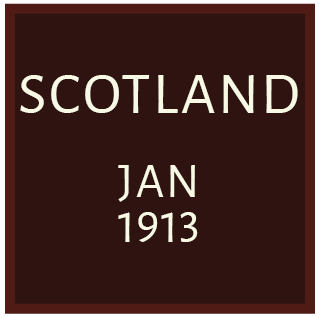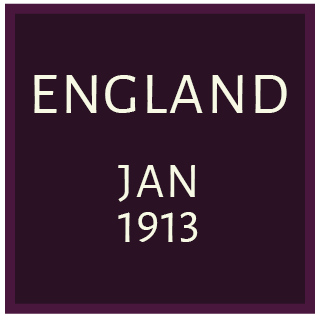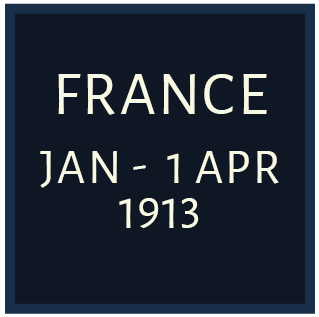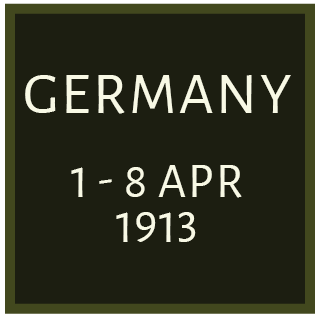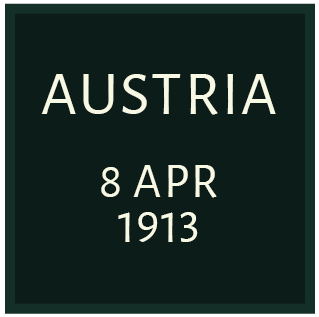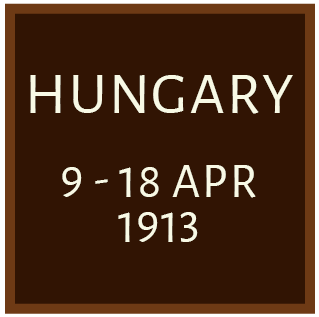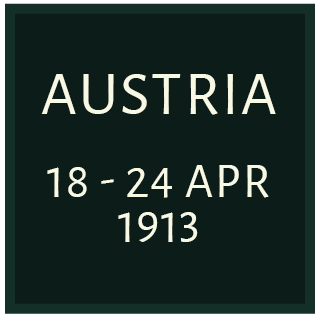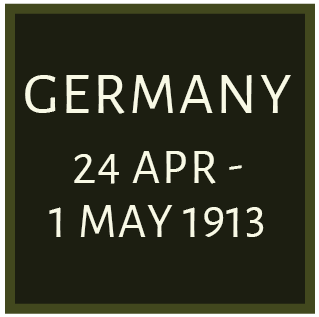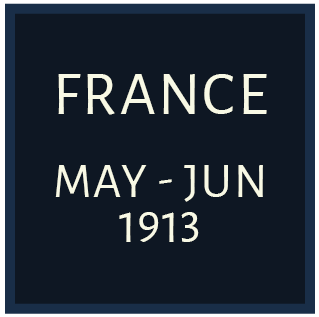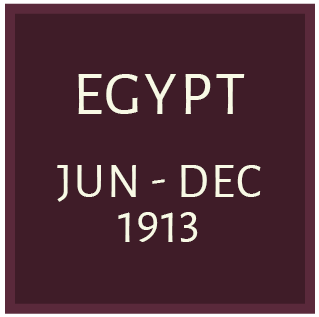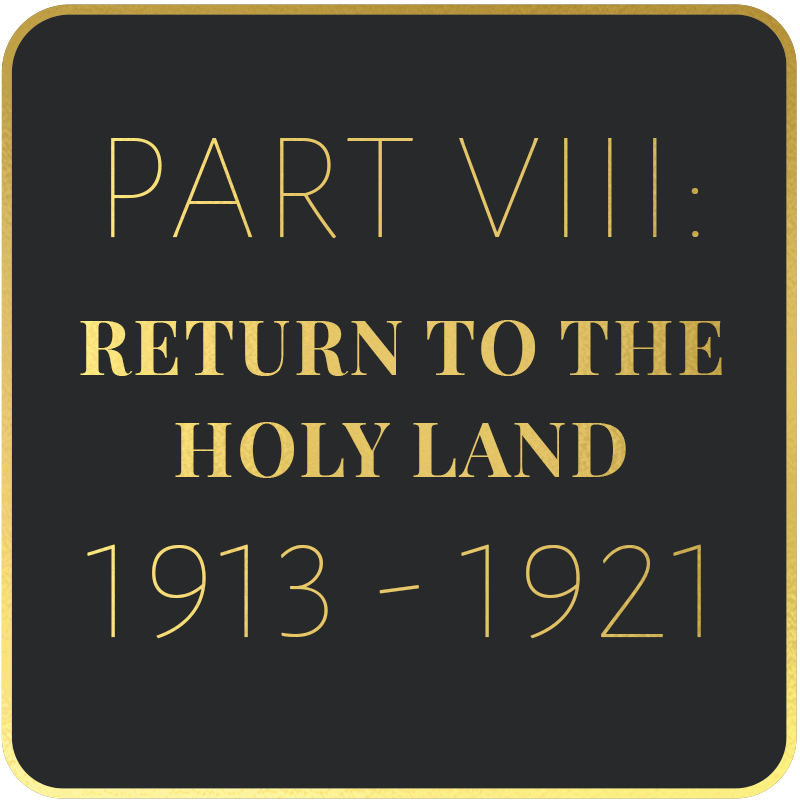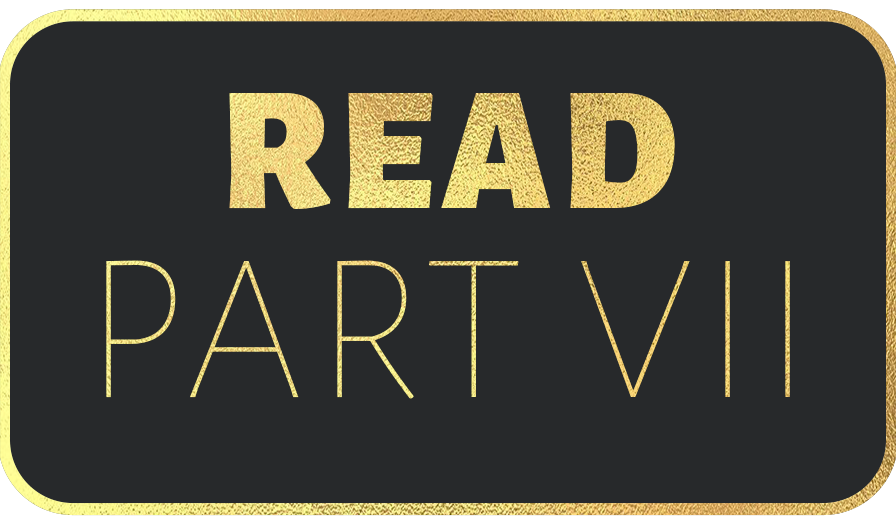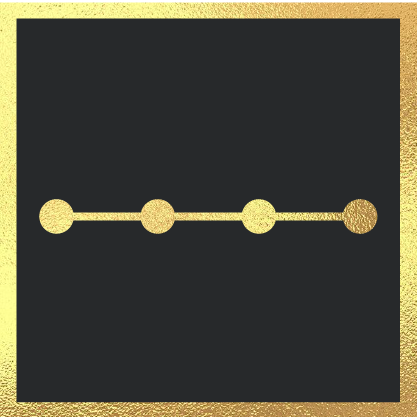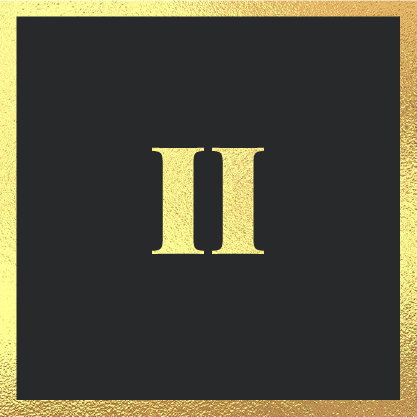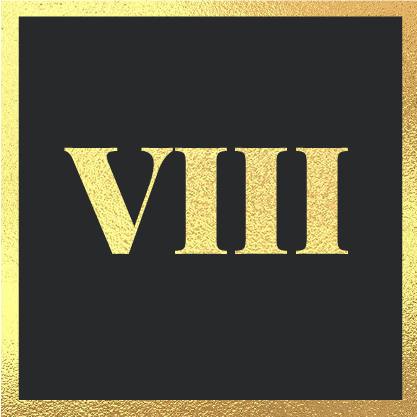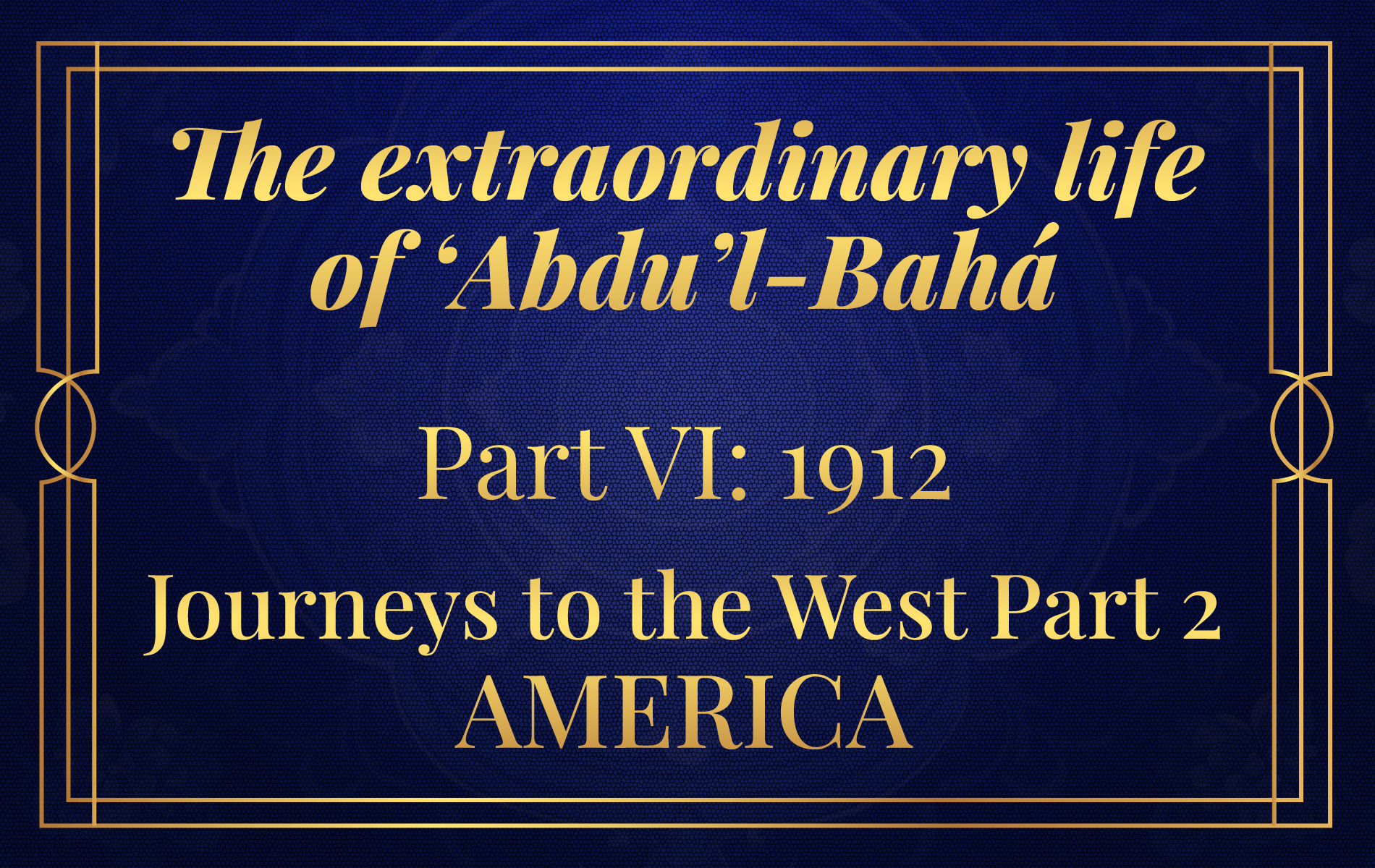
Written and illustrated by Violetta Zein
This part covers the life of ‘Abdu’l-Bahá at the age of 68 in 1912.


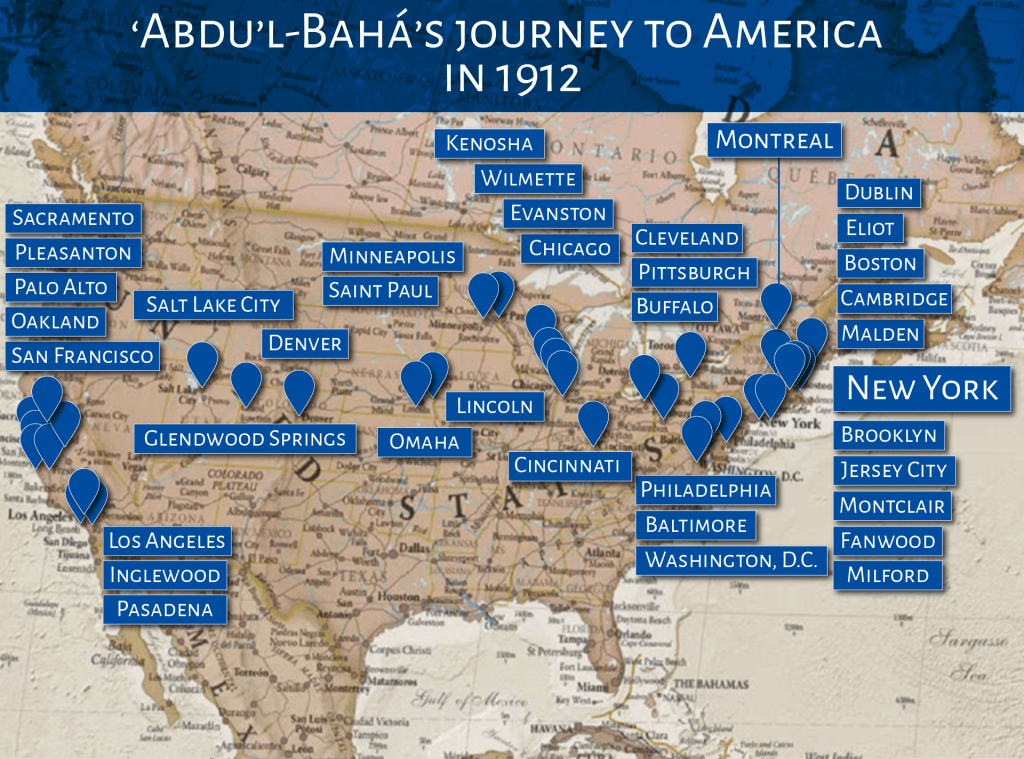
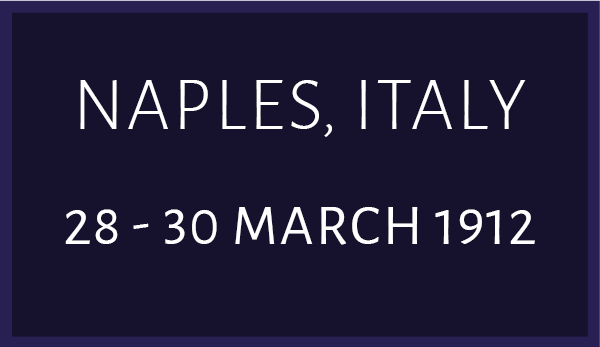
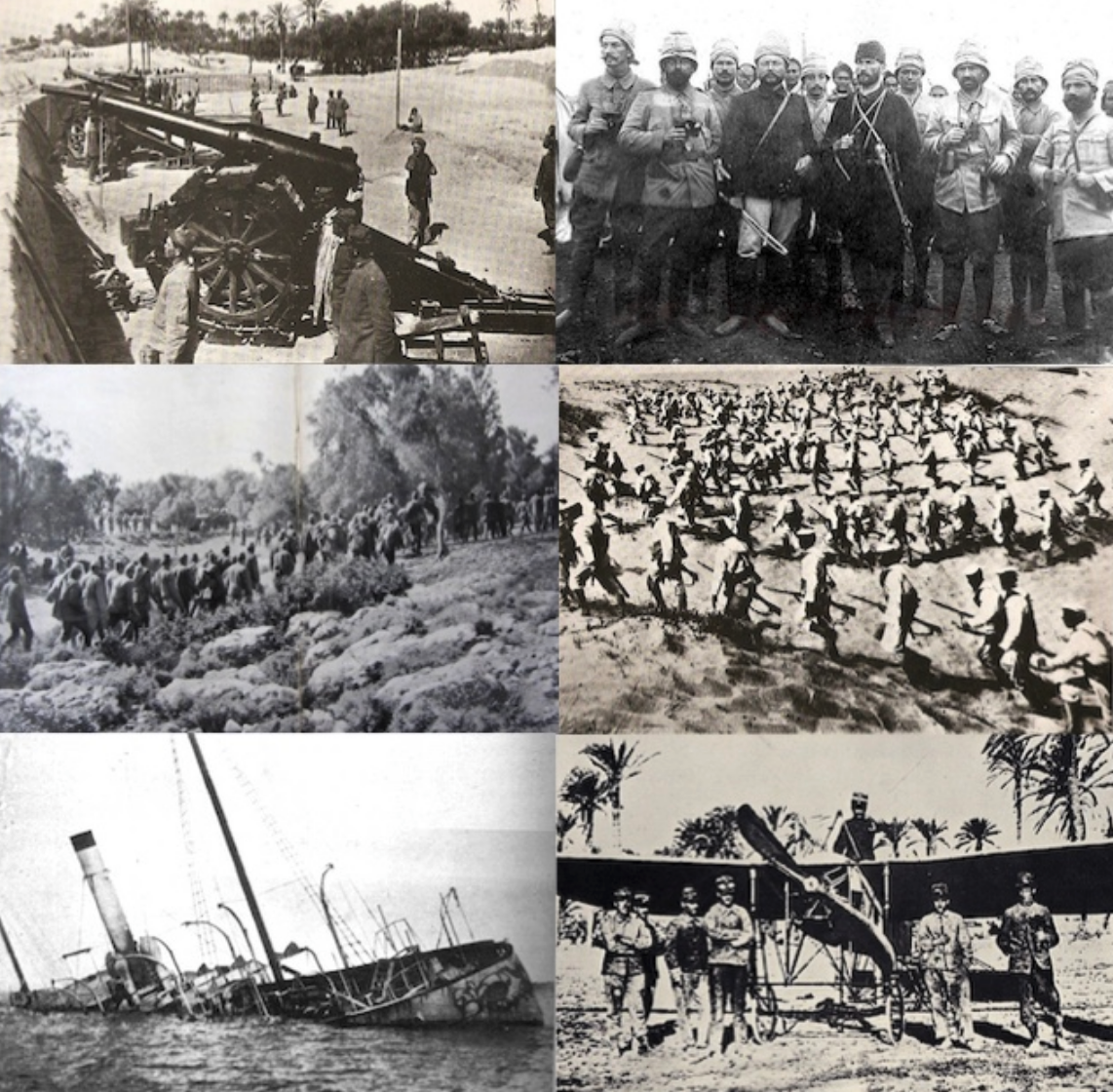
Collage of the Italo-Turkish war. Wikimedia Commons.
'Abdu'l-Bahá sees Naples, one of the largest and most important cities and ports of Italy, appear on the Horizon.
'Abdu'l-Bahá docks in Italy at a very sensitive political time in the country's history. He is dressed in Eastern garb, accompanied by friends who wear fezes, He hails from an Ottoman city, 'Akká, and arrives in the middle of the Italo-Turkish War which lasts from September 29, 1911, to October 18, 1912.
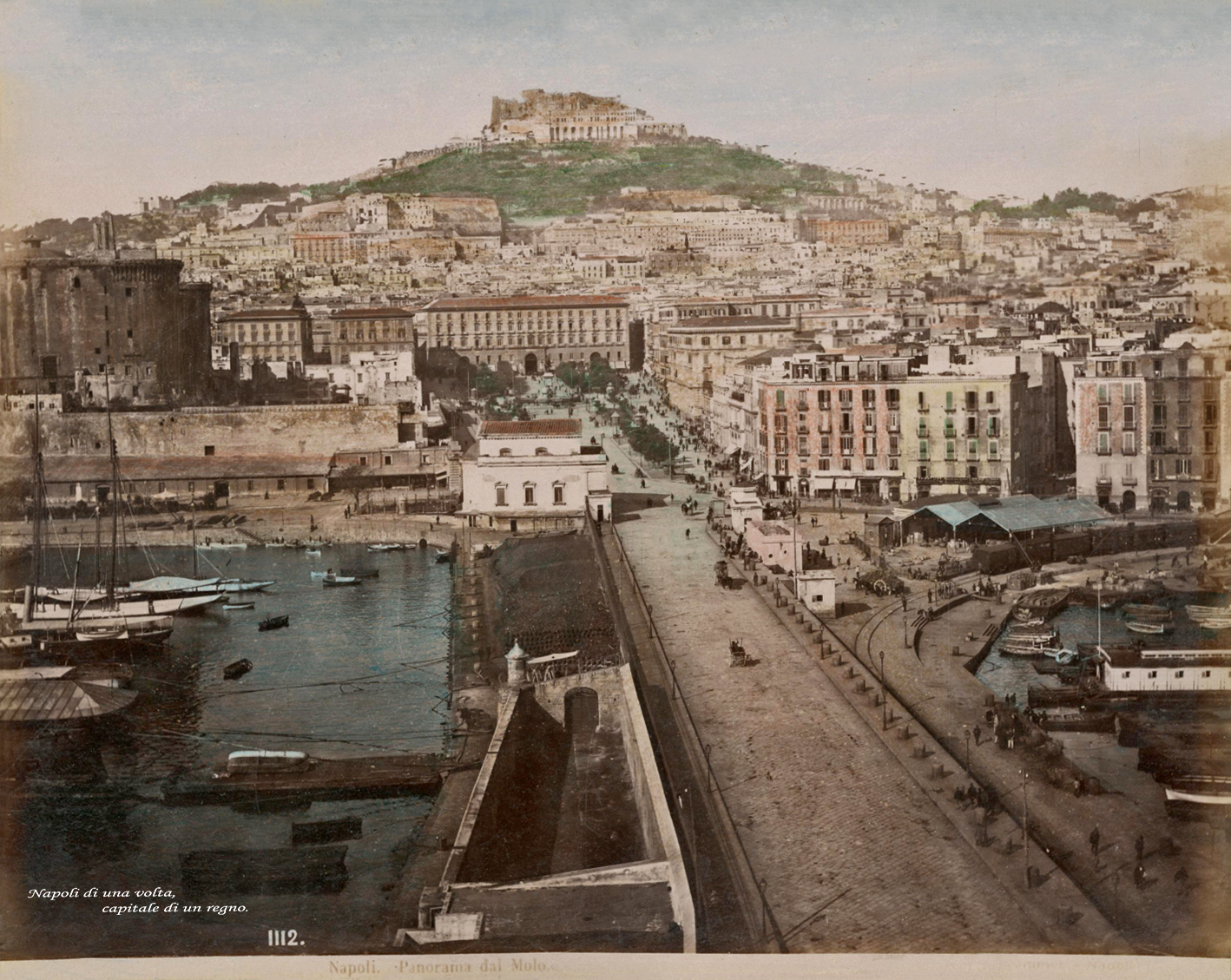
Panorama of Naples from the port, hand-colored photo by George Sommer from the end of 19th century. Napoli caitale di un regno.
The animosity between Ottomans and Italians at this time is so intense, that Ottomans in Italy or Italians in the Ottoman empire are attacked by the population. Accordingly, 'Abdu'l-Bahá is urged to stay aboard the Cedric and not disembark in Naples, for fear of inciting a violent reaction on the part of the inhabitants. 'Abdu'l-Bahá consents and stays onboard, observing the city, its gardens and buildings from the deck of the Cedric.
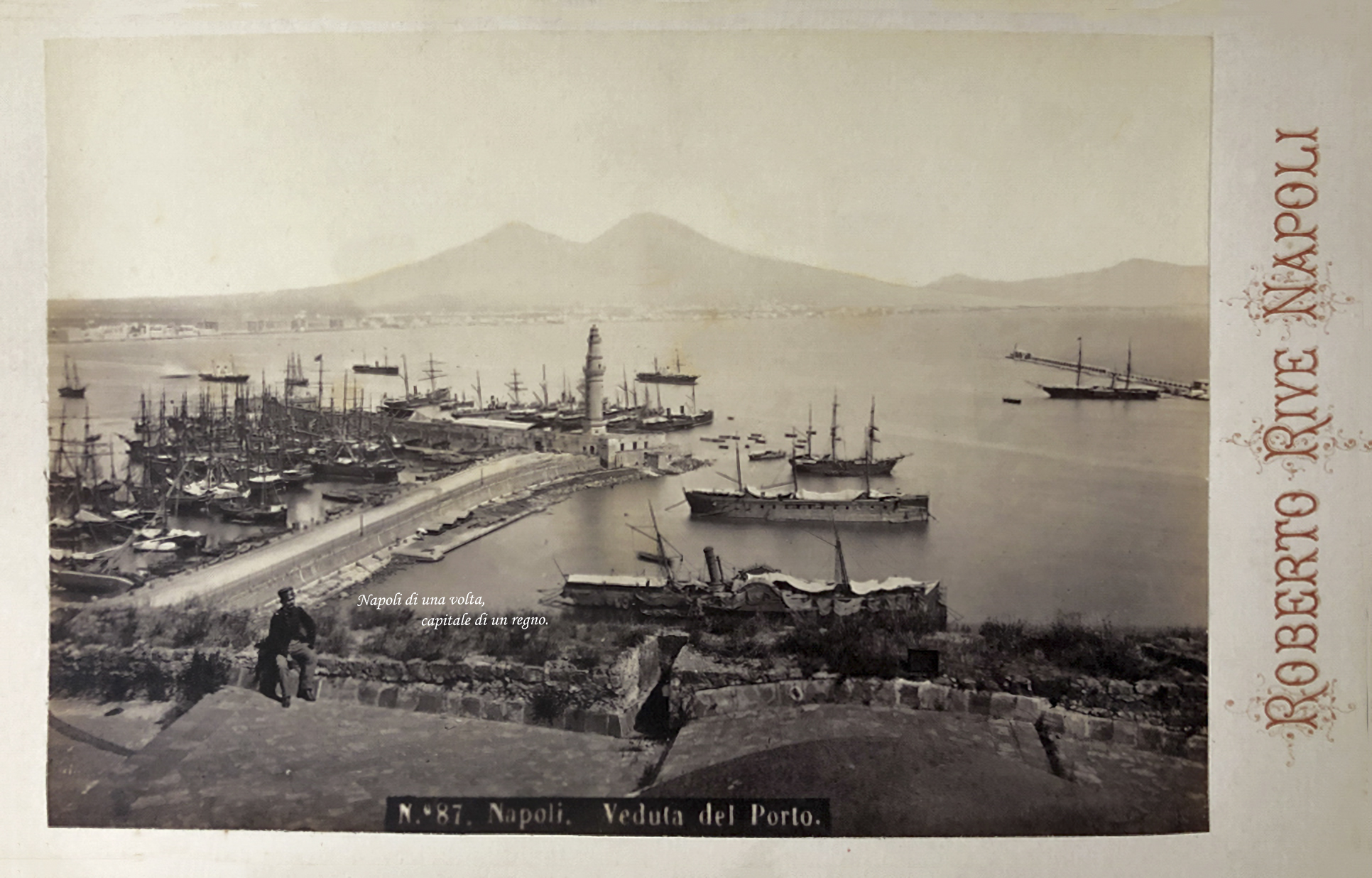
View of the Port of Naples around 1885. Napoli caitale di un regno.
At Naples, six Western Bahá'ís board the Cedric: Mr. Woodcock of Canada, his wife and daughter, Mr. and Mrs. Page of Denver, and Miss Louisa Matthew of London, Louis Gregory’s future wife.
Along with them, a group group of Italian physicians boards the ship to inspect the passengers’ eyes. The ship's doctor has already given his opinion about the infection of Áqá Khusraw's eyes, but when these physicians examine the rest of the passengers' eyes they declare that the eyes of Shoghi Effendi and Mírzá Munír-i-Zayn are also infected and they must leave the ship.
This does not happen in a vacuum. Dr. Amínu'lláh Faríd, the nephew of Munírih Khánum, has already started down an ambitious path of ego-driven family intrigues will eventually lead him to Covenant-breaking. He suggests to the Italian authorities that the Bahá’í party are Ottomans, with whom the Italians are at war. When the Italian doctors mis-diagnose Shoghi Effendi and Mírzá Munír-i-Zayn, Dr. Faríd insists they must be sent back and raises all kinds of arguments in support of the Italian doctors’ diagnosis.
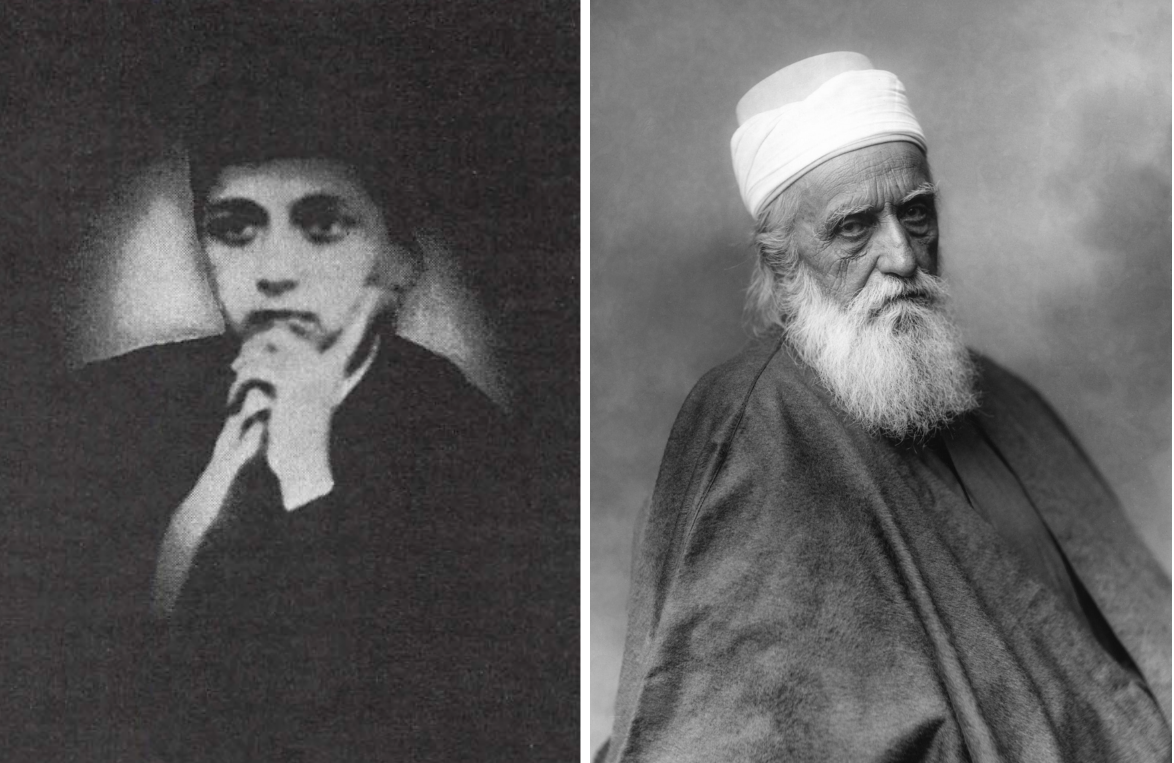
Left: Shoghi Effendi in his teenage years. The Bahá'í World Volume 13, page 82. Bahai Media. Right: ‘Abdu'l-Bahá in France in 1911. Bahá'í Media Bank
The full-day's efforts and pleadings of `Abdu'l-Bahá, His companions and the American friends are of no avail. The Italian doctors insist that if the three friends continued their journey to New York, they would be turned back from America. `Abdu'l-Bahá has no choice but to ask Shoghi Effendi, Áqá Khusráw and Mírzá Munír-i-Zayn, to obey and disembark, but not without bestowing on them His utmost kindness and blessings and bidding them farewell.
Shoghi Effendi himself attests to Ruhíyyíh Khánum that there was nothing wrong with his eyes at the time, as he had always had very strong eyes. The machinations of Dr. Farid are cruel and it is painful to imagine the heartbreak of Shoghi Effendi, a fifteen-year-old boy, about to embark on the first great adventure of his life with his beloved Grandfather, when his dreams are shattered just two days into the great voyage. In 1912, this is an extraordinary opportunity. Journeys like this are extremely rare and eventful, and Shoghi Effendi had been so excited about the large ship and his cabin, but it is not just Shoghi Effendi who is deeply affected by this episode.
'Abdu’l-Bahá is greatly grieved and saddened by the event, but stays quiet. He has to protect the secret of Shoghi Effendi’s future destiny from being revealed. Worse problems could ensue, should envious and jealous people find out Shoghi Effendi is to succeed ‘Abdu’l-Bahá, and a worse fate than being turned back from a steamship could ensue, and says "There is a wisdom in this matter which will become known later." What 'Abdu'l-Bahá says, that evening of 30 March 1912 to His friends is telling, however:
These Italians thought we were Turks and they reported us as such. They have stopped three of us. One was the secretary and one was the cook; this was not important. But this child, Shoghi Effendi, was helpless, why were they so strict with him? They have ill-treated us in this way, but I have always given support and assistance to their community whether in Alexandria or in Haifa...
'Abdu'l-Bahá quoted in the Priceless Pearl,
In Shoghi Effendi's mind, there was never any doubt that Dr. Farid prevented him from making that historic journey. When 'Abdu'l-Bahá finally arrives home in Haifa on December 5, 1913, He immediately heads to His wife Munírih Khánum's room, sits down, and gestures, in a feeble voice:
Doctor Fareed has ground me down!
'Abdu'l-Bahá, quoted in The Priceless Pearl
'Abdu'l-Bahá bestowed upon those three souls His utmost kindness and blessings and bade them farewell. With great sadness and dejection they left the ship. The Master's heart was broken and all of the companions were very sad. `Abdu'l-Bahá said, Much of His time that day was spent on this issue until the steamer left Naples for New York in the afternoon.
We have a letter written by Shoghi Effendi about six months later to one of the secretaries of 'Abdu'l-Bahá in America telling him that although he has subscribed to the Star of the West some copies have not been received and will he please make sure that he gets all the copies giving reports of the Master's travels in America.
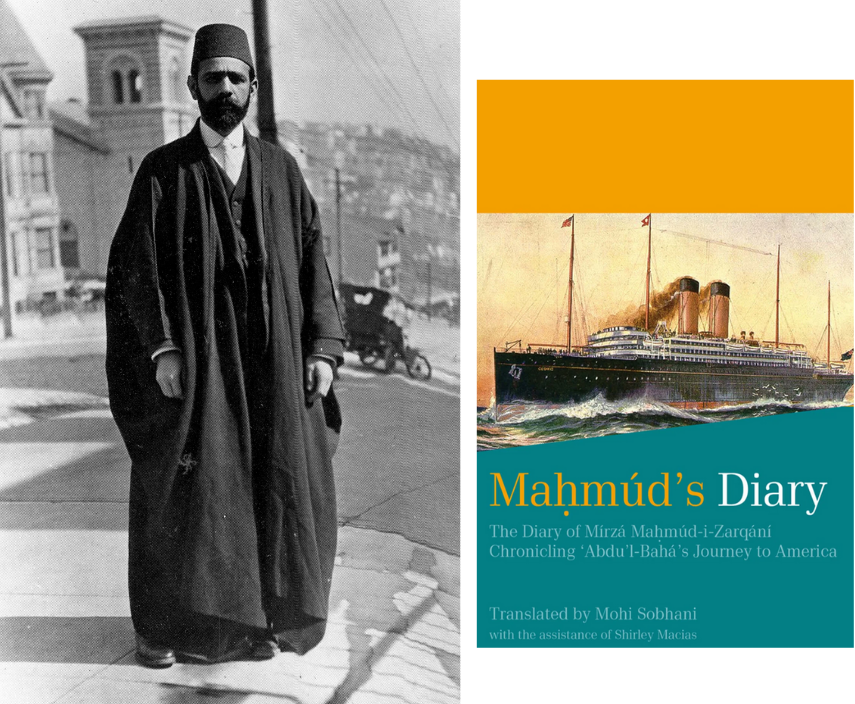
Mírzá Mahmúd-i-Zarqání (1875 - 1924) did travel teaching across Persia and India and served as a secretary for ‘Abdu’l-Bahá during His travels of the westMahmúd’s Diary Chronicling ʻAbdu’l-Bahá’s Journey to America.He is often the source for deep and intimate moment in the sections on America . When He passes, Shoghi Effendi cabled the Bahá'í world: “‘Deeply mourn passing (of) Zargani. His outstanding services will shine evermore. Urge friends hold befitting memorials.” Image courtesy of United States National Bahá'í Archives.
For a very detailed, day by day account of 'Abdu'l-Bahá's voyage on the Cedric to New York, please read the daily entries in Mírzá Mahmúd-i-Zarqání's Mahmúd’s Diary Chronicling ʻAbdu’l-Bahá’s Journey to America.
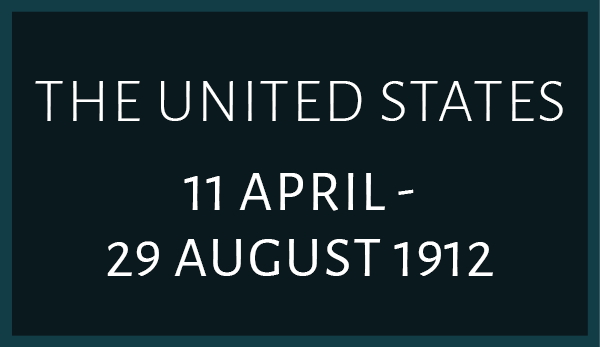
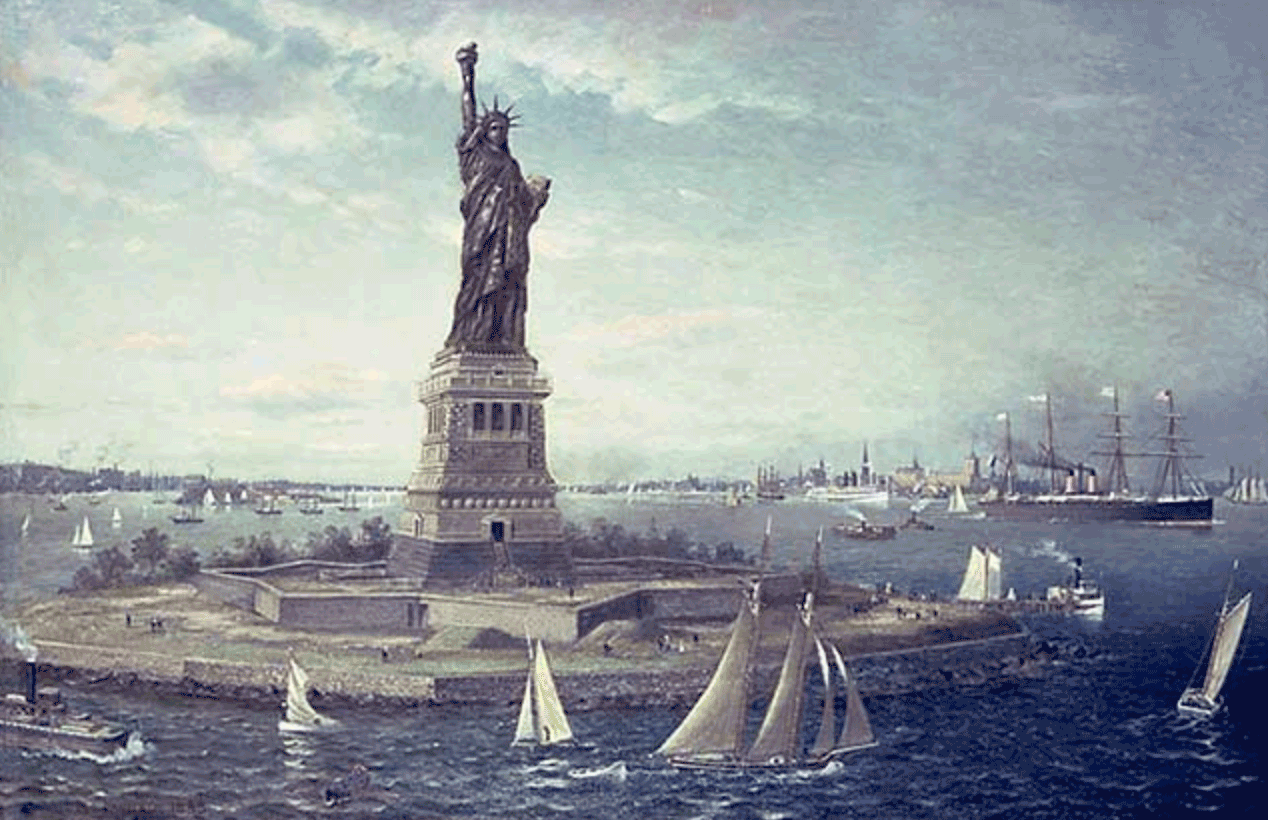
1912 painting by Fred Pansing with sailboats and a steamship passing in the background. Wikimedia Commons.
The Cedric sails into Upper New York Bay. As ‘Abdu’l-Bahá catches His first glimpses of the skyline of New York City, reporters climb aboard the tugboat, which will drag the steamship to safe harbor. Among the reporters is Wendell Phillips Dodge of the New York City News Association who writes the report of 'Abdu'l-Bahá's arrival that will be sent out through the Associated Press.
When the reporters climb aboard the Cedric, they find 'Abdu'l-Bahá on the upper deck, standing where He can see the pilot of the ship, His long robe flowing in the breeze. 'Abdu'l-Bahá's face seems like light itself as He scans the harbor and greets the reporter and His first words, quoting Bahá'u'lláh, are about the press:
The pages of swiftly appearing newspapers are indeed the mirror of the world...But it behoveth the editors of the newspapers to be sanctified from the prejudice of egotism and desire, and to be adorned with the ornament of equity and justice.
'Abdu'l-Bahá quoted in Alan Ward, 239 Days: ‘Abdu’l-Bahá's Journey in America, p. 13
When the Cedric is abreast of the Statue of Liberty, 'Abdu'l-Bahá, standing straight and facing it, holds His arms wide apart in salutation and says:
There is the new world’s symbol of liberty and freedom. After being forty years a prisoner I can tell you that freedom is not a matter of place. It is a condition. Unless one accept dire vicissitudes he will not attain. When one is released from the prison of self, that is indeed a release.
'Abdu'l-Bahá quoted in Alan Ward, 239 Days: ‘Abdu’l-Bahá's Journey in America, p. 14
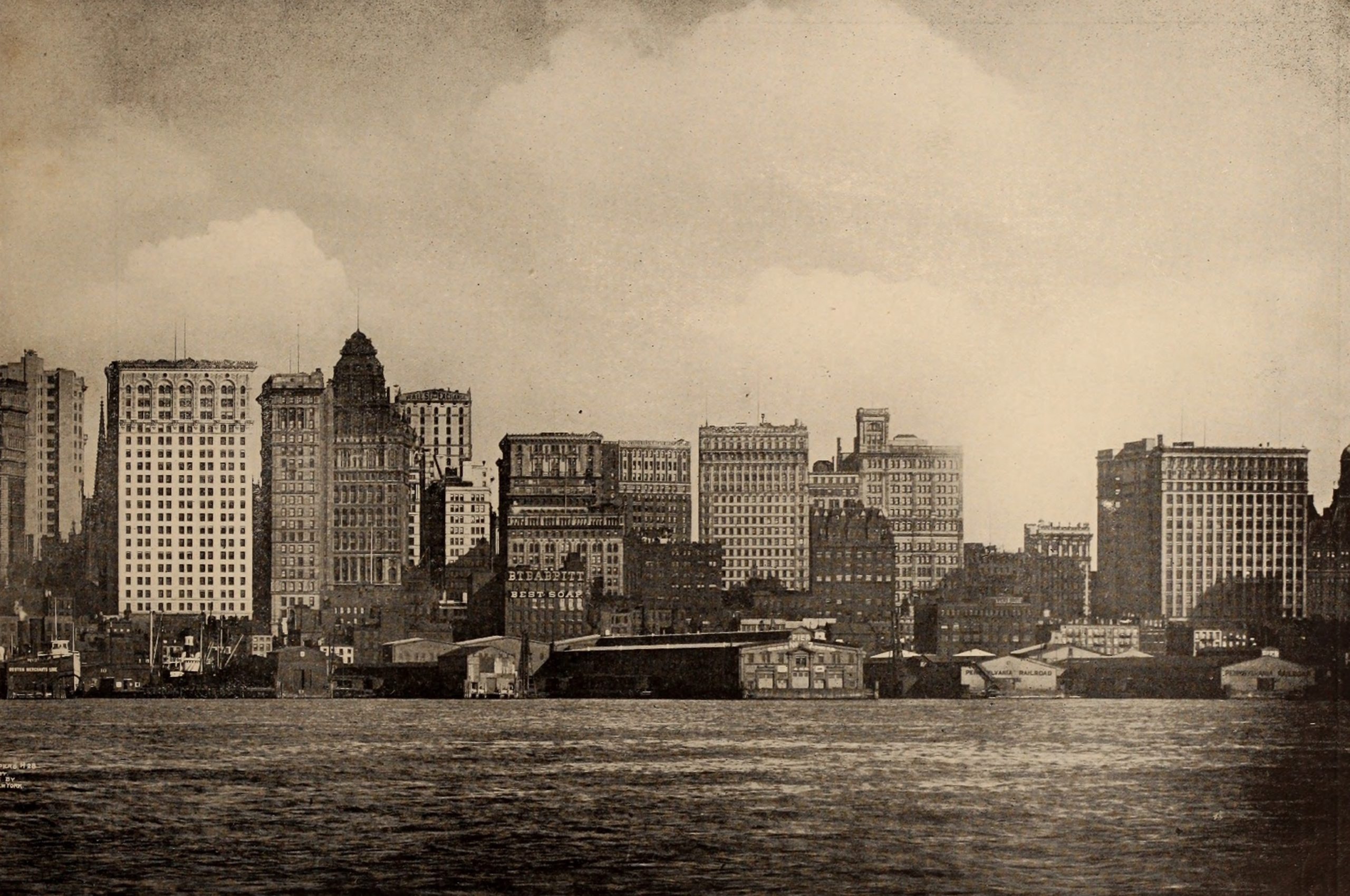
Skyline of New York City in 1912. Seymour Durst. Wikimedia Commons.
As the ship points its nose up the North River, ‘Abdu’l-Bahá looks at the skyline of New York City, and gazing at its skyscrapers, tells the reporters:
These are the minarets of Western World commerce and industry.
'Abdu'l-Bahá quoted in Alan Ward, 239 Days: ‘Abdu’l-Bahá's Journey in America, p. 14
When the journalists ask 'Abdu'l-Bahá about the purpose of His visit, He replies:
I have come to visit the peace societies of America because the fundamental principles of our Cause are universal peace and the promotion of the basic doctrine of the oneness and truth of all the divine religions. Differences between religions are due to misunderstanding and imitation. If these imitations were to be eliminated, all religions would be united.
'Abdu'l-Bahá quoted in Mahmúd-i-Zarqání, Mírzá. Mahmúd’s Diary Chronicling ʻAbdu’l-Bahá’s Journey to America
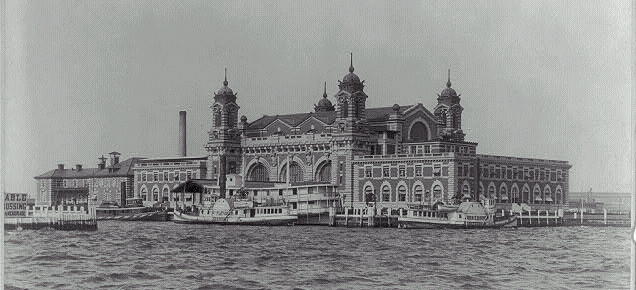
Ellis Island in 1905, just as 'Abdu'l-Bahá would have seen it on April 11, 1912. Image courtesy of Brent Poirier.
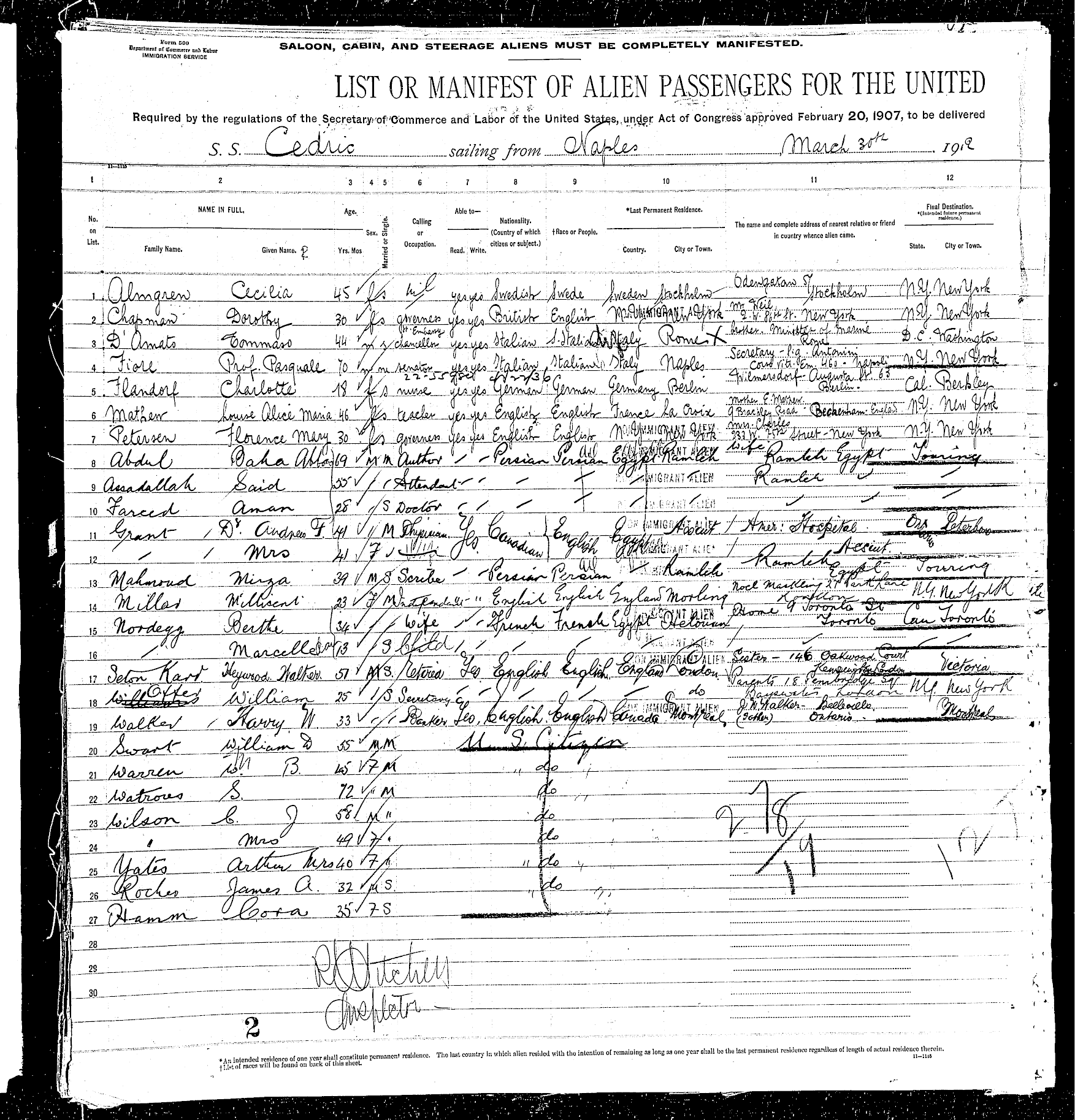
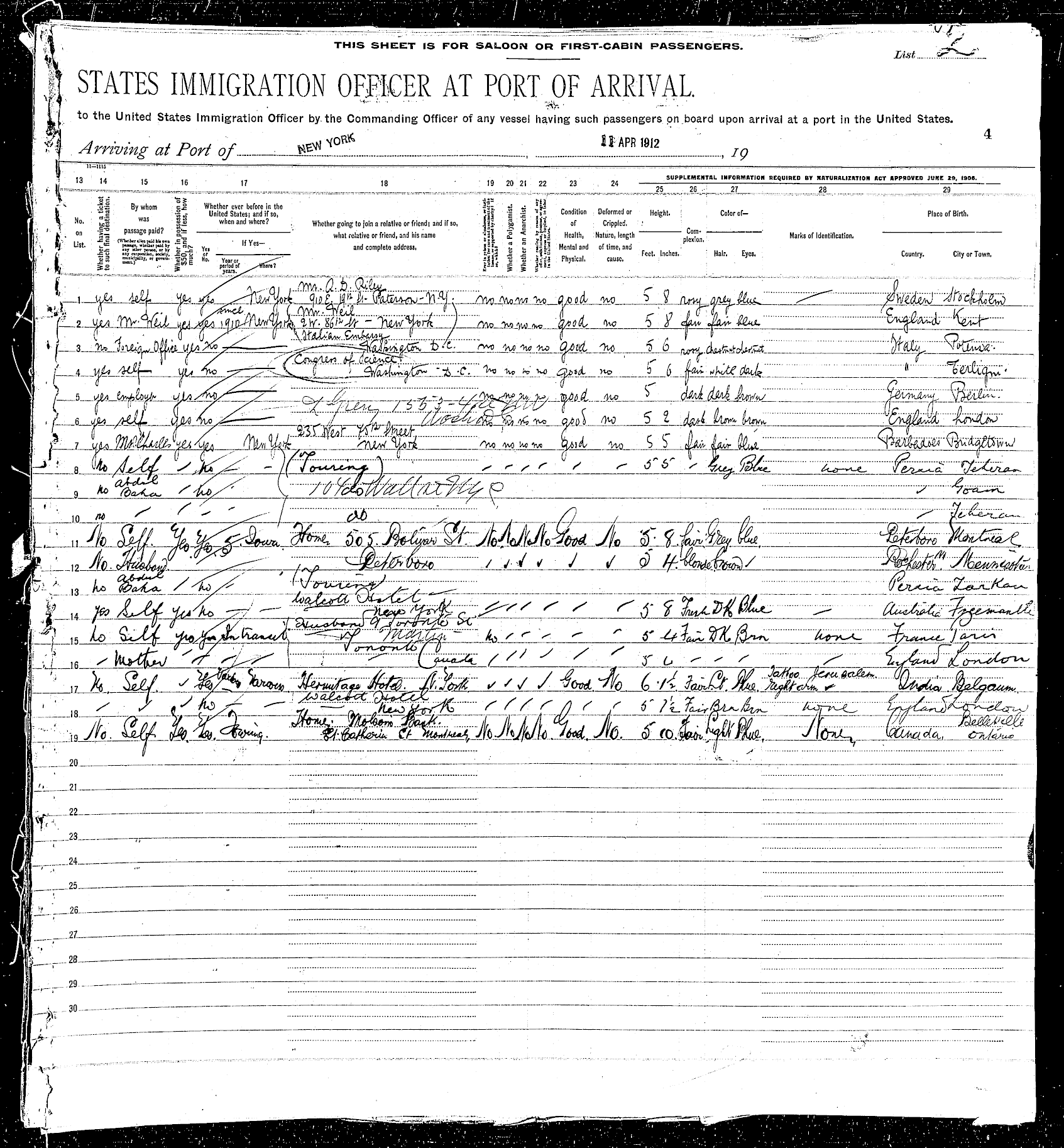
All images from the Cedric ship manifest graciously provided by Brent Poirier from his personal research. We are unendingly grateful to him for his generosity in providing these documents to be used publicly for the first time since he obtained them. You will notice that 'Abdu'l-Bahá is listed on line 8:
His occupation is listed as "Author";
His nationality as "Persian";
His address and the purpose of His stay in the United States as "Touring";
Under the section "By whom was passage paid" is noted "Abdul Baha";
His height is listed as 5 feet 5 inches (1 meter 65);
His complexion is listed as "Fair",
His hair is described as "Grey";
His eyes as "Blue",
His overall health is listed as "Good";
And the Master lists His place of residence as "Teheran, Persia", not Haifa, Palestine.
You can find the complete ship manifest listing all the people accompanying 'Abdu'l-Bahá here.
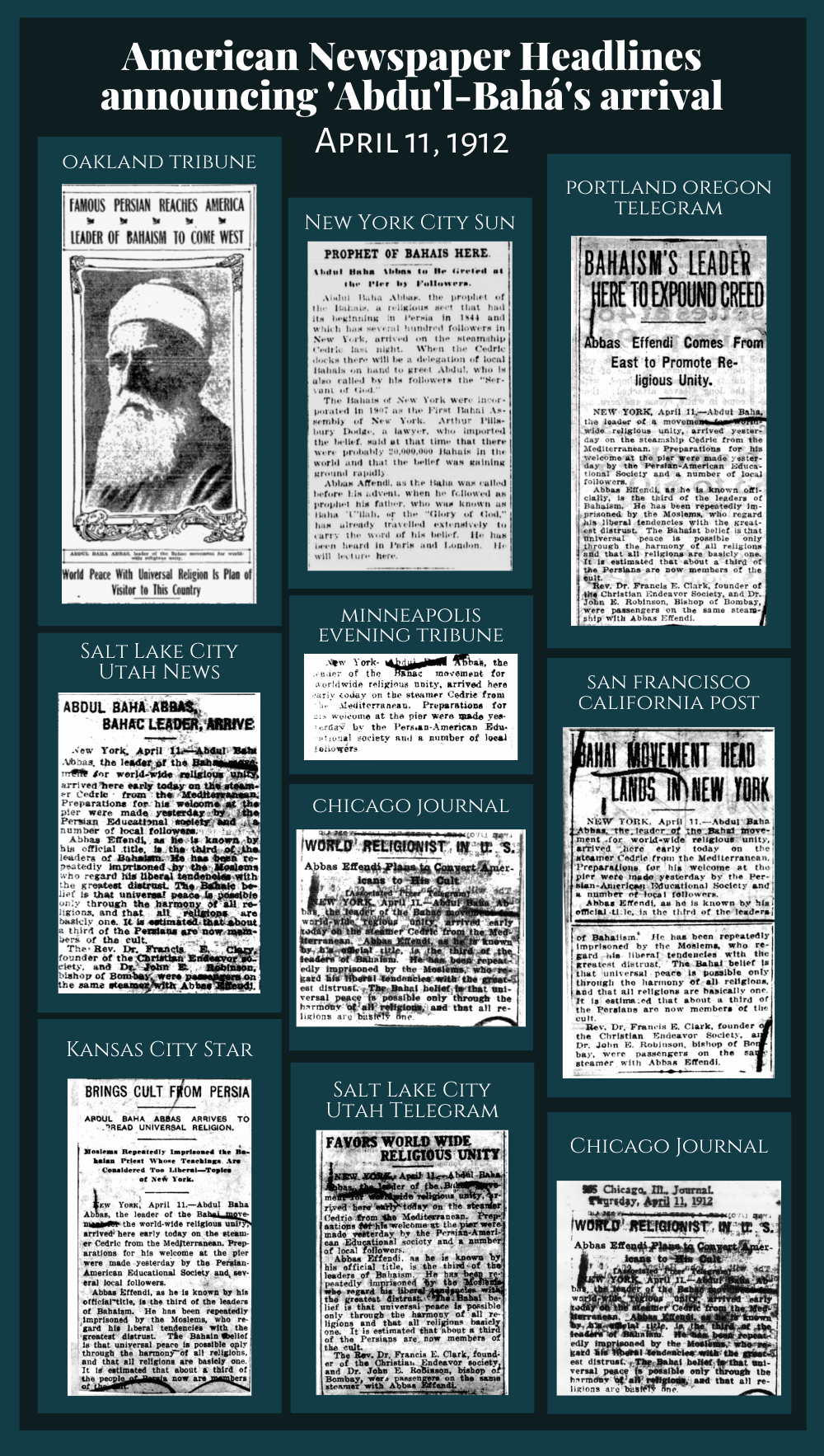
New York Sun headline from Library of Congress. Remaining newspaper headlines from 'Abdu'l-Bahá in America: 1912-201; April 11, 1912. Original graphic by Violetta Zein.
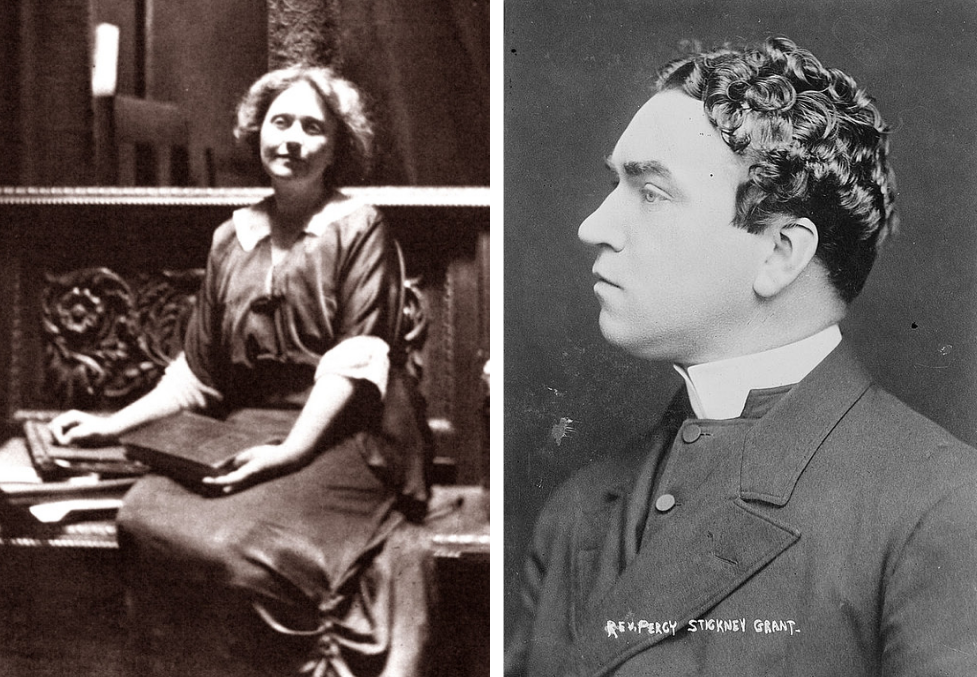
Left: Juliet Thompson. Baha'i Chronicles. Right: Rev. Percy S. Grant. Library of Congress.

Left: The Church of the Ascension in the City of New York, circa 1910-1914. Right: Original interior of the church. The Church of the Ascension in the City of New York.
The next morning, ‘Abdu’l-Bahá telephones for Juliet to come at once to Him. He immediately starts speaking appreciatively of the service Percy Grant organized for him the previous day but cautions Juliet Thompson to be very careful in her relations with him:
You must keep your acquaintance, Juliet, absolutely formal.
The message ‘Abdu’l-Bahá asks Juliet to convey to Dr. Grant is significant
Say: I will not forget the services thou hast rendered yesterday. They are engraved on the book of My heart. I will mention thy name everywhere. And know thou this: This matter of yesterday will become most wonderful in the history of the world. The world of existence will not forget yesterday. Thousands of years hence the mention of yesterday will be heard and it will become history that you were the founder of this work.
'Abdu'l-Bahá quoted in The Diary of Juliet Thompson
Percy Grant will not marry Juliet Thompson, and eventually resigns his rectorship.
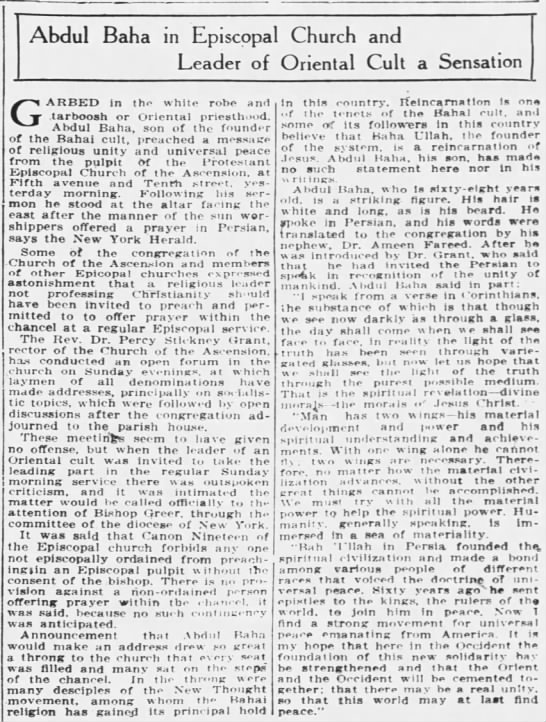
Wednesday, May 1, 1912 article from the The Buffalo Enquirer about 'Abdu'l-Bahá's talk at the Church of the Ascension. Newspapers.com.
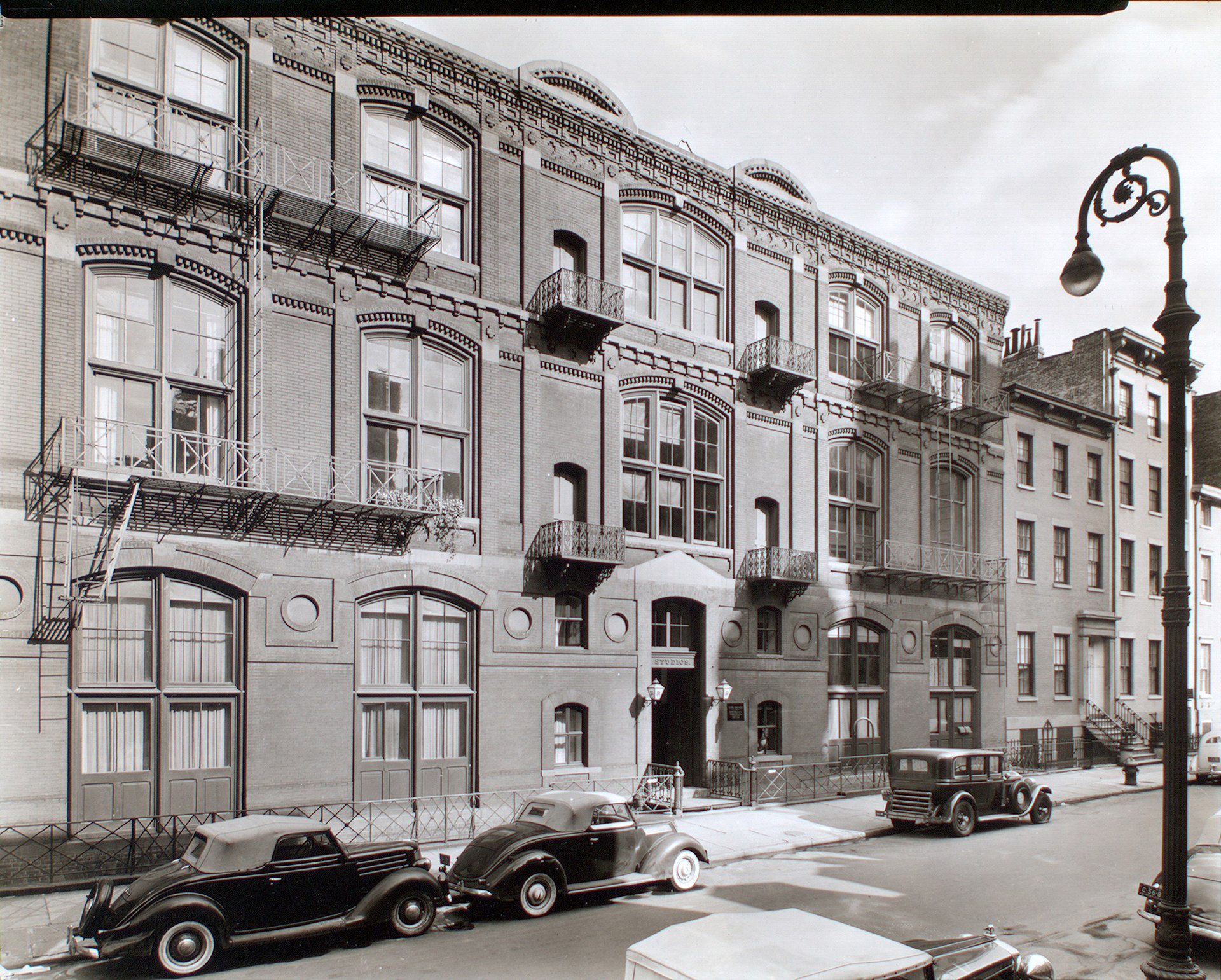
51, West Tenth Street, where Kahlil Gibran lives, right across from Juliet Thompson at 48, West Tenth Street, photographed in 1938. Wikimedia Commons.
Juliet Thompson and Kahlil Gibran are both artists and live across the street from each other in Greenwich Village on West Tenth Street, between Fifth and Sixth Avenues. Juliet lives at 48 and Kahlil at 51 West Tenth, a tree-lined street of brownstone apartment buildings on both sides. Juliet has a wonderful personality, and they become the best of friends. Kahlil always says that Juliet was his first friend in New York. He works in an Arab newspaper and is free to write and paint.
Juliet tells Gibran about the Bahá'í Faith immediately and he listens. He obtains copies of Bahá'u'lláh’s Arabic Writings and says it is the most “stupendous literature that was ever written” and even coins words from Bahá'u'lláh. He says there is no Arabic that even touches the Arabic of Bahá’u’lláh.
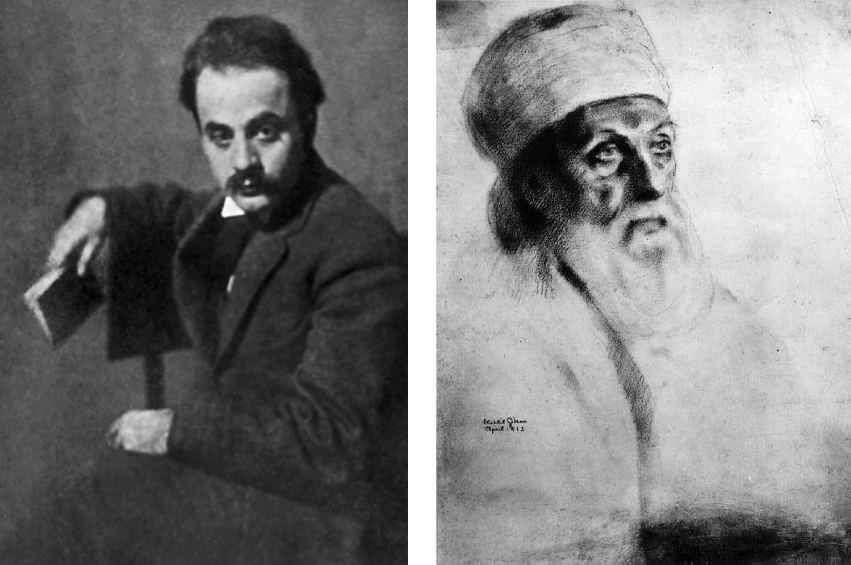
LEFT: Kahlil Gibran in 1913, one year after he meets 'Abdu'l-Bahá. Source: Wikimedia Commons.RIGHT: Kahlil Gibran's sketch of 'Abdu'l-Bahá. Source: © Bahá'í World News Service
Time passes, and Juliet tells Gibran that 'Abdu'l-Bahá, the son of Bahá'u'lláh is coming to New York. He asks Juliet to request a sitting so he can draw 'Abdu'l-Bahá. On April 19, 1912, 'Abdu'l-Bahá gives the 29-year-old Kahlil Gibran one hour, at 6:30 in the morning and Gibran draws a beautiful portrait of 'Abdu'l-Bahá, and a friendship is forged. Gibran adores 'Abdu'l-Bahá. He spends as much time with Him as he can and when 'Abdu'l-Bahá goes to Boston, Gibran joins him there to spend more time with Him. He would say of 'Abdu'l-Bahá:
For the first time I saw form noble enough to be a receptacle for the Holy Spirit.
When 'Abdu'l-Bahá leaves, Kahlil throws himself into writing. He often talks about 'Abdu'l-Bahá lovingly, but will never understand his Station fully. Juliet continues to be a close friend. She reads all his manuscripts—The Madman, The Forerunner, The Son of Man, The Prophet — and he often calls to invite her over so he can read his new chapter out loud to her.
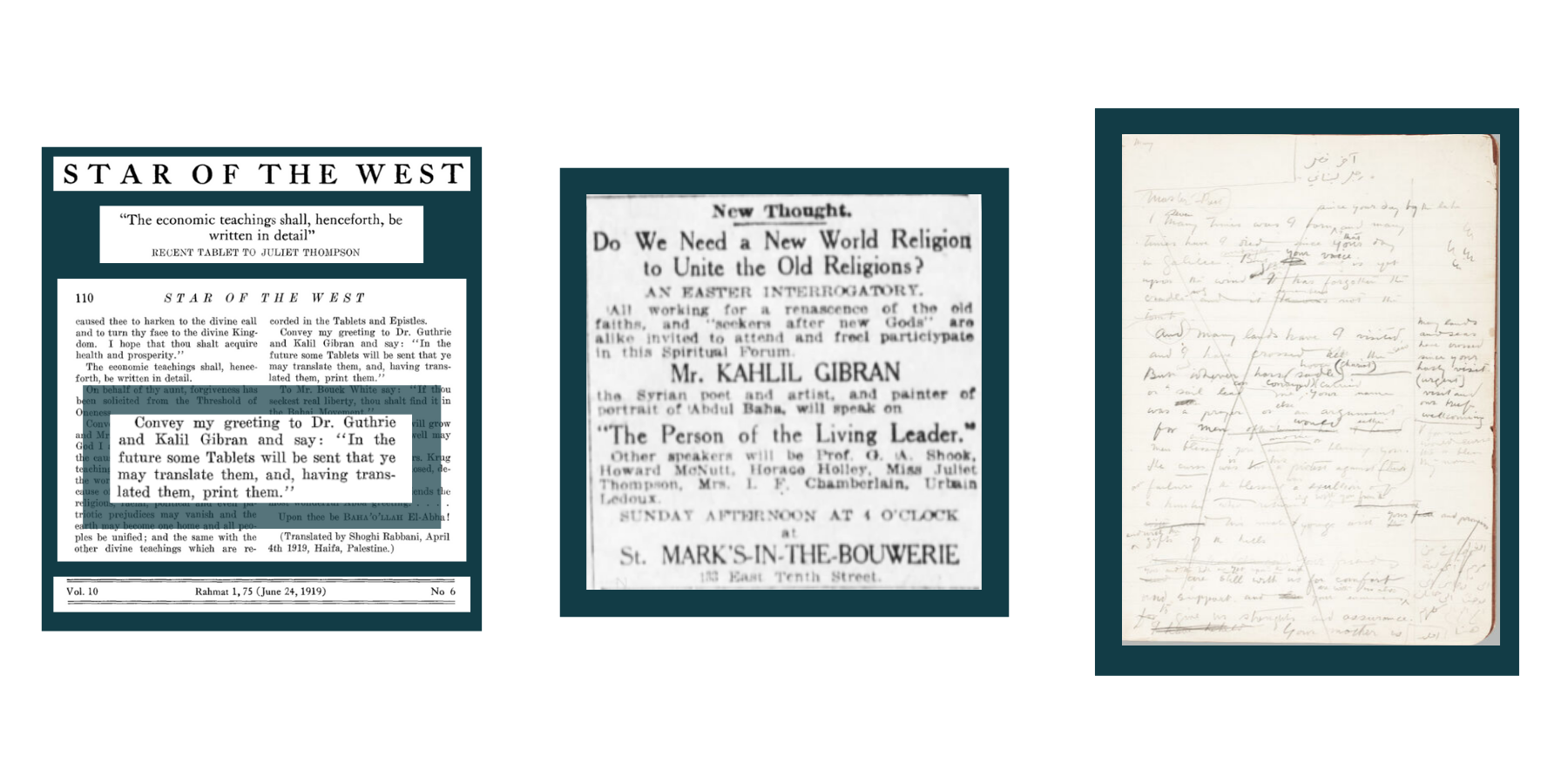
Left: Star of the West, Volume X, Number 5, page 110. Center: Advertisement in The Brooklyn Daily Eagle from Saturday, March 26, 1921, page 7 from Newspapers.com. Images 1 & 2 from Steven Kolins' article: On Kahlil Gibran and the Bahá’í Faith. Right: Manuscript of Jesus the Son of Man by Kahlil Gibran, 1928, Graphite on paper, 27.7 × 19.8 cm. From Artsy website.Seven years after His visit to New York City, almost exactly to the day, 'Abdu'l-Bahá gives Juliet Thompson a message for Kahlil Gibran in His Tablet addressed to her, dated April 4, 1919, and translated by Shoghi Effendi. (see left image below). Nine years after 'Abdu'l-Bahá's visit to New York, and a few months before His passing, Kahlil Gibran is the main speaker at a Bahá'í conference at the Bowery with a talk titled "The Person of the Living Leader."
Years later, the Bahá'í Center is having a screening of the movie of 'Abdu'l-Bahá and Juliet invites Kahlil, who sits beside her in the front row. When he sees the Master come alive for him again on the screen, he begins to sob. Gibran sobs, and sobs that night, then takes Juliet’s hands and says:
You have opened for me a door tonight.
Seven years after His visit to New York City, almost exactly to the day, 'Abdu'l-Bahá gives Juliet Thompson a message for Kahlil Gibran in His Tablet addressed to her, dated April 4, 1919, and translated by Shoghi Effendi. (see left image below). Nine years after 'Abdu'l-Bahá's visit to New York, and a few months before His passing, Kahlil Gibran is the main speaker at a Bahá'í conference at the Bowery with a talk titled "The Person of the Living Leader." He is followed by eminent Bahá'í speakers such as Disciple of 'Abdu'l-Bahá Howard McNutt, future Hand of the Cause Horace Holley and Juliet Thompson. (see center image below) Kahlil tells Juliet that he thought of 'Abdu'l-Bahá while writing Jesus: The Son of Man. He tells her that he is planning to write another book centered on the person of ‘Abdu'l-Bahá. However, his plans are cut short as he dies of cancer in 1931, aged 49." (see right image below)
He is followed by eminent Bahá'í speakers such as Disciple of 'Abdu'l-Bahá Howard McNutt, future Hand of the Cause Horace Holley and Juliet Thompson. (see center image below) Kahlil tells Juliet that he thought of 'Abdu'l-Bahá while writing Jesus: The Son of Man. He tells her that he is planning to write another book centered on the person of ‘Abdu'l-Bahá. However, his plans are cut short as he dies of cancer in 1931, aged 49." (see right image below)
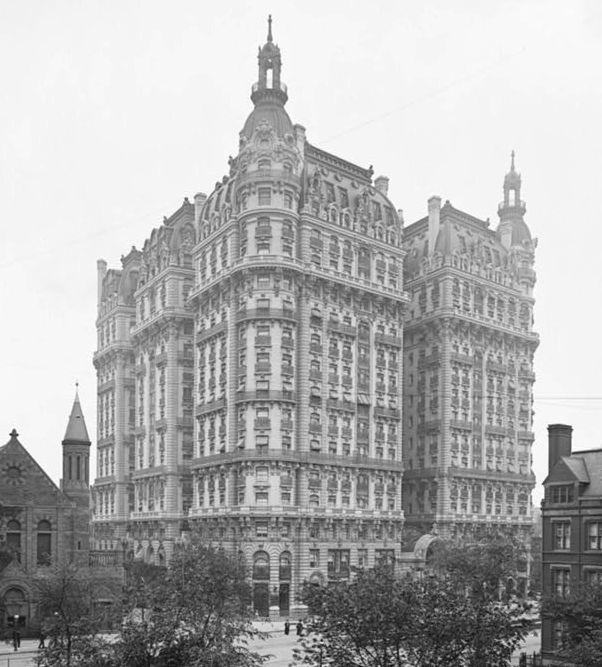
The Hotel Ansonia on Broadway and Amsterdam Avenue in 1905. Wikimedia Commons.
On April 16, 1912, 'Abdu'l-Bahá agrees to speak at the Bowery Mission, a social action endeavor dedicated to feeding the homeless and needy of New York. He turns to Juliet Thompson and says:
I want to give them some money, I am in love with the poor. How many poor men go to the Mission?
When Juliet replies that about 300 men go to the Bowery Mission, 'Abdu'l-Bahá gives her and Edward Getsinger two one-thousand franc notes and asks them to take them to the bank, convert the money into quarters,put them in a bag and meet Him at the Bowery Mission with the money bags.
On April 19, 1912, Kate Carew arrives at the luxurious Hotel Ansonia. She is a famous interviewer in the New York of 1912, and a caricaturist who sketches her subjects for her pieces. She has profiled Mark Twain, Sarah Bernhardt, J. P. Morgan, Pablo Picasso, Winston Churchill, Theodore Roosevelt, the Wright brothers, and now 'Abdu'l-Bahá. She starts to interview 'Abdu'l-Bahá and the conversation is animated. They speak about material civilization and gender issues, but after a number of questions, she notices 'Abdu'l-Bahá is starting to look tired. She asks Dr. Faríd, His interpreter if she should leave.
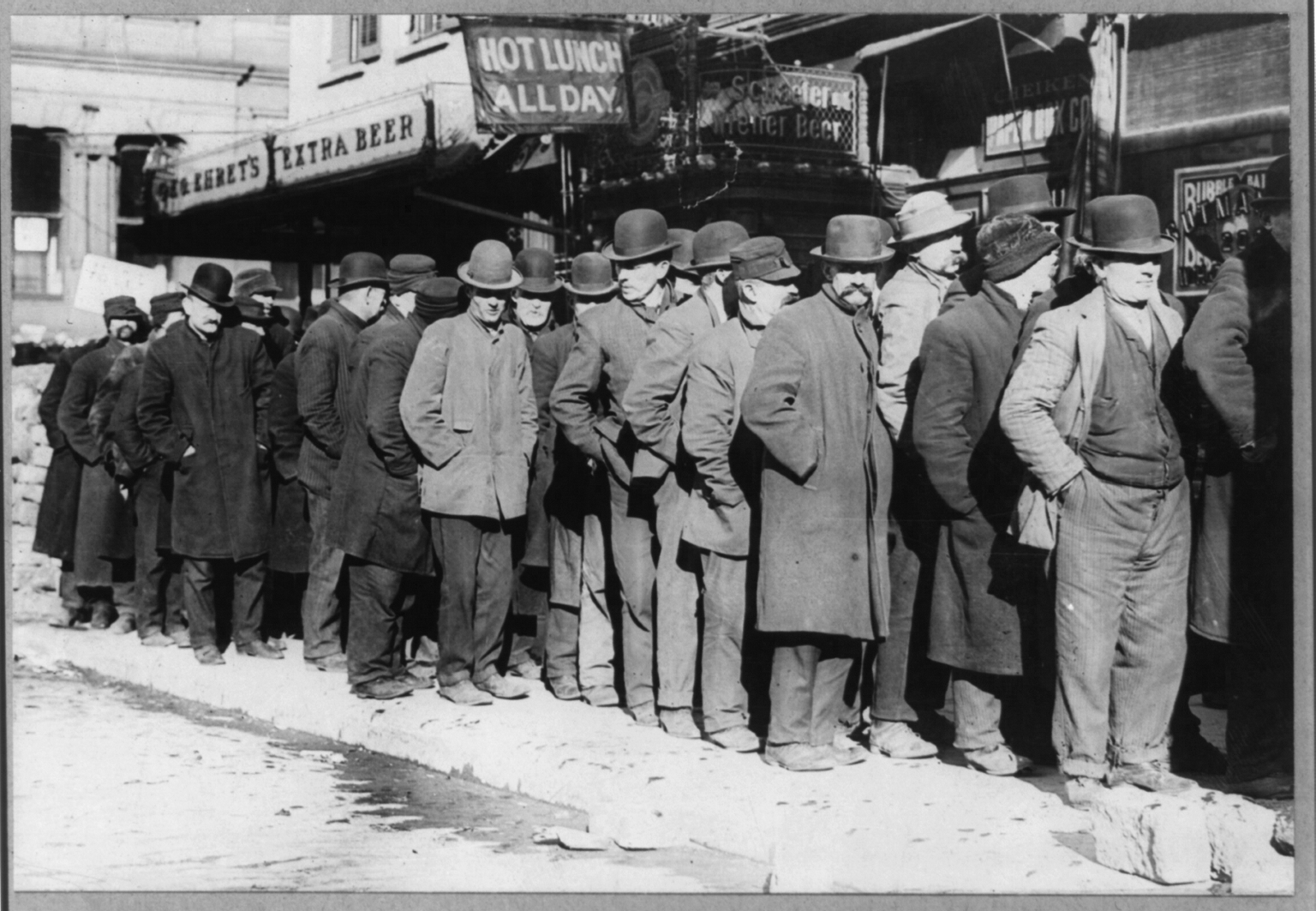
Men waiting in a bread line at the Bowery Mission in February 1910. Library of Congress.
'Abdu'l-Bahá has been giving of Himself for the last eleven hours, since 6 in the morning, when He sat for Kahlil Gibran. But 'Abdu'l-Bahá says:
I am going to the poor in the Bowery now. I love them.
The Master invites Kate Carew, who joins the party and they head to the Bowery Mission, eight kilometers, and a whole world away from the Ansonia hotel. This is the practical application of their previous conversation on material and spiritual wealth. Before entering the Mission, they encounter a group of rowdy boys making fun of the Orientals in flowing robes and strange head-gear. Carrie Kinney, a member of the Master’s party, explains to them that ‘Abdu’l-Bahá is a very holy man who has spent much of His life in prison because of His love for truth, and that He is going to talk with the men at the Bowery Mission. The boys want to attend, but Mrs. Kinney invites them to her house so they can meet the Master.
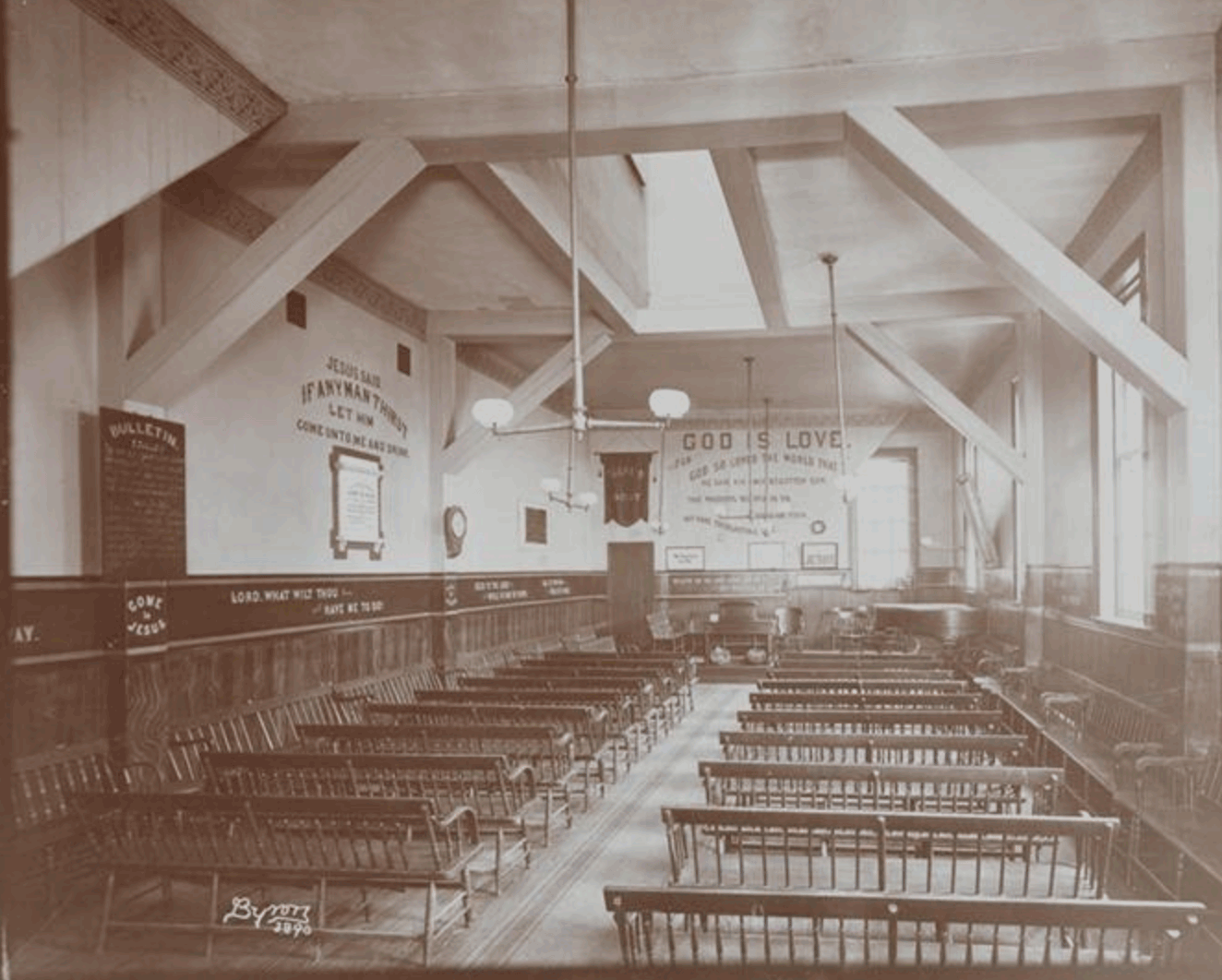
Inside of the Bowery Mission in 1897. Courtesy Byron Company/Museum of the City of New York. Bowery Boys History.
Once they enter the Mission, Juliet Thompson and Edward Getsinger with their two huge white bag of quarter sit behind 'Abdu'l-Bahá on the platform. After a brief introduction, these are 'Abdu'l-Bahá's opening words to the four hundred men of the Bowery Mission who have come to hear Him:
Tonight I am very happy for I have come here to meet My friends. I consider you my relatives, My companions, and I am your comrade. You must be thankful to God that you are poor, for His Holiness Jesus Christ has said: 'Blessed are the poor.' He never said: blessed are the rich! He said too that the Kingdom is for the poor and that it is easier for a camel to enter the needle's eye than for a rich man to enter God's Kingdom. Therefore you must be thankful to God that although in this world you are indigent, yet the treasures of God are within your reach, and although in the material realm you are poor, yet in the Kingdom of God you are precious. "His Holiness Jesus Himself was poor. He did not belong to the rich. He passed His time in the desert travelling among the poor and lived upon the herbs of the field. He had no place to lay His head--no home. He was exposed in the open to heat, cold, and frost. Yet He chose this rather than riches.
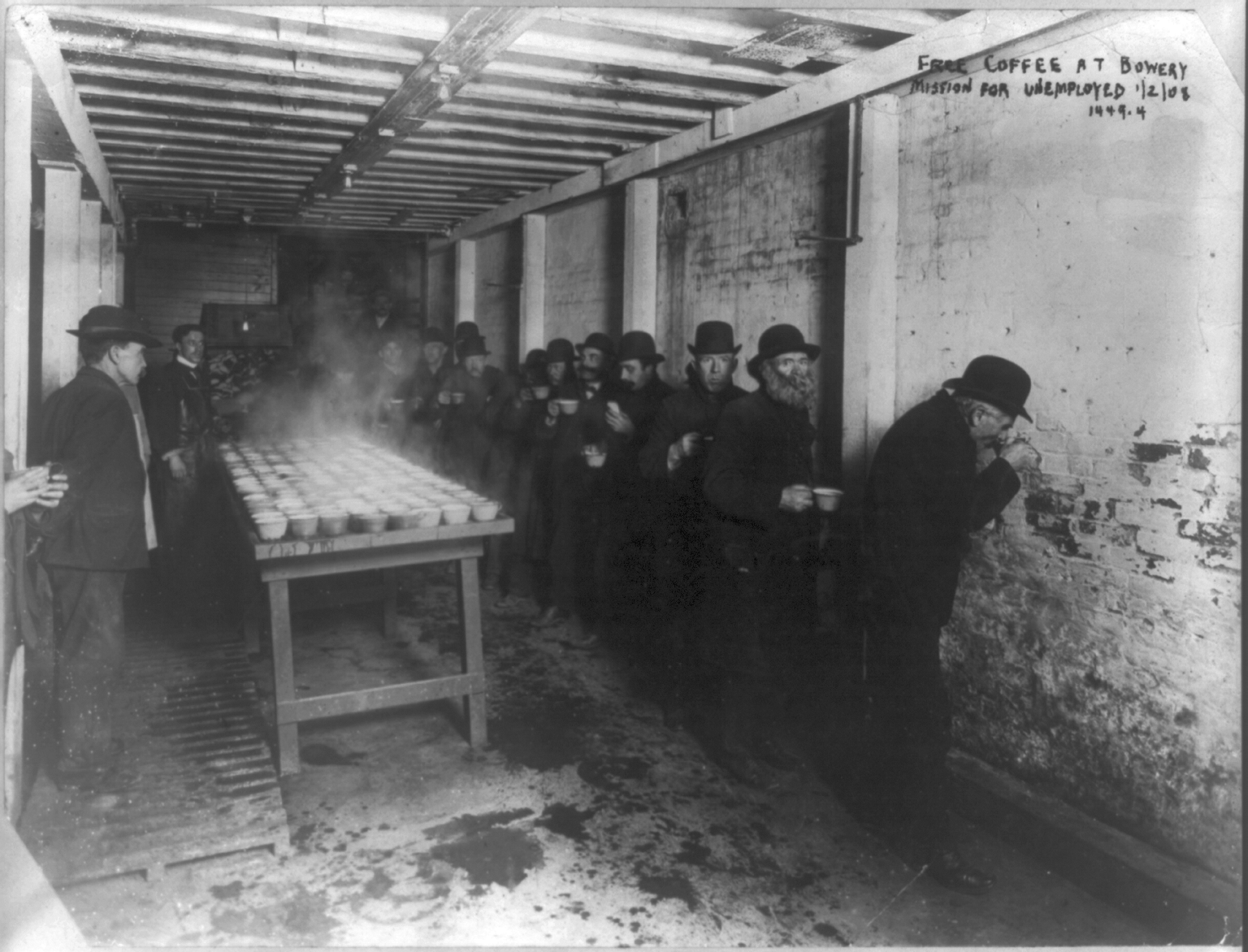
Men lining up for free coffee at the Bowery Mission in January 1908. Library of Congress.
After the talk, 'Abdu'l-Bahá requests to meet each man. He is handed the bags of quarters and Kate Carew asks what they are. 'Abdu'l-Bahá replies with a smile:
Some little lucky bits I am going to distribute to the men.
All four hundred men present will leave with a wam handshake from 'Abdu'l-Bahá, and pressed in the palm of their hand, a shiny new quarter ($7 in today's currency) that evening, enough for a few days food and place to sleep. Four hundred quarters in 1912 is the equivalent of $2,800 today, with inflation.
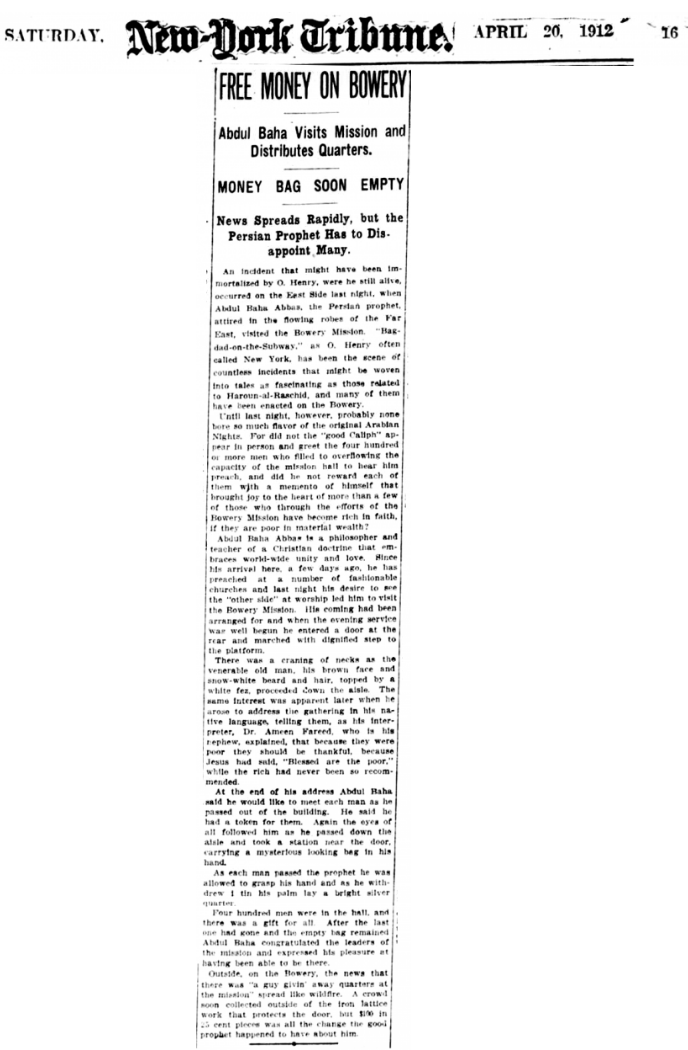
New York Tribune article dated April 20, 1912: Free Money on Bowery: Abdul Baha visits Mission and Distributes Quarters, Money Bag Soon Empty. 'Abdu'l-Bahá in America.
After 'Abdu'l-Bahá's visit to the Bowery, many articles are published about this event, including the one above called "Free money on Bowery: 'Abdu'l-Bahá visits Mission and Distributes Quarters, Money Bag Soon Empty."
But after the visit, the little rowdy boys from the Bowery Mission go to Mrs. Kinney’s.
When they arrive, ‘Abdu’l-Bahá greets them and He singles out an African-American boy and, touching his cheek, compares him to a black rose as well as rich chocolate. The child beams with joy.
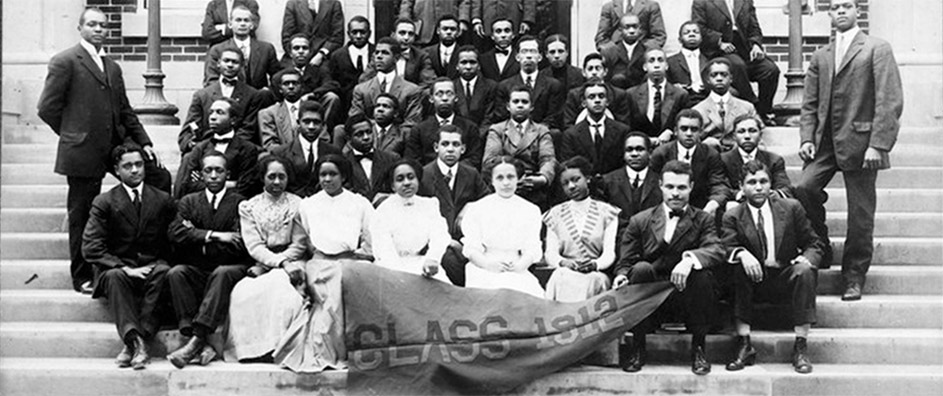
Howard University, Class of 1912. The people on this photograph most probably attended 'Abdu'l-Bahá's lecture on April 23, 1912, as it took place before graduation, and there were more than 1,000 staff and students present. Baha'i Teachings.
Every moment of 'Abdu'l-Bahá's sojourn in America is a teaching moment, like His talk at the Church of the Ascension, His friendship with Khalil Gibran, and His visit to the Bowery Mission with Kate Carew. This moment in Washington, D.C. is a teaching moment on race unity, because 'Abdu'l-Bahá has come to set the standards of Bahá'u'lláh.
On April 23, 1912, 'Abdu'l-Bahá speaks three times, and attends various events. His first speaking engagement is at Howard University, an all-black institution at noon. A band welcomes Him and more than 1,000 faculty and students attend His address on racial harmony and the unity of mankind:
Today I am most happy, for I see here a gathering of the servants of God. I see white and black sitting together. There are no whites and blacks before God. All colours are one, and that is the colour of servitude to God.
'Abdu'l-Bahá's address at Howard University from The Promulgation of Universal Peace
For more information and an in-depth analysis of the impact of ‘Abdu'l-Bahá's speech at Howard University, please download Dr. Christopher Buck's ‘Abdu'l-Bahá's 1912 "Howard University Speech: A Civil War Myth for Interracial Emancipation." Dr. Buck's paper is a study of the aim of ‘Abdu'l-Bahá's visit to Washington, D.C., the capital city of the United States, best summarized in the Chicago Defender newspaper of May 4, 1912, whose headline reads: “To Break the Color Line: Abdul Baha, the Great Persian Philosopher and Teacher, Aims to Unite the Peoples of All Races and Creeds in One Great Bond of Brotherhood.”
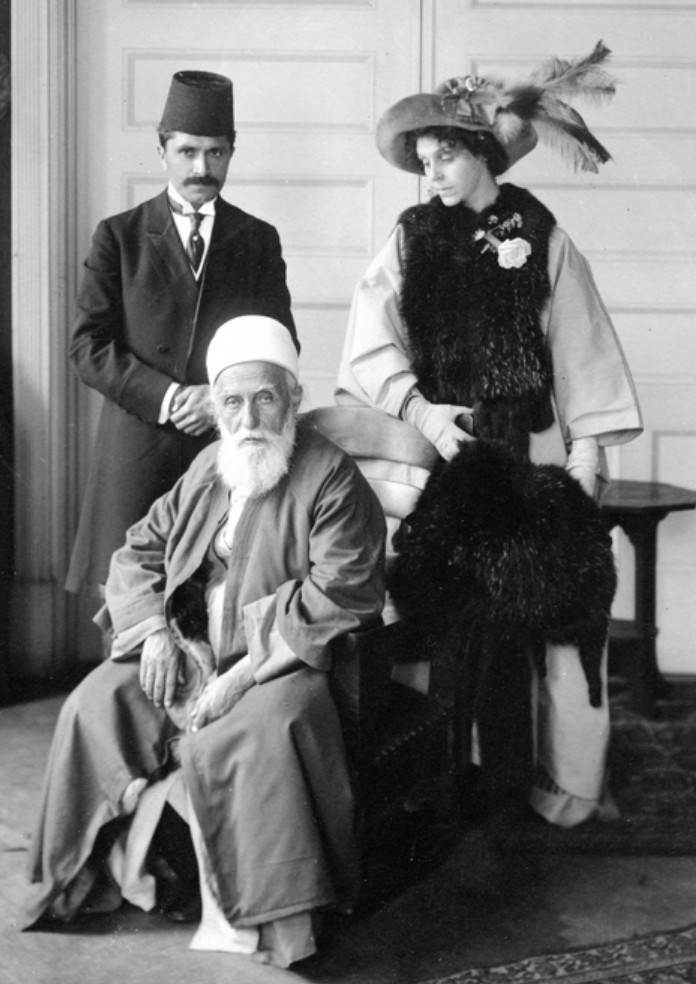
'Abdu'l-Bahá with Ali-Kuli Khan and Florence Khan in the United States in 1912. 'Abdu'l-Bahá in America.
After His talk at Howard University, 'Abdu'l-Bahá has been invited to lunch at the home of Florence and Ali-Kuli Khan where the Master is to dine with the white Washington D.C. social elite. At the time in the United States, racism is rampant: though Jim Crow laws only segregate white and black people in public places in the South, the West and North are deeply affected by the prevalent racism and concepts of segregation laws. This is not something 'Abdu'l-Bahá stands for. One hour before the luncheon, 'Abdu'l-Bahá sends word to Louis Gregory, the first African-American Bahá'í, and asks him to come to the Khan home for an interview.
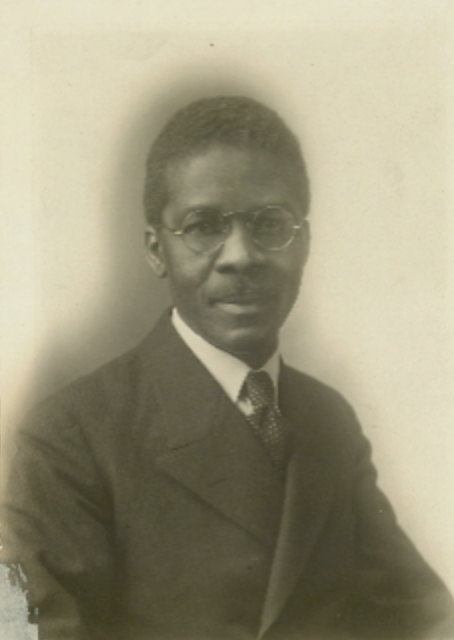
Louis Gregory. Bahaipedia.
At the home of the Khans, everything is ready for the luncheon. the most active Bahá’ís in America are present, including the mother of Florence Khan, Alice Breed, Agnes Parsons, Helen Goodall and Ella Cooper from California, Edward Getsinger, Juliet Thompson, and Mason Remey. There are also about ten more people present, including Ḍíyá Páshá, the Ottoman Ambassador, and several prominent figures in the social life of Washington D.C.
Luncheon is announced while 'Abdu'l-Bahá is still conducting his prolonged private interview with Louis Gregory. 'Abdu'l-Bahá leads the guest into the dining room while Louis Gregory waits for the chance to leave discreetly, when suddenly, 'Abdu'l-Bahá stands up and looks around, then says:
Where is Mr Gregory? Bring Mr Gregory!
While His attendant fetches Louis Gregory, 'Abdu'l-Bahá very casually re-arranges the place settings, which had been done in accordance with strict Washington D.C. protocol. When Louis Gregory arrives in the dining room, he finds that he has the seat of honor, to 'Abdu'l-Bahá's right. The Master makes a point of stating He is very pleased to have Mr. Gregory present, then proceeds to give a talk on the oneness of mankind!
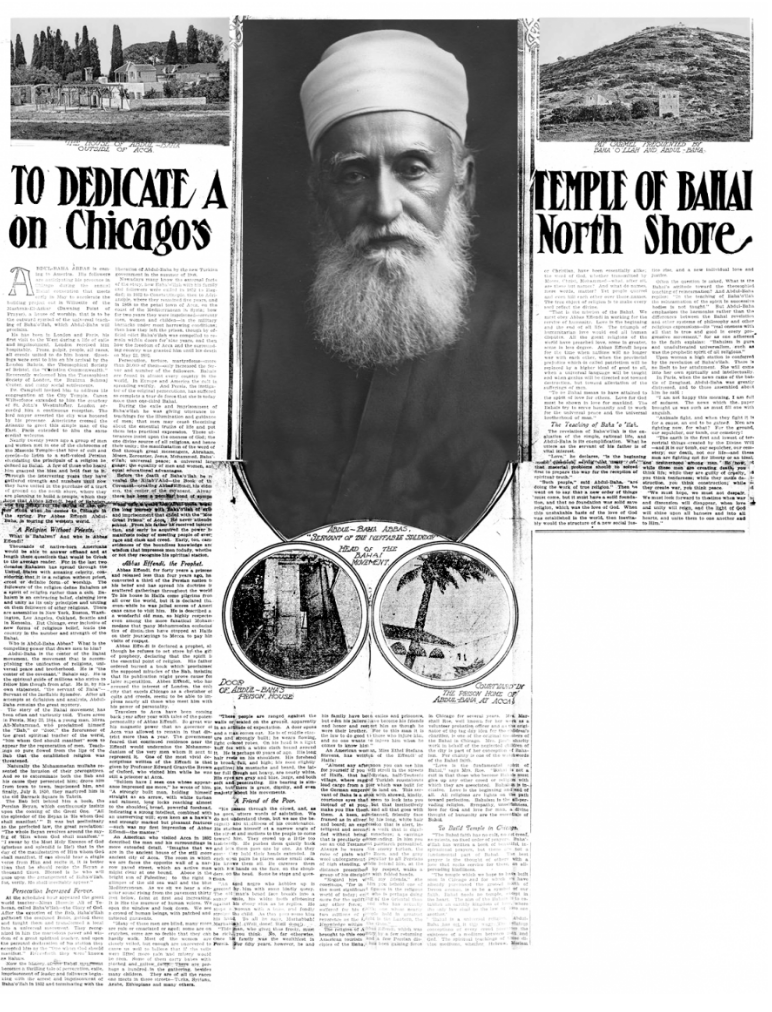
Headline on January 7, 1912: To Dedicate a Temple of Bahai on Chicago's North Shore. No paper identified. 'Abdu'l-Bahá in America.
'Abdu'l-Bahá's dedication of the Temple had already been announced almost 4 months before in a huge spread on the front page of an unidentified newspaper.
On May 1, 1912, on an unusually cool, cloudy and windy afternoon by the North Shore of Lake Michigan, 400 people have been waiting for 'Abdu'l-Bahá for hours. When the Master's taxi finally arrives, a Persian man calls for Corinne True. When Corinne True had come on pilgrimage in 1907, ‘Abdu’l-Bahá had put her, a woman, in charge of the Temple work, at a time when women were seldom put in charge of such important projects. Corinne True will later be appointed a Hand of the Cause but in the lifetime of 'Abdu'l-Bahá she will become known as the "Mother of the Temple" for her unwavering commitment to the Mother Temple of the West. Her son Lawrence died just last night in a boating accident, and 'Abdu'l-Bahá singles her out and offers her words of comfort before this very important event, another powerful lesson 'Abdu'l-Bahá teaches us.
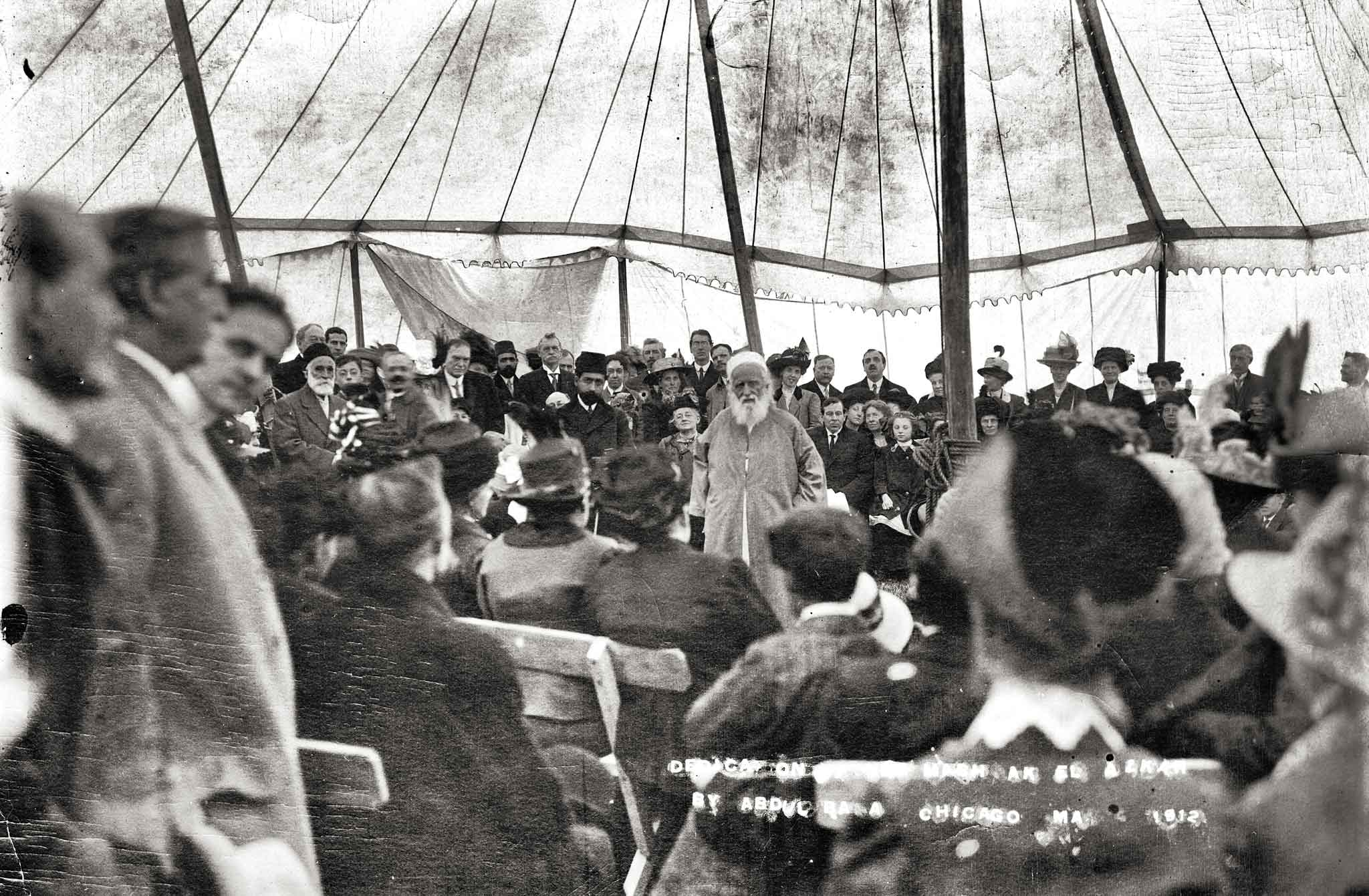
'Abdu'l-Bahá addressing the 300 guests inside the tent before the laying of the foundation stone. National Baha'i Archives of the Bahá'ís of the United States.
Inside the tent, 300 people or more are seated in a circle and there is not an empty seat to be seen. People crowd outside the tent, trying to catch a glimpse of 'Abdu'l-Bahá, straining to hear His voice.
He gives a talk on a vision of the future and the spiritual meaning of the Mashriqu’l-Adhkár, the "dawning place of the praise of God", also called a Bahá'í House of Worship or Temple:
The power which has gathered you here today notwithstanding the cold and windy weather is, indeed, mighty and wonderful. It is the power of God, the divine favor of Bahá’u’lláh which has drawn you together. We praise God that through His constraining love human souls are assembled and associated in this way. Thousands of Mashriqu’l-Adhkárs, dawning points of praise and mention of God for all religionists will be built in the East and in the West, but this, being the first one erected in the Occident, has great importance.
'Abdu'l-Bahá's talk at the dedication for the House of Worship in North America in The Promulgation of Universal Peace
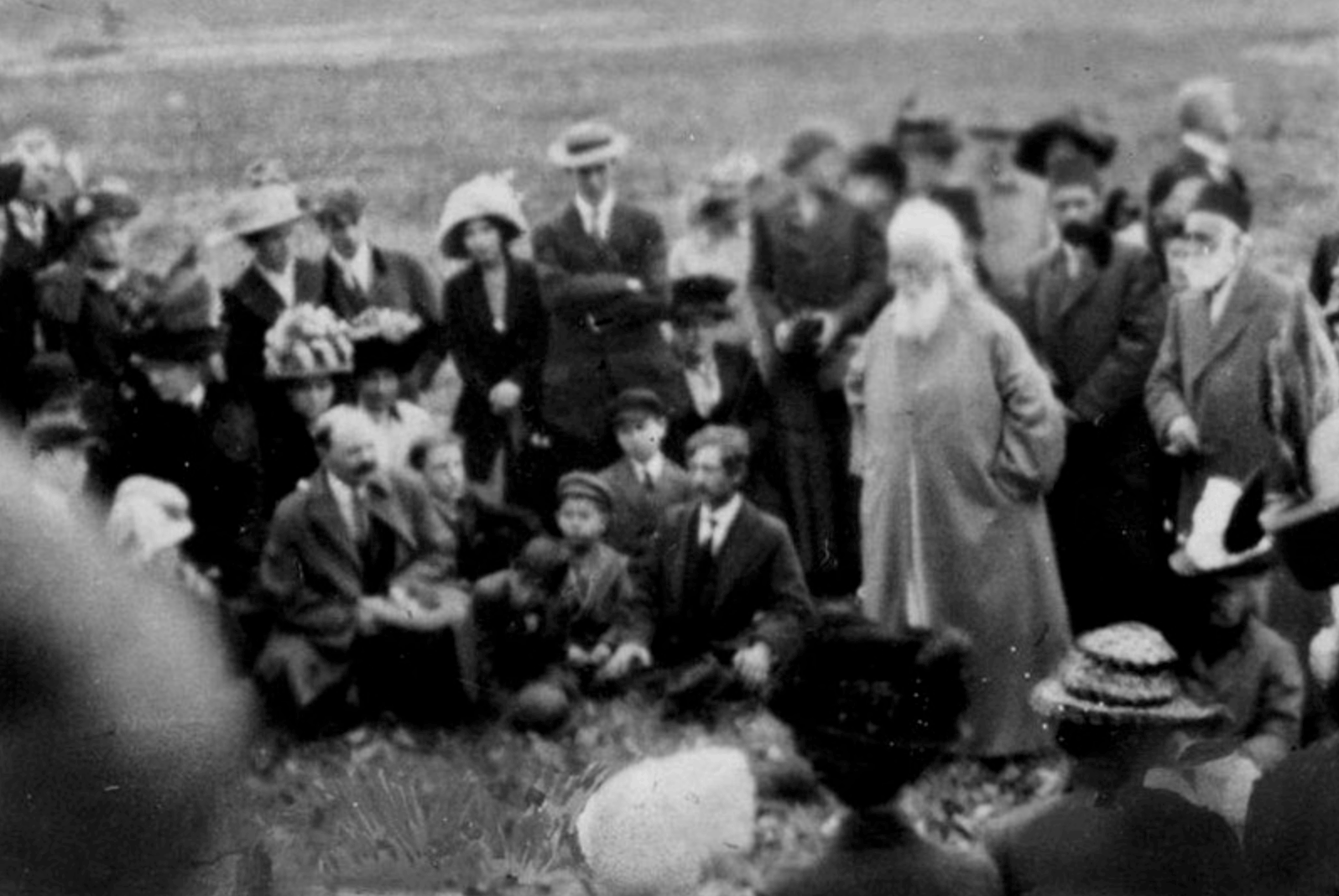
'Abdu'l-Bahá laying the cornerstone of the first House of Worship in the Western World, on May 1, 1912. Bahá'ís of the United States.
After the talk, the crowd follows 'Abdu'l-Bahá outside to the dedication site for the laying of the foundation stone. For this momentous occasion, a beautiful golden trowel has been prepared, but when 'Abdu'l-Bahá tries to break the ground, it is too flimsy. 'Abdu'l-Bahá requests a sturdier tool, and a young man runs across the street to a nearby house to borrow an ax. ‘Abdu’l-Bahá swings the ax like an athlete, high in the air and finally breaks ground. Then a shovel is handed to the Master, and Corinne True suggests to Him that women should be included in the ceremony. 'Abdu'l-Bahá calls on Lua Getsinger, then Corinne True to dig up shovelfuls of earth, followed by representatives of different races. Finally, 'Abdu'l-Bahá places the foundation stone for the Temple—a stone Nettie Tobin, too poor to contribute money, had obtained from the reject pile at a Chicago construction site and brought to Wilmette in a baby carriage and on two trains and a wagon, once the baby carriage had collapsed.
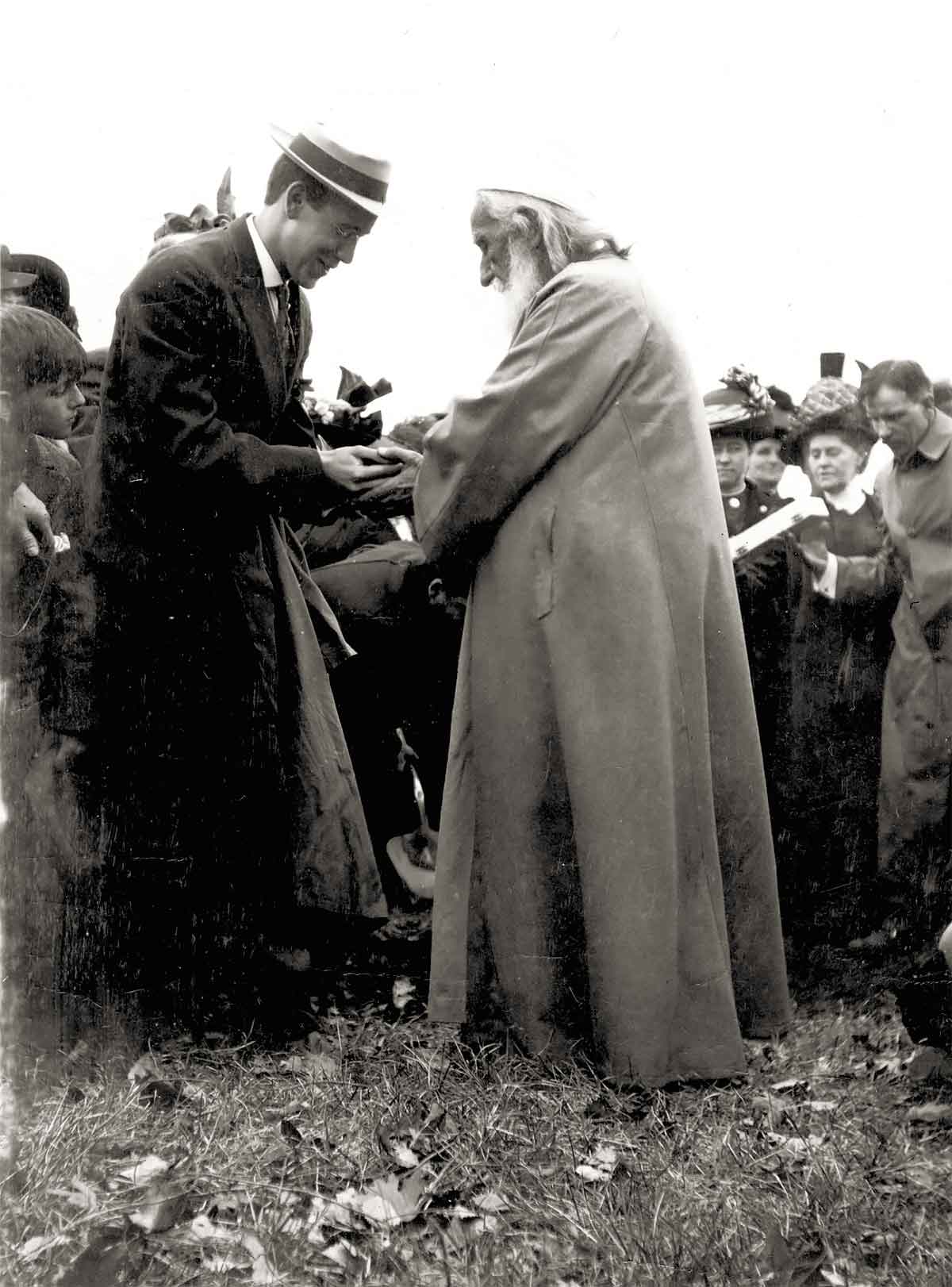
'Abdu'l-Bahá scooping earth and handing it to members of the crowd. National Bahá'í Archives of the United States.
After laying the foundation stone, ‘Abdu’l-Bahá declares:
The Temple is already built.
And so it is that on a grey afternoon in Wilmette, Illinois, a 2,600 year-old prophecy from Psalms 118:22 has been fulfilled:
The stone the builders rejected has become the cornerstone.
The Bible, Old Testament: Psalms 118:22
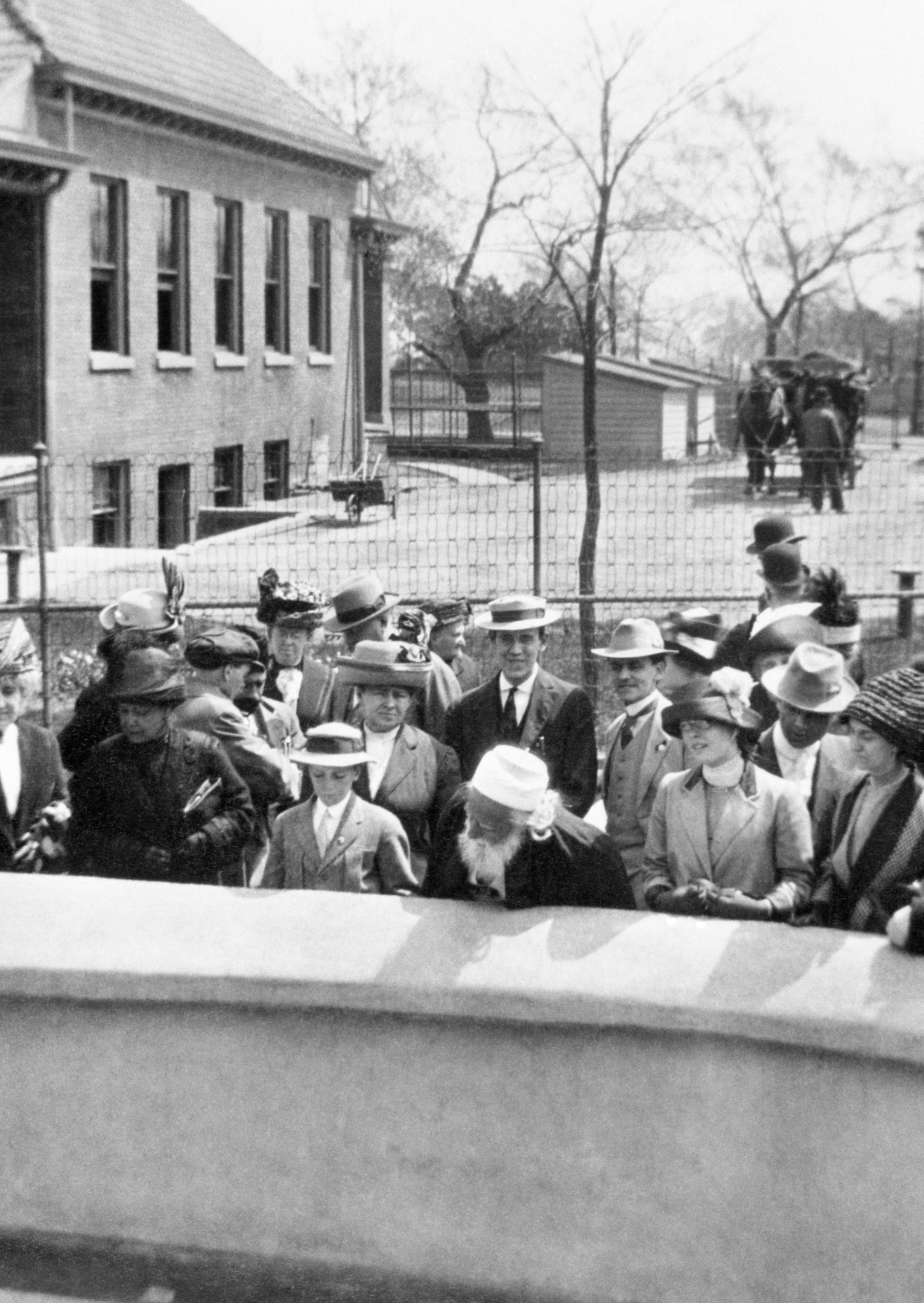
‘Abdu’l-Bahá at the Lincoln Park Zoo in Chicago, Illinois, 3 May 1912. Bahá'í Media Bank.
After the dedication of the Temple site, 'Abdu'l-Bahá spends some time in Chicago and gives talks. He has the habit of walking in Chicago's Lincoln Park whenever 'Abdu'l-Bahá visits Chicago, and before He leaves the city in May 1912, He visits the Lincoln Park Zoo with about 20 Bahá'ís.
Writing in Star of the West, Volume 3, Issue 4, Honoré Jaxon tells us what this stroll with 'Abdu'l-Bahá was like:
Near the lakeward side of the middle portion of the park is an unusually well stocked zoological department. The many strange and beautiful forms of bird and animal life herein presented proved very interesting to Abdul-Baha, as he walked among them with a manner which somehow reminds one of the legends of St. Francis of Assisi, and the all-consciousness said to have been displayed by that lovable saint in his communings with the birds and animals of his day; and it was here that Abdul-Baha was moved to grant permission for the first of the pictures taken during this stroll—the occasion chosen being at a time when the cortege found itself grouped very conveniently for camera purposes between two lines of iron palisade.
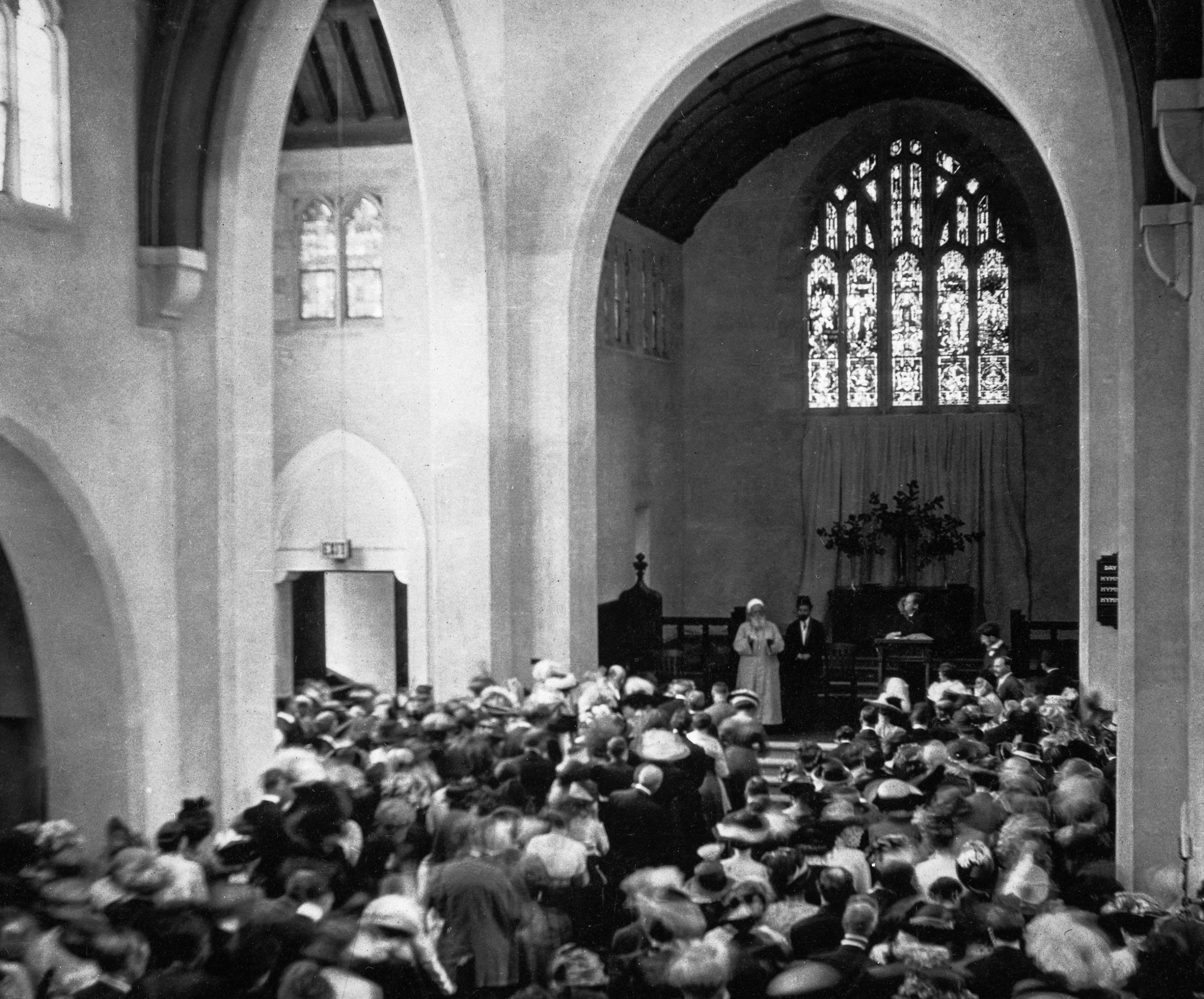
‘Abdu’l-Bahá addressing a large gathering at the Plymouth Congregational Church, Chicago, Illinois, 5 May 1912. Bahá'í Media Bank.
On His last day in Chicago, a Sunday, 'Abdu'l-Bahá gives a moving address at Plymouth Congregational Church in Chicago. The rector of this church, Dr. Joseph A. Milburn has seen and heard 'Abdu'l-Bahá several times and is greatly attracted to the Master. After the church service, Dr. Milburn says these words:
Having heard of the teachings and the peerless qualities of ’Abdu’l-Bahá, I arranged to leave for ‘Akká. Then I was informed that ‘Abdu’l-Bahá, Himself, was coming to America. Now God has endowed us with a great blessing that ‘Abdu’l-Bahá has graced us with His presence here.
Mahmúd-i-Zarqání, Mírzá. Mahmúd’s Diary Chronicling ʻAbdu’l-Bahá’s Journey to America
The Rector then summarizes the history and teachings of the Bahá’í Faith for his congregation and introduced ‘Abdu’l-Bahá as the “Herald of Peace and the Son of God.” As the Master approaches the pulpit, the congregation rises to their feet, and although they are in church, they greeted 'Abdu'l-Bahá with prolonged applause and cheers of joy. In His talk, 'Abdu'l-Bahá speaks about the material and spiritual "center of illumination", the spiritual cycles of the physical sun and the Sun of Reality, His hope for a united world without war, the material and the heavenly civilization, and ends with a chanted prayer for the congregation in His melodious voice.
The hearts of the congregation are so enkindled by the experience it seems that the entire church is filled with the Holy Spirit. People crowd so tightly around `Abdu'l-Bahá it becomes difficult for Him to leave. People surround Him to shake His hand and ask for His blessing. This reaction is typical after most of 'Abdu'l-Bahá's public talks, and although most people in the audience are hearing about the Bahá'í Faith for the first time, they become so attracted to 'Abdu'l-Bahá that they follow the Master in their cars from one talk or meeting to another.
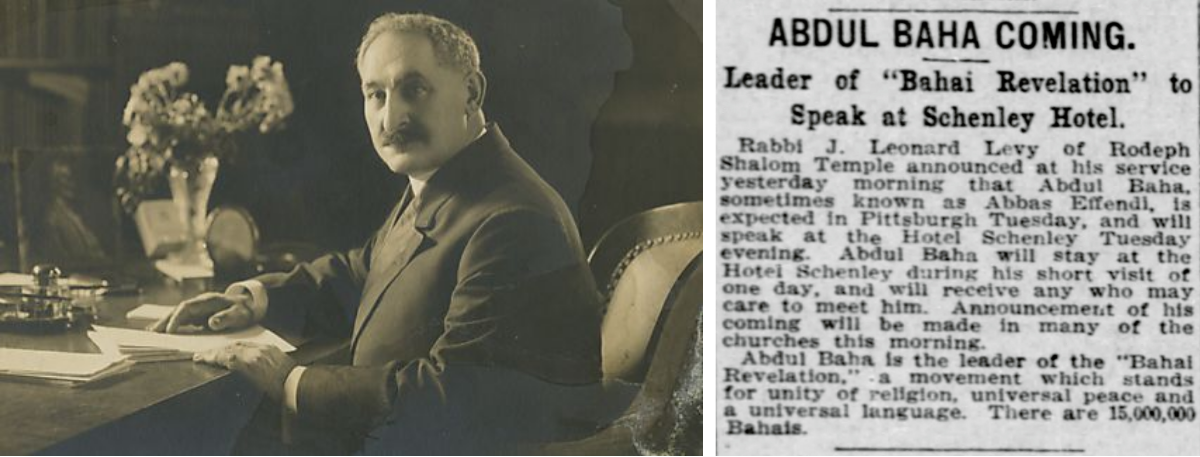
Left: Rabbi J. Leonard Levy of Pittsburgh, who invited ‘Abdu'l-Bahá to speak. Historic Pittsburgh; Right: Pittsburgh Post-Gazette article of May 5, 1912, on page 12; this is one of several Pittsburgh articles announcing ‘Abdu'l-Bahá's visit to the city. Newspapers.com
‘Abdu'l-Bahá changed his schedule to accept an invitation from Rabbi J. Leonard Levy, who had invited the Master to speak in Pittsburgh, a previously unscheduled event. Over the course of the previous two days, ‘Abdu'l-Bahá had spoken several times in Chicago on May 5, at the Children’s Meeting at the Hotel Plaza in Chicago, at Plymouth Congregational Church and at All-Souls Church in Lincoln Center. The next day, May 6, ‘Abdu'l-Bahá spoke in Chicago and in Cleveland, Ohio in two locations, first at Euclid Hall and later at the Sanatorium of Dr. C. M. Swingle in Cleveland, Ohio.
There may also have been several more meetings, as these are only the ones recorded in The Promulgation of Universal Peace. And so, with such a tightly-packed schedule of speaking engagements, ‘Abdu'l-Bahá still made a detour to Pittsburgh, specifically to honor Rabbi Levy's invitation and speak on Tuesday, May 7, 1912 in the grand ballroom of the prestigious Schenley Hotel, to an audience of around 400 listeners.
Abdu'l-Bahá and Rabbi Levy share convictions. They are both advocates for interracial equality at a time when this is an unpopular attitude. Rabbi Levy gave a lecture series at the Tuskegee Institute for 2,000 black teachers in 1903. In 1904, Rabbi Levy delivered the commencement address at the all-black Howard University (where ‘Abdu'l-Bahá spoke in 1912). And in 1905, Rabbi Levy had invited Booker T. Washington to preach inside the Rodef Shalom synagogue.
Seven years later, ‘Abdu'l-Bahá speaks at Rabbi Levy's invitation and he speaks on the "teachings and principles of Baha’u’llah, briefly presented so that you may be informed of their significance and purpose and find them a stimulus to your knowledge and actions."
To read more about this visit, please visit the Baha'i Teachings article by Dr. Christopher Buck entitled "Champions of Unity: Abdu’l-Baha and Rabbi J. Leonard Levy," which formed the basis for this article.
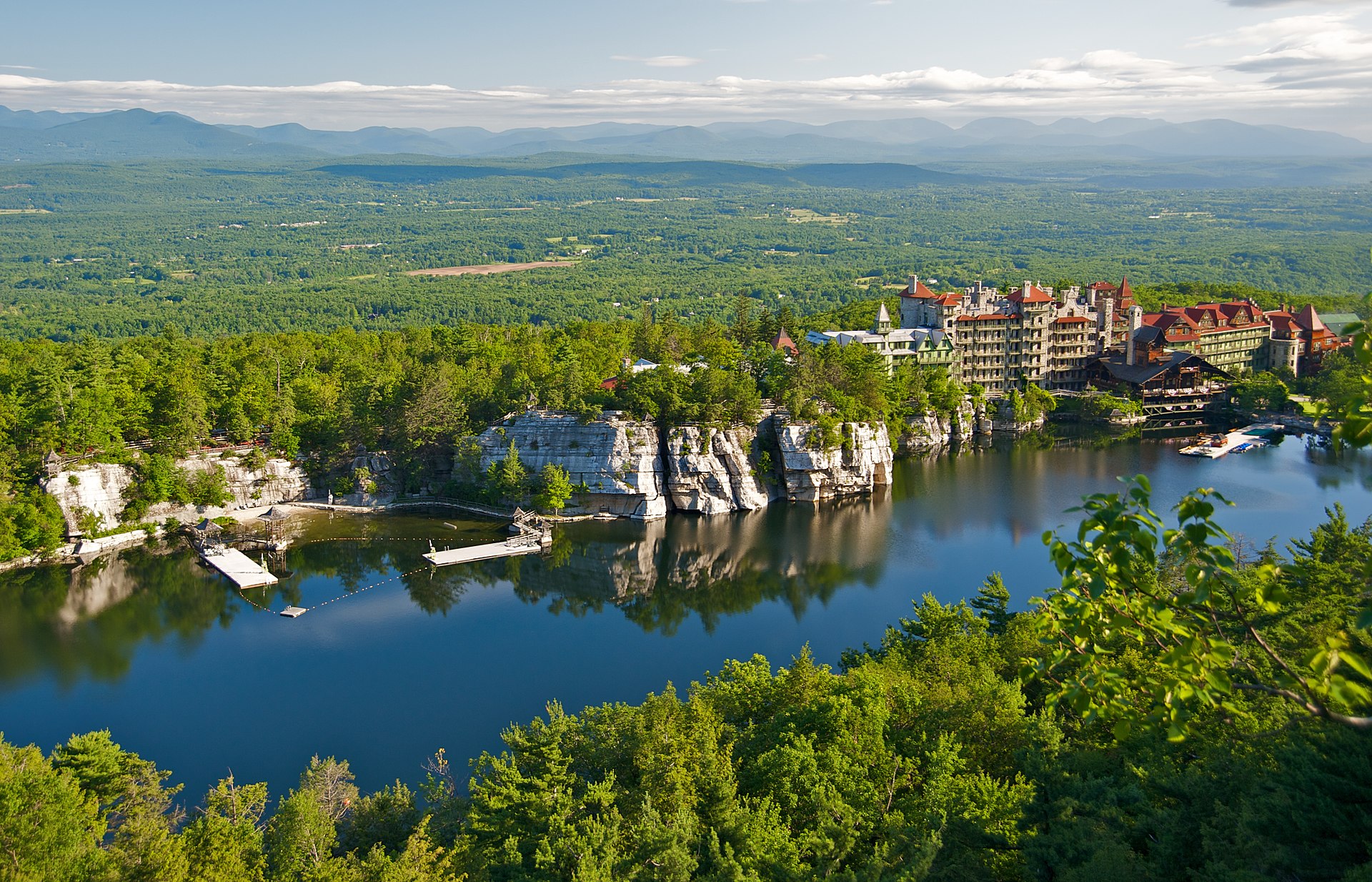
Lake Mohonk Mountain House, the hotel where the Lake Mohonk Peace Conference is held, modern view for the colors and breathtaking landscape. Fred Hsu. Wikipedia Commons.
On May 14, 1912, 'Abdu'l-Bahá leaves New York to attend the Eighteenth Annual Lake Mohonk Conference on International Arbitration four hours away by train in New Paltz, New York, to which He has been invited. The Lake Mohonk conference is the foremost peace conference in America, and has been held since 1895 at the Mohonk Mountain House, a gorgeous resort hotel, nested in the Shawangunk Ridge, just beyond the southern border of the Catskill Mountains right on Lake Mohonk, amidst breathtaking scenery. Albert K. Smiley, a Quaker and founder of the Mohonk Mountain House, sponsors the conference to improve the living standards of Native American Indian populations.
When 'Abdu'l-Bahá arrives, He praises the stunning natural beauty and the scenic grandeur of the landscape, during His one-hour carriage ride from the train station to the Mohonk Mountain House. They drive through wooded hills, green valleys, woodlands, natural springs and waterfalls.
The most famous and illustrious names in the peace movement attend this conference, from all corners of the world, who will all hear the words of 'Abdu'l-Bahá and be exposed to the Bahá'í Teachings on peace and unity. A few of the participants are listed below:
Dr. Christian L. Lange, Secretary of the Inter-parliamentary union and 1921 Nobel Peace Prize;
Dr. Albert Gobat, Director of the International peace bureau and 1902 Nobel Peace Prize;
Dr. Otfried Niepold of Germany, professor of International Law in Berne University;
J.P. Santamarina, an Argentinian politician;
Justice William R. Biddle of the Ontario High Court of Justice;
William C. Denis of Washington;
Albert K. Smiley, founder of Lake Mohonk Conference on International Arbitration;
Nicholas Murray Butler, 12th President of Columbia University;
Samuel T. Dutton, Superintendent of schools, Columbia University and Founder, New York Peace Society;
Col. Stuart L. Woodford, member of the United States House of Representatives and Lieutenant Governor of New York;
Salvador Castrillo, Minister of Nicaragua, Architect of Knox-Castrillo Treaty (1911), Member Nicaragua/Honduras Border Commission;
Justice William Renwick Riddell, Justice of the Supreme Court of Ontario;
Rev. Jenkin Lloyd Jones, who hosted ‘Abdu’l-Bahá at the Abraham Lincoln Center in Chicago nine days earlier.
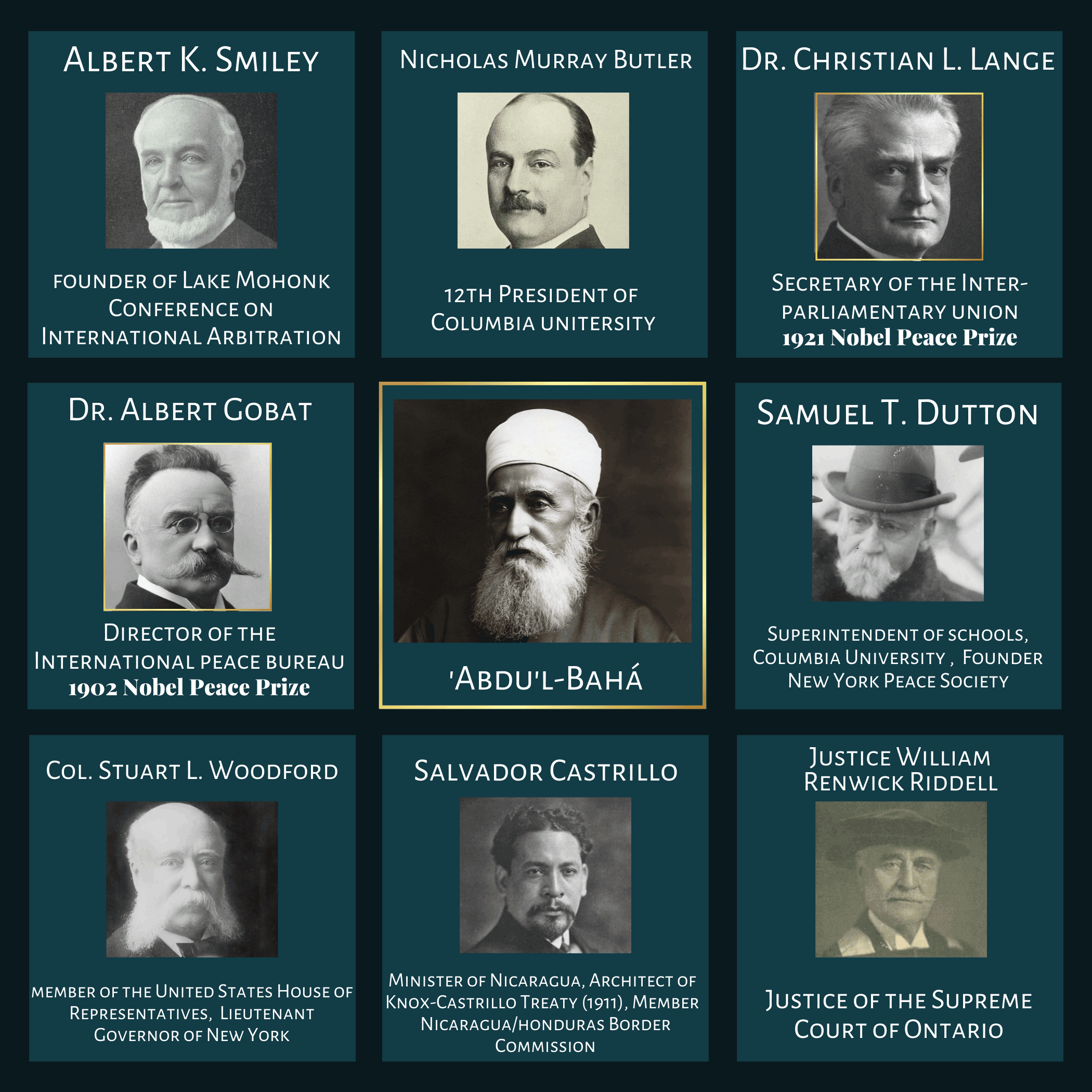
Some of the most illustrious participants at the 18th Annual Lake Mohonk Conference on International Arbitration, May 15-17, 1912. Original graphic by Violetta Zein. Information and photos from The Washburn Leader of Washburn, North Dakota
Friday, May 17, 1912 article: Discussing Arbitration: Eighteenth Meeting of the Annual Lake Mohonk Conference Opens from Newspaper.com, Wikipedia and Wikimedia Commons, The Nobel Prize website, Bahá'í World News Service and the Bulletin of the Pan-American Union, Volume 35.
The conference lasts three days, with two long sessions each day held in a spacious hall, with a view of the lake, especially built by Albert K. Smiley for the purpose of this conference. On the second evening, ‘Abdu’l-Bahá’s name is at the top of the program. Albert Smiley, president [of the International Peace Society, introduces the Master with utmost respect and words of praise, then 'Abdu'l-Bahá opens the second session of the Conference speaking after a Nobel Prize Winner, Dr. Albert Gobat the previous day, and before Salvador Catrillo, an eminent South American politician, Minister of Nicaragua, architect of the 1911 Knox-Castrillo Treaty and member the Nicaragua/Honduras Border Commission. 'Abdu'l-Bahá speaks on The Oneness of the Reality of Mankind.
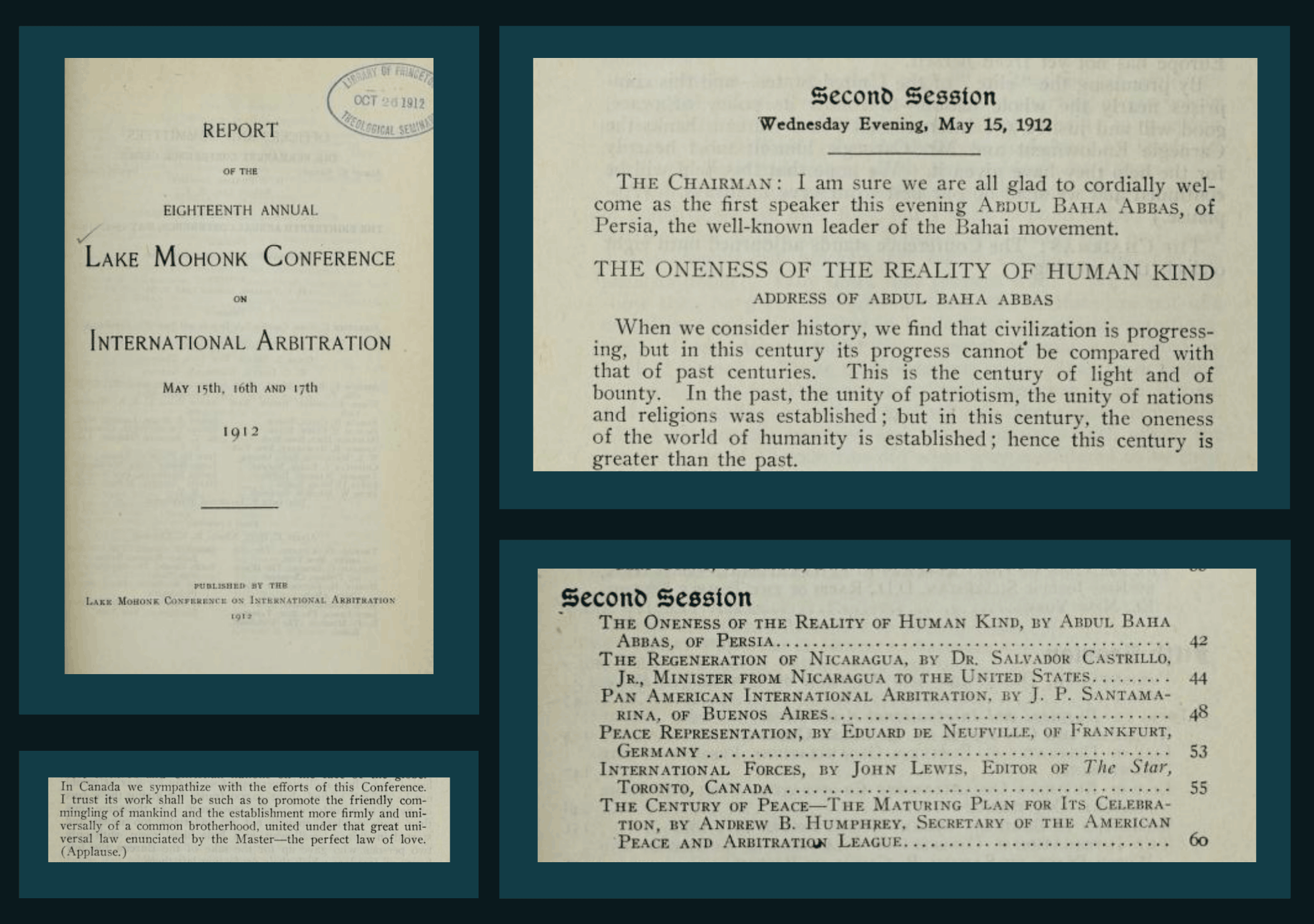
Collage of the Program of the Eighteenth Annual Lake Mohonk Conference on International Arbitration, May 15 - 17, 1912. Front page of the Program, page 4, Start of 'Abdu'l-Bahá's speech on Day 2 and His introduction by Oscar S. Straus, an American politician and diplomat and the Chairman of the Conference, page 42, Listing of 'Abdu'l-Bahá's name in the program of the Second Session, page 8, and on the bottom left, passing mention to 'Abdu'l-Bahá and the Bahá'í teachings on "the perfect law of love", which is followed by applause. Original Graphic by Violetta Zein. Program available on the Internet Archive.
After a day spent discussing material concerns for peace and problems particular to the United States, 'Abdu'l-Bahá’s spiritual perspective on the oneness of mankind, brings a new spirit and excitement among the delegates. 'Abdu'l-Bahá’s widens the conversation by addressing the reformation of the whole world through the promulgation of the Bahá’í teachings of universal peace to bring about the oneness of the entire humankind, in just twenty minutes. After His warmly-applauded address, one by one, dignitaries of various countries come to shake His hand, some embrace 'Abdu'l-Bahá and thank Him. Albert Smiley once again praises 'Abdu'l-Bahá, and speaks about the Bahá'í with reverence. His wife even offers the Master a pendant made especially for the Lake Mohonk Conference.
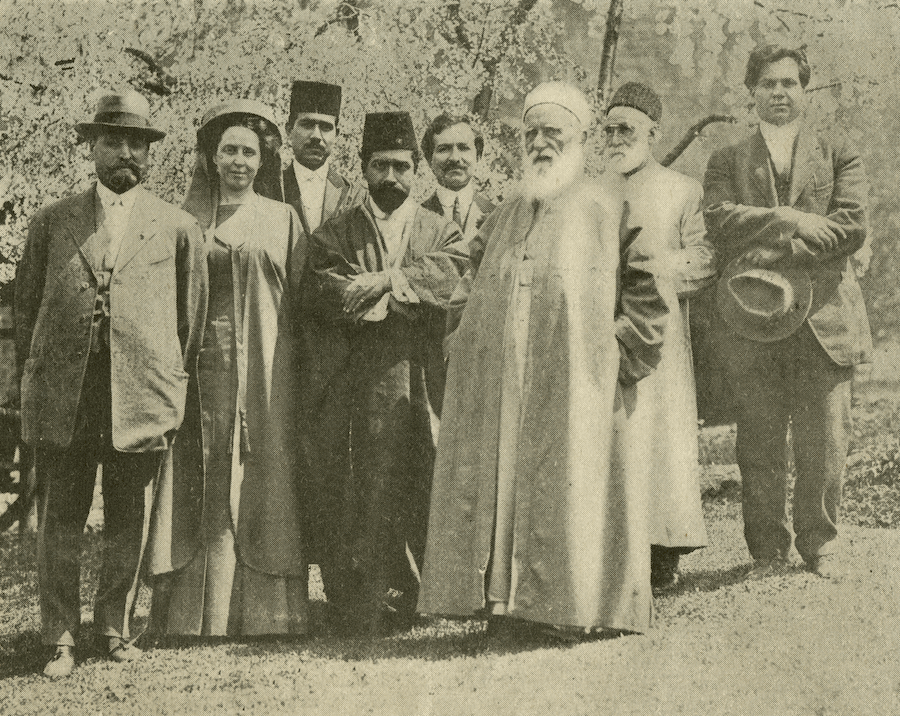
'Abdu'l-Bahá with Bahá'ís at the Lake Mohonk Conference on International Arbitration, May 14-16, 1912. Left to right: Left to right: Dr. Edward Getsinger, Lua Getsinger, Dr. Amín Fareed, Ahmad Sohrab, Mírzá Vargha, Siyyid Asadu’lláh, Dr. Zia Baghdadi.
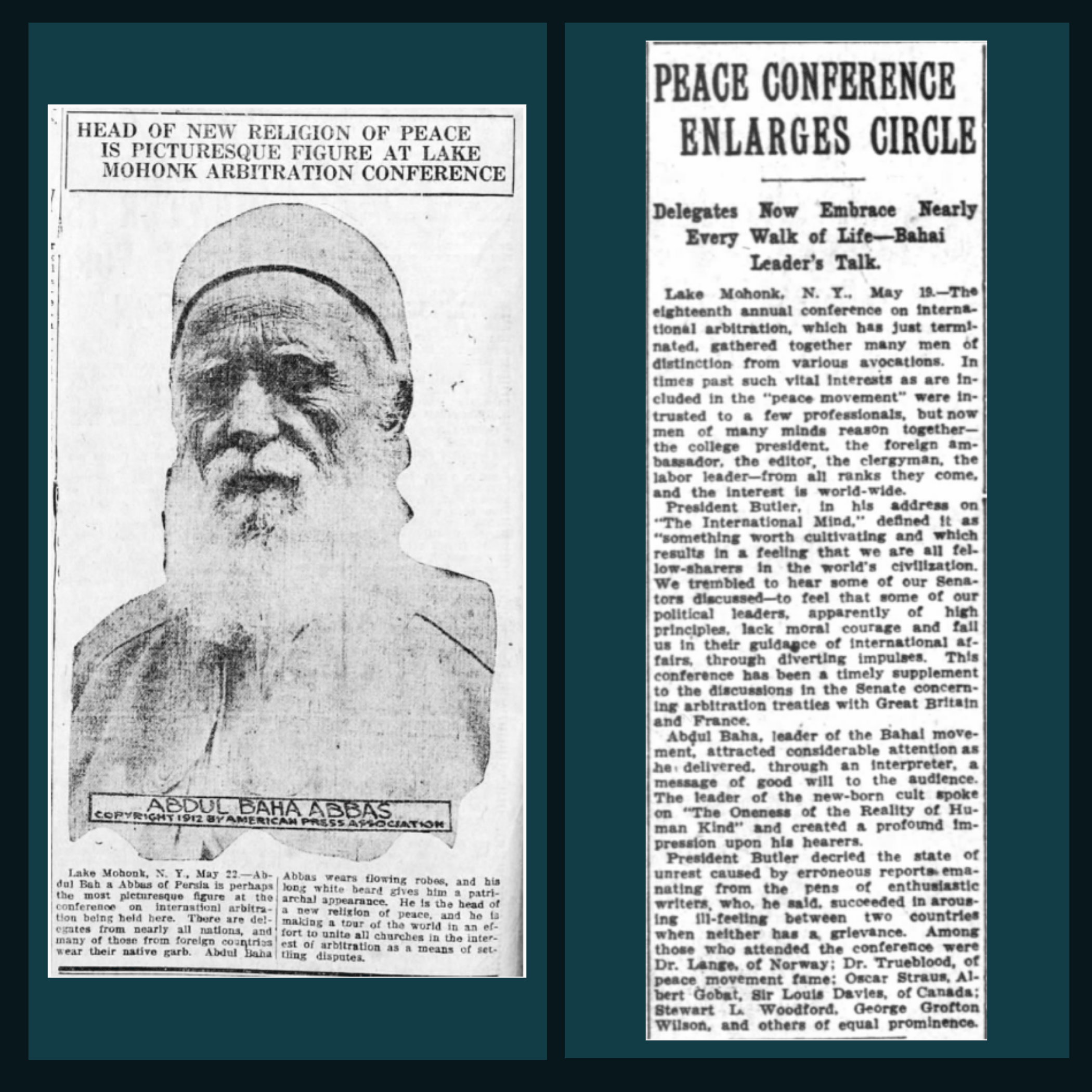
Newspaper article on the left: The Ogden Standard from Ogden, Utah, dated Thursday, 23 May 1912, on page 8: Head of New Religion of Peace is Picturesque at Lake Mohonk Arbitration Conference, from Newspapers.com, contributed to the chronology by Steven Kolins.
Newspaper article on the right: The Washington Herald from Washington, D.C., dated Monday, May 20, 1012, on page 2: Peace Conference Enlarges Circle: Delegates Now Embrace Nearly Every Walk of Life–Baha'i Leader's Talk, from Newspapers.com.
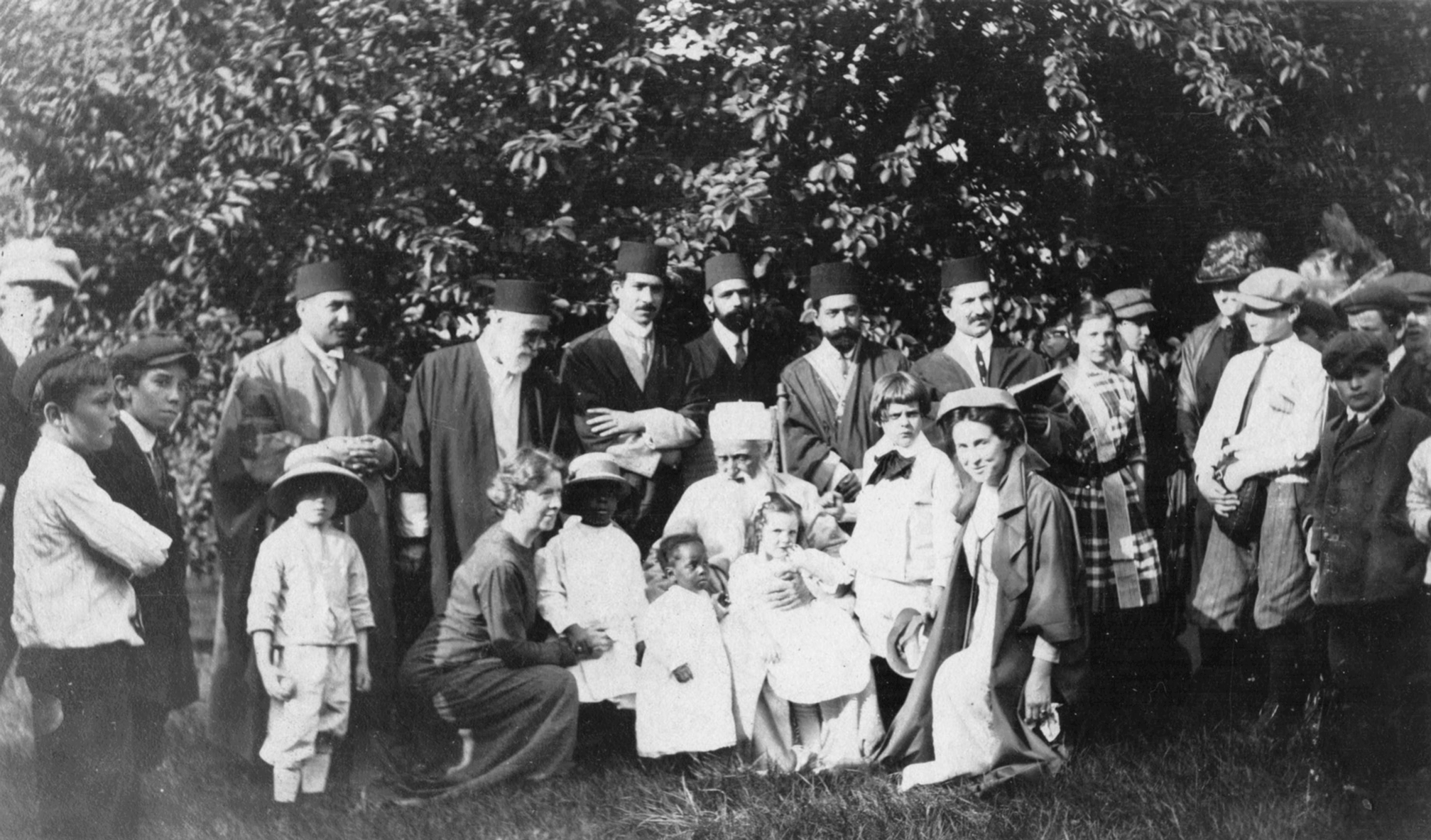
Photographic still from the original film taken of `Abdu’l-Bahá on June 18, 1912, by the Special Event Film Manufacturing Co., New York, at the home of Howard and Mary MacNutt, 935 Eastern Parkway, Brooklyn. On that occasion, “the Master” said: “The souls of little children are as mirrors upon which no dust has gathered.” Photo credit: United States National Bahá'í Archives. Photo caption from Christopher Buck's 2013 article "Abdu'l-Baha's 1912 Howard University Speech: A Civil War Myth for Interracial Emancipation".
The story of the filming of 'Abdu'l-Bahá is a magnificent example or perspective. The Bahá'ís are looking at the situation in the short-term, but 'Abdu'l-Bahá was, as usual, instantly perceives the long-term significance and effect of the event. Shortly after 'Abdu'l-Bahá arrives in New York, a commercial movie company requests to make a short film of the Master for their newsreels. At once, 'Abdu'l-Bahá replies "Khaylí khúb!" (Very good). When the friends become upset and explain to 'Abdu'l-Bahá the film will be scattered throughout the country and used in movie, houses, 'Abdu'l-Bahá replies: : "Bisyár khúb" (Very well!).
On the day of the shoot, (we could not find a date for this film), 'Abdu'l-Bahá appears in front of the Hotel Ansonia for the making of a short film. It is a powerful moment. 'Abdu'l-Bahá approaches the camera while imploring Bahá'u'lláh to bless this means for the spreading of the Heavenly Cause throughout the world. The Bahá'ís had been worried about the spreading of the film of 'Abdu'l-Bahá, but the Master Himself, had already perceived the power of this new media and its influence in the world, and this scene is not so much a cameraman filming 'Abdu'l-Bahá as it is 'Abdu'l-Bahá blessing a new medium of communication.
Eventually, the Bahá'ís decide to make a longer film in which 'Abdu'l-Bahá will appear in several scenes. 'Abdu'l-Bahá agrees immediately, and makes every effort to complete the movie after several weather-related delays. The shoot finally takes place at the home of Mr. And Mrs. MacNutt at 935, Eastern Parkway in Brooklyn on June 19, 1912 and the movie has several scenes with 'Abdu'l-Bahá. Some parts of the film are shaky, and 'Abdu'l-Bahá is not always in the frame, but when He sees the film, and most particularly the final scene, 'Abdu'l-Bahá is pleased.
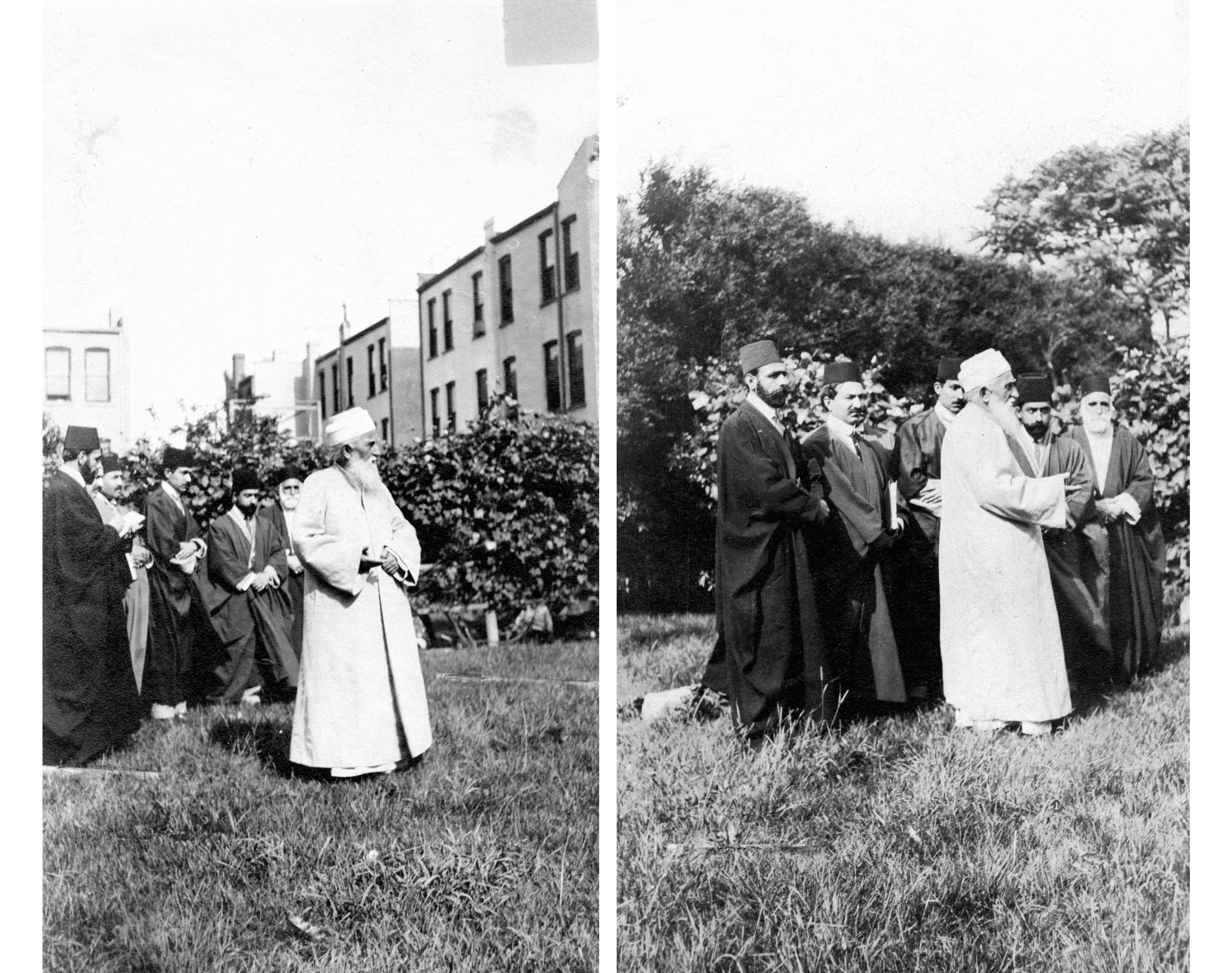
Two photographs taken during the filming of a scene of the movie shot on June 18, 1912 in Brooklyn, at the home of Howard MacNutt. Courtesy of the United States National Bahá'í Archives.
The final scene of the film shows 'Abdu'l-Bahá's utterances coming forth with wonderful intensity and power. This is also the day on which the Bahá'ís record 'Abdu'l-Bahá's voice on the Edison talking machine chanting a Tablet. The latter part of the recording of 'Abdu'l-Bahá's voice is played during Bahá'í pilgrimage in the Master's House d which can be read here on Bahá'í Reference Library., the Persian typescript can be read here on Adib Masumian's website. Below is a graphic displaying the English and Persian of the Tablet 'Abdul'-Bahá chants.
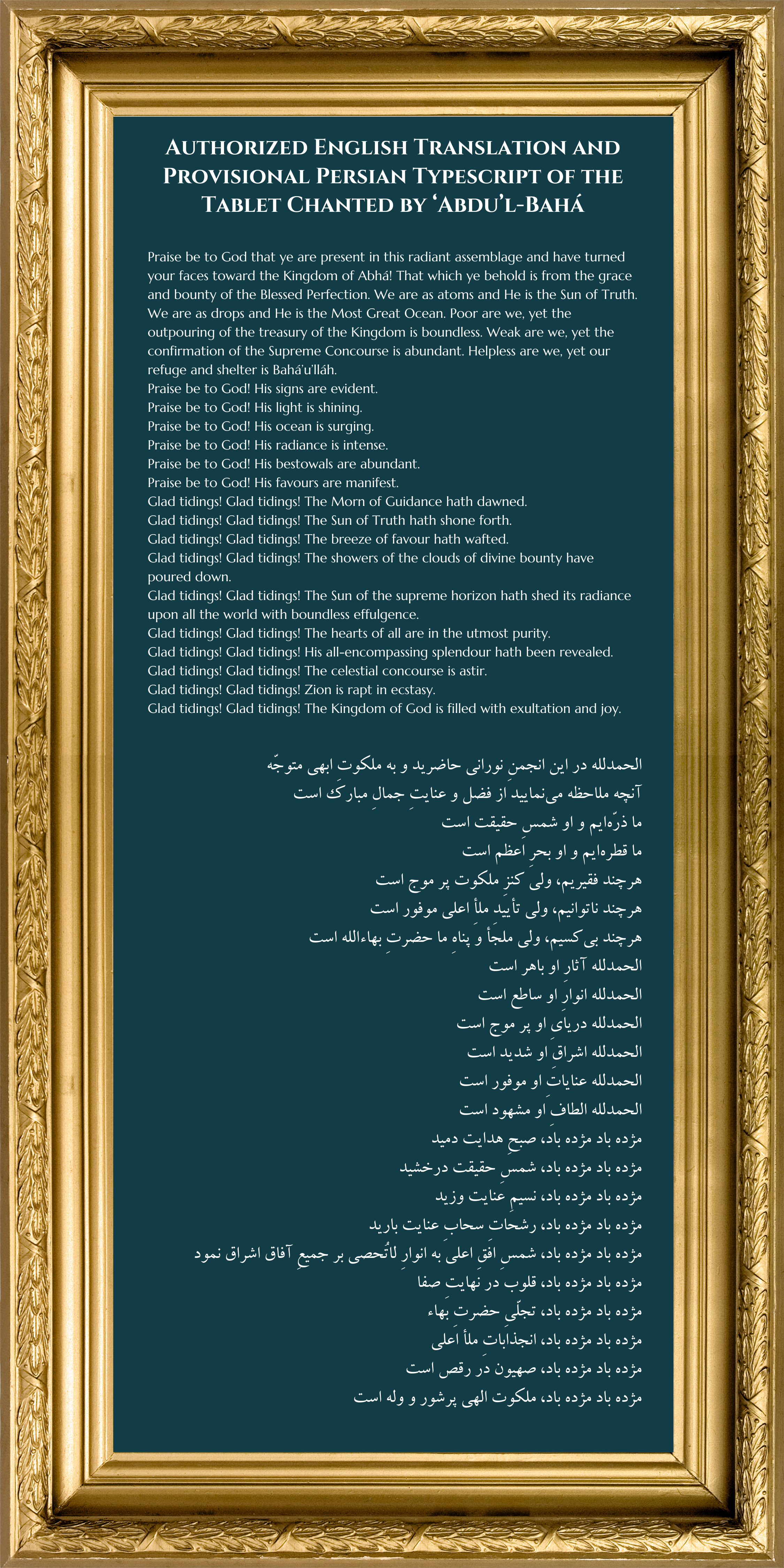
'Abdul-Baha's purpose in making this movie is for it to become an instrument of spreading the message of Bahá'u'lláh, which is at all times, His ultimate focus. The movie and recording are duplicated and sent to all the countries where Bahá'ís reside at the time, all the way to Egypt, Persia and India. The plan, approved by 'Abdu'l-Bahá is to distribute the film, the recording, and slides so that they can be experienced together, in order to have a powerful effect on the audience. The friends at the time are conscious of the long-term nature of the legacy they have just recorded:
The greatest effect will be apparent in those coming years' long after the Blessed Subject himself has passed from this world. Consider what this means! The beloved friends one hundred years from now will be able to see the form, face, and actions of the Beloved Centre of the Covenant; and even more, listen to the actual tone of his voice speaking the words which the pictures so eloquently portray. It is our hope and expectation that the exhibit of the moving picture of Abdul-Baha with its accessories, will become a most powerful instrument in this country for the spreading of the Most Great Message of Peace and Unity. May all Heavenly blessings follow this earnest effort.
Star of the West, Volume III, Number 10 (September 8, 1912), page 210.

Portrait of ‘Abdu’l-Bahá taken in New York, New York, December 1912. Bahá'í Media Library.
Wednesday, June 19, 1912 is a historic day for the Bahá'ís of New York.
In the early morning before He calls Juliet Thompson in to paint His portrait for their fourth sitting, 'Abdu'l-Bahá speaks to believers in in the English basement of Juliet's apartment at 48 West Tenth Street. In New York City apartments like Juliet's called brownstones, the English basement is the first floor that is half above and half below ground, it's not a real basement. As He is walking down the stairs from His room to the English basement, 'Abdu'l-Bahá passes in front of Lua Getsinger and Juliet Thompson, in the hall on the third floor of the house. The two women notice a peculiar energy in 'Abdu'l-Bahá's step as he walks down the stairs to speak to the believers:
We saw, and felt, as He walked down the upper flight, a peculiar power in His step--as though some terrific Force had possession of Him; a Force too strong to be caged in the body, sparking through, almost escaping His body, able to sunder it. I cannot begin to describe that indomitable step, its fearful majesty, or the strange flashing of His eyes.
Thompson, Juliet and Marzieh Gail. The Diary of Juliet Thompson
Sometime later that morning, 'Abdu'l-Bahá calls Juliet in to begin painting. Lua Getsinger is sitting nearby on a couch and Juliet has just begun to work, when 'Abdu'l-Bahá smiles at Juliet and says "This makes me sleepy. What shall I do?" Juliet asks Lua, whose Persian is better than hers, to tell the Master if He needs to rest, she can paint while He sleeps:
But I found that I could not. What I saw then was too sacred, too formidable. He sat still as a statue, His eyes closed, infinite peace on that chiselled face, a God-like calm and grandeur in His erect head. Suddenly, with a great flash like lightning He opened His eyes and the room seemed to rock like a ship in a storm with the Power released. The Master was blazing. "The veils of glory", "the thousand veils", had shrivelled away in that Flame and we were exposed to the Glory itself. Lua and I sat shaking and sobbing. Then He spoke to Lua. I caught the words, "Munádíy-i-‘Ahd." (Herald of the Covenant). Lua started forward, her hand to her breast. "Man?" (I?) she exclaimed.
"Call one of the Persians. You must understand this."
Never shall I forget that moment, the flashing eyes of 'Abdu'l-Bahá the reverberations of His Voice, the Power that still rocked the room. God of lightning and thunder! I thought.
"I appoint you, Lua, the Herald of the Covenant. And I AM THE COVENANT, appointed by Bahá'u'lláh. And no one can refute His Word. This is the Testament of Bahá'u'lláh. You will find it in the Holy Book of Aqdas. Go forth and proclaim, 'This is THE COVENANT OF GOD in your midst.'"
A great joy had lifted Lua up. Her eyes were full of light. She looked like a winged angel. "Oh recreate me," she cried, "that I may do this work for Thee!"
Thompson, Juliet and Marzieh Gail. The Diary of Juliet Thompson
After this extraordinary event, where Lua Getsinger and Juliet Thompson witness the power of the Covenant radiating from 'Abud'l-Bahá, the Master sends Lua, now the "Herald of the Covenant," downstairs to the believers who have been waiting and instructs her to "proclaim the Covenant." A short time later, 'Abdu'l-Bahá Himself rejoins the believers and speaks on the station of the Center of the Covenant, but he does not reveal the power of the Covenant to the believers the way He has done with Juliet and Lua, rather speaking cautiously, and later even striking some of the things he has said to them from their notes. It is on this historic occasion that 'Abdu'l-Bahá reads the Súriy-i-Ghuṣn (the Tablet of the Branch), revealed by Bahá'u'lláh in Edirne for the express purpose of unveiling of the station of ʻAbdu’l-Bahá. In this important Tablet, Bahá’u’lláh makes several significant statements about ʻAbdu’l-Bahá’s exalted rank and mysterious station, referring to Him as a “sacred and glorious Being,” the “Branch of Holiness,” the “Limb of the Law of God,” and states emphatically about 'Abdu'l-Bahá:
Whosoever turns to Him hath surely turned to God and whosoever turneth away from Him hath turned away from my Beauty, denied My Proof and is of those who transgress.
This is why New York City is known as the "City of the Covenant."
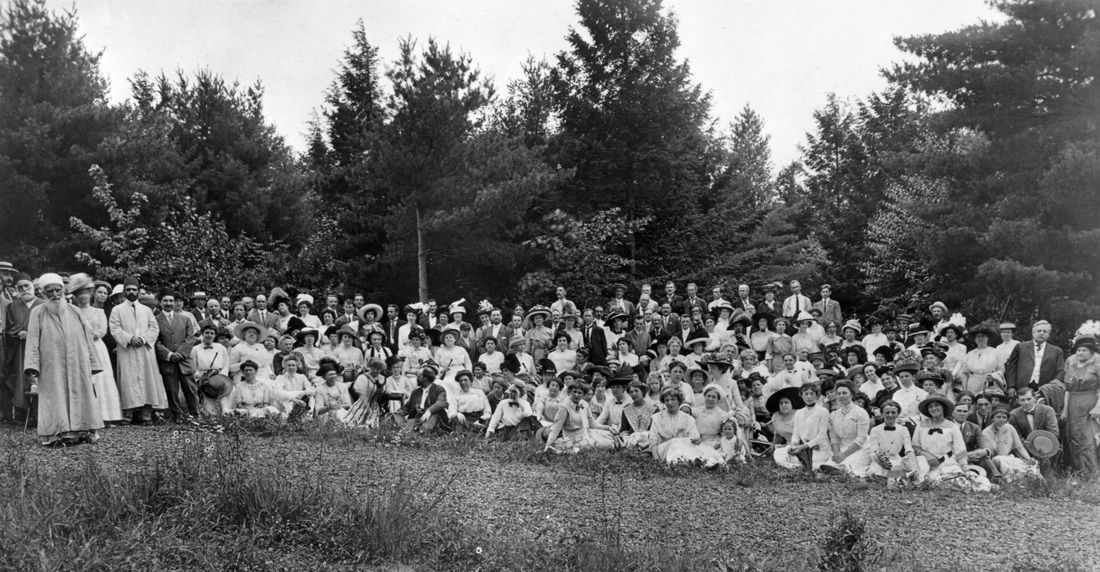
Abdu'l-Bahá's Unity Feast - West Englewood, June 29, 1912. United States National Bahá'í Archives.
Race unity is possibly the most concrete expression of the oneness of mankind, and throughout 'Abdu'l-Bahá’s Journeys through America, it is one of His priorities. He organizes two Unity Feasts during His stay in the United States, one in April in Washington D.C. at a hotel, which though not 'officially' segregated by law, did not allow blacks because of racial attitudes (see Redman, Earl. ‘Abdu’l-Baha in Their Midst, page 98) and a second one on the grounds of Roy Wilhelm’s house in West Englewood (now Teaneck), New Jersey on Sunday, June 29, 1912.
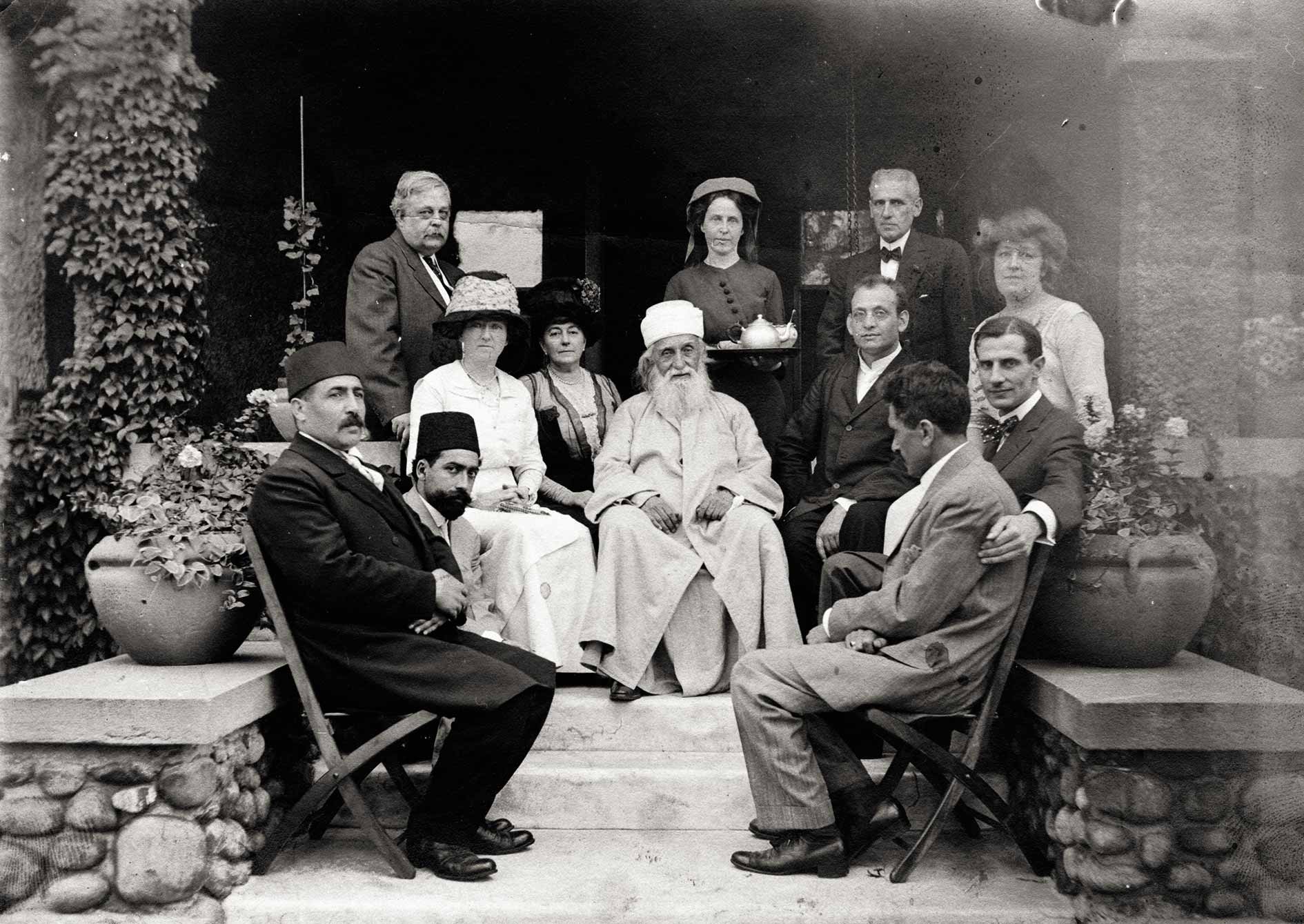
‘Abdu’l-Bahá at Roy Wilhelm’s home in Englewood, New Jersey. Mr. Wilhelm is seated on the right, looking at the camera. National Bahá’í Archives
That morning, ‘Abdu'l-Bahá leaves Montclair, New Jersey, where He has been staying since June 21 (see timeline) at 8:30 in the morning and, after passing through New York and changing trams four times, crossing the Hackensack river twice, He arrives in West Englewood and rests at Roy Wilelhm’s house for a while before heading to the shade of a grove of tall pine trees, where the Unity Feast takes place. The full address of 'Abdu'l-Bahá is available here, but His words about the destiny of America are momentous:
This is a new Day, and this hour is a new Hour in which we have come together. Surely the Sun of Reality with its full effulgence will illumine us, and the darkness of disagreements will disappear. The utmost love and unity will result; the favors of God will encompass us; the pathway of the Kingdom will be made easy. Like candles these souls will become ignited and made radiant through the lights of supreme guidance. Such gatherings as this have no equal or likeness in the world of mankind, where people are drawn together by physical motives or in furtherance of material interests, for this meeting is a prototype of that inner and complete spiritual association in the eternal world of being.
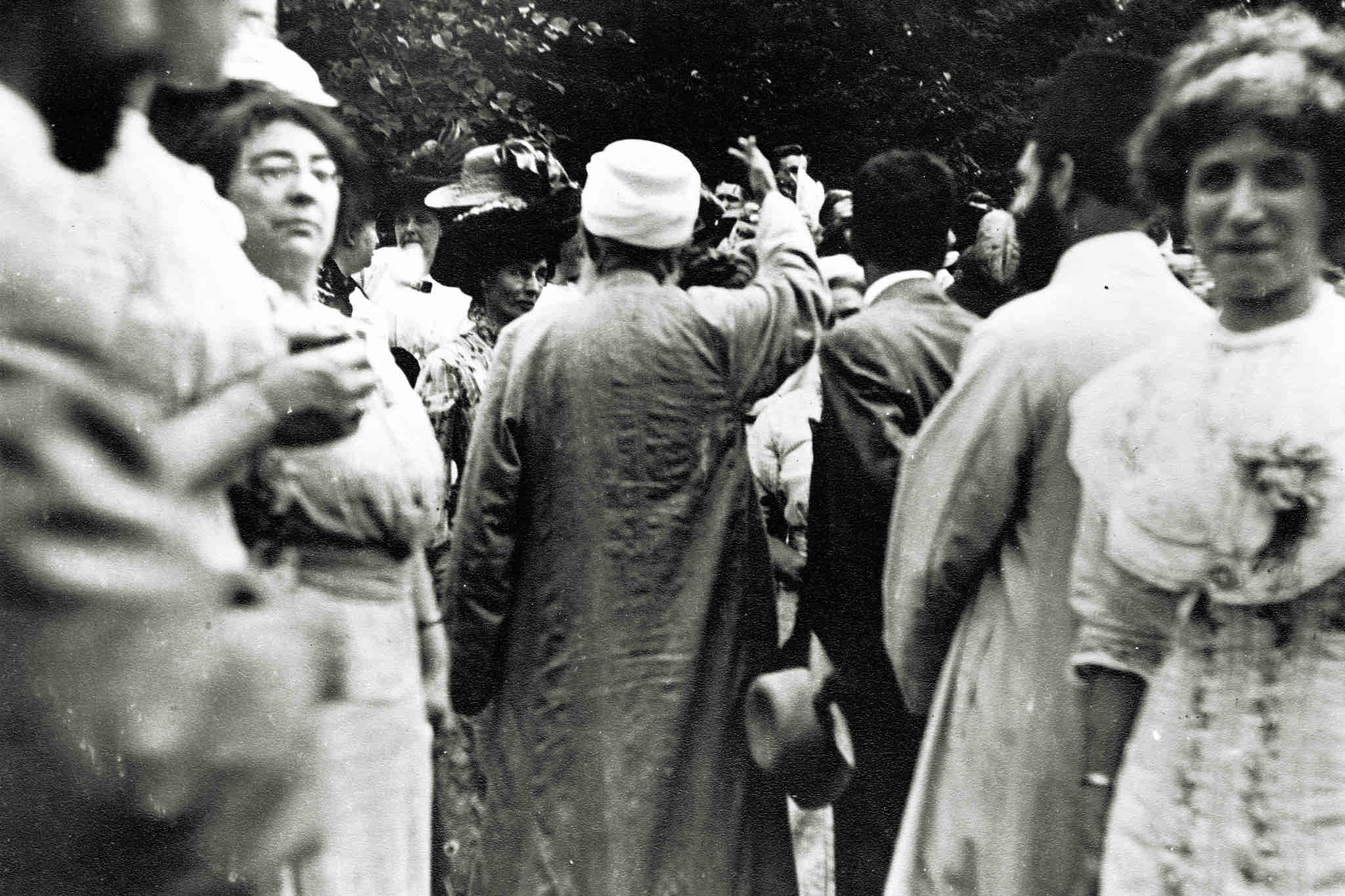
Abdu'l-Bahá's greeting guests at the Unity Feast - West Englewood, June 29, 1912. United States National Bahá'í Archives.
After 'Abdu'l-Bahá’s address, the friends eat a delicious meal of Persian rice pilau, a delicacy, sherbet, a Persian drink and many sweets. The green lawn is strewn with fresh flowers, making it look like an embroidered carpet, on which 'Abdu'l-Bahá walks, in the fresh clean air, a gentle breeze blowing and He anoints the 250 seated guests with attar of rose on their foreheads. 'Abdu'l-Bahá agrees to have His photograph taken and is pictured in two groups. In one, He is seated in the rose garden with His Persian entourage, and in the other, He is pictured with the American friends. In His address, 'Abdu'l-Bahá speaks of the importance of this meeting:
This is a delightful gathering; you have come here with sincere intentions, and the purpose of all present is the attainment of the virtues of God. The motive is attraction to the divine Kingdom. Since the desire of all is unity and agreement, it is certain that this meeting will be productive of great results. It will be the cause of attracting a new bounty, for we are turning to the Kingdom of Abhá, seeking the infinite bestowals of the Lord
Perhaps one of the results of this meeting can be seen in the kindled life of service of Martha Root, who is present that day and became a Bahá'í in 1908. This meeting will be the high point of her unparalleled life of service. She will teach the Bahá'í Faith to Queen Marie of Romania, and circle the planet multiple times, traveling to more than 20 countries before falling in her tracks in Hawaii, a Hand of the Cause of God.
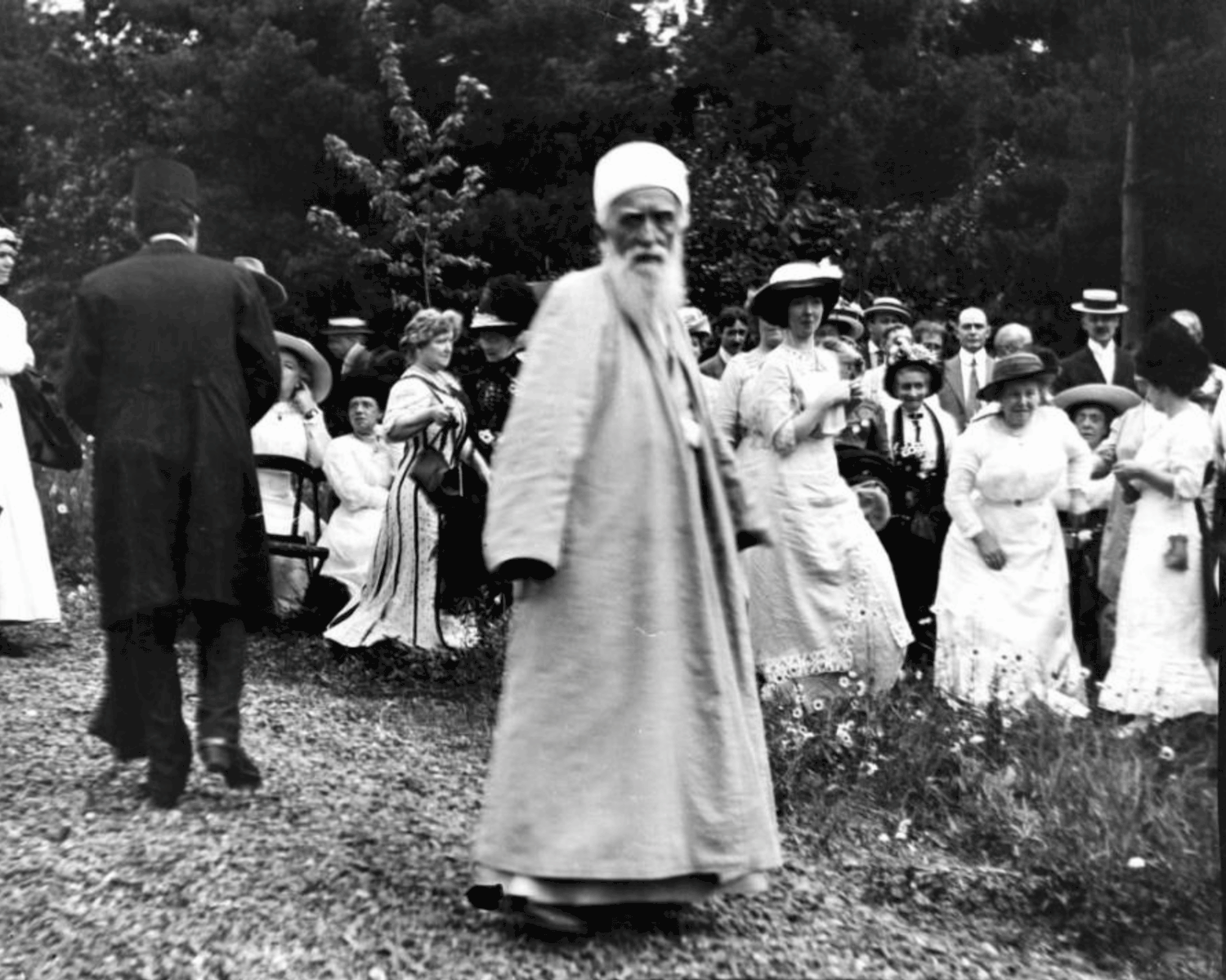
Abdu'l-Bahá's at the Unity Feast - West Englewood, June 29, 1912. United States National Bahá'í Archives.
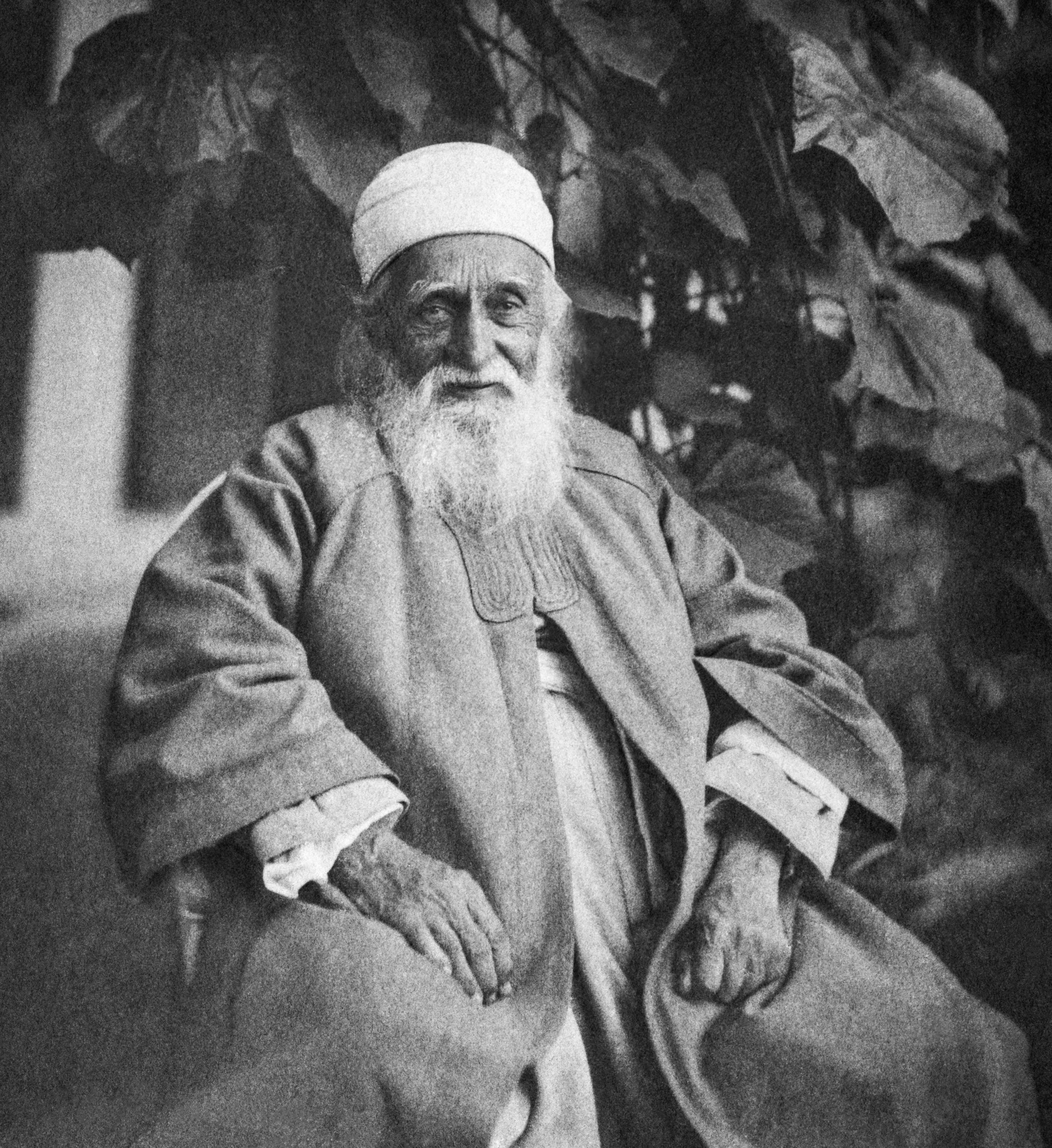
‘Abdu’l-Bahá in Dublin, New Hampshire, 26 July 1912. Bahá'í Media Bank.
This section is our very first one written by a guest writer. Earl Redman is a Bahá'í historian and writer, author of three (soon to be four) books on 'Abdu'l-Bahá pictured below: Visiting 'Abdu'l-Bahá - Volume I: The West Discovers the Master, 1897-1911, 'Abdu'l-Bahá In Their Midst - The Master's Travel to the West, on which this section is based, and Visiting 'Abdu'l-Bahá - Volume 2: The Final Years, 1913–1921, as well as Shoghi Effendi - Through the Pilgrim's Eye Volume 1: Building the Administrative Order 1922-1952, Shoghi Effendi - Through the Pilgrim's Eye Volume 2: The Ten Year Crusade 1953-1963, Knights of Bahá'u'lláh - The Stories of all the Knights of Bahá'u'lláh as well as two forthcoming books: The Apostles of Bahá'u'lláh and the Disciples of 'Abdu'l-Bahá, and 'Abdu'l-Bahá: The Mystery of God and the Servant of Bahá'u'lláh to be published by George Ronald.
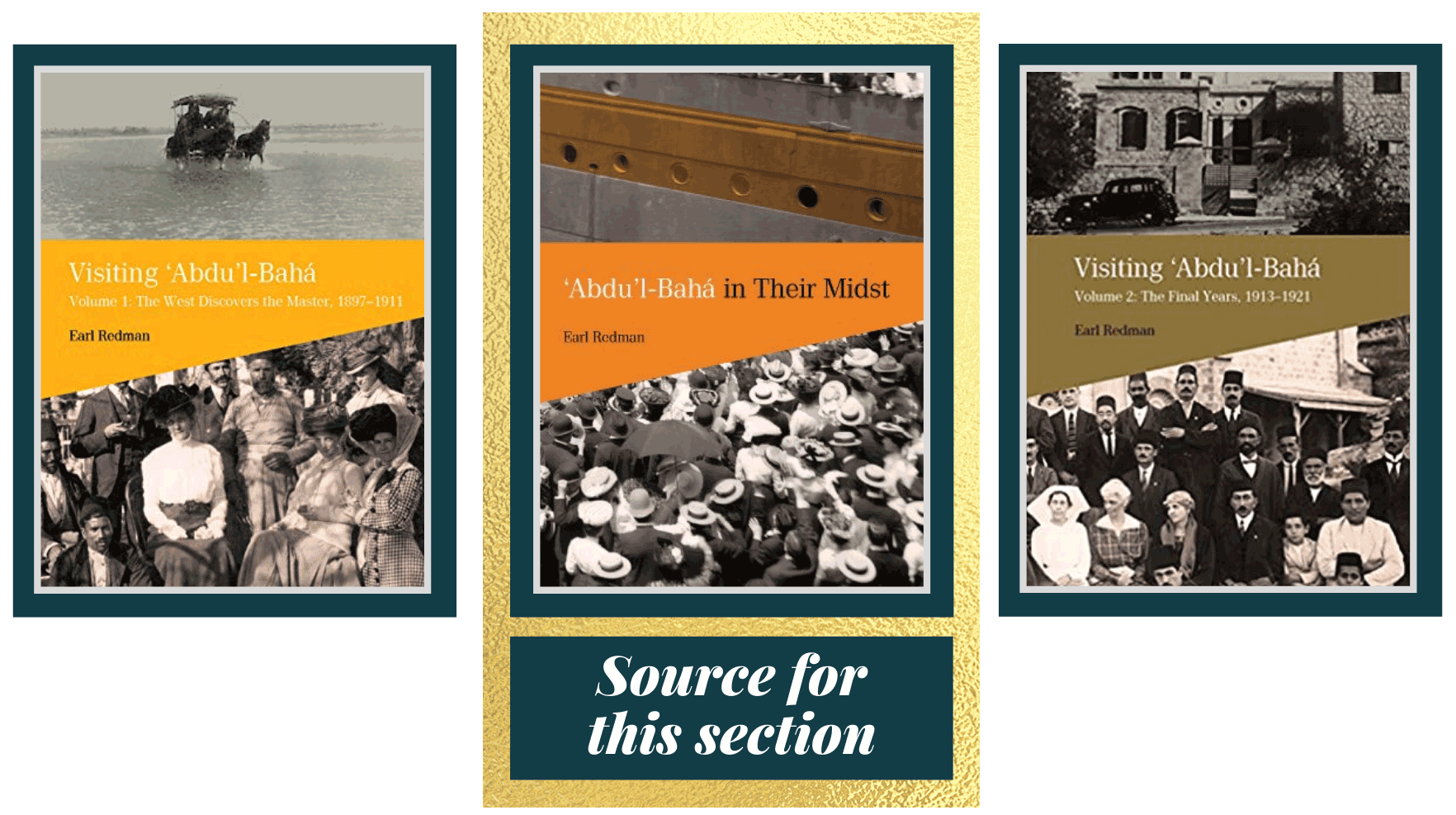
‘Abdu’l-Bahá was ‘very tired and weak’, and when Agnes Parsons wrote to him from her summer home in Dublin, New Hampshire, ‘begging Him to go there to meet some seekers after truth as well as for a change of surroundings and climate’, He accepted. ('Abdu'l-Bahá In Their Midst, p 152) Leaving New York at 8 o’clock on the morning of 23 July, He passed through Boston, staying two days at the Victoria Hotel. and arrived in Dublin on 25 July 1912 where He would spend three of His most peaceful weeks in North America. It was His longest stay in any single place except New York from 30 June – 13 July 1912, before leaving for Boston.
Agnes Parsons (1861-1934)
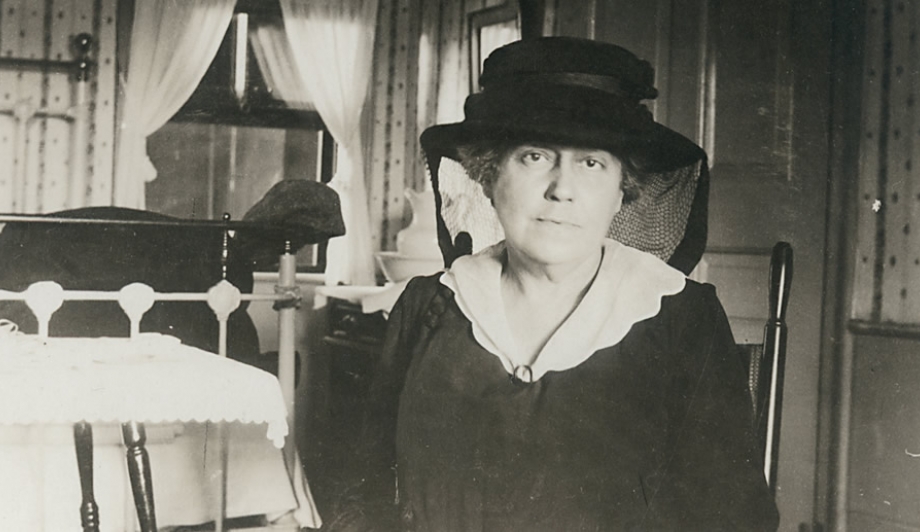
Portrait of Agnes Parsons (1861-1934), date unknown. 'Abdu'l-Bahá in America.
Agnes Parsons was a wealthy socialite who first heard about the Bahá’í Faith in 1908 and became a Bahá’í when she went on pilgrimage in 1910. While there, she asked ‘Abdu’l-Bahá if He would stay in her house in Washington, DC if He came to America; He responded in the affirmative. He not only stayed with her in Washington, He also stayed at her summer home in Dublin, New Hampshire. ‘Abdu’l-Bahá remarked repeatedly on her spirituality. Agnes Parsons became a fine speaker about the Faith and always had an invitation for travelling teachers to give talks in her home. At one point, ‘Abdu’l-Bahá told Agnes ‘to teach the poor; even those she could not reach. Then in a dream, it came to her that the ‘poor’ were those of her own station in life.’ During her second pilgrimage in 1920, ‘Abdu’l-Bahá told her that she should organize a convention for the unity of the ‘coloured and white races’. For a woman of her social standing to promote the unity of the black and the white was tradition-breaking. ('Abdu'l-Bahá In Their Midst, p 91)
Dublin, New Hampshire
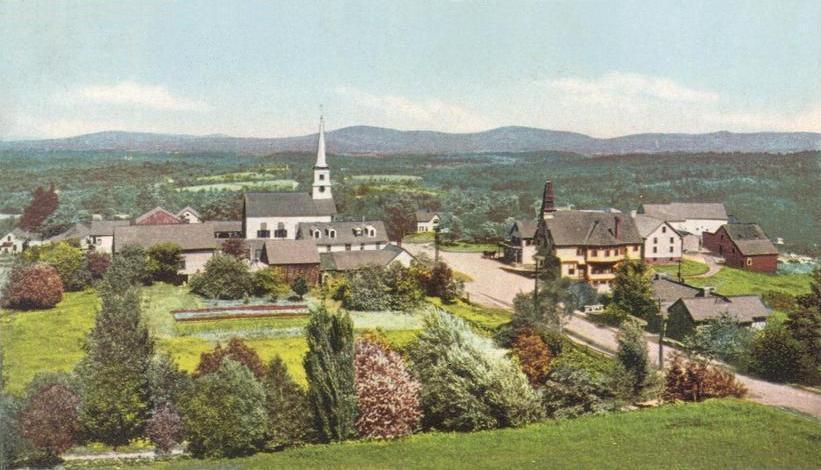
General view of Dublin, New Hampshire and its town center in 1906, six years before 'Abdu'l-Bahá's visit. Wikimedia Commons.
Dublin, in 1912, was an artist’s colony and a fashionable summer resort. Many famous, rich and well-known people had summer houses in the area, including George DeForest Brush, whom 'Abdu'l-Bahá meets. ('Abdu'l-Bahá In Their Midst, p 152). ‘Abdu’l-Bahá insisted that all bills associated with His stay there should be sent to Him. Everywhere He went on His travels, He always paid the cost in spite of many offers of financial help from others. ('Abdu'l-Bahá In Their Midst, p 154)
30 July 1912 - The barefoot boy
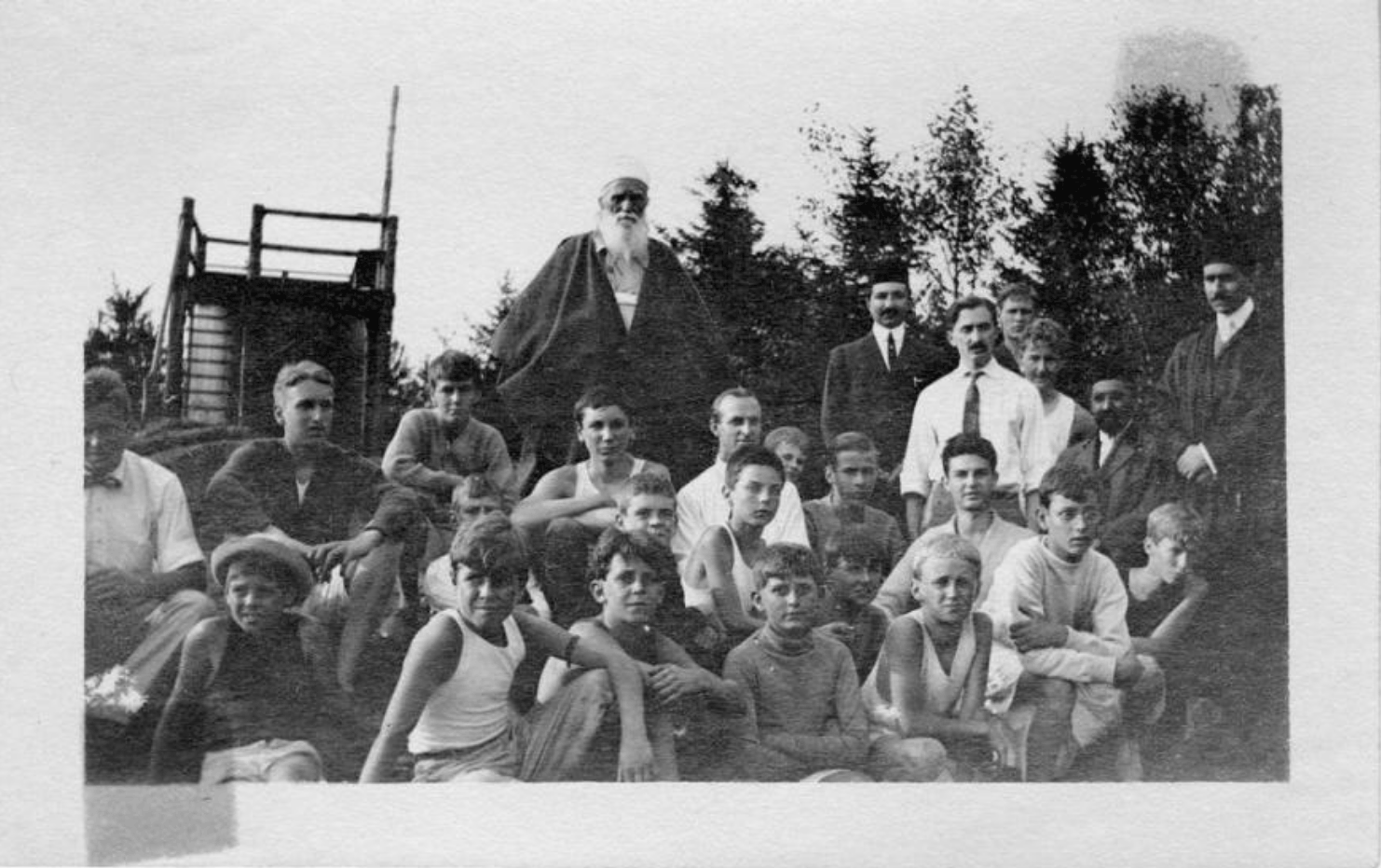
‘Abdu’l-Bahá visited the Marienfield Summer School in Chesham, New Hampshire, on 1 August. This camp was run by Dr. Charles Henderson for boys between the ages of 12 and 18. When ‘Abdu’l-Bahá arrived, He was immediately surrounded by the boys. After giving them a short talk and praising their good manners, the boys showed the Master the tents they lived in and some of their gymnastic exercises. ('Abdu'l-Bahá In Their Midst, p 159) Photo: 'Abdu'l-Bahá in America.
That evening, ‘Abdu’l-Bahá went with Mrs Parsons to the station to meet the Hannens and Mrs Hannen’s sister, Fanny Knobloch. While waiting for the train, ‘Abdu’l-Bahá ‘suddenly left the little group and strode over to a ragged and barefoot country boy who was standing between two carriages’, and said to him in English, ‘How are you?’ The boy, unperturbed by his unusual conversant, replied, ‘Alright.’ At this, the Master laughed with great appreciation and promptly gave the boy a quarter. Suddenly, there were several other boys before the Master, all proclaiming that they were ‘Alright’ and each being rewarded with a quarter. ('Abdu'l-Bahá In Their Midst, p 156)
The delightfully unpredictable 'Abdu'l-Bahá
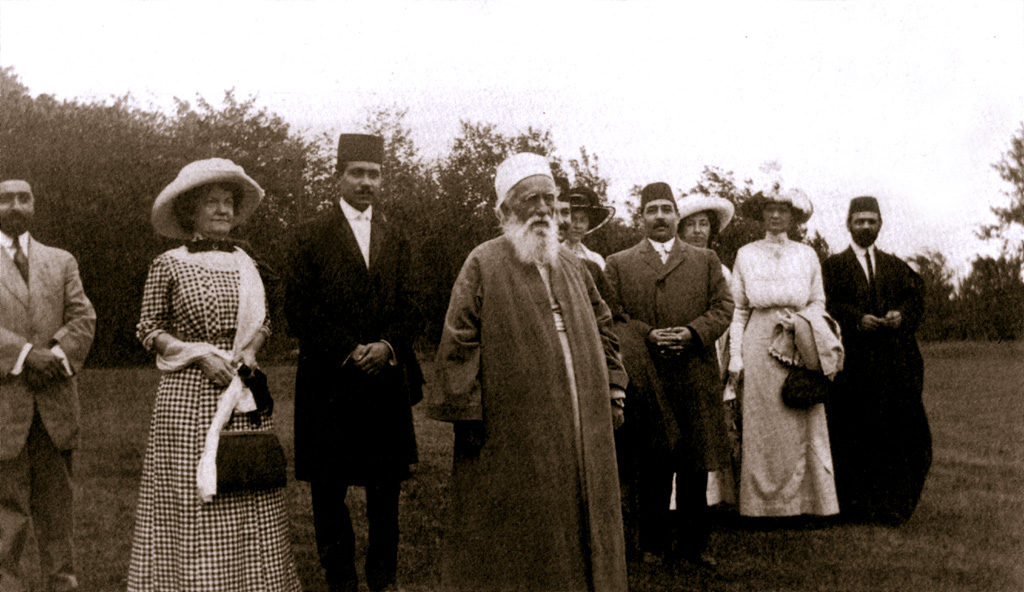
'Abdu'l-Baha in Dublin, New Hampshire, walking in front of the Parson's home with some of the friends. The Master in America website.
On one occasion, Mrs Parsons had invited a group of twenty prominent people. Culture, science, art, wealth, politics and achievement were all represented. Mrs Parsons was eager that the Master tell them about Bahá’u’lláh, and the guests apparently expected just such a lecture, but instead He told them stories that made them all laugh. Then He encouraged his guests to tell stories and
everyone had a great time, though they learned little about Bahá’u’lláh. ('Abdu'l-Bahá In Their Midst, p 160)
2 August 1912: ‘Abdu’l-Bahá and the equality of women and men
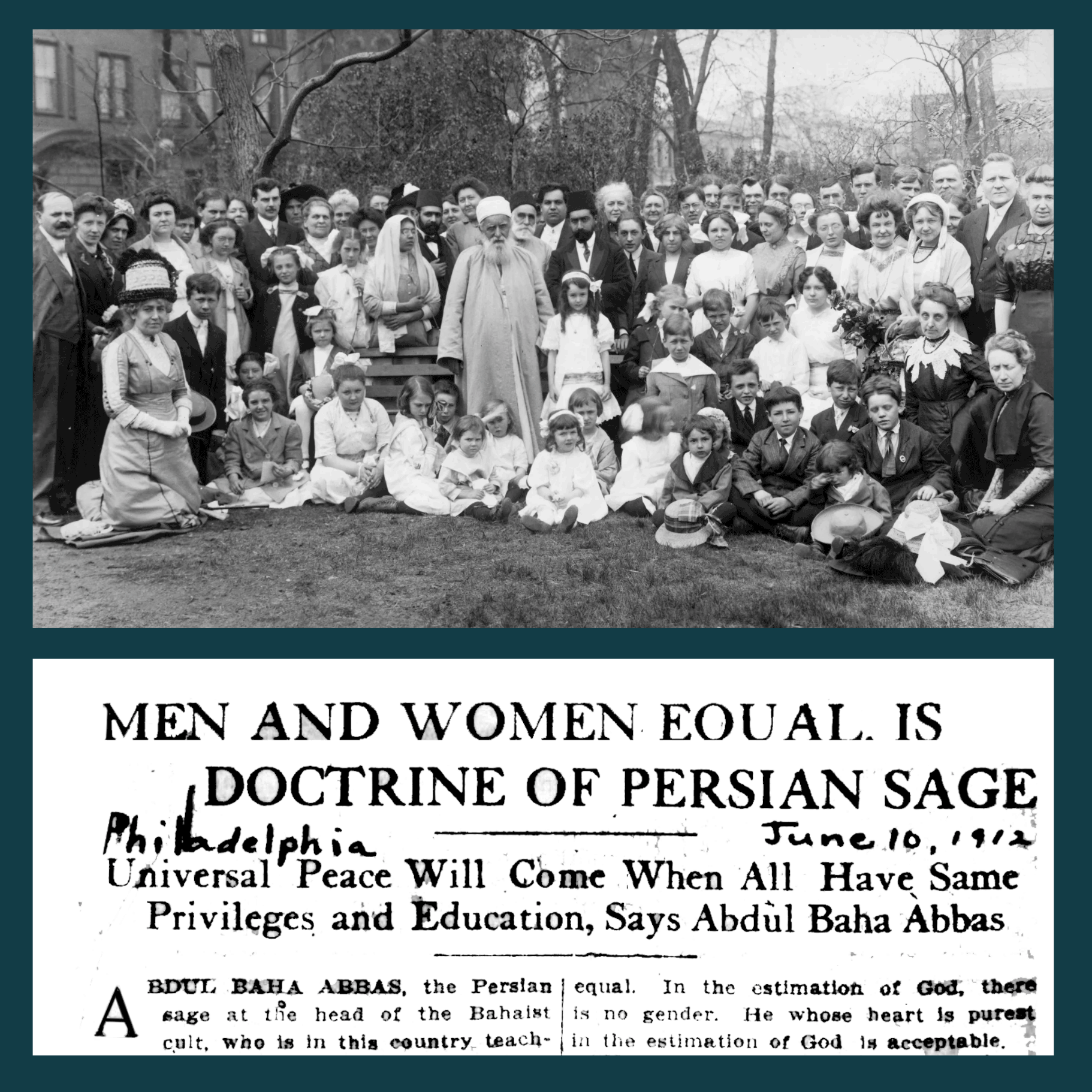
Top photo: ‘Abdu’l-Bahá with a group of Bahá’ís at Lincoln Park in Chicago, Illinois, 3 May 1912. This group is largely composed of women and children. Bahá'í Media Bank. Bottom photo: Headline from a Philadelphia newspaper article dated June 10, 1912: "Men and Women Equal is Doctrine of Persian Sage:" Throughout His 239 days in America, 'Abdu'l-Bahá will tireless promote the equality of women and men. Article courtesy of United States National Bahá'í Archives. To read the article see the post on 'Abdu'l-Bahá in America.
The following day, ‘Abdu’l-Bahá was sitting with Mrs Burton of Pasadena, California, Cordie Cline and Emogene Hoagg on Mrs Parsons’ porch watching Mrs Parsons and some of her friends practising golf on the lawn. He remarked:
It is customary in Persia to say of one who is successful in a certain undertaking, ‘He carried the ball out of the field.’ ... If many people attempt something, and one is successful, it will be said ‘He carried the ball.’ Today all of the women of the world are striving to raise the banner of equality and establish the fact that woman is the equal of man. But, God willing, the American woman will “carry this ball,” and thus demonstrate that God has created all humanity equal.
('Abdu'l-Bahá In Their Midst, p 159)
4 August 1912: 'Abdu'l-Bahá's abiding passion for race unity
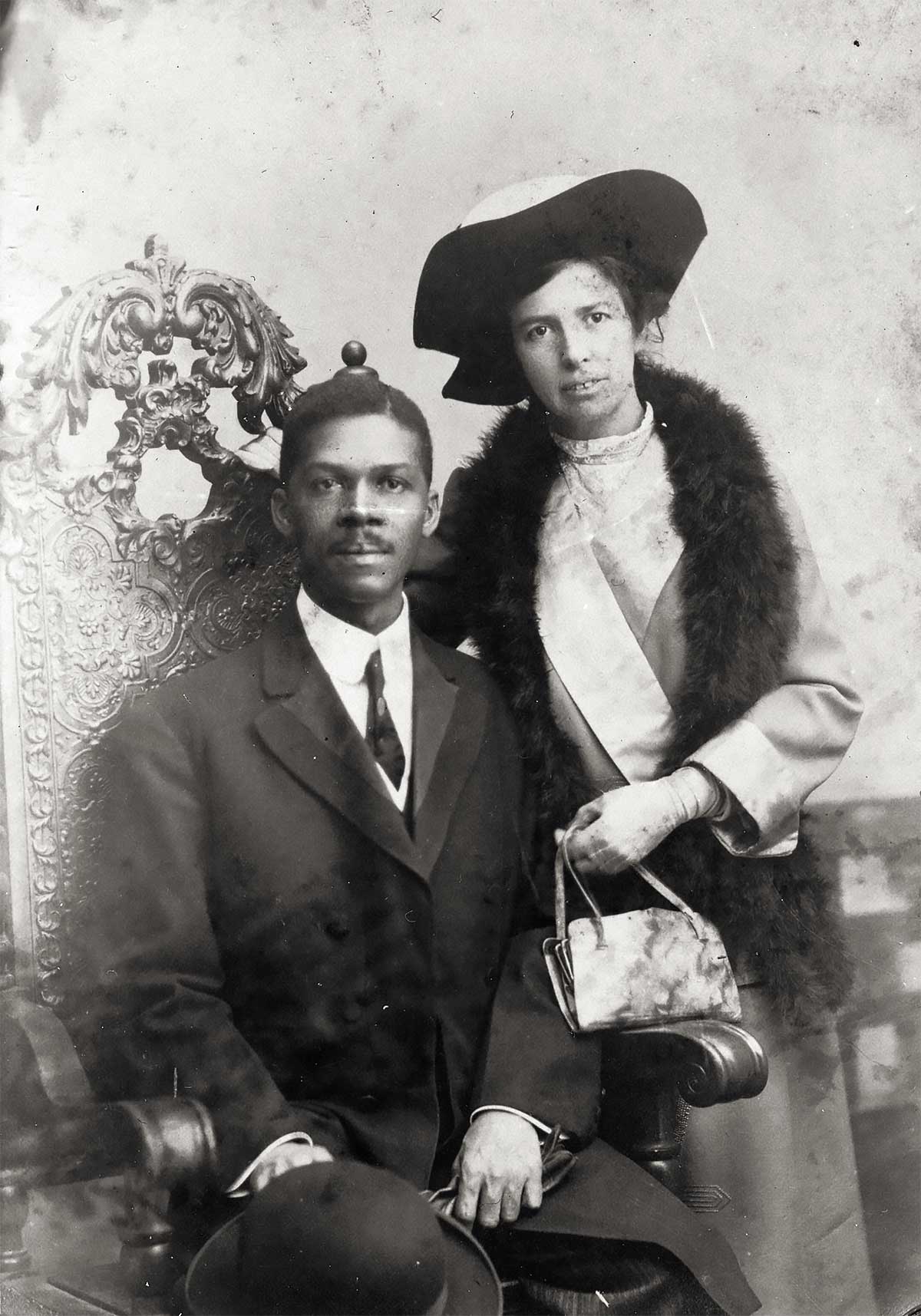
Louis Gregory and Louise Mathew in 1912. National Bahá’í Archives. 239 Days: Day 115 “Get the Races to Intermarry”
Though most of ‘Abdu’l-Bahá’s time was spent with the rich, famous and white people, He gave special attention to their black servants, treating them no differently than their employers. On 4 August ‘Abdu’l-Bahá addressed a group of 28 black people and spoke of the importance of unity and amity between black and white people. He told them of the upcoming marriage of Louisa Mathew, a white woman, and Louis Gregory, a black man. The white people in the audience were amazed at the influence the Cause of Bahá’u’lláh had on everyone, while the black people were very pleased to hear about such integration. Some Americans considered the creation of unity between blacks and whites to be nearly miraculous and as difficult to accomplish as ‘splitting the moon in half’, but here was ‘Abdu’l-Bahá showing that it could happen. ('Abdu'l-Bahá In Their Midst, pp. 160-61)
This is the story of Louis Gregory and Louisa Mathew's marriage from 'Abdu'l-Bahá In Their Midst:
Before He left Chicago I asked ‘Abdu’l-Bahá plainly one morning early if I had understood aright that He wished Mr Gregory and myself to marry. He said ‘yes’. He did wish it. ‘I wish the white and the colored people to marry’ He added. Then on my intimating that as a woman I could do nothing to bring it about He asked, ‘Do you love him, would you marry him if he asked you?’ and I replied ‘yes’. Then He said ‘if he loves you he will ask you.’ Later in the morning as I learnt some time afterwards, He told Louis it would give Him much pleasure if he and I would marry, which came as an utter surprise to Louis who had no thoughts of marriage. ‘Abdu’l-Bahá said ‘What is the matter? Don’t you love her?’ ‘Yes, as a friend’ Louis said. ‘Well think of it’ said ‘Abdu’l-Bahá, ‘and let me know; ... marriage is not an ordinance and need not be obeyed, but it would give me much pleasure if you and Miss Mathew were to marry.’
Letter from Louisa Gregory to Agnes Parsons, 18 January 1921 quoted pages 99-100
‘Abdu’l-Bahá announced the marriage to the Bahá’í community while He was in Dublin, New Hampshire and the wedding was planned for 27 September in New York City. The Master was in Denver, Colorado, on His way to California on that day, but the union was His work and the ceremony was performed in the City of the Covenant, as He had expressly wished. The ceremony took place at a Church of England (Episcopal Church) with nine witnesses present, including the minister and his wife, and representatives of the Bahá’í Spiritual Assemblies of New York, Philadelphia and Washington. ('Abdu'l-Bahá In Their Midst, pp. 99-101)
Louis Gregory and Louisa Mathew 's marriage is the first Bahá'í interracial marriage.
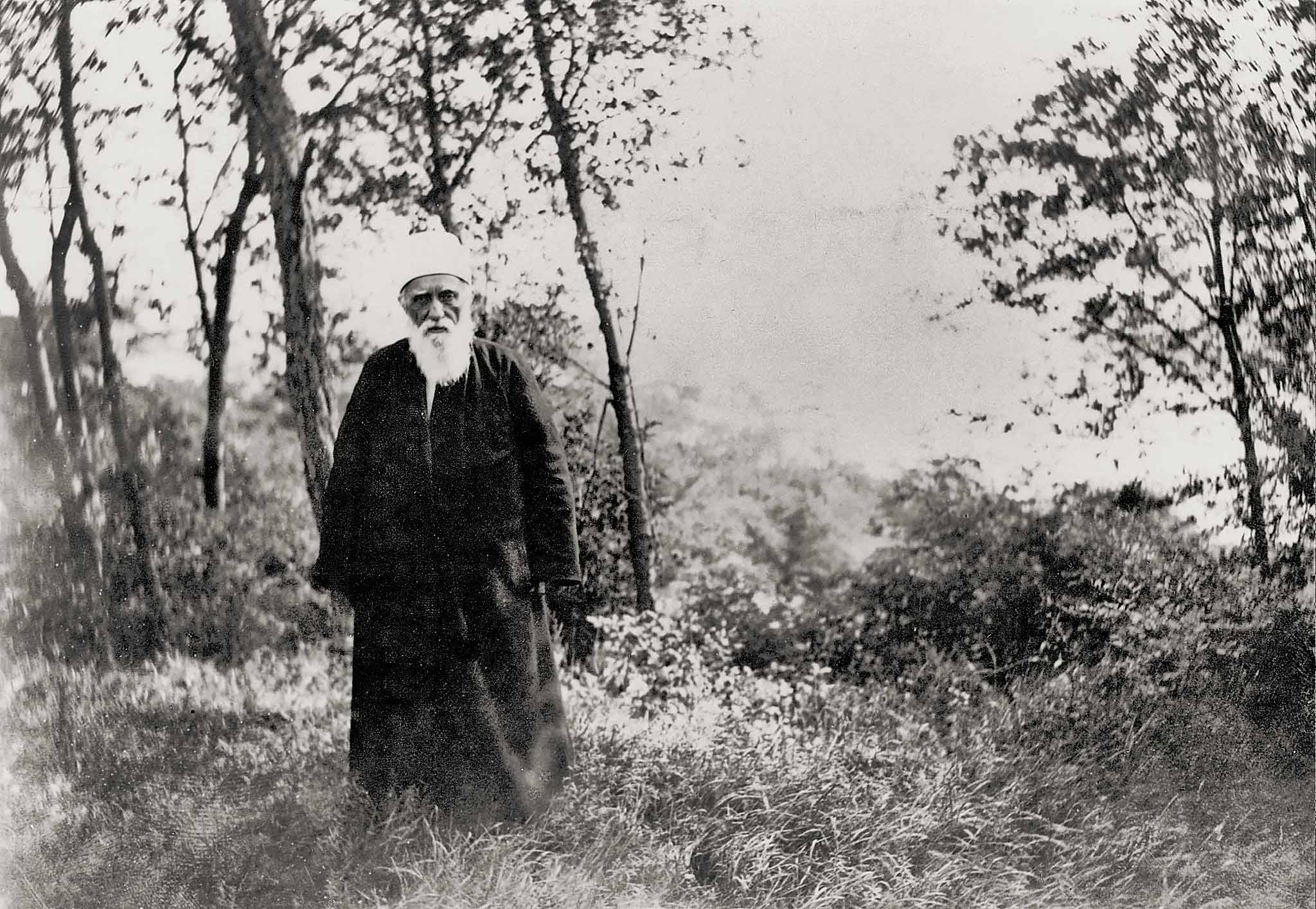
Abdu'l-Bahá at Green Acre on the Hill of Montsalvat on August 21, 1912. Eliot Bahá'í Archives. 239 Days.
‘Abdu’l-Bahá leaves Dublin, New Hampshire where He has been traveling (see timeline) as He heads towards Canada and arrives in Eliot, Maine in the afternoon, where 500 people are waiting for Him at Green Acre. He greets the friends, then immediately goes to visit Miss Sarah Farmer. Sarah Farmer began offering gatherings at the former resort hotel on progressive subjects such as sciences, arts and that were open to all races and creeds and in 1894, Sarah Farmer dedicates Green Acre to the ideals of peace and religious unity and founds the “Green Acre Conferences.”
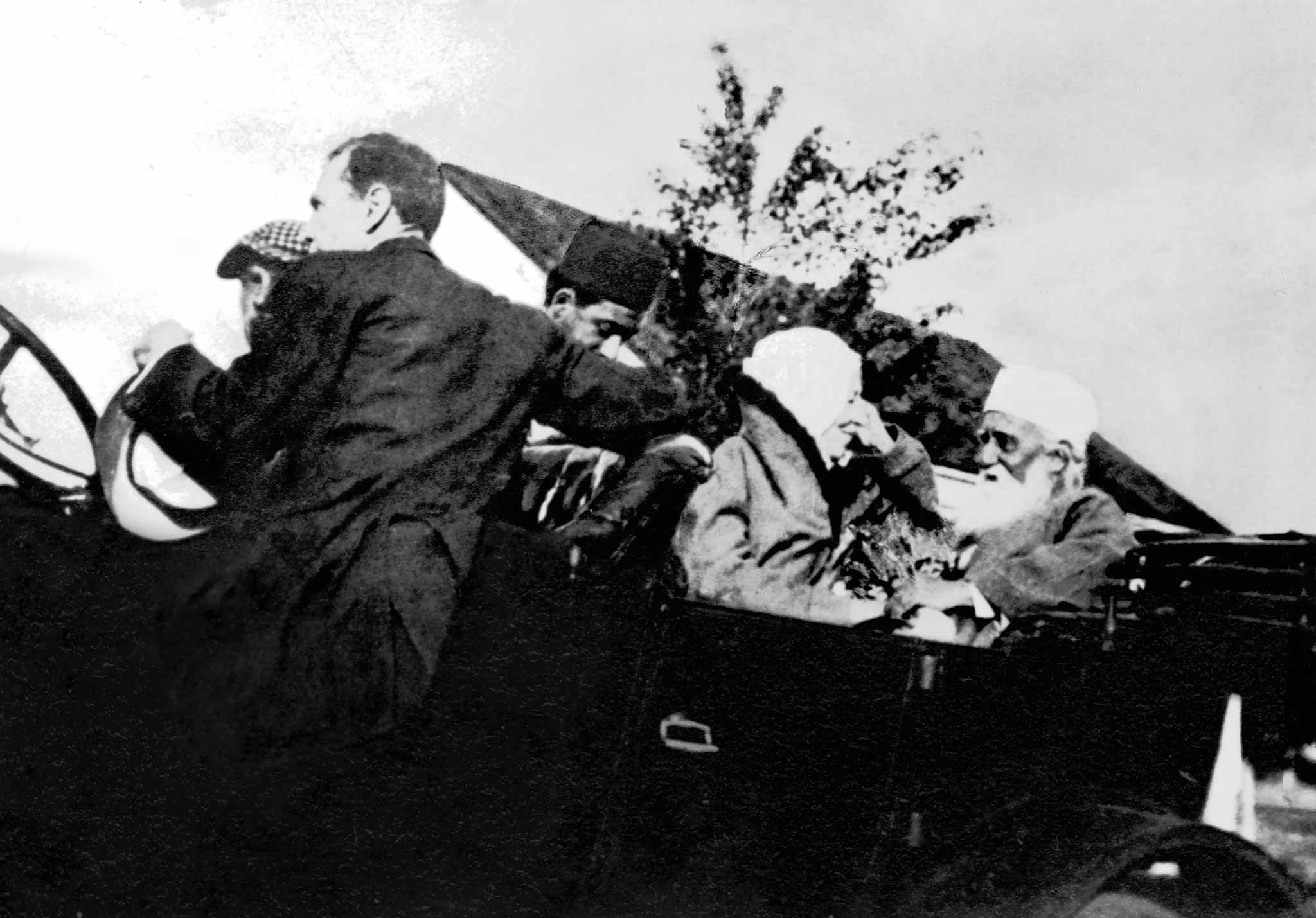
Sarah Farmer with ‘Abdu’l-Bahá along the road above the Green Acre grounds on Tuesday, August 20, 1912. Eliot Bahá’í Archives. 239 Days.
‘Abdu’l-Bahá stays seven full days in Green Acre, arriving on August 16, 1912 and leaving on the morning of His eighth day, August 23, 1912. 'Abdu'l-Bahá speaks multiple times each day. The first five talks are from The Promulgation of Universal Peace, the remainder are mentioned by Mírzá Mahmúd-i-Zarqání in his diary:
Rational proofs and logical arguments on August 16, 1912
The station of man on August 17, 1912
The human body and the spirit of man on August 17, 1912
The oneness of mankind on August 17, 1912
The worlds of God on August 17, 1912
The elimination of racial prejudice
The harmony between science and religion
The proofs and evidences of the existence of God
The composition of elements
The importance of exterminating hatred to free humanity from the shackles of superstition
Constancy and spiritual progress
The importance of promulgating the divine teachings and acquiring spiritual perfections
Everlasting life, its spiritual stations and eternal blessings
The relationship between the East and the West
The everlasting dominion of God and His Holy Manifestations
Spiritual and material education
The renewal of religious laws and the oneness of the Manifestations of God
The station of Bahá'u'lláh and His relationship as expounder of His teachings
Material progress and the philosophers' lack of feeling for the spiritual kingdom
The investigation of truth
The love of God, the immortality of the spirit and the divine teachings
The twenty talks listed above read almost like a spiritually transformative university curriculum, taught by a single teacher, the son of the Manifestation of God for this age, 'Abdu'l-Bahá. Contained in these talks are lessons on the Covenant, science, mysticism, community-building, all the seeds of a new world order that 'Abdu'l-Bahá has come to plant in the West. 'Abdu'l-Bahá gives these talks in concentrated doses, several a day to a group of people all in the same place at the same time and the spiritual energies liberated were, by all accounts, tremendous. People were so enkindled, eyewitnesses recount, that some sobbed, some fainted, some fell to their knees, and many were transformed and imbued with a new vision for their lives
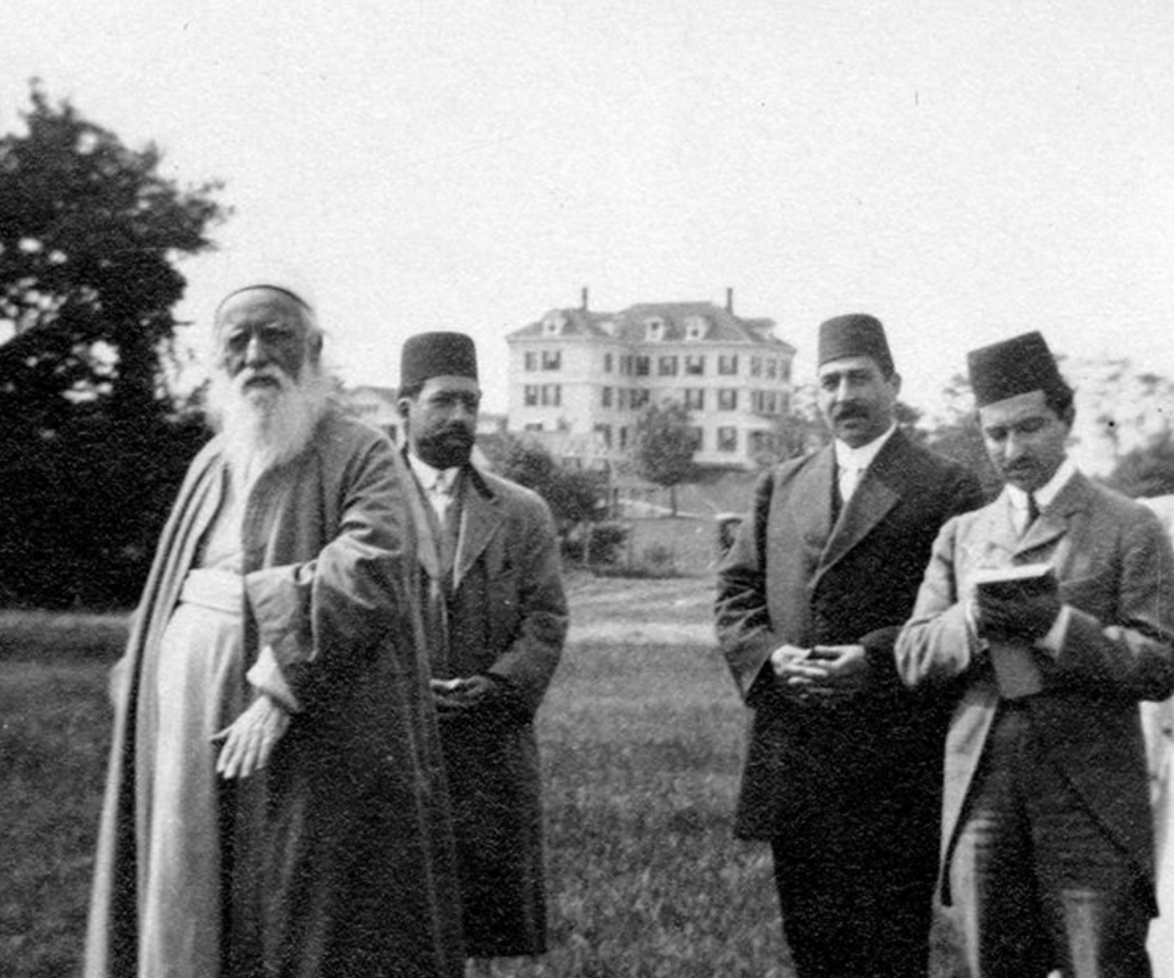
'Abdu'l-Bahá in Green Acre. United States National Bahá'í Archives.
'Abdu'l-Bahá has in-depth conversations with people who will become stalwart servants of the Faith. Many very well-known Bahá'ís are present at this time, but we will not name any of them, because the importance of Green Acre is the sheer volume of expended spiritual energy on the part of 'Abdu'l-Bahá over the course of those precious days. Not only does the Master address the participants more than 20 times (the list from Maḥmud’s diary is most certainly not complete), but He constantly teaches the Faith, at every moment, to visitors who have just arrived, moments that have not all been recorded for posterity. 'Abdu'l-Bahá also counsels individuals all day, between interviews and talks, and late into the evening, on their service to the Faith, how they should behave, how they should resolve this problem, or what they should do with their lives. People are transformed on the spot at Green Acre. Torches are lit at Green Acre that will burn in the service of Bahá'u'lláh for decades to come.
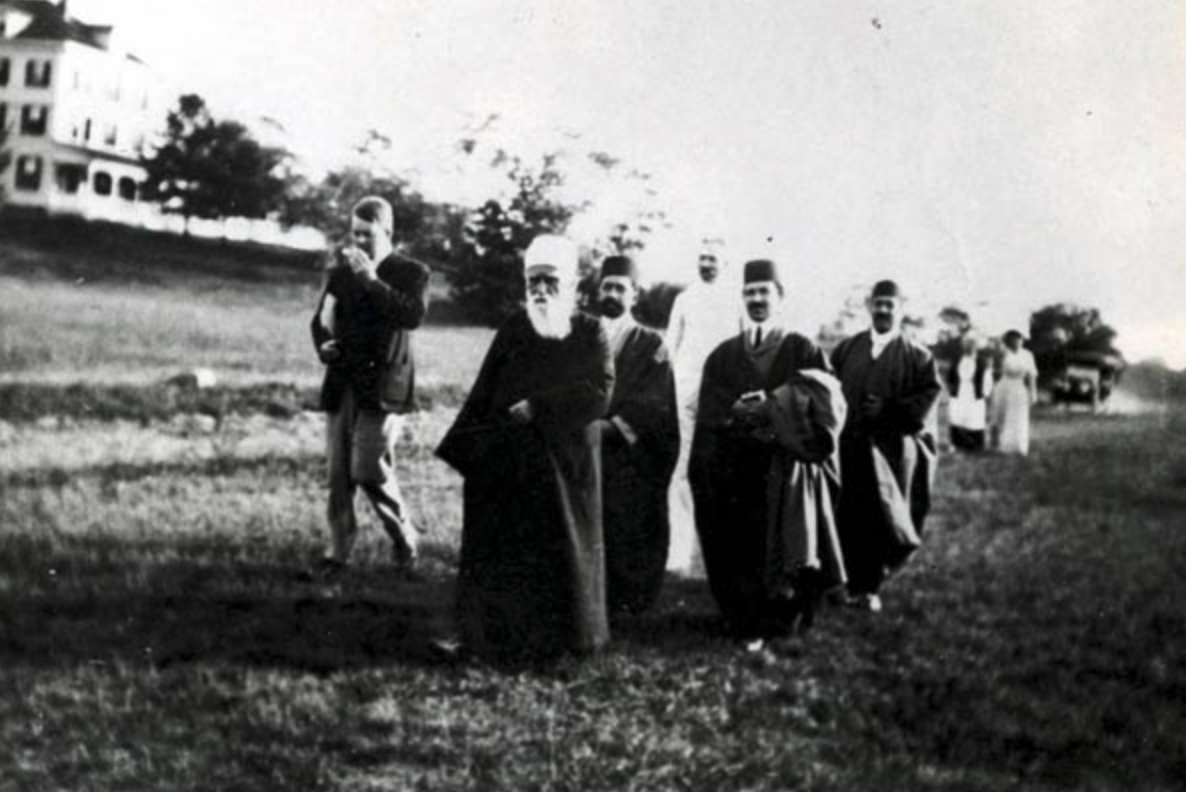
'Abdu'l-Bahá at Green Acre, in Eliot, Maine, August 1912. Green Acre.
On His last day, 'Abdu'l-Bahá says:
We have finished our work here. We have sown a seed. Many souls have been attracted and transformed. Every day we have seen gifts such as fruit, flowers, honey and sweets which have been placed here anonymously and without show. This is a proof of the sincerity of their hearts.
Mahmúd-i-Zarqání, Mírzá. Mahmúd’s Diary Chronicling ʻAbdu’l-Bahá’s Journey to America
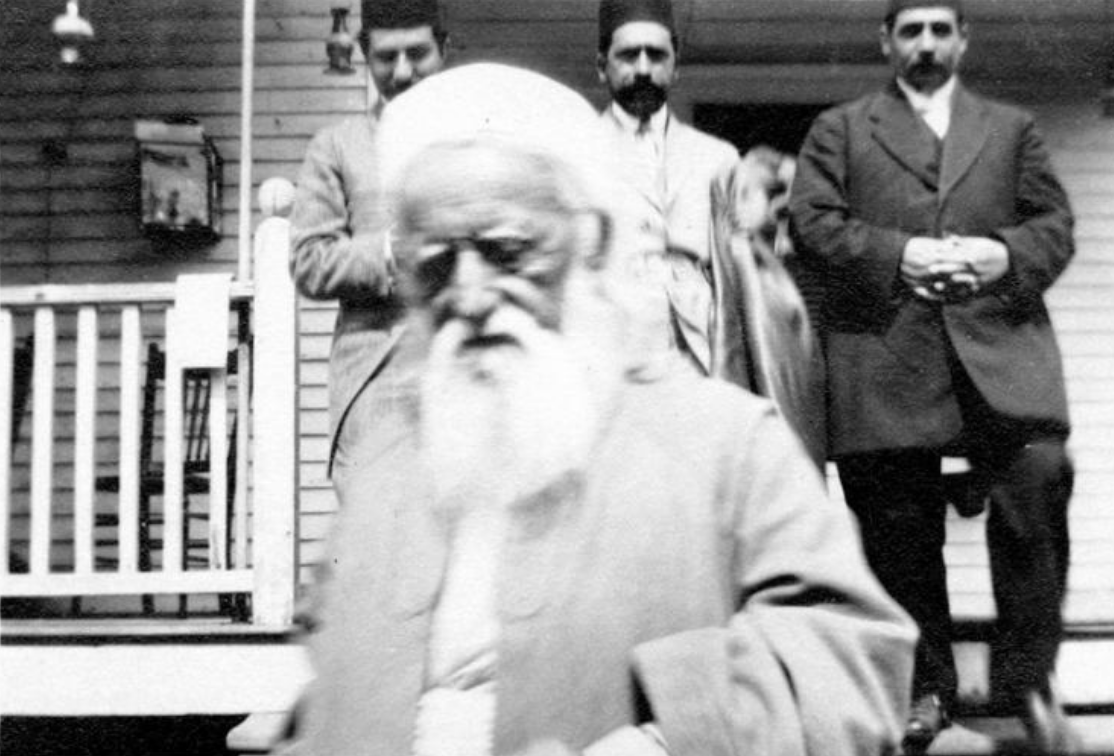
'Abdu'l-Bahá in Green Acre. United States National Bahá'í Archives.
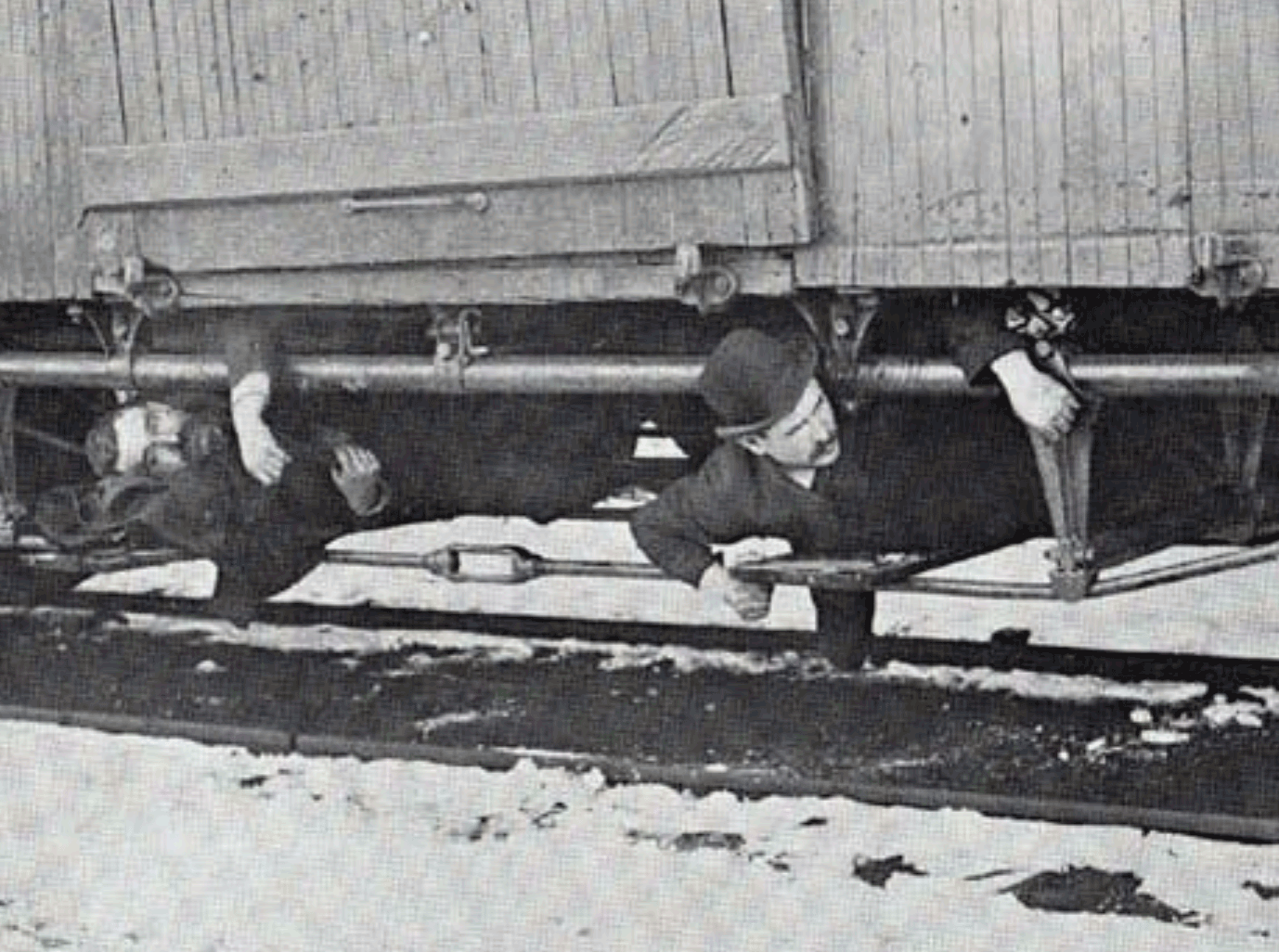
Two hobos freight-hopping, also known as riding the rods. Hobo is a 19th century term describing unemployed people who travel from place to place. Wikimedia Commons.
Fred Mortensen grows up in a very tough neighborhood of Minneapolis, Minnesota at the end of the 19th century. He adapts to this environment and as he says, violates any law I saw fit, man's or God's". In Mortensen's story, it is breaking the law that brings him to God. He steals, gets into fights with policemen, gets arrested, escapes from prison and is a fugitive for four years before stealing again. In his attempted escape, he shatters his leg jumping over a ten-meter high wall. His defense attorney, Albert Hall, is a Bahá'í and teaches him about God's love and Bahá'u'lláh's teachings. For hours upon hours, Hall tells him about 'Abdu'l-Bahá's love for His children and Fred Mortensen's heart accepts His love and his transformation is complete:
Thus the Word of God gave me a new birth, made me a living soul, a revivified spirit. I am positive that nothing else upon earth could have changed my character as mine has been changed. I am indeed a new being, changed by the power of the Holy Spirit as manifested through the breaths of God's Chosen Ones in this day. I have been resurrected and made alive in the Kingdom of El Abhá.
Mortensen, Fred: "When a Soul Meets the Master"
In 1912, when he hears 'Abdu'l-Bahá may not travel West, but instead return to the Holy Land, Fred jumps on trains and "rides the rods", 5,000 kilometers from Minneapolis to Eliot, Maine, crossing almost half of the United States. Until the 1920s, freight trains are made of wood and supported by steel truss rods. These rods provide a space for the poor to lie under, and ride for free. Riding the rods is extraordinarily dangerous. Hundreds die or los limbs in the process. Fred Mortensen arrives in Green Acre with his letter of introduction from Mr. Hall, covered in soot. He tries to freshen up as best he can and is second in line to meet 'Abdu'l-Bahá the next morning after he arrives.
'Abdu'l-Bahá's warmly welcomes Fred, asking about where he is from. Then the Master asks Fred the only question he was hoping to avoid:
Did you have a pleasant journey?
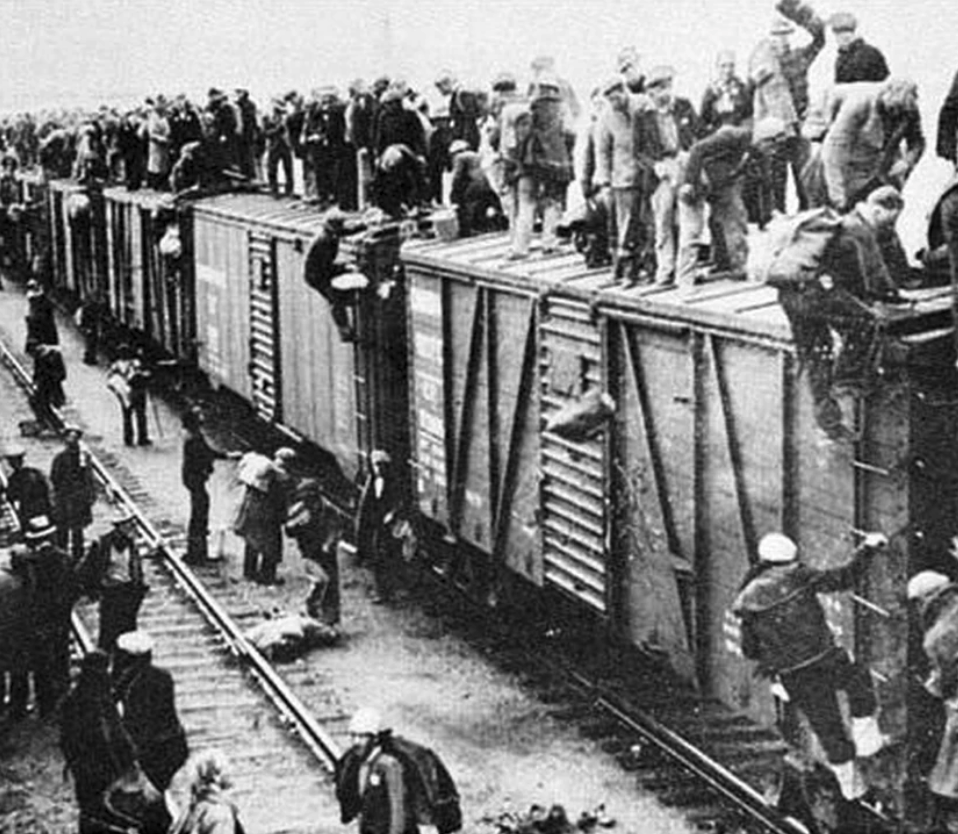
Hobos riding on trains. Edmonton Journal.
Fred doesn't answer and looks at the floor. 'Abdu'l-Bahá, of course, repeats the question, and Fred lifts his eyes to gaze in the Master's. sparkling eyes, eyes that looking into his very depths Fred can feel that 'Abdu'l-Bahá knows already and that he must tell Him anyway.
I did not come as people generally do, who come to see you.
How did you come?
Riding under and on top of the railway trains.
Explain how.
Fred looks again into 'Abdu'l-Bahá's eyes and they have changed. He feels like the light of love is pouring out of them, now, and Fred is filled with happiness and explains riding the rods to 'Abdu'l-Bahá. When he is done, the Master kisses him on both cheeks, gives him a large quantity of fruit, even kisses Fred's dirty hat, soiled by his arduous journey, and tells him:
You are my guest.
'Abdu'l-Bahá gives Fred Mortensen fare for his journey back, invites Fred to remain and he spends a week with the Master, in Green Acre, then Malden, Massachusetts, riding in 'Abdu'l-Bahá's automobile/ A few weeks later, he will again meet 'Abdu'l-Bahá briefly. Here are the words of a transformed, enkindled man. They are powerfully important, because they represent one of the longest-lasting effects of 'Abdu'l-Bahá's visit, the personal transformation of stalwart future servants and heroes of the Faith of Bahá'u'lláh who will solidly establish the Faith in the West:
I left for home with never-to-be forgotten memories of a wonderful event-the meeting of God's Covenant, The Branch of that Pre-Existent Root, that wonderful Moon that shall shine as the Sun, as the light of seven days and to whom all shall bow and praise His Holy Name. A few weeks later I again had that wonderful privilege to be near the Covenant for a few moments. These events are engraved upon the tablet of my heart and I love every moment of them. The words of Bahá'u'lláh are my food, my drink and my life. I have no other aim than to be of service in his pathway and to be obedient to his Covenant. This is the Power of his Spirit, his love and his mercy to me.
Mortensen, Fred: "When a Soul Meets the Master"
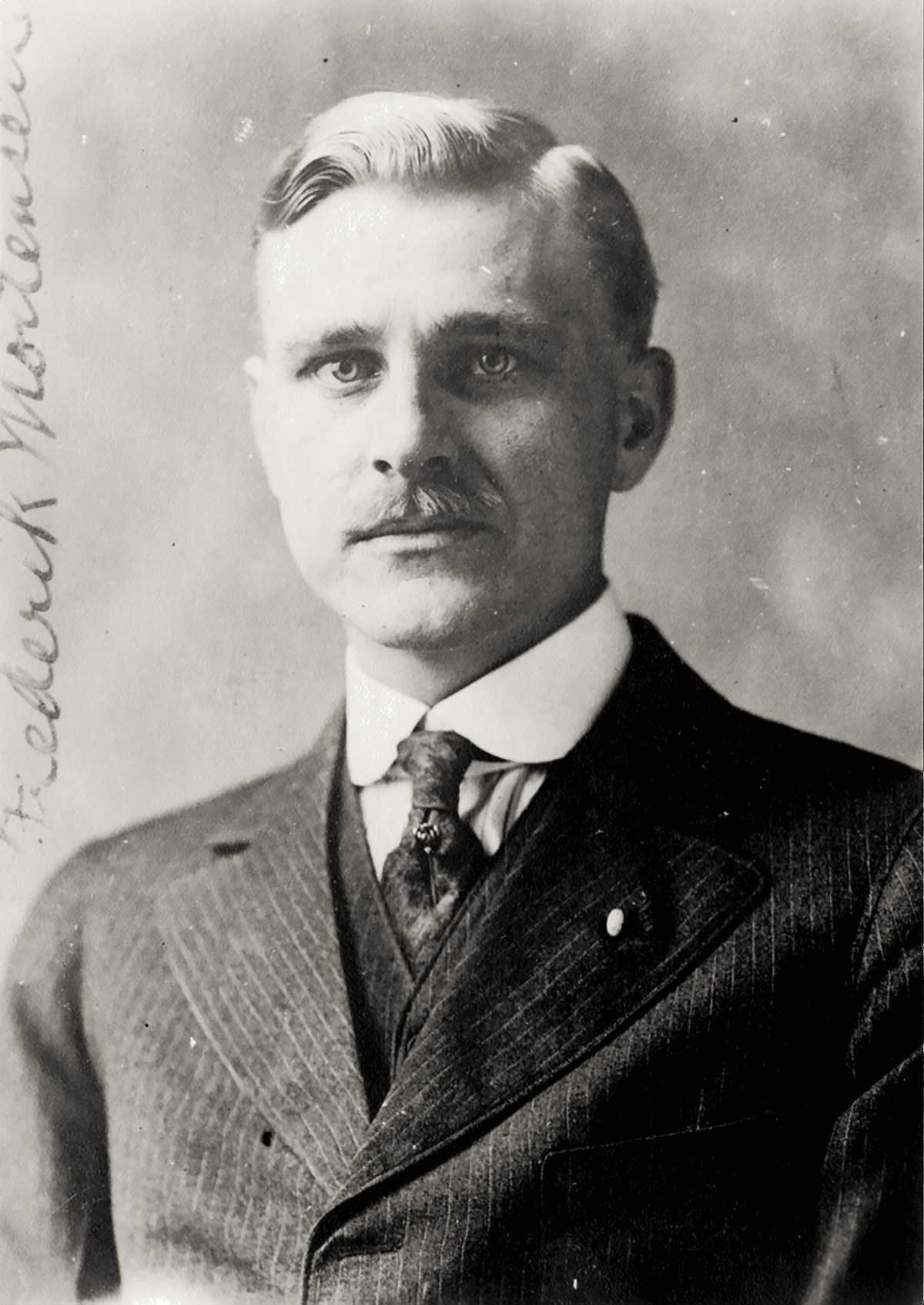
Fred Mortensen. United States National Bahá’í Archives.
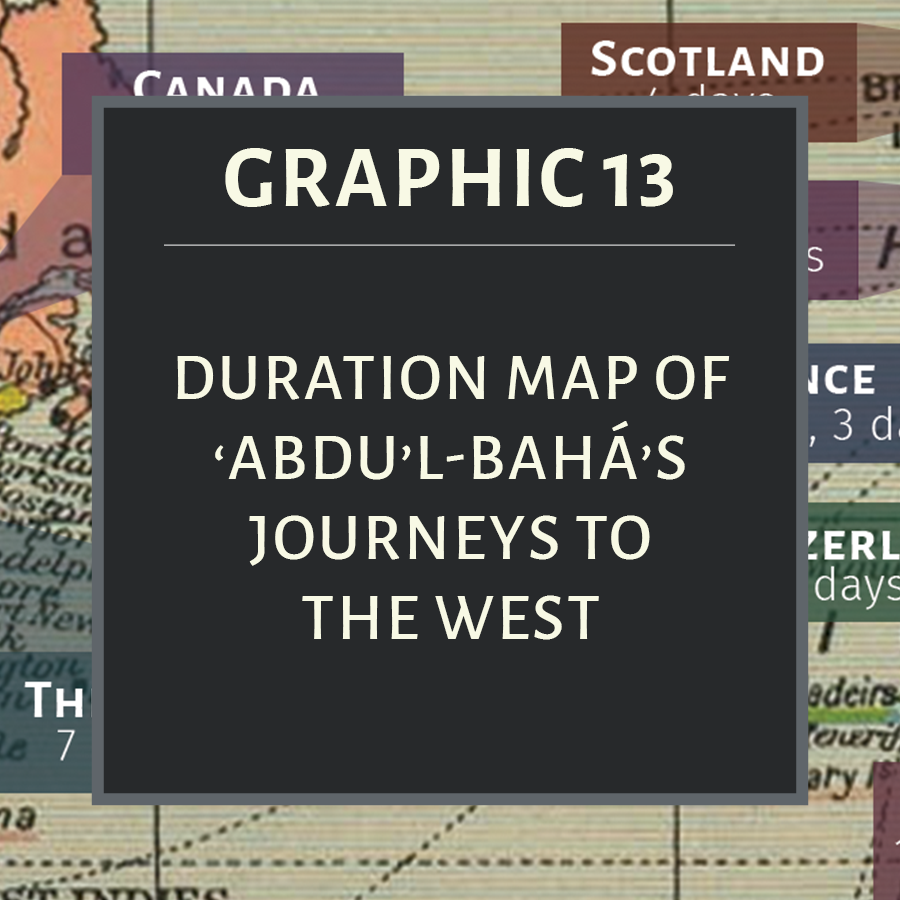
Map of the total time ‘Abdu’l-Bahá spent in each of the 10 countries He visited on 3 continents during His 3-year Journeys to the West. An infographic breaking down the visits and days spent is available here. See this Google Sheets document for formulas used in calculating duration. Original graphics by Violetta Zein. Base Map: 1910 map entitled “The World: Colonial Possessions and Commercial Highways” Edited by Sir Adolphus William Ward and others. Wikimedia Commons.
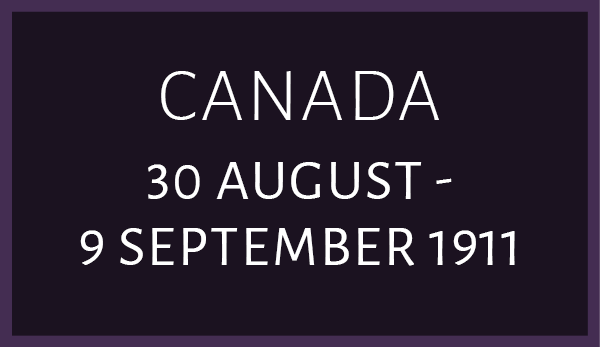
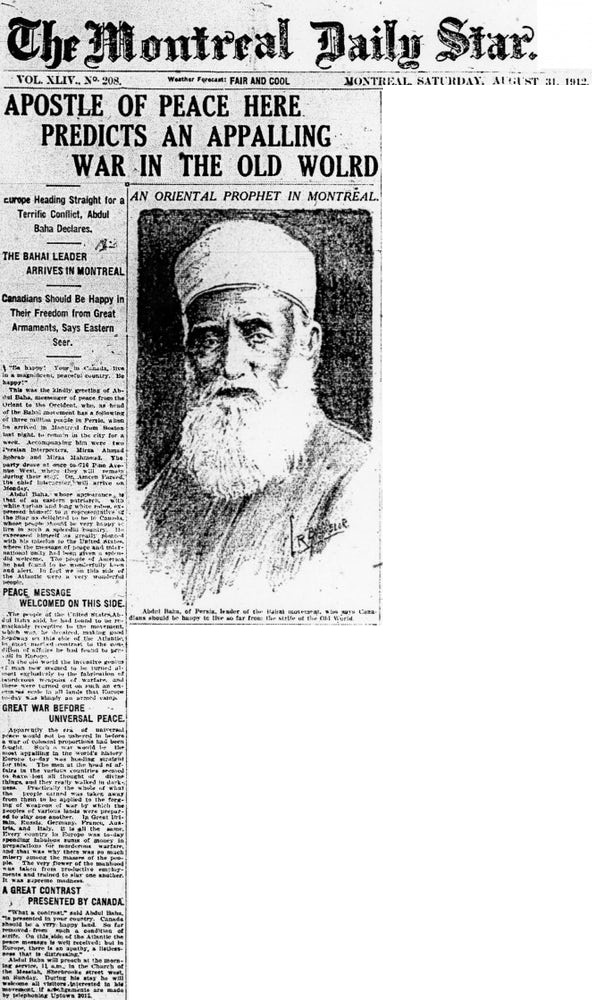
The Montreal Daily Star of August 31, 1912: "Apostle of Peace Here: Predicts an Appalling War in the Old World." Bahá'í World News Service.
‘Abdu’l-Bahá arrives from Boston two hours late at Windsor Station on Peel Street in downtown Montreal, Quebec, at about 8:40 p.m. on Friday, August 30, 1912. He is welcomed to the northernmost city of His Journeys to the West by William Sutherland Maxwell witht wo carriages and arrives at the Maxwell home on the flank of Mount Royal, as May Maxwell writes in her diary, under "the full brightness of a summer moon." At the time of 'Abdu'l-Bahá's visit, the Maxwell home is located at 716 Pine Street, but the address becomes 1548 Pine Street later on.
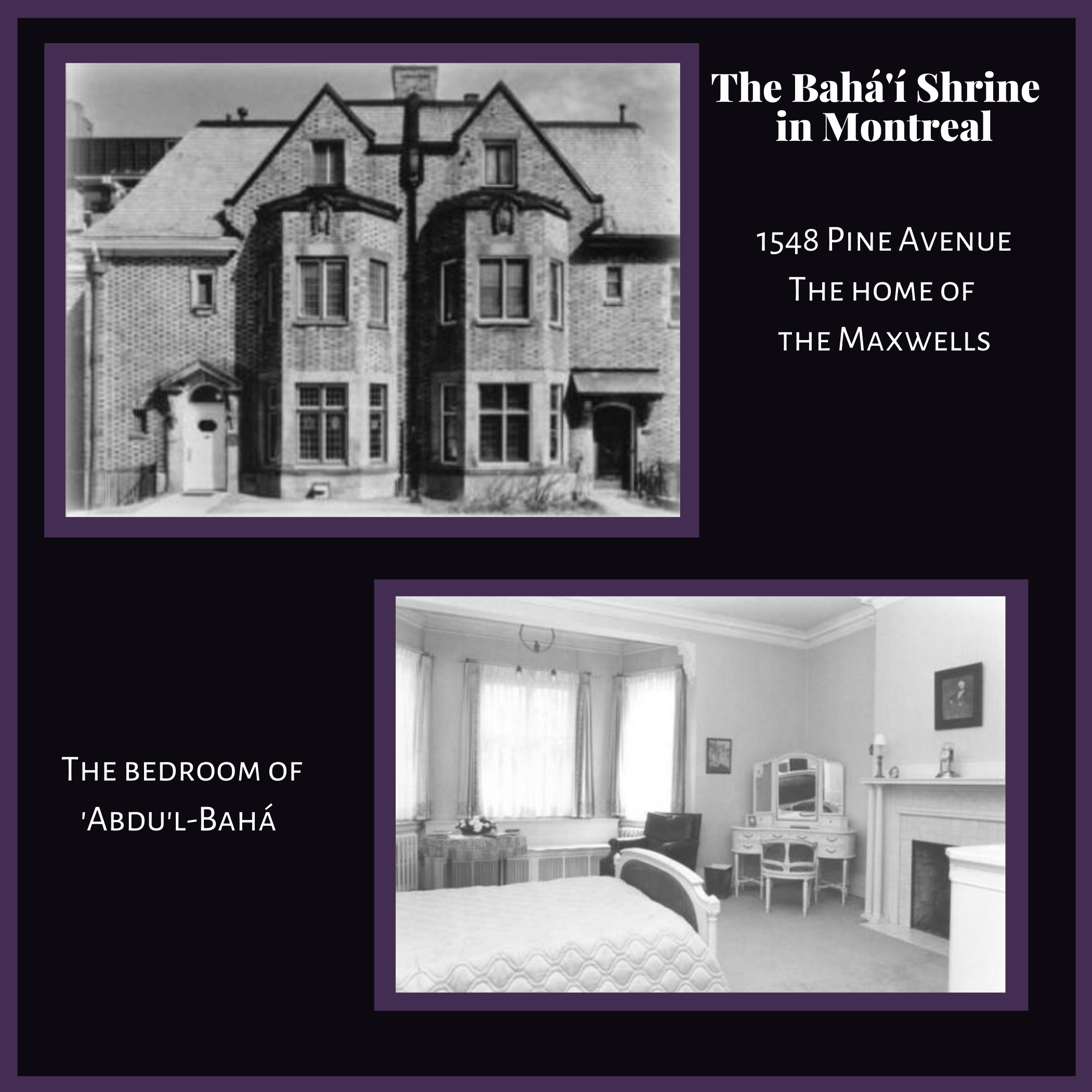
Photo of the home in the early 20th Century from 'Abdu'l-Bahá in Canada page 11; Photo of 'Abdu'l-Bahá's room from 'Abdu'l-Bahá's Journey to Canada page 8. Original graphic by Violetta Zein.
After arriving at midnight in Montreal on August 30, 1912, He is driven by Sutherland Maxwell to his home at 716, now 1548 Pine Ave. Upon entering the home, 'Abdu'l-Bahá pronounces:
This is my home, all that is in it is mine. You are mine – your husband and child. This is my home.
'Abdu'l-Bahá, quoted in Violette Nakhjavani, The Maxwells of Montreal, page 210
'Abdu'l-Bahá stays two nights with the Maxwells before moving to the Windsor hotel, but the Master refers to the Sutherland dwelling as His home. Mary Maxwell, a child He loves as His own, will soon become part of His family, see next panel.
1548 Pine Avenue is the only Bahá'í Shrine in the world outside of the Shrines in the Holy Land. Amatu'l-Bahá Rúḥíyyih Khánum (the young Mary Maxwell during 'Abdu'l-Bahá's visit in her family home) explains the importance of this Shrine:
Things arise in historic perspective as time goes by. This is the only private home in Canada where ‘Abdu’l-Bahá stayed. After His visit, it was always considered blessed by having been used by Him. For future generations, it will eventually grow in importance and sacredness, because He, the Centre of the Covenant, the Greatest Mystery of God, stayed here.
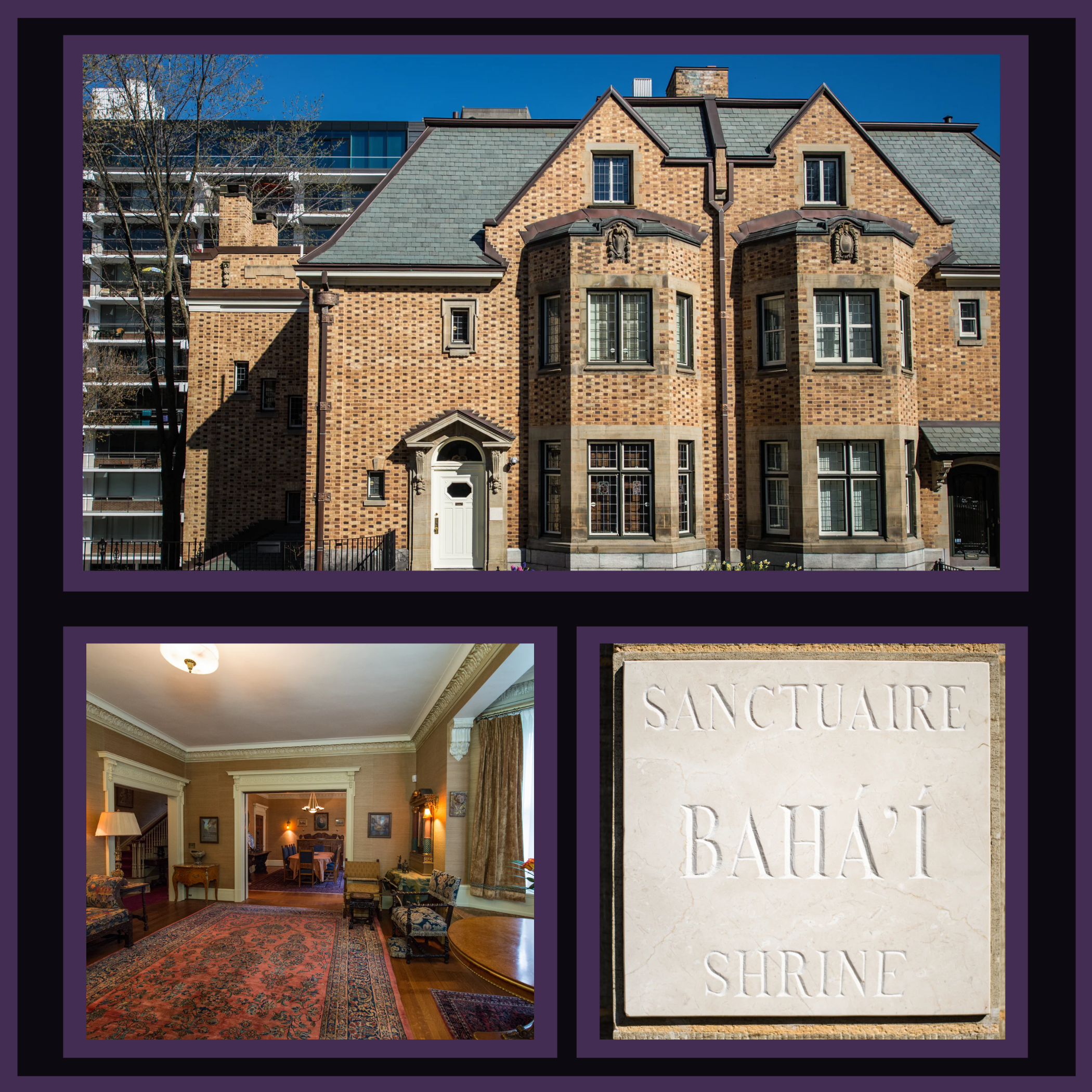
The Bahá'í Shrine in Montreal at 1548 Pine Avenue. All photos from Bahá'í Media Bank. Original graphic by Violetta Zein.
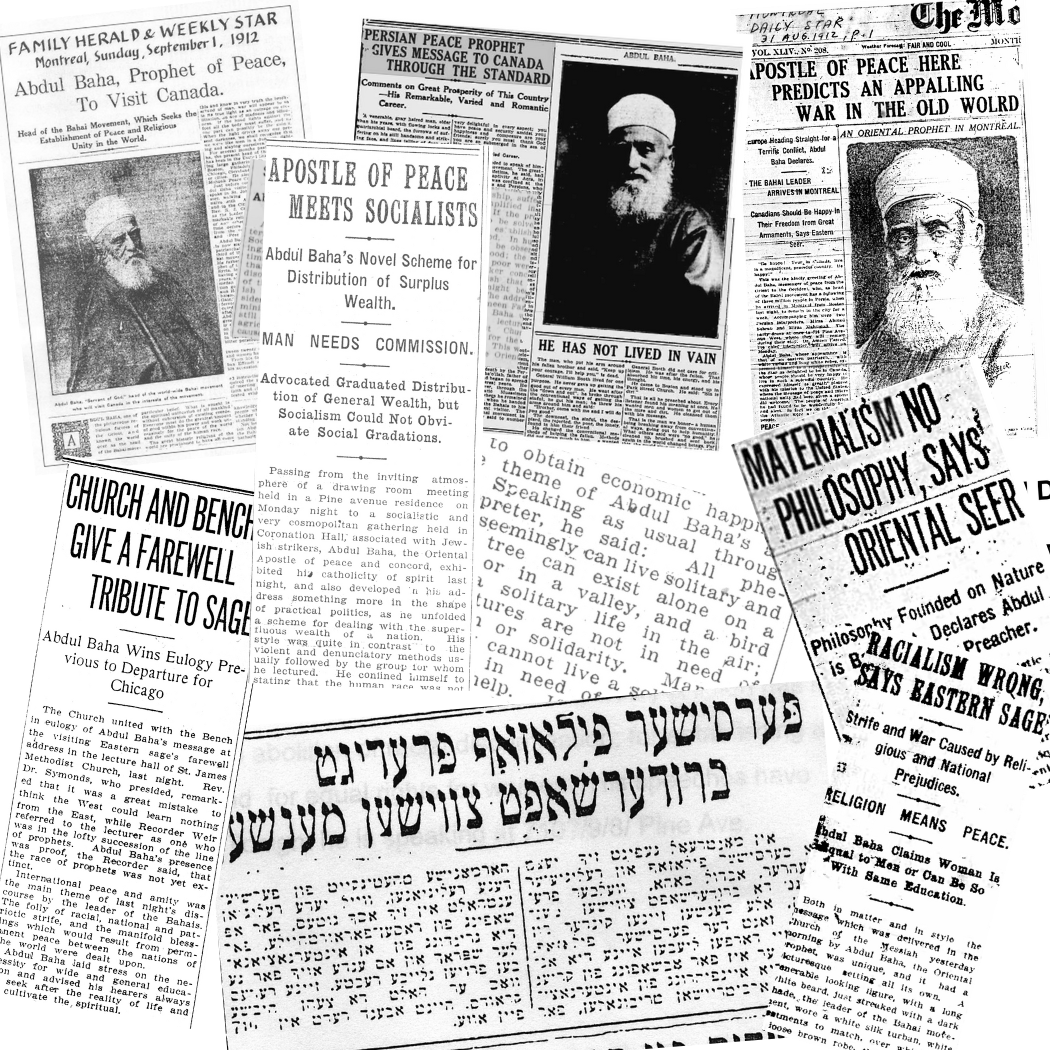
Collage of a very, very small portion of Canadian newspaper articles that covered every single one of 'Abdu'l-Bahá's stay in Montreal. All clippings courtesy of the United States National Bahá'í Archives with our most sincere gratitude for their generosity. Please refer to the "239 Days of Newspaper Articles Slideshow Finale" at the bottom of Part 6 to read some of these articles in full.
No other city in America gives 'Abdu'l-Bahá the media attention and warm reception that Montreal offers the Master. He gives seven well-attended talks during His stay, four of them in the home of William Sutherland and May Maxwell. Two thousand five hundred people hear 'Abdu'l-Bahá speak in person, while another 440,000 read His words in the extensive media coverage they receive in 34 articles in 10 daily newspapers. The Canadian papers are very fair in their coverage, describing 'Abdu'l-Bahá as "a serene majestic figure, calm, commanding, serene and wise." Their headlines are never extravagant or extreme: "Persian teacher to preach peace," is an example as well as "Racialism Wrong Says Eastern Sage: Strife, War, Caused by Religions and National Prejudices." A total of 34 articles are published in 10 of the 12 daily newspapers – more than any other city in North America.
Anyone can make an appointment with 'Abdu'l-Bahá
During His visit, 'Abdu'l-Bahá criss-crosses Montreal on foot, by taxi and by streetcar, visiting downtown Montreal, the East End and Mont Royal. 'Abdu'l-Bahá takes an advertisement in the Montreal Star and publishes the phone number of the Maxwells (Uptown 3015), encouraging "any Montrealer who wishes to make an appointment with him" to do so.
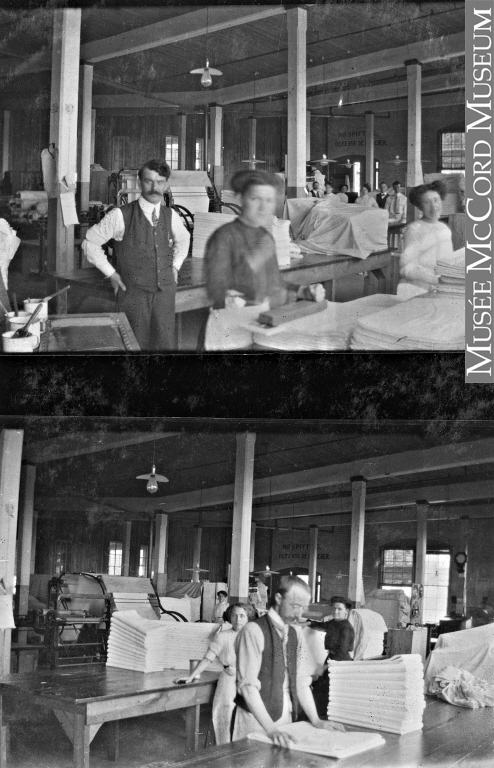
Textile workers and their supervisor, Wabasso cotton factory, Trois-Rivières, QC, around 1914. McCord Museum.
Most certainly, 'Abdu'l-Bahá's most original talk, in terms of content, is the one He gives to an audience of 500 Socialists, labour leaders, strikers and Marxists, some of whom are members of the Jewish community. The talk takes place at Coronation Hall, 204 St. Lawrence Street, now 1074 St. Laurent Boulevard. To an audience mainly concerned with social justice, 'Abdu'l-Bahá outlines Bahá'u'lláh's solution to eliminate extremes of wealth and poverty in radically different tone and content than almost every talk He has given. 'Abdu'l-Bahá speaks practically, gives concrete examples, real-life solutions. He even goes so far as to lay a foundation for a system whereby the most important class of society, farmers, can achieve utmost welfare and well-being, through a village community chest, which He calls a "general storehouse":
In every village there must be established a general storehouse which will have a number of revenues.
The first revenue will be that of the tenth or tithes.
The second revenue [will be derived] from the animals.
The third revenue, from the minerals; that is to say, every mine prospected or discovered, a third thereof will go to this vast storehouse.
The fourth is this: whosoever dies without leaving any heirs, all his heritage will go to the general storehouse.
Fifth, if any treasures shall be found on the land, they should be devoted to this storehouse.
The Promulgation of Universal Peace, 'Abdu'l-Bahá's Address to Socialists and Labour Leaders
'Abdu'l-Bahá goes into great detail in the talk, and the audience breaks out into spontaneous applause. When the chairman opens the floor for questions, every answer from 'Abdu'l-Bahá is met with further applause, and it seems to Mahmúd-i-Zarqání "that the walls of the building seemed to vibrate to their foundations." The meeting extends so late into the night, and as He makes His way to His carriage, 'Abdu'l-Bahá is surrounded by people expressing heartfelt reverence and humility. 'Abdu'l-Bahá had been warned by Mr. Woodcock that Montreal was a city of Catholics and the center of intolerance, but 'Abdu'l-Bahá found a city of open hearts, and the warmest reception He received in America.

French infantry charge in the First Battle of the Marne which starts two years to the day after 'Abdu'l-Bahás talk at St. James Methodist Church on September 6, 1914. Wikimedia Commons.
One of the aims of 'Abdu'l-Bahá's Journeys to the West is to raise consciousness in the minds of the people about the oneness of humanity as an effort to perhaps avoid the coming World War.
On September 1, 1912, 'Abdu'l-Bahá speaks for a long time about the devastation of war, its origin, and the ultimate solution to a world without war: the teachings of Bahá'u'lláh. Below is just a very short excerpt of along, and powerful address:
Like beasts of prey, men are warring and killing each other, destroying cities and homes, devastating countries and kingdoms. (...) The cause of bloodshed and battle, strife and hatred throughout the past has been either religious, racial, patriotic or political prejudice. Therefore, the world of humanity has ever been in torment.
The Promulgation of Universal Peace, Talk at the Church of the Messiah
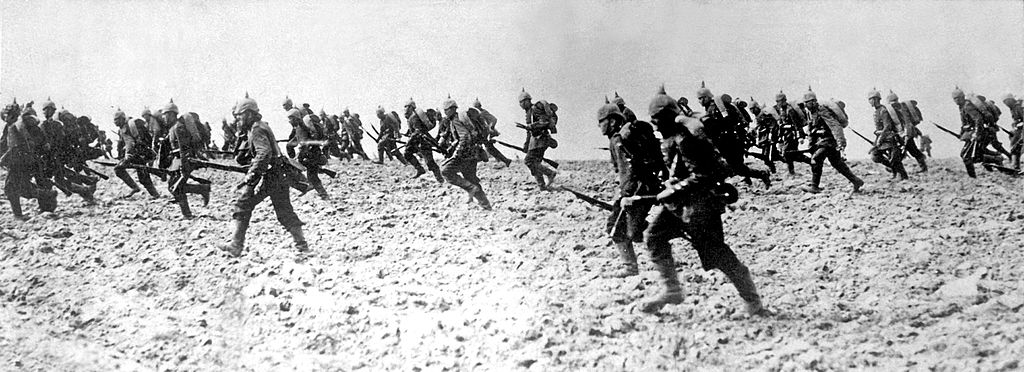
German infantry charge on the battlefield on August 7, 1914, less than two years after ‘Abdu'l-Bahá gives His addresses warning about a conflagration in Europe. Wikimedia Commons.
When 'Abdu'l-Bahá speaks at St. James Methodist Church (at the time, the largest Methodist Church in the world) on September 5, 1912, his audience numbers 1,200 souls and He delivers a stirring warning against war and bloodshed, which turns out to be prophetic in one year, ten months and 23 days, when World War I officially starts:
The greatest catastrophe in the world of humanity today is war. Europe is a storehouse of explosives awaiting a spark. All the European nations are on edge, and a single flame will set on fire the whole of that continent. Implements of war and death are multiplied and increased to an inconceivable degree, and the burden of military maintenance is taxing the various countries beyond the point of endurance. Armies and navies devour the substance and possessions of the people; the toiling poor, the innocent and helpless are forced by taxation to provide munitions and armament for governments bent upon conquest of territory and defense against powerful rival nations. There is no greater or more woeful ordeal in the world of humanity today than impending war. Therefore, international peace is a crucial necessity. An arbitral court of justice shall be established by which international disputes are to be settled. Through this means all possibility of discord and war between the nations will be obviated.
The Promulgation of Universal Peace, Talk at St. James Methodist Church
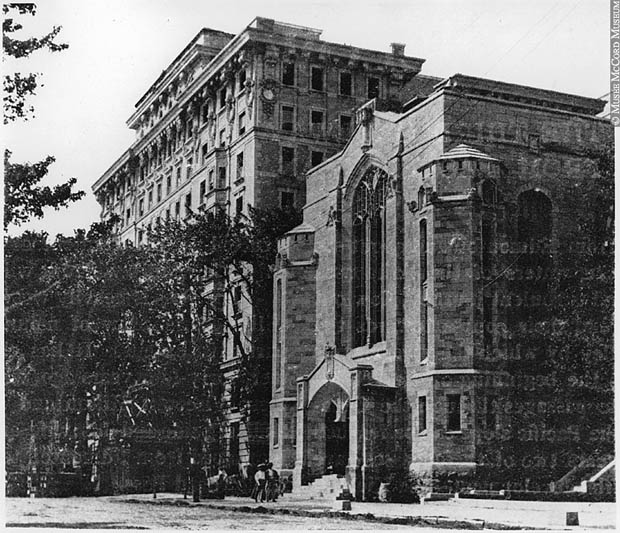
The Unitarian Church of the Messiah in Montreal, where 'Abdu'l-Bahá spoke. This church opened its doors only seven years prior to His visit, in 1905 and was designed by William Sutherland Maxwell. Images Montréal.
During His visit to Montreal, 'Abdu'l-Bahá gave eight public addresses and seven informal presentations, a total of fifteen talks. We have transcripts for six of these talks in The Promulgation of Universal Peace. William Sutherland Maxwell designed the Church of the Messiah, which opened its doors in 1905, seven years before 'Abdu'l-Bahá speaks there on September 1, 1912. The minister, Reference F.R. Griffin, introduces 'Abdu'l-Bahá using the very Persian term of respect, "His Holiness 'Abdu'l-Bahá." His deference merits to share his introduction in full:
We are honored today with the presence of the Prophet of Peace whose message is the Message of God. God has raised Him to exterminate war and bloodshed. His presence in this church is the cause of eternal honor and the fulfillment of our long-cherished hopes and desires. He is the sign of love among the people and the promoter of oneness and brotherhood among the sons of men. His object is to free people from the shackles of imitation and to unfurl the banner of the oneness of humanity. He is the temple of kindness, the possessor of the greatest news, the inspirer of the new thoughts and the expounder of the happiness of this great cycle. Although He has suffered violence and affliction for many years and has seen persecutions, His spiritual power is still flowing like the water of life. Although His body has felt the cross, yet His spirit, which is life-giving, has not been crucified. He has journeyed by land and sea to come to these western countries. We extend Him a sincere welcome and offer the incense of gratitude for His teachings which are the cause of the recovery of hearts and are the source of eternal blessings and happiness. Now His Holiness `Abdu'l-Bahá will speak to you.
Mahmúd-i-Zarqání, Mírzá. Mahmúd’s Diary Chronicling ʻAbdu’l-Bahá’s Journey to America
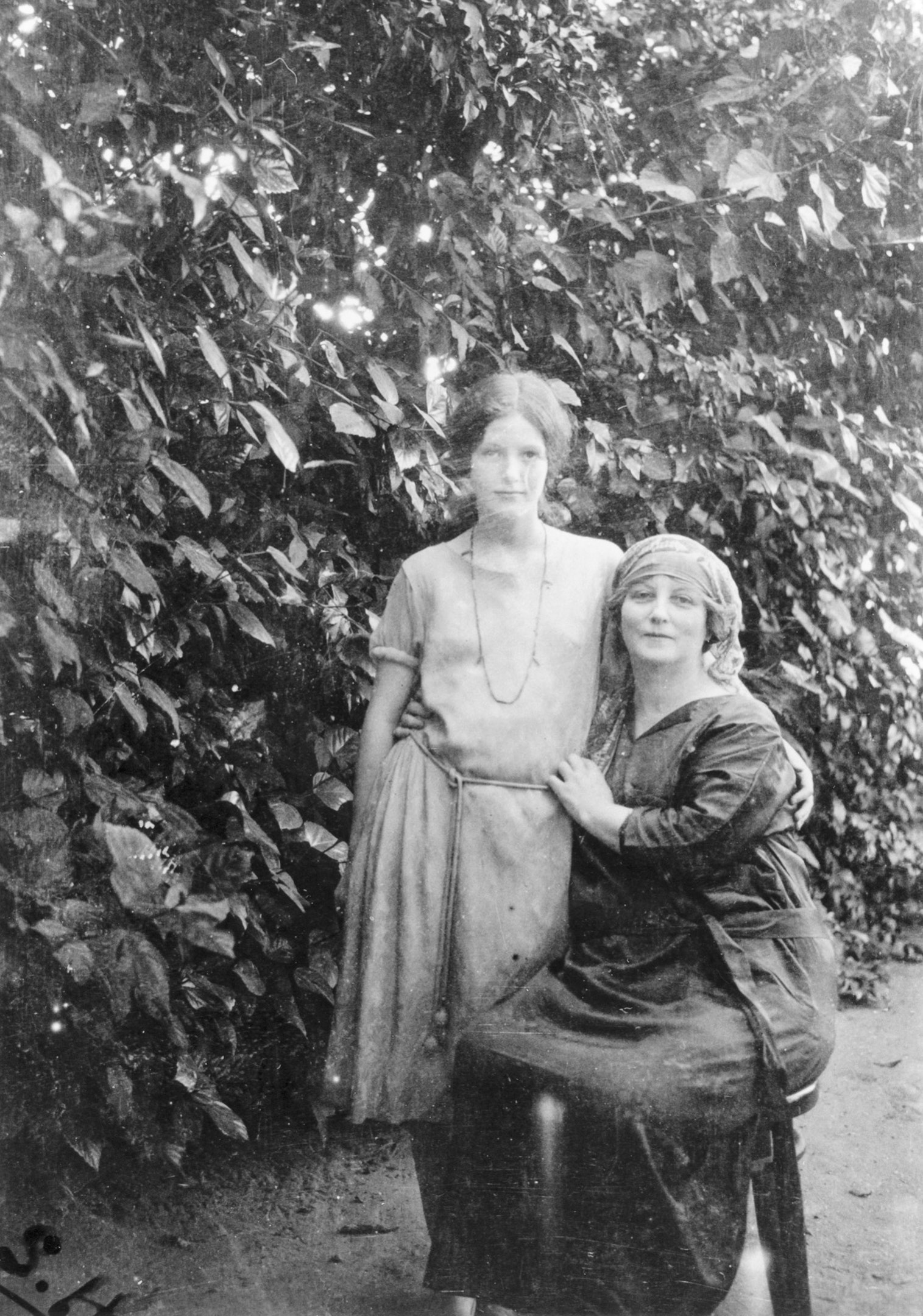
May and Mary Maxwell in Alexandria, Egypt, 1923. Bahá'í Media Bank.
The figure of 'Abdu'l-Bahá looms large over the Maxwell family. May Ellis Bolles is one of 'Abdu'l-Bahá's earliest Western devoted servants, she is the heart of the Bahá'í community of Paris and shares the Bahá'í Teachings with that immortal soul, Thomas Breakwell. May Maxwell is an extraordinary soul. Though not a Disciple of 'Abdu'l-Bahá or a Hand of the Cause, she occupies an even higher station, that of martyr, conferred upon her by Shoghi Effendi upon her death. During her life, however, she was repeatedly singled out by 'Abdu'l-Bahá, in one instance as one of only three people named in all of the Tablets of the Divine Plan, one of the three charters of the New World Order. 'Abdu'l-Bahá does not, however, simply name her. In the course of one paragraph, He speaks of her indefatigable efforts in Canada and then says these immortal words:
"One pearl is better than a thousand wildernesses of sand, especially this pearl of great price, which is endowed with divine blessing. Erelong thousands of other pearls will be born from it. When that pearl associates and becomes the intimate of the pebbles, they also all change into pearls."
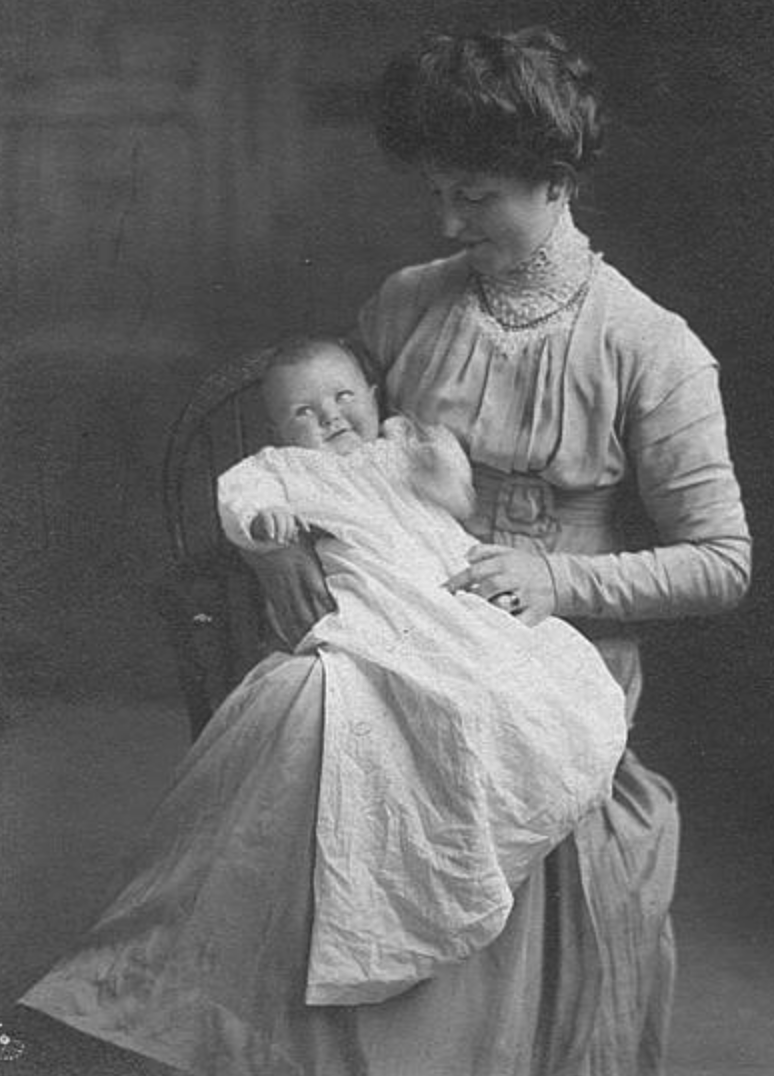
May Maxwell and baby Mary around 1910. Bahaipedia.
When she marries William Sutherland Maxwell, they are already in their thirties, and indefatigable teachers of the Cause. In Late February 1909, May and William Sutherland Maxwell come on pilgrimage to the Holy Land for six days. One early evening at twilight during her pilgrimage, May Maxwell is holding the baby of Rúḥá Khánum—one of 'Abdu'l-Bahá’s daughters—and walking past the Master’s room to show him to her husband. 'Abdu'l-Bahá calls her to Him and asks her if she likes the baby. May Maxwell replies she and her husband have twice had the opportunity to adopt children but William Maxwell would not do it. Then 'Abdu'l-Bahá asks May Maxwell three questions in succession: if she would like a child, if she knew why she had not yet had a child and if she wanted a child now. May Maxwell is 39 years old at this time, and she says she cannot have children but that she is content with the Will of God. In ringing tones 'Abdu'l-Bahá says:
This is not true; you can have children, do you want a child – shall I give you a child?
May Maxwell replies:
Whatsoever you desire for me – this is all I wish.
As soon as she speaks these words, May Maxwell finds herself and the baby clasped in 'Abdu'l-Bahá’s warm embrace, His hands passed tenderly over her head. The Master then says:
That is the reply of my own daughter – be assured – be happy – I will pray for you.
Story from: Nakhjavani, The Maxwells of Montreal, pp. 251–2
In 1910, at the age of 40. she and her husband welcome Mary Maxwell into the world. During 'Abdu'l-Bahá's visit to Montreal, Mary is a highly-spirited two-year-old. One day, when 'Abdu'l-Bahá scoops Mary up to giver a kiss, she slaps Him and 'Abdu'l-Bahá's turban flies off His head! Mortified, May Maxwell asks how she should punish the child, and ‘Abdu’l-Bahá responds, ‘Leave her alone, she is the essence of sweetness.’ After this little incident, 'Abdu'l-Bahá chases Mary around until He catches her, then wraps her in His arms, and gives her a kiss. One final memorable vignette is when ‘Abdu’l-Bahá is resting, one day, and Mary is emphatically told: ‘Don’t you disturb the Master. He is very, very tired, and don’t you make any noise.’ Mary Maxwell shoots into the room and 'Abdu'l-Bahá tells the rest of the lovely story:
Today I was resting on the chaise lounge in my bedroom and the door opened. The little girl (Mary Maxwell) came in to me and pushed up my eyelids with her small fingers and said ‘Wake up, ‘Abdu’l-Bahá!’ I took her in my arms and placed her head on my chest and we both had a good sleep.
Violetta Nakhjavani, The Maxwells of Montreal, p. 282
In 1923, heartbroken over the death of 'Abdu'l-Bahá, May and Mary Maxwell go to the Holy Land on pilgrimage and they meet Shoghi Effendi. May Maxwell's heart is mended. They return for pilgrimage three years later in 1926. In 1937, May and a 26-year-old Mary Maxwell return to Haifa, and a few months later, Shoghi Effendi and Mary Maxwell are married. Twenty-five years after 'Abdu'l-Bahá stayed in her home, Mary is now Amatu’l-Bahá Rúḥíyyih Khánum, and officially becomes part of 'Abdu'l-Bahá's family, and when the enkindled Canadian-American woman marries the Persian great-grandson of Bahá'u'lláh, the very life of the Guardian of the Faith is a living embodiment of the oneness of mankind. The Maxwell family is, in a sense, the highest of Bahá'í Royalty. May Maxwell is elevated to the rank of Martyr, William Sutherland is posthumously elevated to the rank of Hand of the Cause, Amatu’l-Bahá Rúḥíyyih Khánum is not only the daughter of eminent Bahá'ís, but the wife of the Guardian of the Bahá'í Faith, and a Hand of the Cause herself.

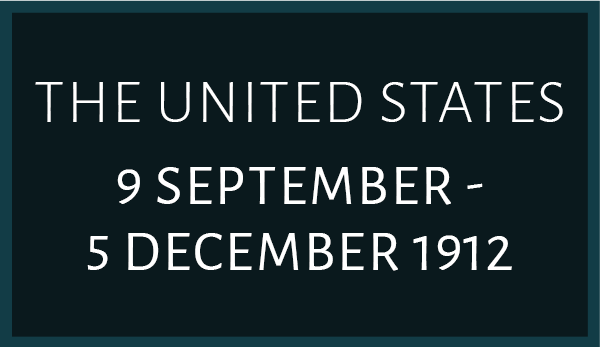
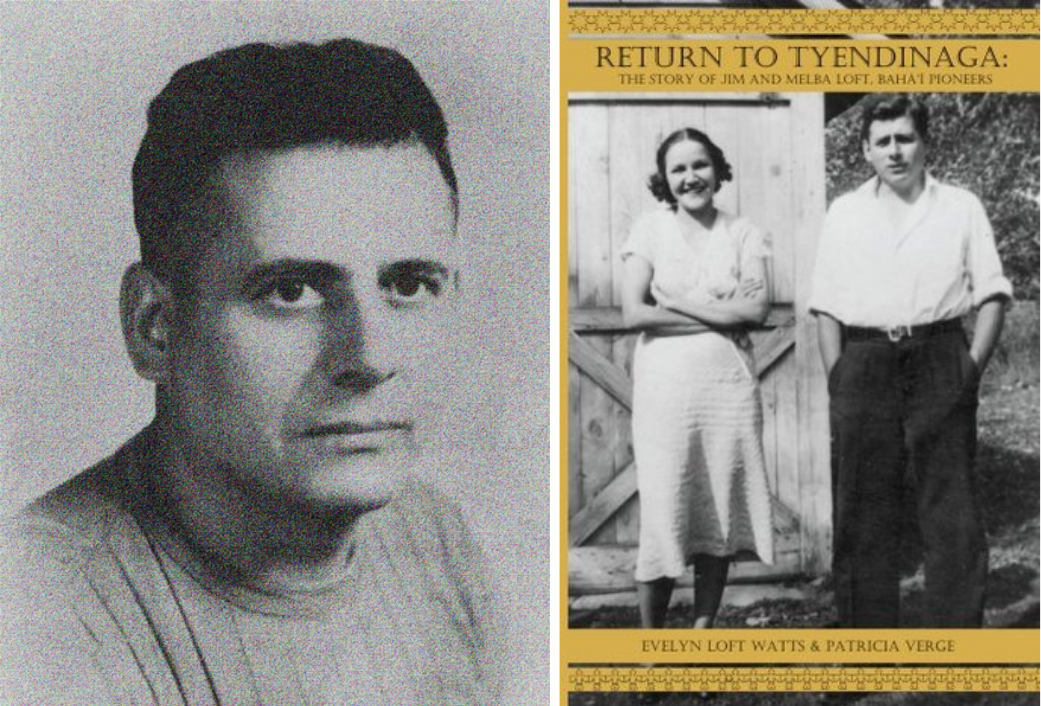
Left: Jim Loft in 1948. Right: "Return to Tyendinaga: The story of Jim and Melba Loft, Bahá'í pioneers," a book by Evelyn Loft Wats and Patricia Verge.
This is a story about the effect 'Abdu'l-Bahá had on untold numbers of souls, wherever He went. It is a moment that only lasted seconds in His three-year Journeys to the West, but it is a powerful vignette that serves to illustrate the magnitude of His spiritual power.
On the afternoon of September 9, 1912, Jim Loft, a four-year-old First Nations Canadian boy from Tyendinaga Mohawk Territory, is sitting on a fence just outside of the little town of Oshawa, Ontario, right next to the railroad tracks, watching the train rush past him. At about 3:30 in the afternoon, he sees “a man wearing a long flowing white robe waving from the train,” and, overwhelmed, he falls off the fence and onto the grass. This will be Jim Loft's earliest surviving memory. Jim suffers in the intervening years and often prays to ask God's help for inspiration to help him alleviate the poverty, oppression and alcoholism that plagued his First Nations people.
Exactly 19 years later, Jim marries Melba Whetung, a Curve Lake First Nation Canadian. Jim and Melba become the first First Nation Canadian Bahá'ís, and Shoghi Effendi writes them a warm welcome letter. When he becomes a Bahá'í Jim says:
Now I know who that old man was. It was ‘Abdu’l-Bahá when he was in this country.
Eighteen years later in 1949, Jim and Melba, In 1949, settle on the Tyendinaga Reserve and dedicate their lives to serving and supporting the First Nations community, having both been greatly affected by the prejudice they encountered growing up First Nations in rural Canada. To find out more about their extraordinary journey, read "Return to Tyendinaga: The story of Jim and Melba Loft, Bahá'í Pioneers" by Evenly Loft Watts and Patricia Verge, Essex, Maryland: One Voice Press, 2011.
6 October 1912 The Unitarian Church
where 'Abdu'l-Bahá gave His first public address in California
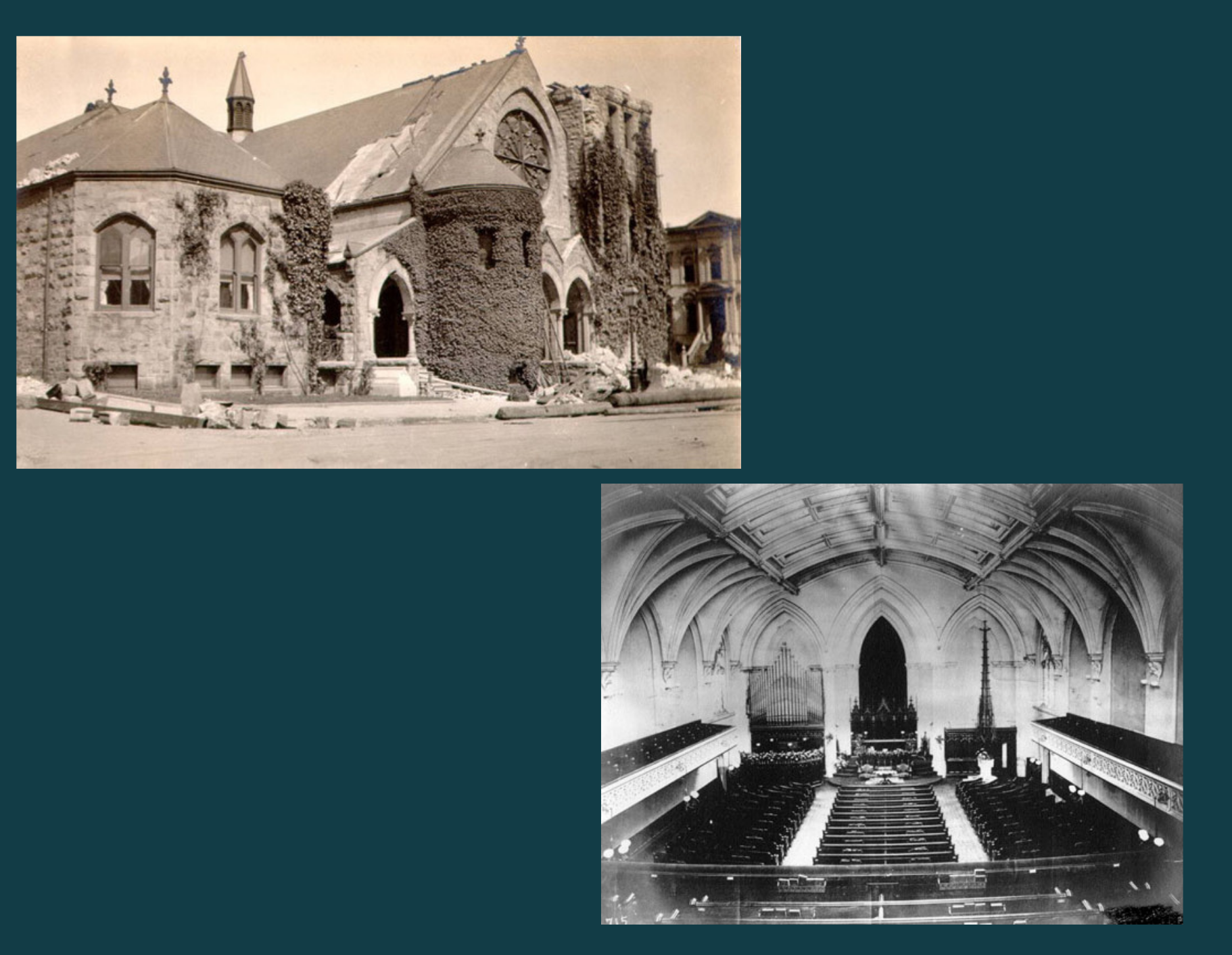
Photos courtesy of Charleen Maghzi-Ader.
11 October 1912 - 'Abdu'l-Bahá teaches Helen Goodall to consult in Sutro Heights
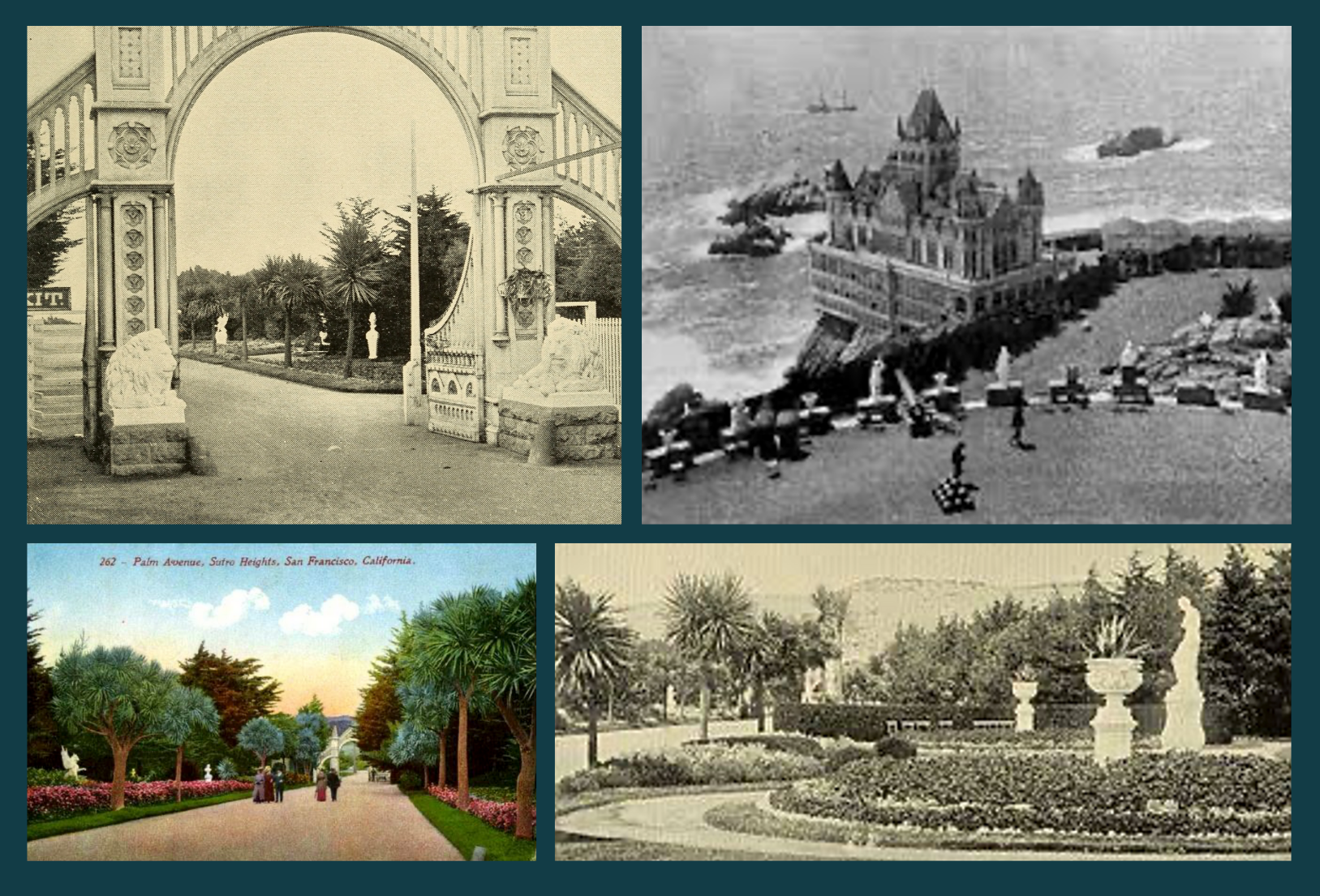
Public domain photos of Sutro Heights Gardens showing the entrance and Palm Avenue. Photos courtesy of Charleen Maghzi-Ader.
Sutro Heights would be the western-most point in America visited by 'Abdu'l-Bahá, according to the San Francisco Bahá'í Archives. Sutro Heights Park, where this conversation takes place is an historic public park in western San Francisco, California and is within the Golden Gate National Recreation Area.
Dr. Fareed to Mrs. Goodall: "'Abdu'l-Baha asks for your opinion as to whether he should go to visit the Northern cities or return to the Orient!"
Mrs. Goodall: "'Abdu'l-Baha knows best what to do."
'Abdu'l-Baha: "I want consultation -- this is not the way to consult (laughing)". I ask your opinion -- If it were my will I would not have asked you."
Mrs. Goodall: "'Abdu'l-Bahá asks for my opinion. The believers in Persia have suffered so much. I feel that if the western believers understood the situation, (their sacrifices) it would mean far greater spiritual development for them if they would sacrifice their desires and give 'Abdu'l-Bahá to the Persian believers."
'Abdu'l-Bahá: "Very good. I want you to write this exactly, to the believers, giving the details. Tell them I have many letters from the orient -- all stating that the believers in the Orient have travelled long distances and they are disappointed that I am not there. They are constantly coming there from afar, from great distances to see me. They feel disappointed and very sad. The believers in the Northwest will realize greater development if they sacrifice themselves to have me go to those pilgrims. Write that exactly -- state that: If they do sacrifice self to this extent it will mean their spiritual development and attainment. Whoever can may come from the North to visit me here. While I am here I will see them. Send this to all the Northern cities, Seattle, Portland, all the Northern cities. Tell them the believers have gone to Akka, some of them taking three months journey on mules or horses, and some walking, and they do not find me there.
"You may write it in my behalf -- say that the Master says so and so -- that he is longing to see you -- excessively longing -- but he is compelled to go. The winter is before us and how can I cross the Atlantic. It would be arduous -- and then the Master's health. He cannot endure excessive cold. Send a night letter in which you say that a lengthy letter will follow."
Ella Goodall Cooper Collection, National Bahá’í Archives, United States.
16 October 1912 - The Feast of 'Ilm (Knowledge)
Held in Oakland at Helen Goodall's home
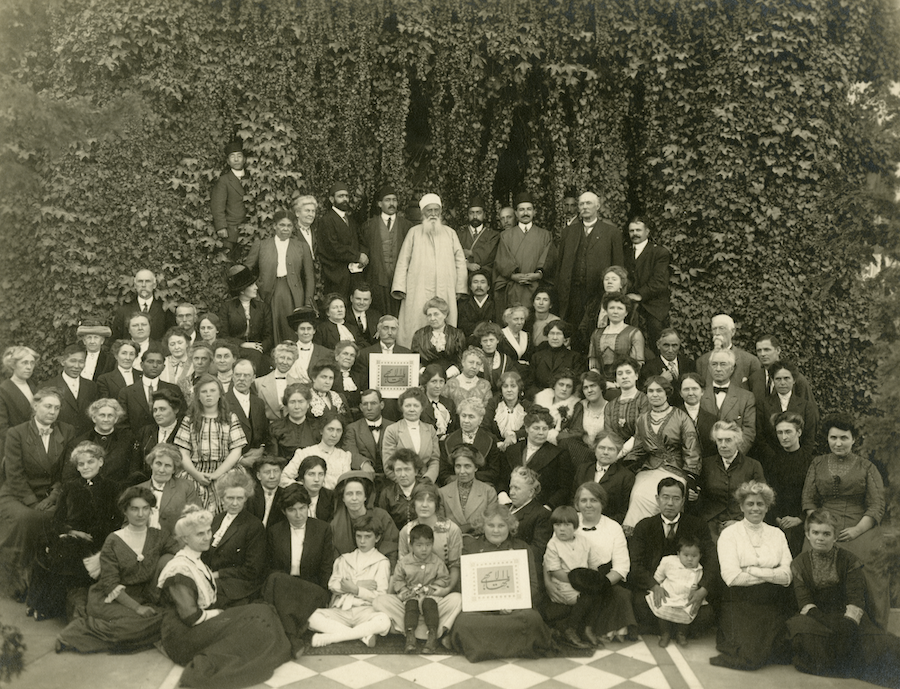
'Abdu'l-Bahá in Oakland at a celebration of the Feast of Ilm on October 16, 1912 at the home of Helen Goodall. Courtesy of the United States National Bahá'í Archives.
'Abdu'l-Bahá's Residence in San Francisco: 1815 California Street

Photos from Mahmúd-i-Zarqání, Mírzá. Mahmúd’s Diary Chronicling ʻAbdu’l-Bahá’s Journey to America.
'Abdu'l-Bahá at the Bison Paddock
There, are the true philosophers,
for they never get their heads above the earth.
Ella Goodall Cooper Collection, National Bahá’í Archives, United States.

Bison in Golden Gate Park. From Open SF History.
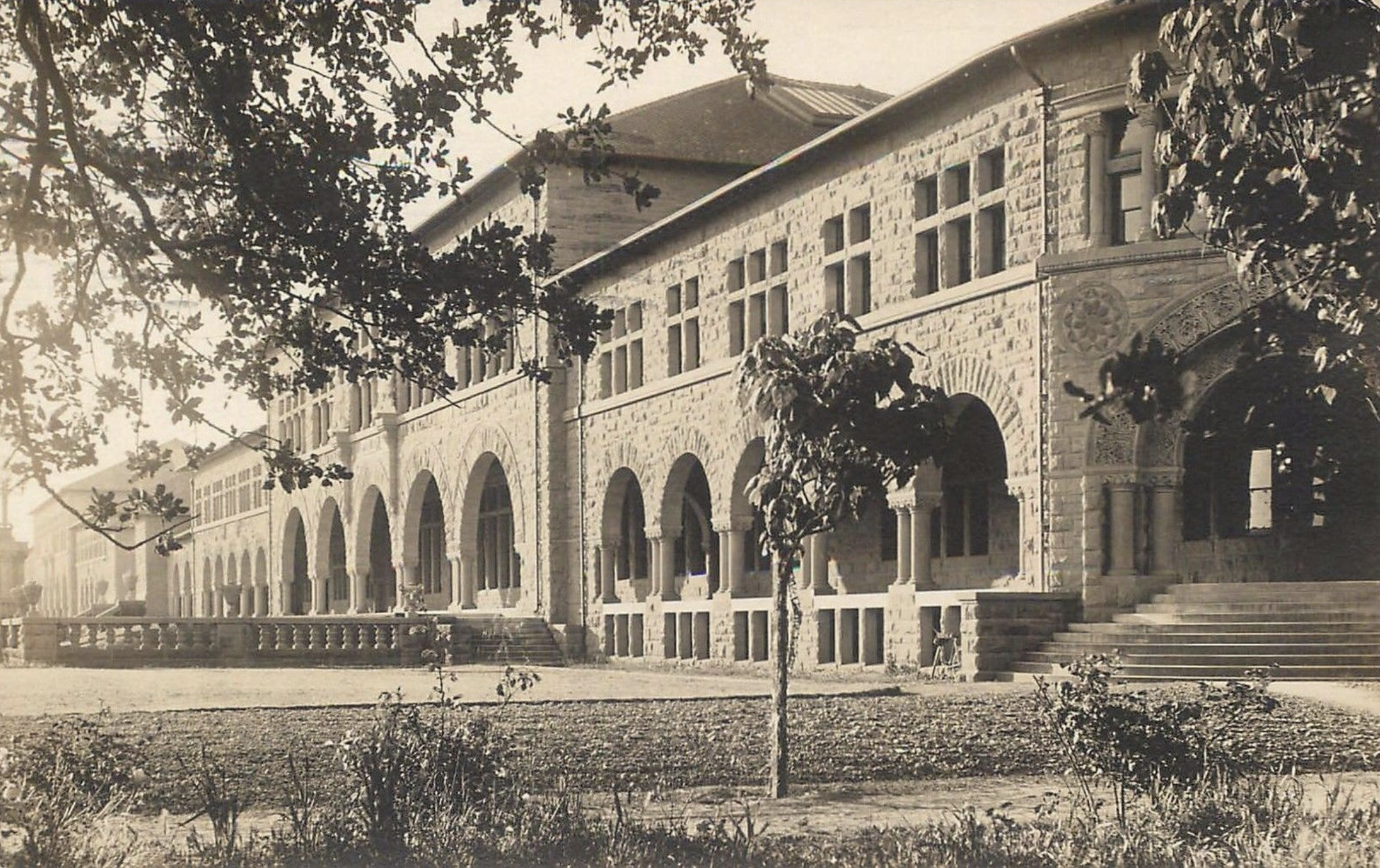
Stanford University, circa 1910-1920.
On October 2, 1912 many prominent people visit 'Abdu'l-Bahá in San Francisco. Among them is Dr. David Starr Jordan, the president of Stanford University at Palo Alto, so attracted to the teachings that he asks 'Abdu'l-Bahá to come speak at Stanford University. Six days later, on October 8, He arrives to an audience of 1,800 students and 180 professors, along with prominent Palo Altans, assembled in the auditorium. The hallways and satellite rooms of the auditorium are full, and throngs of people stand outside, waiting to enter.
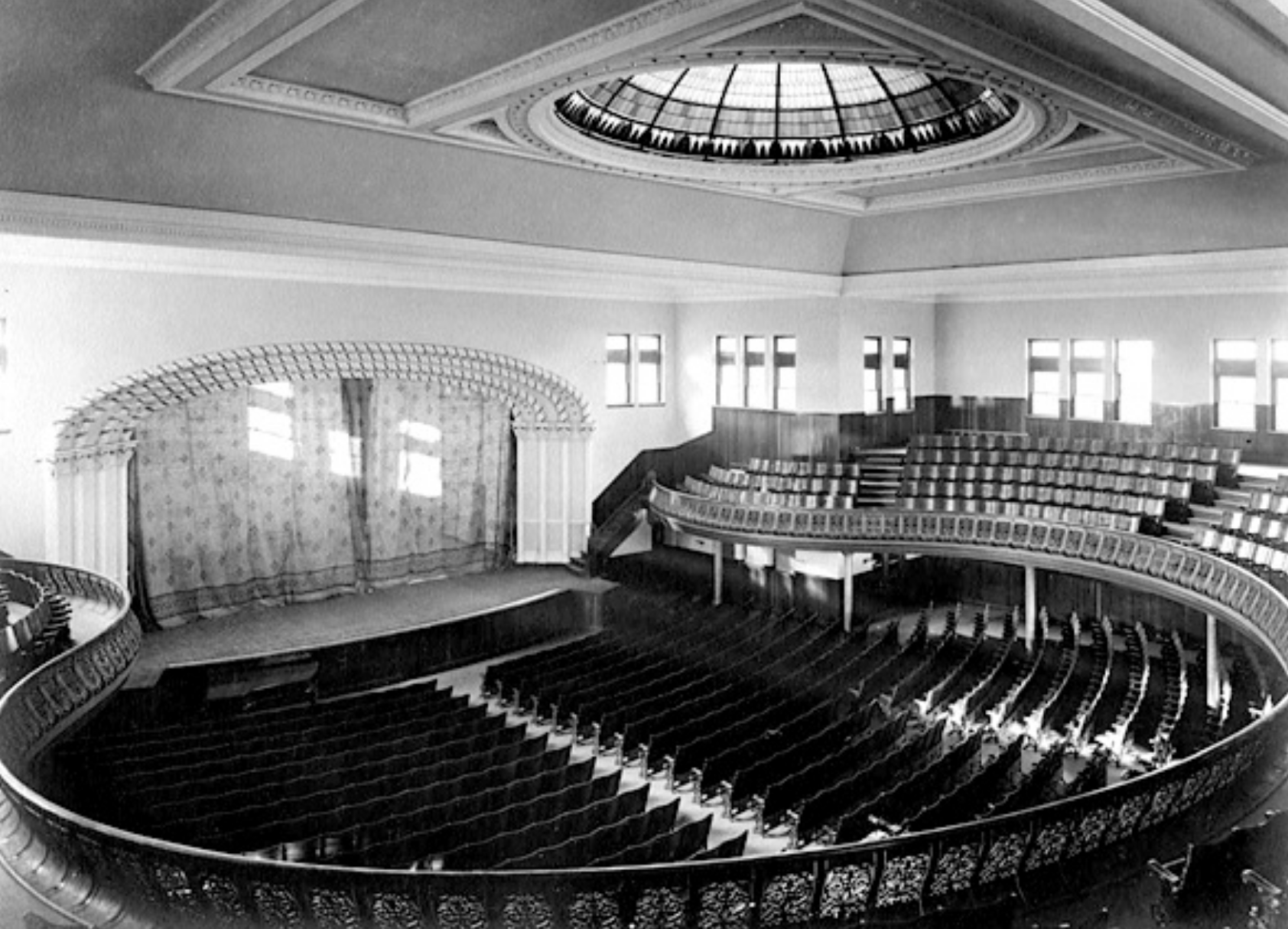
Auditorium of Stanford University. Beyond Foreignness.
Dr. David Starr Jordan introduces 'Abdu'l-Bahá
The greatest attainment in the world of humanity has ever been scientific in nature. It is the discovery of the realities of things. Inasmuch as I find myself in the home of science—for this is one of the great universities of the country and well known abroad—I feel a keen sense of joy. The highest praise is due to men who devote their energies to science, and the noblest center is a center wherein the sciences and arts are taught and studied. Science ever tends to the illumination of the world of humanity.
'Abdu'l-Bahá, The Promulgation of Universal Peace, Address at Stanford University
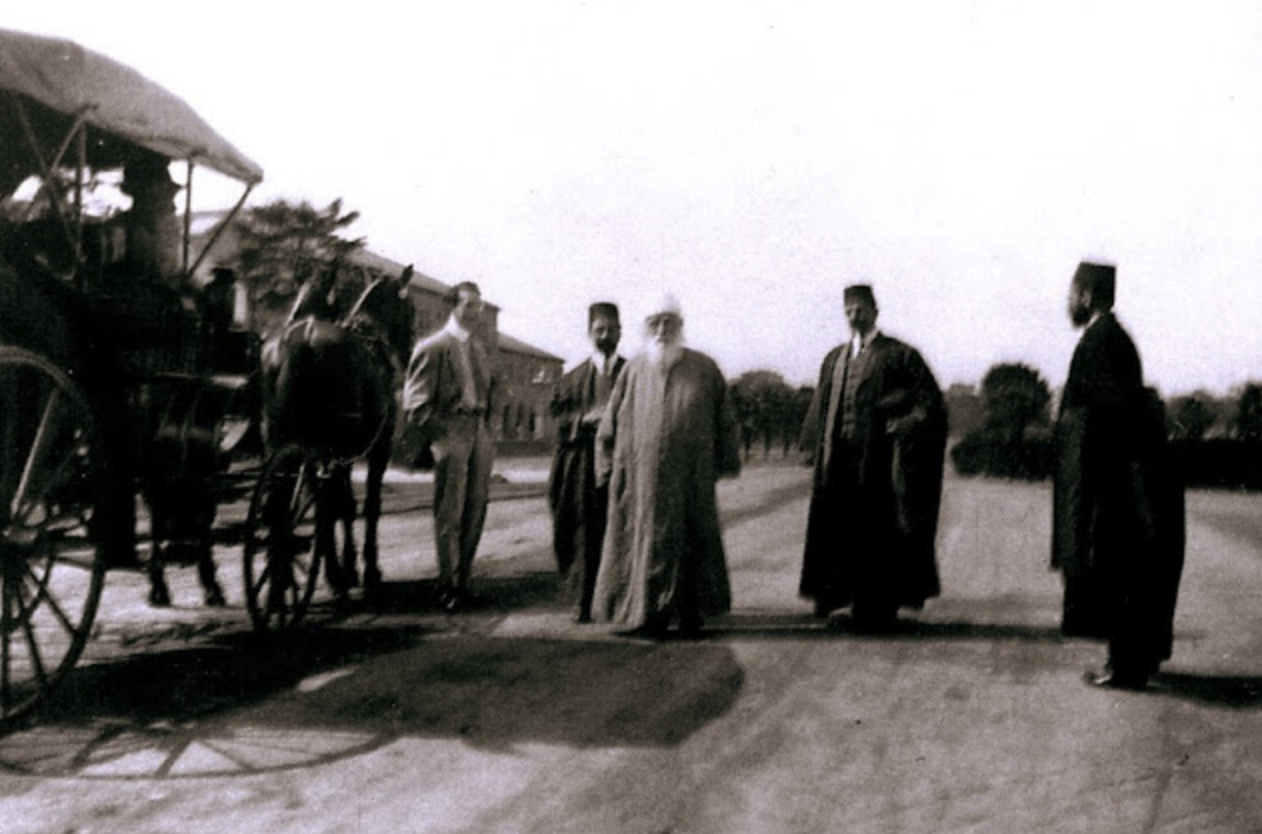
'Abdu'l-Bahá at Stanford University. 'Abdu'l-Bahá visits the West.
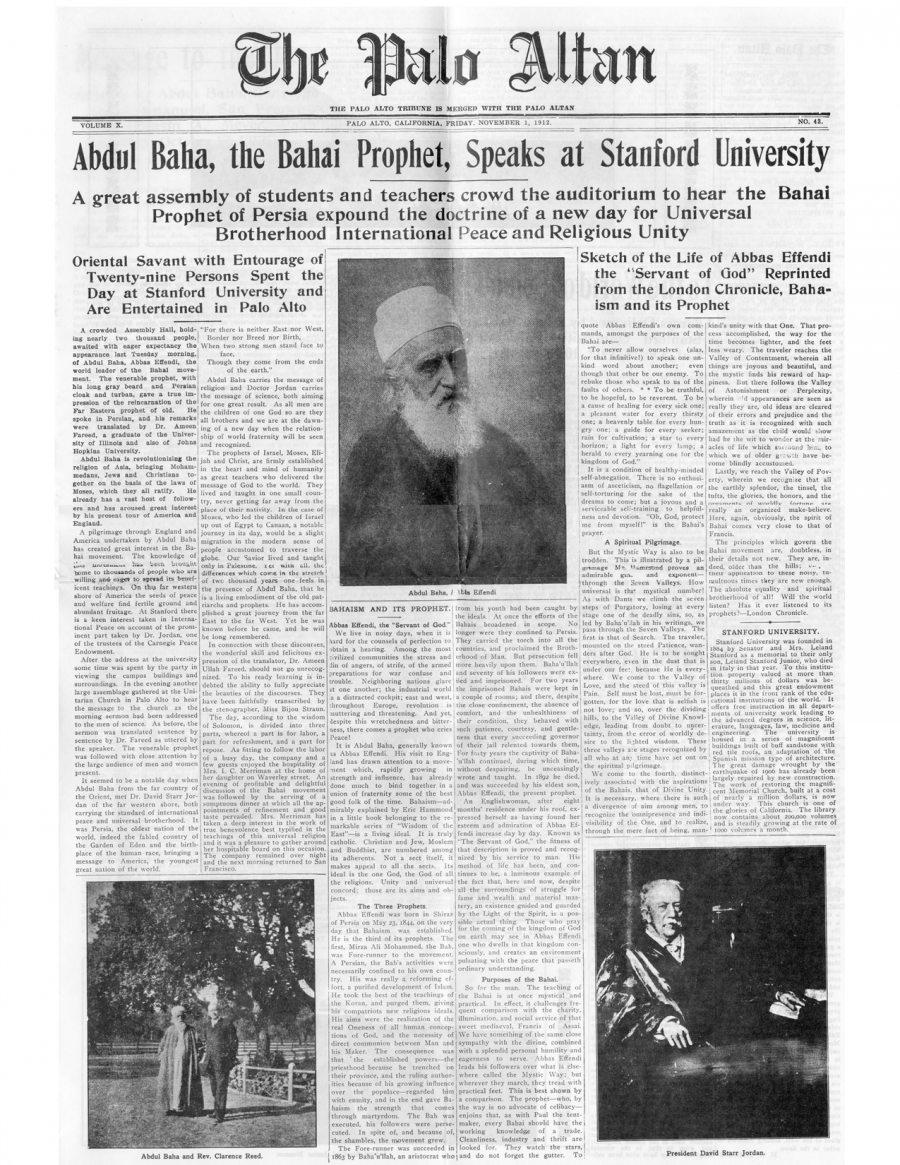
The Palo Altan Newspaper Headline for November 1, 1912. 'Abdu'l-Bahá in America.
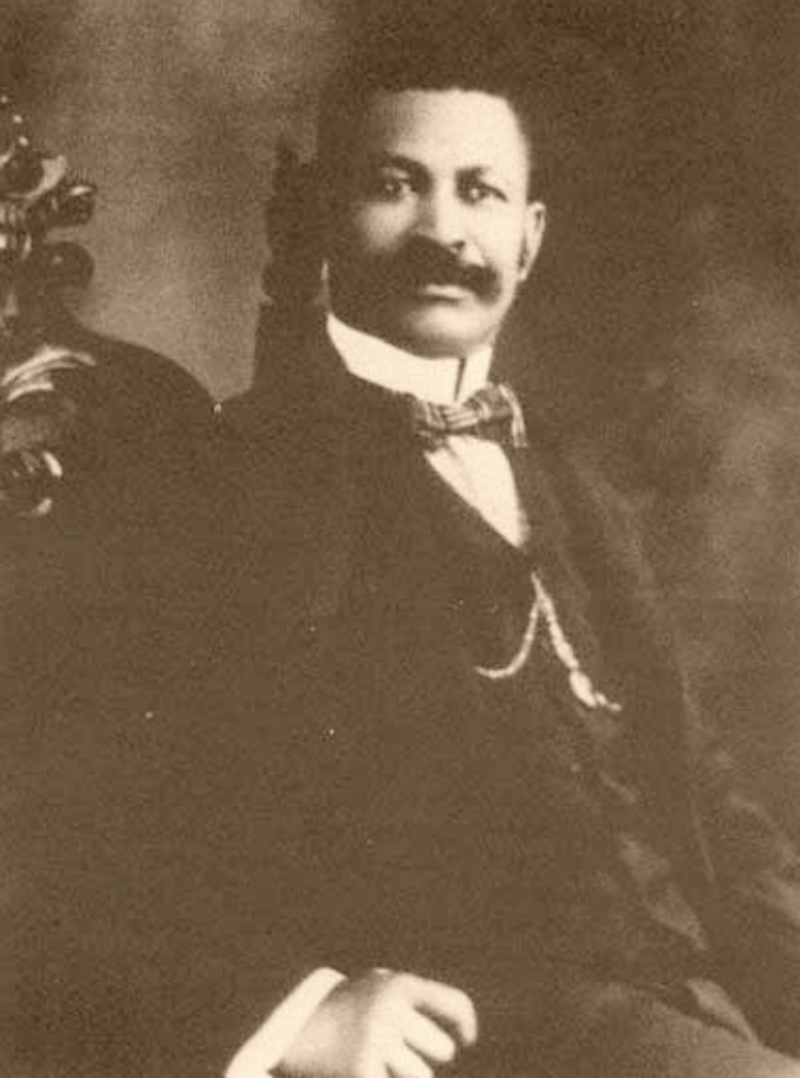
Charles Henry Tinsley, no date. Baha'i Teachings.
Perhaps no other story can more perfectly incarnate how at home ‘Abdu'l-Bahá is, wherever in the world His feet might be treading at the present moment. It is as simple as this: ‘Abdu'l-Bahá acts in Budapest, in New York, in Paris, in London, in Ramleh or in San Francisco, exactly as He does in 'Akká and in Haifa: He is everyone's friend, He cares for strangers, He helps the needy, He counsels the distraught, and, as this story shows, He visits the sick. Visiting the sick is one of the lifelong trademarks of ‘Abdu'l-Bahá. When He resides in 'Akká, whether as a 36-year old man just after being released from the Most Great Prison, or when He visits, after 1910, when He is residing in Haifa, one of His main occupations is to visit the sick, which he does for hours, every day. Sometimes, ‘Abdu'l-Bahá is the only person to visit an indigent, many of whom are not, in fact, Bahá'ís. Many times ‘Abdu'l-Bahá is alone with the ill when they die. And often, ‘Abdu'l-Bahá pays for their funeral. And so, how natural, for the Perfect Exemplar, to do exactly the same when He is in San Francisco?
Charles Henry Tinsley is a trail-blazer. Passionate about theater, and more specifically Shakespeare from youth, his great talent spurred the African-American community of San Francisco to raise money for his professional training in theater in 1893. Nine years later in 1904, a drama club is named after him, sponsored by the Afro-American League. Actors in the early 1900s are very much like actors today: they need a day job, and just as it is today, Tinsley works as a bellhop, a bartender, a caterer, and as a butler for the Hearst family.
In 1903, when he takes a job as butler for Phoebe Hearst, he comes in contact with Robert Turner, the first African American Bahá’í and Disciple of 'Abdu'l-Bahá, and among the very first Western pilgrims every to come to the Holy Land in the winter of 1898, five years previously. Tinsley begins to earnestly study the Bahá’í Faith, reading the iconic book Bahai Proofs by the most eminent Bahá'í scholar of all time, Mírzá ‘Abu’l-Faḍl’. Three years later, in 1906, Tinsley is a Bahá'í.
Tinsley has been a Bahá'í for six years when 'Abdu'l-Bahá comes to San Francisco in October 1912. After leaving the employment of the Hearst family, he works as a waiter when he is the victim of a hit-and-run. He is laid up in bed with a broken leg and other injuries, and one day, on October 10, 1912… Abdu’l-Baha Himself arrives at his home at 1247½ Webster Street, San Francisco. Below is the dialogue from the Star of the West article about this visit:
'Abdu’l-Bahá: How are you? I am very glad to see you.
Charles Henry Tinsley: I am well excepting this broken leg which has kept me in bed a long time. I am impatient to be up and out to work for the [Baha’i] Cause.
'Abdu’l-Bahá:—You must not be sad. This affliction will make you spiritually stronger. Do not be sad. Cheer up! Praise be to God, you are dear to me. I will tell you a story:
A certain ruler wished to appoint one of his subjects to a high office; so, in order to train him, the ruler cast him into prison and caused him to suffer much. The man was surprised at this, for he expected great favors. The ruler had him taken from prison and beaten with sticks. This greatly astonished the man, for he thought the ruler loved him. After this he was hanged on the gallows until he was nearly dead.
After he recovered he asked the ruler, “If you love me, why did you do these things?” The ruler replied: “I wish to make you prime minister. By having gone through these ordeals you are better fitted for that office. I wish you to know how it is yourself. When you are obliged to punish, you will know how it feels to endure these things. I love you so I wish you to become perfect.”
Even so with you. After this ordeal you will reach maturity. God sometimes causes us to suffer much and to have many misfortunes that we may become strong in His Cause. You will soon recover and be spiritually stronger than ever before. You will work for God and carry the Message to many of your people.
“The Visit of Abdul-Baha to Mr. Charles Tinsley,” Star of the West, Volume 3, p. 205.
For many more details about Charles Henry Tinsley’s life, his Bahá'í activities, and to find out what happens next, please read Dr. Christopher Buck’s bahaiteachings.org article Abdu’l-Baha Visits Phoebe Hearst’s Servant, which was the inspiration and source for this story.
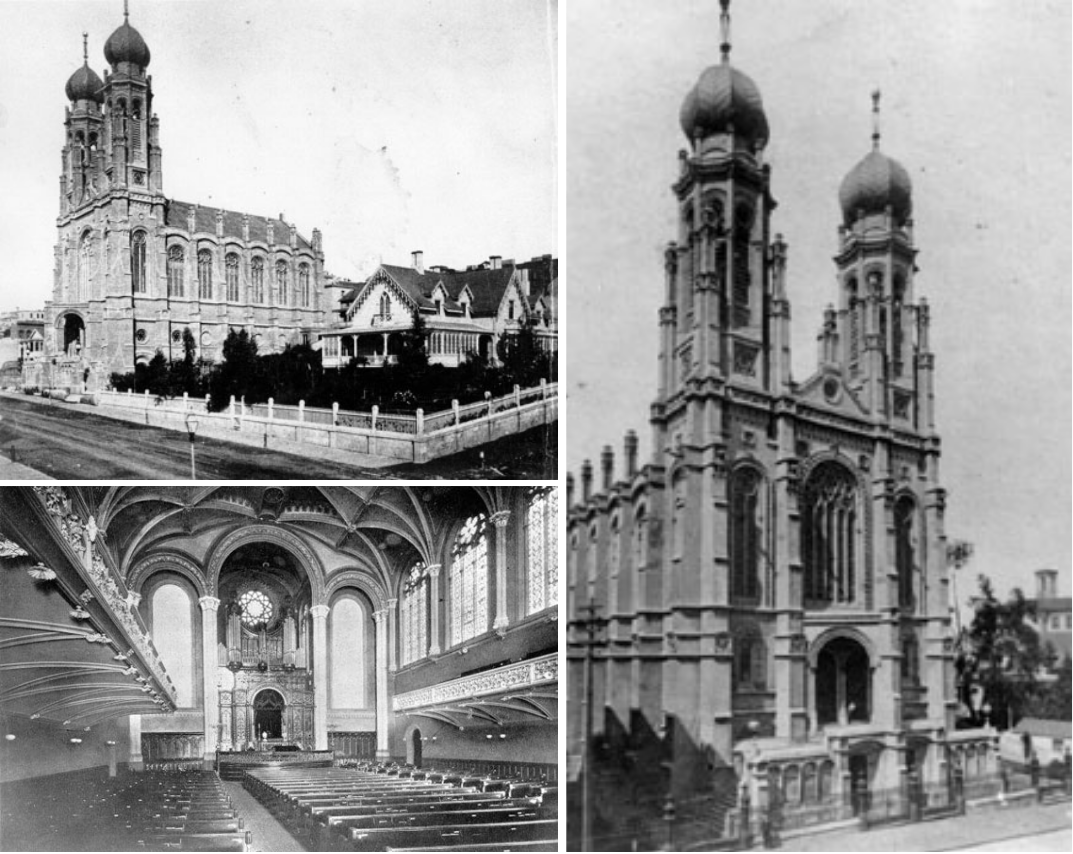
Temple Emmanu-El in San Francisco, Interior and exterior, before its reconstruction. Photos: San Francisco Bahá'í Archives
'Abdu’l-Bahá was invited by Rabbi Martin A. Meyer to speak at Temple Emanu-El in San Francisco. He stands inside the Temple, between two palm trees, a shaft of morning sunlight bathing Him in a glow in front of two thousand Jews of San Francisco. The Master is introduced by Rabbi Meyer:
It is our privilege to welcome in our midst 'Abdu'l-Bahá, a great teacher of our age and generation. The heart of the Orient seems to be essentially religious, and now and then, out of the heart of the Orient, the fundamental religious message for the world is stated and restated. This century is very great and this age is the age of the maturity of the world. 'Abdu'l-Bahá is the representative of one of the religious systems which appeals to us Jews, because we feel that we have fathered that idea throughout the centuries. This morning He will speak to us, the followers and the children of Israel, in His native tongue through an interpreter, on `The Fundamental Unity of Religious Thought'. I am certain that whatever He says will be of great significance to us.
Mahmúd-i-Zarqání, Mírzá. Mahmúd’s Diary Chronicling ʻAbdu’l-Bahá’s Journey to America
'Abdu'l-Bahá addresses a spellbound audience on “The Fundamental Unity of Religious Thought,” clearly demonstrating that the Prophet Muhammad is the upholder of Moses and Christ, and that only the divergence from the original teachings of their respective religions caused the followers to become embroiled in mutually-accusing fanaticism. 'Abdu'l-Bahá concludes his very long and masterful address with a series of eloquent and momentous prophecies:
The age has dawned when human fellowship will become a reality.
The century has come when all religions shall be unified.
The dispensation is at hand when all nations shall enjoy the blessings of international peace.
The cycle has arrived when racial prejudice will be abandoned by tribes and peoples of the world.
The epoch has begun wherein all native lands will be conjoined in one great human family.
For all mankind shall dwell in peace and security beneath the shelter of the great tabernacle of the one living God.
'Abdu'l-Bahá, The Promulgation of Universal Peace, Talk at the Temple Emmanu-El
Profoundly moved, the huge audience pours out from the synagogue, into the street, slowly dispersing back to their homes. The effect of 'Abdu'l-Bahá's words is soon obvious. The Christian church diagonally across from the Temple is demolished, leaving the parishioners without a place of worship. For the next nine months, Rabbi Meyer and the Jewish community of Temple Emmanu-El offer their synagogue to the Christians every Sunday, and so Christians and Jews will worship for nine months under the same roof. When 'Abdu'l-Bahá hears of this, He writes:
...this action and this deed will become eternal, and in the future ages and cycles, the good intention of the Reverend Rabbi will be recorded in the books and works of universal history and will be on the lips of all men without end.
'Abdu'l-Bahá quoted in The Bahá’í World, vol. III (1928–1930), pp. 362.
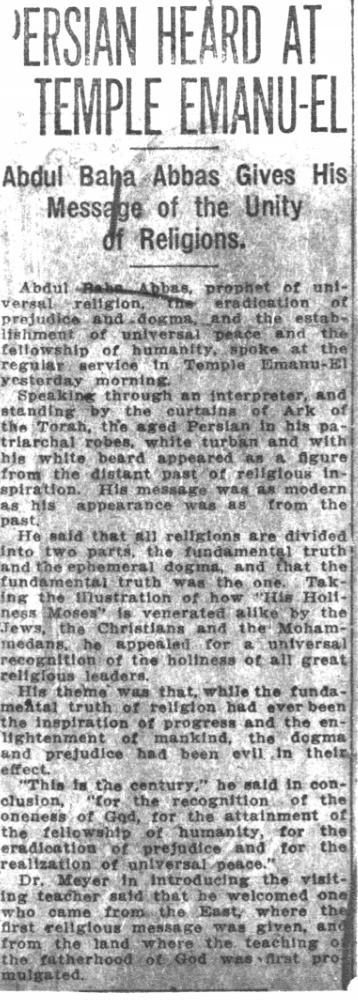
San Francisco Chronicle article dated October 13, 1912. 'Abdu'l-Bahá in America.
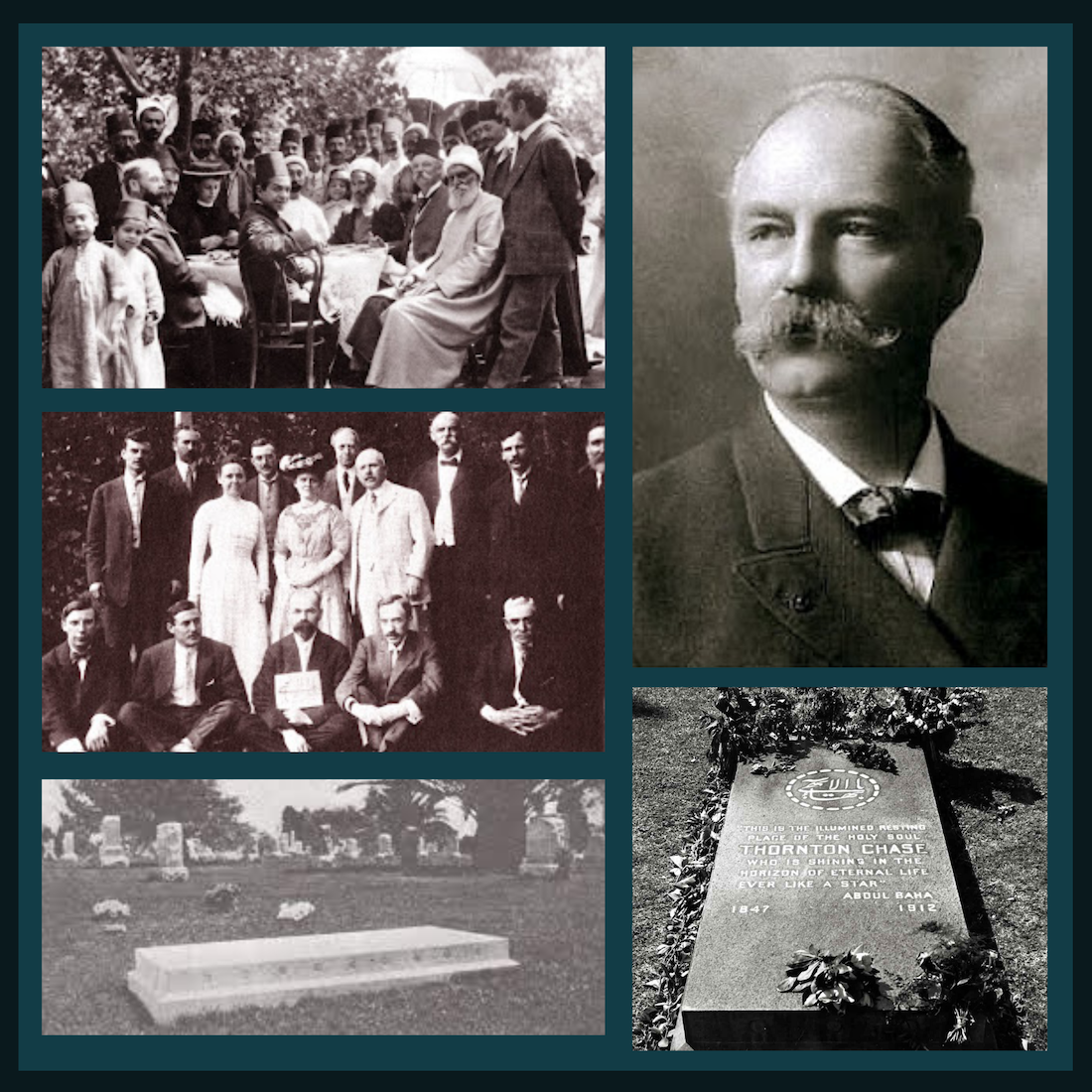
Left column, top to bottom: Thornton Chase in Egypt at the time of his pilgrimage to the Holy Land in 1907 from Baha'i Heroes and Heroines: Thornton Chase; Thornton Chase in the Temple Committee from Baha'i Heroes and Heroines: Thornton Chase; and Thorton Chase's grave from Star of the West, vol. 10, no. 19, from Wikimedia Commons; Right column, top to bottom: Portrait of Thornton Chase in 1900 scanned from In Galilee, from Wikimedia Commons; Closeup of Thornton Chase's grave from 239Days: Day 192 ‘Abdu’l-Bahá in the City of Angels
I love Mr. Chase very much indeed. His heart was pure. He had no other aim except service to the Cause; he had no other thought except the thought of the Kingdoms. Therefore he was very dear to me, and at the threshold of Bahá’u’lláh he was accepted. The Blessed Perfection has invited him to His Kingdom. At this very moment he is submerged in the Sea of His Bounty.
Words of 'Abdu'l-Bahá Transcribed
in "Some Early Believers in the West"
Thornton Chase dies on September 30, 1912, a mere three days before ’Abdu’l-Bahá’s train crosses into California on the evening of October 2, 1912. The first Bahá'í in America, Thornton Chase was named "Thábit" by 'Abdu'l-Bahá, meaning "Steadfast" in a Tablet revealed for him:
O thou firm one in the Covenant! We give thee Thahbet (Thábit) for a name, so that this name be an example of firmness and in the future thou mayest, even more than before, be confirmed in service, and upon thee be El-Baha-el-ABHA!
'Abdu'l-Bahá pays Thornton Chase the honors of a king. He travels almost the entire length of the state of California, close to 560 kilometers, only to pay His respects at Thornton Chase's grave. 'Abdu'l-Bahá arrives in Los Angeles on October 18, 1912. The next morning, October 19, after His private prayer and meditation, 'Abdu'l-Bahá boards the tram to the Inglewood Cemetery, in Inglewood, a few kilometers from His hotel. Without asking for directions, the Master alights and walks, dignified and serene, straight to Chase's grave. He praises the surroundings, the lush grass and leans against a tree for some time. Then, 'Abdu'l-Bahá stands at Thornton Chase's grave and spreads bouquets of flowers over the tomb, sanctifying it with so much love and affection, that all those present are deeply moved. 'Abdu'l-Bahá then turns towards the Holy Land and chants the Tablet of Visitation for Bahá'u'lláh, after which He recites a prayer for the departed in Arabic. 'Abdu'l-Bahá then gives a brief account of Thornton Chase's distinguished life of service, praising his steadfastness and his forbearance. Before leaving, He places His forehead on the grave and kisses it. All those present had tears in their eyes as they bowed before Thornton Chase's grave, every last one of them longing to attain, at their very end, so sublime and exalted a station. At a meeting, some time later, 'Abdu'l-Bahá will say of Thornton Chase:
This is a personage who will not be forgotten. For the present his worth is not known, but in the future it will be inestimably dear. His sun will be ever shining, his star will ever bestow the light.
Words of 'Abdu'l-Bahá Transcribed
in "Some Early Believers in the West"
And at another meeting, He will say:
As many times as possible, at least once a year, you should make it a point to visit his tomb, for his spirit will be exhilarated through the loyalty of the friends, and in the world of God will it be happy. The friends of God must be kind to one another, whether it be in life or after death
Words of 'Abdu'l-Bahá Transcribed
in "Some Early Believers in the West"
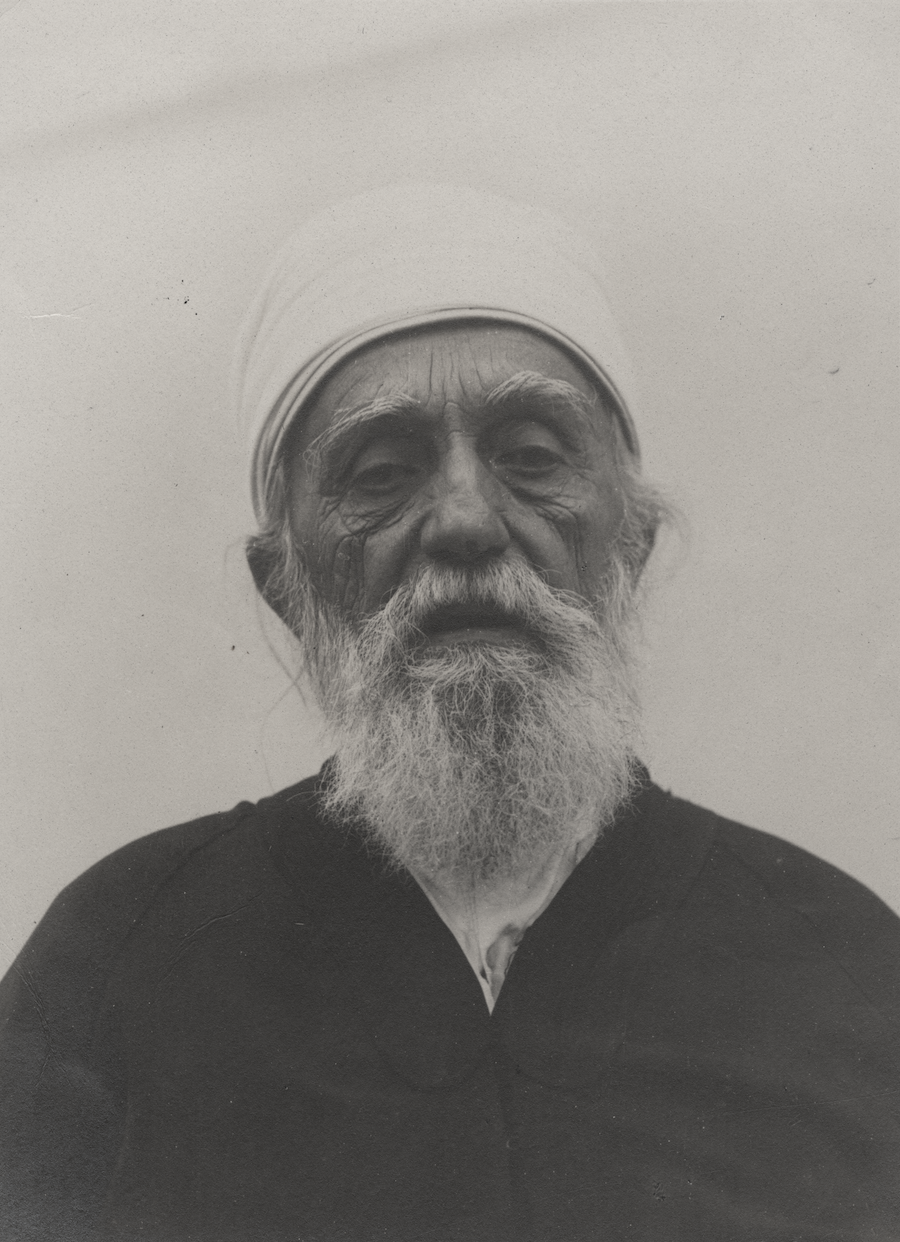
Portrait of 'Abdu'l-Bahá taken aboard the Cedric when He arrives in New York City on April 11, 1912. Courtesy of the United States National Bahá'í Archives.
On 18 November 1912, at the Kinneys' house, 'Abdu'l-Bahá puts Howard MacNutt through a severe and inevitable ordeal, testing his firmness in the Covenant. When Juliet Thompson had first arrived in New York, Howard MacNutt had been part of those Bahá'ís who believed that the Master was "like Peter," in other words, that 'Abdu'l-Bahá was just a glorified disciple.
For years Howard McNutt did not publicly mention this point of view and so, Juliet Thompson thought, he had gotten over his misconception. The week previously, 'Abdu'l-Bahá had sent Howard to Chicago with a message for the so-called Bahá'ís associating with Khayru'lláh, the great Covenant-breaker: either they gave up association with Khayru'lláh or they would be cut off from the faithful believers.
Howard McNutt had written from Chicago. He had said he had found the Bahá'ís he had been meant to warn were “angels” and he had done nothing. He arrives at the Kinney’s on November 18, to see 'Abdu'l-Bahá for the first time after his unproductive trip.
'Abdu'l-Bahá takes Howard into His own room. After some time, they emerge, and come out together into the hall. An immense crowd has gathered by then on the ground floor of the residence, and 'Abdu'l-Bahá tells Howard:
"Go down and tell the people: 'I was like Saul. Now I am Paul, for I see."
Poor Howard McNutt responds:
"But I don't see."
'Abdu'l-Bahá reiterates:
"Go down and say: 'I was like Saul.'"
Juliet Thompson pulls at his coattail and tells him:
"For God's sake, go down."
Howard McNutt replies, miserable:
"Let me alone."
Then, 'Abdu'l-Bahá commands:
"GO DOWN."
Howard MacNutt turns and goes down the stairs, and his back looking shrunken. 'Abdu'l-Bahá leans over the stair rail, with His head thrown far back, His eyes closed, in anguished prayer. Downstairs, Howard McNutt speaks to the crowd, stumbling through his confession, unconvinced. When he returns upstairs, 'Abdu'l-Bahá, who had returned to His room, rushes forward to meet Howard and pours out His love to him. He enfolds Howard McNutt in a close embrace, kisses him warmly and welcomes with divine ecstasy a broken man, who, though bewildered, has obeyed.
Speaking of Howard McNutt’s chastisement the next evening, 'Abdu'l-Bahá sighs and says:
"I immersed Mr MacNutt in the fountain of Job last night.”

Portrait of ‘Abdu’l-Bahá in Philadelphia, United States, June 1912. Bahá'í Media Bank.
When Juliet arrives at the Kinneys on the Day of the Covenant, November 26, 1912, she finds ‘Abdu'l-Bahá on the upper floor of the house translating the Súriy-i-Ghuṣn (the Tablet of the Branch) with a group of Persian and American Bahá'ís. Versions of the translation are repeated submitted to ‘Abdu'l-Bahá, as He directs the translation with utmost sternness, and majesty. The translation is submitted sentence by sentence to ‘Abdu'l-Bahá until He is satisfied with the rendering.
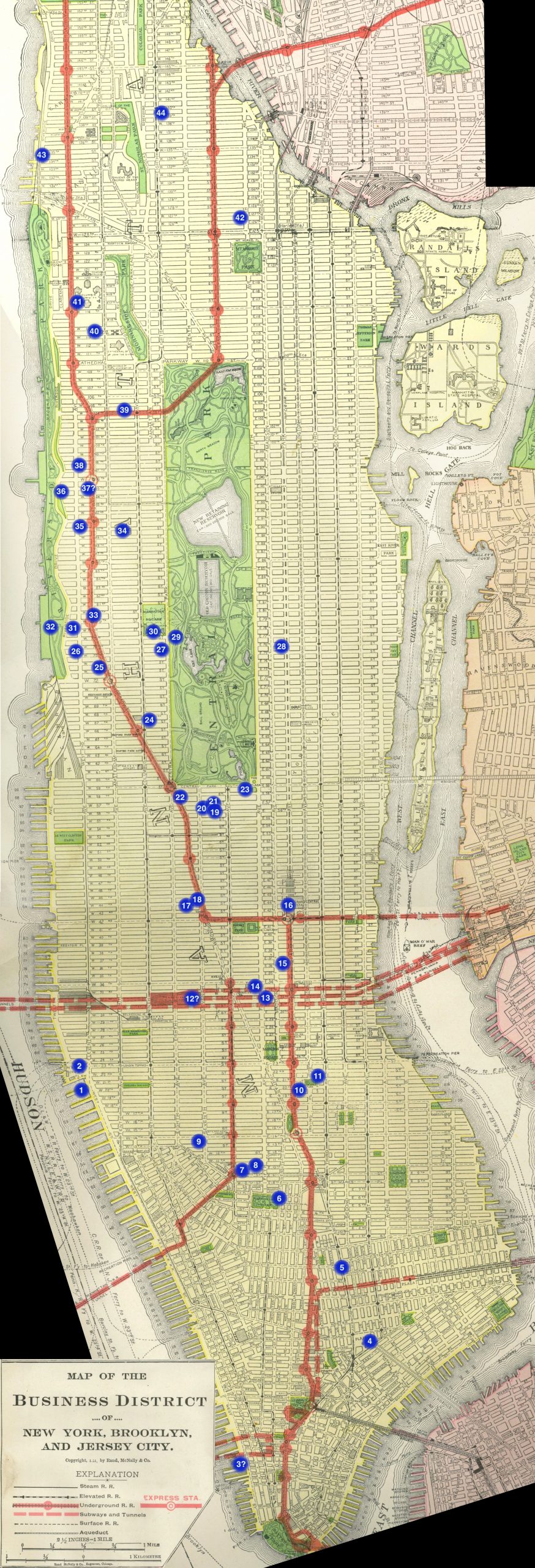
Map of all the sites visited by 'Abdu'l-Bahá in Manhattan. Original graphic by Kurt Asplund. Base map: 1911 Rand McNally map of the Business District of New York, Brooklyn, and Jersey City.
For this section, we are honored to collaborate with Kurt Asplund, who has graciously provided us with free use of his wonderful 2013 article entitled "'Abdu'l-Bahá in Manhattan." To mark the centenary of 'Abdu'l-Bahá's Journey to America, Kurt Asplund identified 44 places in Manhattan visited by 'Abdu'l-Bahá. Each place is beautifully marked by a closeup from Miniature Atlas of the Borough of Manhattan in One Volume : 1912 (NY: E. Belcher Hyde, 1912; 472 pages) which includes details include infrastructure such as bridges, rail lines, transit stations, piers, as well as every skyscraper, building, house, and man-made structure on on Manhattan Island. In this wonderful article, you can see the exact location of the pier dedicated to White Star Lines where 'Abdu'l-Bahá first set foot on American soil, the neighborhood showing the home of Juliet Thompson where so many extraordinary moments took place and in the same map, the Church of the Ascension where 'Abdu'l-Bahá gave His first public address in America, 'Abdu'l-Bahá's Hotel Ansonia, the Bowery Mission and so many places. This article is a time-machine. The maps were printed the year before 'Abdul-Bahá set foot in New York, and the details are so exquisite, they transcend cartography into a work of art. Here is just one example, showing the home of Juliet Thompson and the Church of the Ascension:
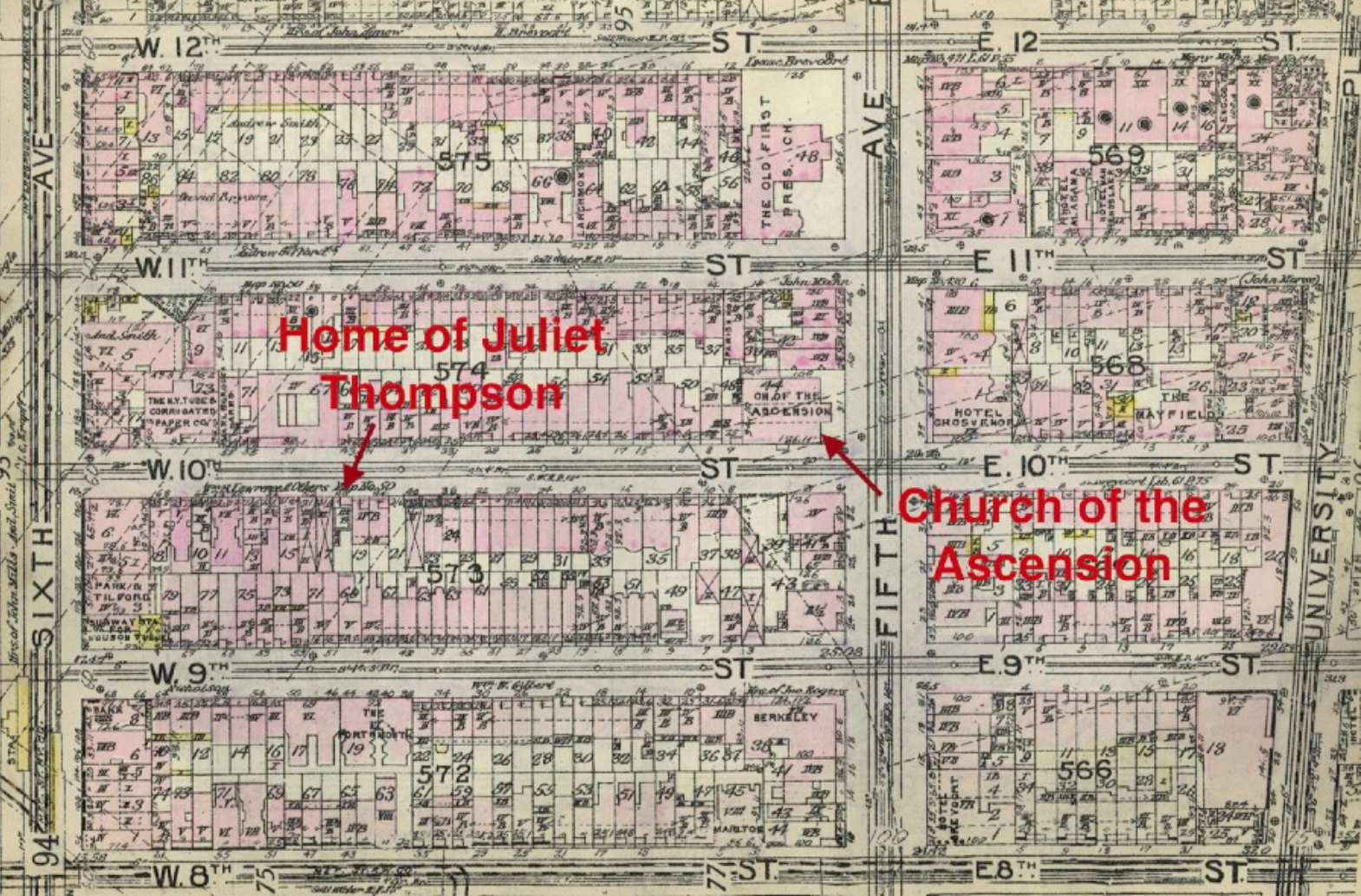
Juliet Thompson's home is at 48 West Tenth Street, (Kahlil Gibran's home is located at 51 West Tenth Street, across the street) and the Church of the Ascension where 'Abdu'l-Bahá gives His first public address in America is located at the corner of Fifth Avenue and West Tenth Street, one block away from Juliet's home. From Kurt Asplund's 'Abdu'l-Bahá in Manhattan.
Please click on the graphic button below to download a copy of the article in PDF format:
'Abdu'l-Bahá, the Servant of God,
and service staff everywhere
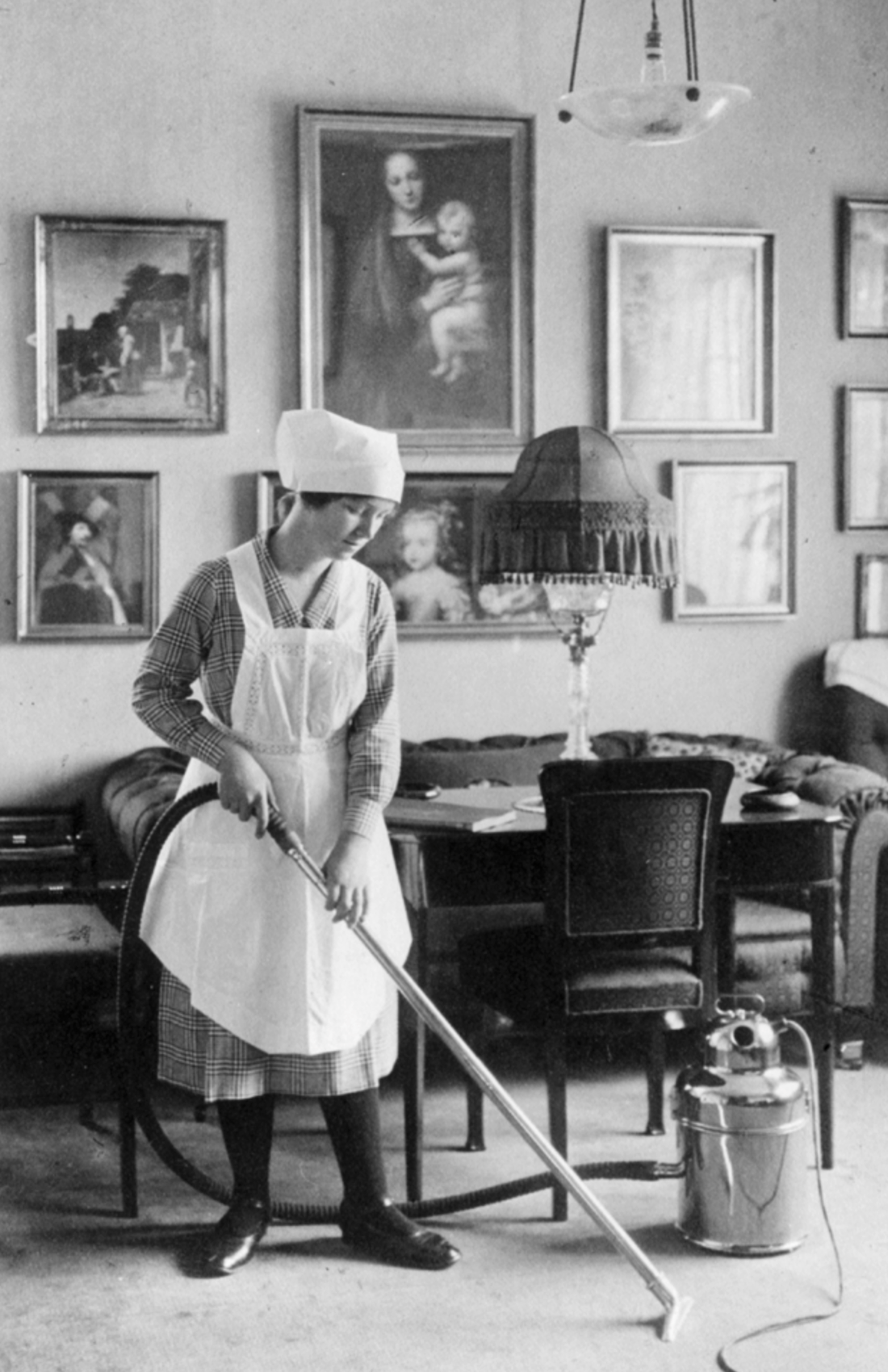
Cleaning maid in Denmark in 1912. Wikimedia Commons.
New York, 15 April 1912: Bahá'ís give 'Abdu'l-Bahá a large bouquet of very beautiful roses. The Master, in turn, gifts the bouquet to a floor maid of the Ansonia Hotel, who walks by a group of Bahá'ís, her arms filled with buds, to whom she exclaims: “See what He gave me! See what He gave me!” 'Abdu'l-Bahá had shown her love, and will continue to show her kindnesses during His stay,
New York, 16 April 1912: 'Abdu'l-Bahá gives Juliet Thompson a bouquet of lilies of the valley, when she leaves His hotel room. As she walks, the same chambermaid stops her and asks: "Did He give you those? He gave me some flowers yesterday. Roses. I think He is a great Saint."
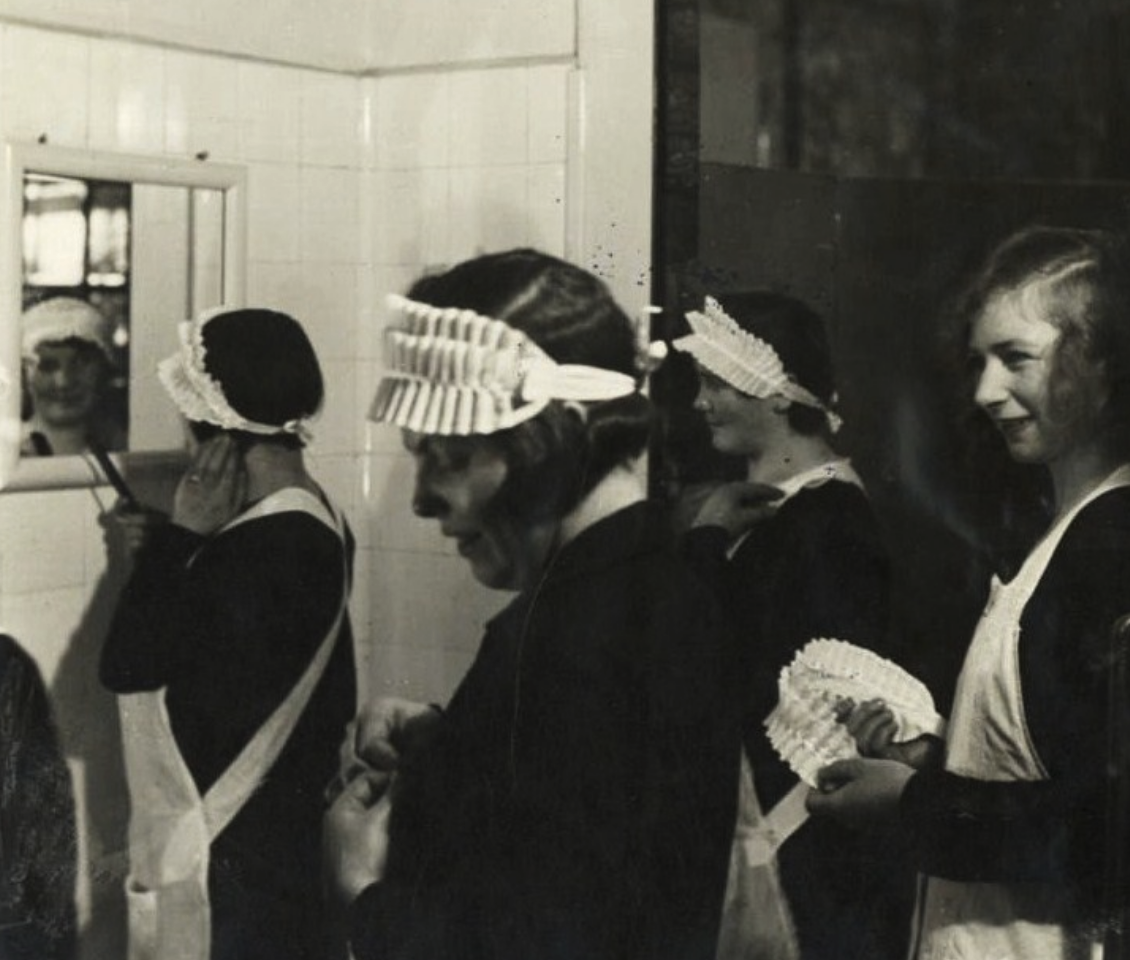
New York hotel maids getting ready for their shift. Art Nouveau and Art Deco Website.
New York, 18 April 1912: On the way back from the Bowery, Juliet Thompson meets the same chambermaid again, on the way to 'Abdu'l-Bahá's suite at the Hotel Ansonia. Juliet has about 80 quarters left in her bag from 'Abdu'l-Bahá's wonderful donations at the Mission. Eighty quarters is $20, which is equivalent in purchasing power to about $560.20 today, 'Abdu'l-Bahá asks the girl to hold up her apron, takes the bag from Juliet and empties its contents into the maid's apron. 'Abdu'l-Bahá then quickly leaves and enters His suite, followed by His entourage, but the maid stops one of them to say "Oh see what He has given me!" This friend, Mr. Grundy, then tells the girl about the Bowery Mission and 'Abdu'l-Bahá's kindness to the men there. The girl then says, "I will do the same with this money. I will give away every cent of it." Back in 'Abdu'l-Bahdá's suite, He and the friends are speaking about the evening at the Bowery Mission and someone asks if charity is advisable. 'Abdu'l-Bahá laughs, and answers, still laughing, "Assuredly, give to the poor. If you give them only words, when they put their hands into their pockets after you have gone, they will find themselves none the richer for you!" At that exact moment, there is a light tap on the door, and the maid enters. She walks right up to 'Abdu'l-Bahá, her eyes full of tears, not even seeing anyone else and says: "I wanted to say goodbye, Sir, and to thank You for all Your goodness to me–I never expected such goodness–and to ask You ... to pray for me." Her voice breaks, she sobs, hides her face in her apron and rushes out of the room.
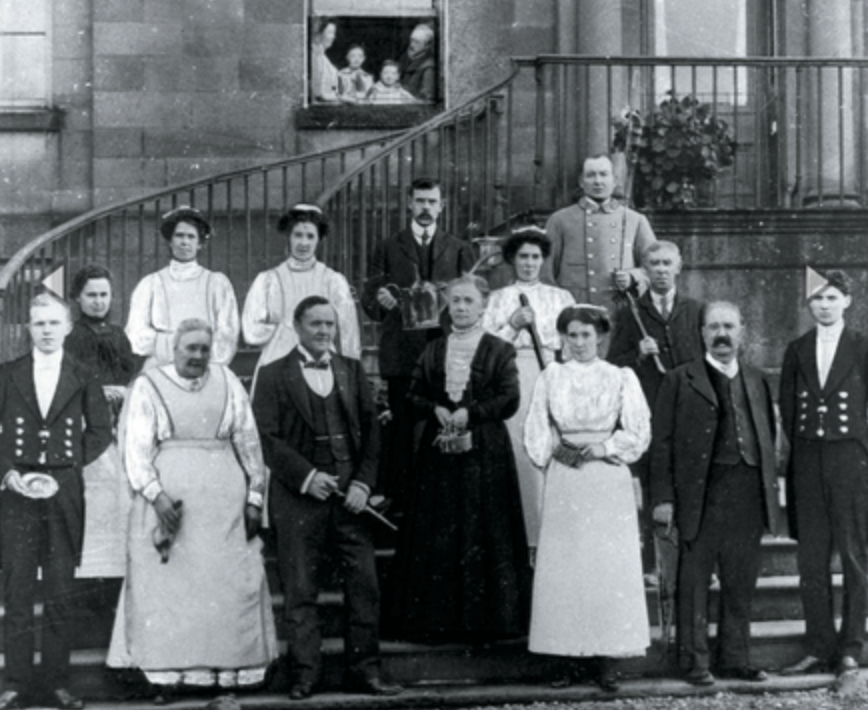
1912 Serving Staff at Erddig near the market town of Wrexham (pictured below left), the serving staff photographed in 1912 included gardeners, housemaids, footmen, butler, cook, laundress, housekeeper and the estate foreman. British Heritage Website.
Montreal, 1 September 1912: ‘Abdu’l-Baha knows how to give. And 'Abdu'l-Bahá has a fascinating relationship with money, The way 'Abdu'l-Bahá uses money and spends money can teach us how to live our lives if we watch closely enough. 'Abdu'l-Bahá stays at the Maxwell home in Montreal for two nights when He arrives, then He moves to a hotel. Shortly after moving to the hotel, 'Abdu'l-Bahá is due back at the Maxwells' for a meeting. The friends suggest calling a carriage, but 'Abdu'l-Bahá takes a streetcar instead, saying “Oh, it matters little. It saves expenses. There is a difference of one dollar in the fare.” Arriving at the Maxwells, the Master gives one pound (more than the carriage would have cost) to each of the household staff.
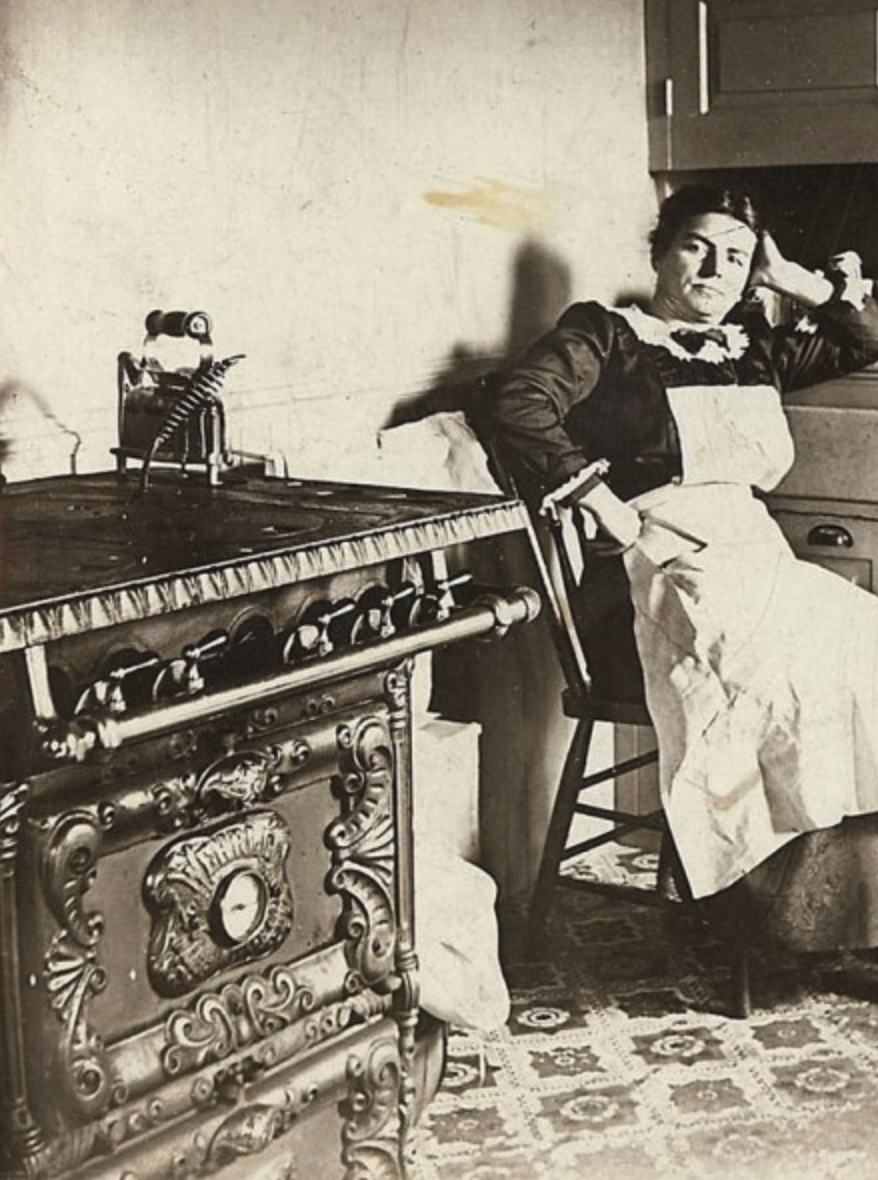
Victorian-era cook in Paris. Victorian Paris Website.
Buffalo, 12 September 1912: 'Abdu'l-Bahá called all his secretaries and attendants before dawn, as He is already packed and ready. They prepare their belongings, and ready for departure. Before leaving, 'Abdu'l-Bahá makes sure to leave a dollar tip for His chambermaid with the hotel manager, because she was not there for Him to give it to her in person. That level of attention to detail, empathy, sensitivity to others, care and awareness for every single person around Him is what puts 'Abdu'l-Bahá in a category of one.
Glenwood Springs, 26 September 1912: ‘After a stroll in the town, Abdu’l-Bahá returns to the hotel and says how nice it would be to eat in the gardens. The hotel manager, recognizes ‘Abdu’l-Bahá from the Denver newspapers, and immediately brings out a large table and five chairs. The party accompanying 'Abdu'l-Bahá is composed of four Persians and Fujita, His Japanese attendant. When ‘Abdu’l-Bahá asks the waiter why there are only five chairs, he replies 'Well, he is your servant.’ ‘Abdu’l-Bahá responds, ‘That doesn’t matter. Make another place. It doesn’t make any difference whether servant, or different colour. We are all one. He would sit there, and Fujita come here.’
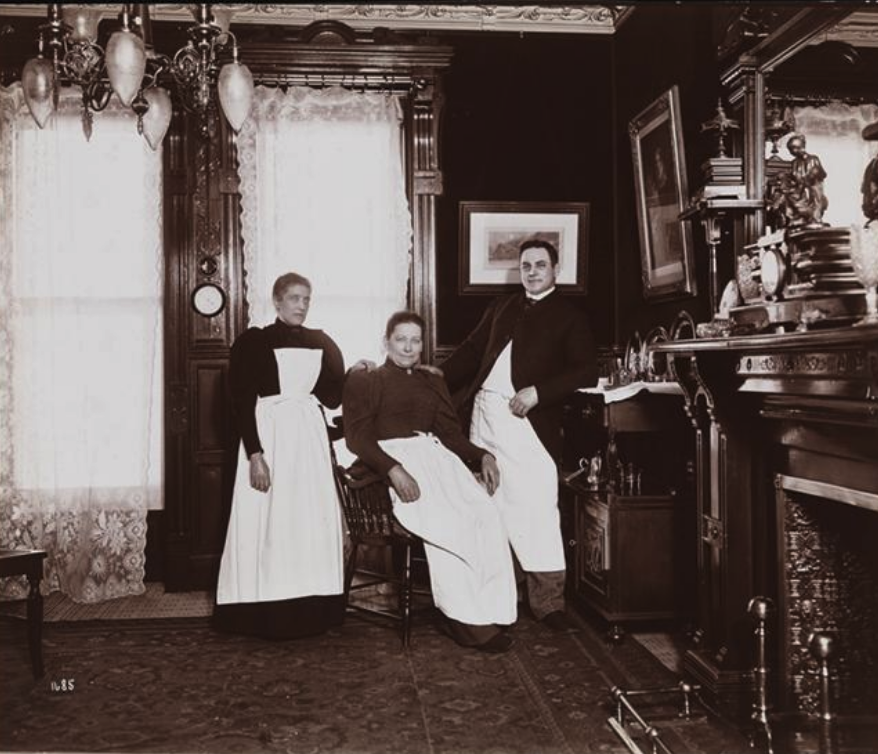
New York Servants,late 19th-early 20th century. Ephemeral New York Website.
San Francisco, 1 October 1912: Mírzá Mahmúd-i-Zarqání (the chronicler of Mahmúd's Diary) remembers that during the Journey to America, every morning, after His morning devotions, 'Abdu'l-Bahá calls in all His attendants and serves them tea Himself and tells them stories that illustrate divine blessings and gratitude for Divine confirmations.
Pleasanton, 16 October 1912: Leaving the home of Mrs. Phoebe Hearst, The Master calls in all of the house staff. The maids, orderlies, cooks and butler stand in a line before Him, and 'Abdu'l-Bahá encourages them to be truthful, honest and devoted to their work. Thanking them for their services, He says: "As I am like a father to you, I wish to leave a memento with you." He gives each staff member two guineas ($10 in today's currency) and leaves. Mrs. Phoebe Hearst had other eminent guests staying in Pleasanton at the time, and they were humbled and impressed with 'Abdu'l-Bahá's generosity and His majesty.
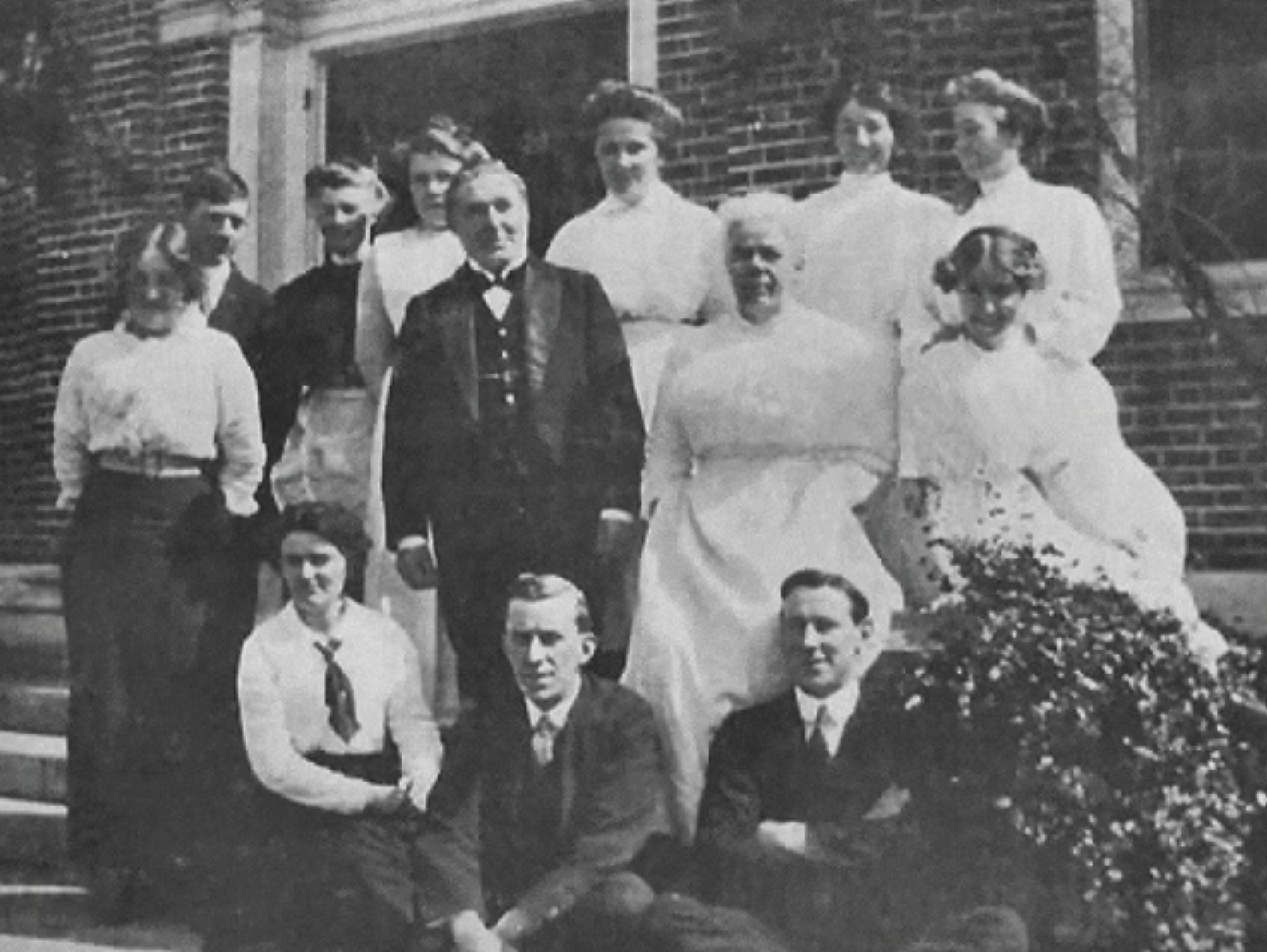
Domestic Workers in the United States in 1914. Wikimedia Commons.
Sacramento, 26 October 1912: On the day of His departure from Sacramento, and before addressing a large audience at the hotel, 'Abdu’l-Bahá nonetheless takes time to speak with three chambermaids, anointing them with violet water and giving them fruit
Edinburgh, 10 January 1913: As they were about to leave the home of Jane and Alexander Whyte, where He has spent 4 days, 'Abdu'l-Bahá asks to see the maids. When they are all gathered, He says, "For the last few days you have served me. I am very pleased with you. I will never forget you. I will pray for you that you may become confirmed and assisted and that your heads be crowned with the diadems of eternal glory." He then gives one guinea to each maid, ($5 in today's currency) and they are so overwhelmed, they all have tears in their eyes.
'Abdu'l-Bahá says farewell to America
The last few days of 'Abdu'l-Bahá's Journey to America are filled with tearful goodbyes from the American Bahá'ís, utterly heartbroken and devastated at His departure. So potent are the effects of His visit to America, that the threads 'Abdu'l-Bahá weaves, as Allan Ward brilliantly summarizes, can be followed through the fabric of the World Order for the whole of a Dispensation. It is so essential to understand that 'Abdu'l-Bahá had a very clear plan when coming on His Journeys to the West, a spiritual agenda of the greatest importance, that we have collected here every farewell address of 'Abdu'l-Bahá. This section is necessarily lengthy, but must be read meditatively, so that the profound weight and implications of 'Abdu'l-Bahá's words can sink into our hearts and have an effect on our consciousness and our soul.
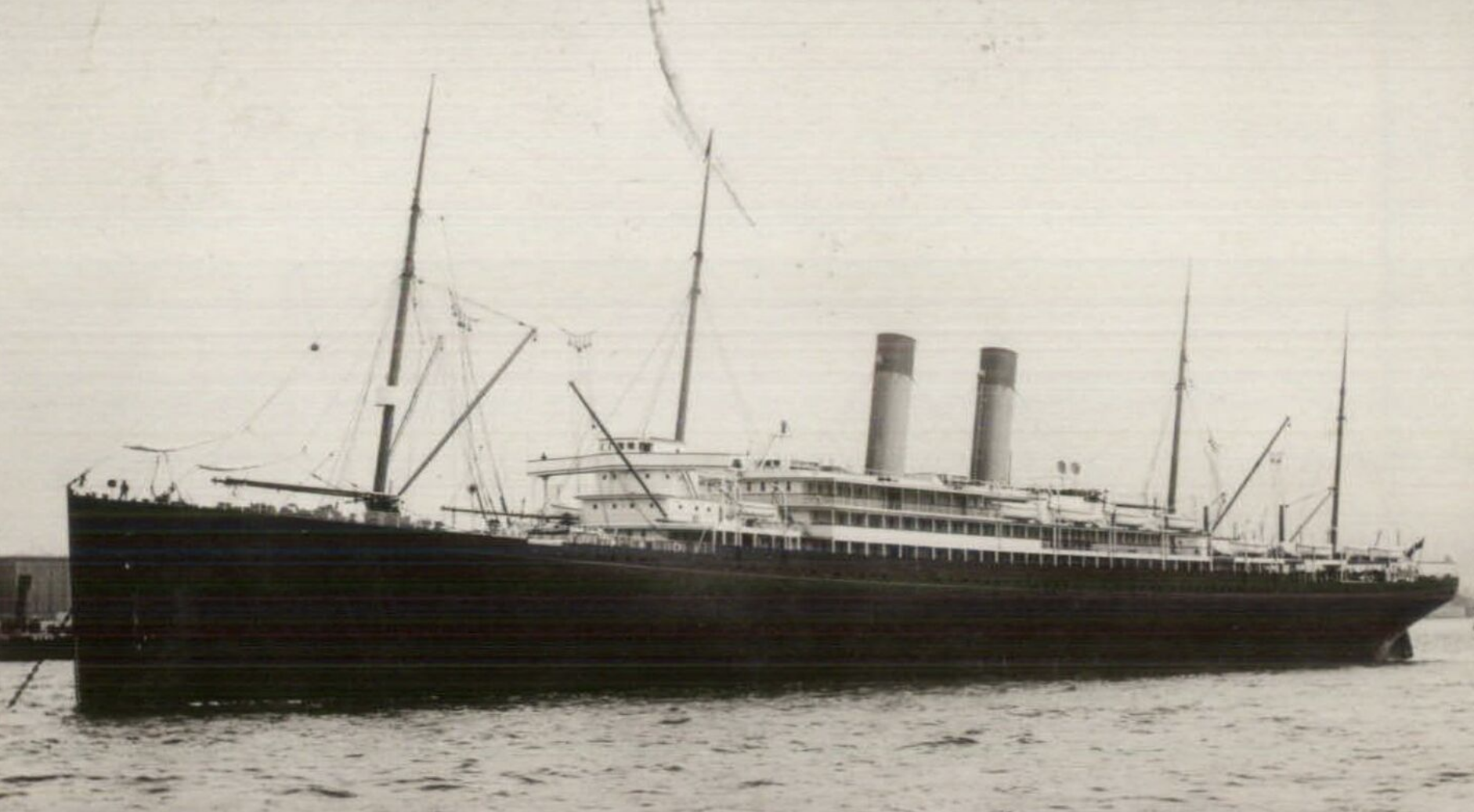
The White Star Lines' ship the Celtic, which 'Abdu'l-Bahá sails on from New York to Liverpool between December 5 and December 13, 1912.
December 2, 1912
I have stayed a long time with you in New York. My stay in other towns has not been a tenth as long. I have met with you day and night, individually and collectively; conveyed to you the admonitions of Bahá'u'lláh; delivered to you the heavenly glad tidings; and explained the means of human progress. I have elucidated the harmful effects of prejudices and imitations and the impurity of selfish desires, expounded the teachings of Bahá'u'lláh and clarified the meanings of the divine proofs and questions.
Mahmúd-i-Zarqání, Mírzá. Mahmúd’s Diary Chronicling ʻAbdu’l-Bahá’s Journey to America
You must manifest complete love and affection toward all mankind. Do not exalt yourselves above others, but consider all as your equals, recognizing them as the servants of one God. Know that God is compassionate toward all; therefore, love all from the depths of your hearts, prefer all religionists before yourselves, be filled with love for every race, and be kind toward the people of all nationalities. Never speak disparagingly of others, but praise without distinction. Pollute not your tongues by speaking evil of another. Recognize your enemies as friends, and consider those who wish you evil as the wishers of good. You must not see evil as evil and then compromise with your opinion, for to treat in a smooth, kindly way one whom you consider evil or an enemy is hypocrisy, and this is not worthy or allowable. You must consider your enemies as your friends, look upon your evil-wishers as your well-wishers and treat them accordingly. Act in such a way that your heart may be free from hatred. Let not your heart be offended with anyone. If someone commits an error and wrong toward you, you must instantly forgive him. Do not complain of others. Refrain from reprimanding them, and if you wish to give admonition or advice, let it be offered in such a way that it will not burden the hearer. Turn all your thoughts toward bringing joy to hearts. Beware! Beware! lest ye offend any heart. Assist the world of humanity as much as possible. Be the source of consolation to every sad one, assist every weak one, be helpful to every indigent one, care for every sick one, be the cause of glorification to every lowly one, and shelter those who are overshadowed by fear. In brief, let each one of you be as a lamp shining forth with the light of the virtues of the world of humanity. Be trustworthy, sincere, affectionate and replete with chastity. Be illumined, be spiritual, be divine, be glorious, be quickened of God, be a Bahá’í.
'Abdu'l-Bahá, The Promulgation of Universal Peace
We have sown some seeds and hope that the sun of favor will shine upon them, the rain of mercy will pour down, and the breezes of generosity will waft over them, because America has receptivity.
Mahmúd-i-Zarqání, Mírzá. Mahmúd’s Diary Chronicling ʻAbdu’l-Bahá’s Journey to America
My purpose is to explain to you that it is your duty to guard the religion of God so that none shall be able to assail it outwardly or inwardly. If you find harmful teachings are being set forth by some individual, no matter who that individual be, even though he should be my own son, know, verily, that I am completely severed from him. If anyone speaks against the Covenant, even though he should be my son, know that I am opposed to him. Those who speak falsehoods, who covet worldly things and seek to accumulate the riches of this earth are not of me. But when you find a person living up to the teachings of Bahá’u’lláh, following the precepts of the Hidden Words, know that he belongs to Bahá’u’lláh; and, verily, I proclaim that he is of me. If, on the other hand, you see anyone whose deeds and conduct are contrary to and not in conformity with the good pleasure of the Blessed Perfection and against the spirit of the Hidden Words, let that be your standard and criterion of judgment against him, for know that I am altogether severed from him no matter who he may be. This is the truth.
'Abdu'l-Bahá, The Promulgation of Universal Peace
I supplicate and implore that the clouds of mercy may shower upon you and the Sun of Truth may shine upon you so that you may attain to the purpose of the holy Manifestations of God. This is my supplication because you are the beloved ones of the Blessed Beauty and the servants of the Greatest Name. I undertook this voyage in order to see you and, God willing, you will come to the Holy Land and we shall meet there in that land which was trodden by the sacred feet of the Prophets of God.
Mahmúd-i-Zarqání, Mírzá. Mahmúd’s Diary Chronicling ʻAbdu’l-Bahá’s Journey to America
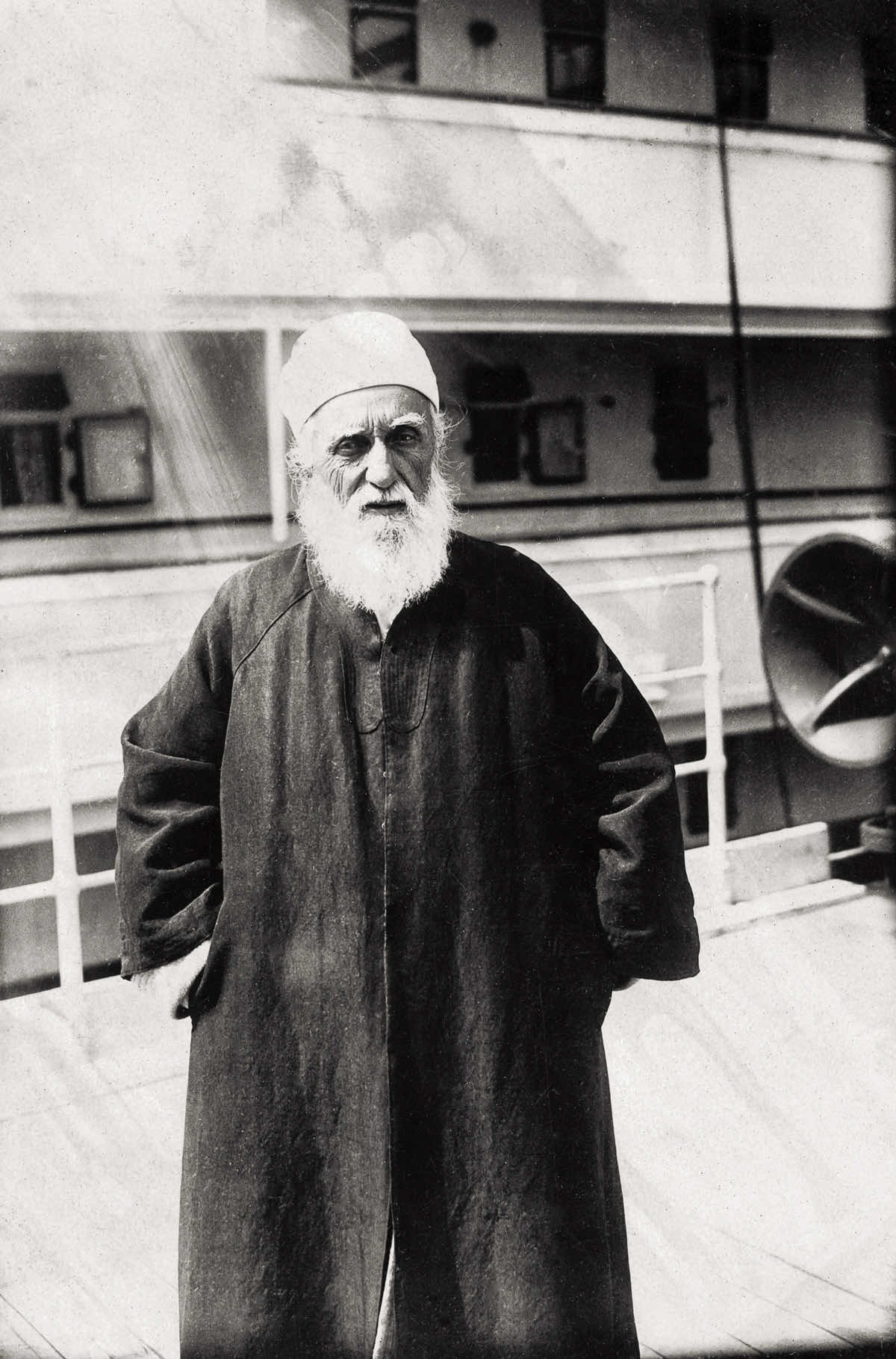
‘Abdu’l-Bahá on the pier before boarding the Celtic. national Bahá'í Archives of the United States.
December 3, 1912
It is my hope that this gathering may increase in number day by day; that you may become more and more attracted, more spiritual, more illumined, acquire knowledge of the teachings of Bahá’u’lláh from each other and be able to spread the message of truth. May your hearts become so attracted that the instant a question is asked, you will be able to give the right answer and that the truth of the Holy Spirit may speak through your tongues. Be ye helpful through the providence and favor of the Blessed Perfection, for His favors change a drop into an ocean, cause a seed to become a tree and make an atom as glorious as the sun. His graces are boundless. The treasure houses of God are filled with bounties. God, Who hath shown favors unto others, will certainly bestow favors upon you. I offer supplication to the Kingdom of Abhá and seek extraordinary blessings and confirmations in your behalf in order that your tongues may become fluent, your hearts like clear mirrors flooded with the rays of the Sun of Truth, your thoughts expanded, your comprehension more vivid and that you may progress in the plane of human perfections.
'Abdu'l-Bahá, The Promulgation of Universal Peace
I have attended more meetings in New York than in all the other cities combined. Day and night, individually and collectively you have listened to the teachings and exhortations of Bahá’u’lláh. I have proclaimed unto you the glad tidings of the Kingdom of God and explained the wishes of the Blessed Perfection. I have set forth that which is conducive to human progress and shown you the humility of servitude. The teachings of Bahá’u’lláh have been clearly interpreted. The time has now come when I must leave you; therefore, this will be our farewell meeting.
I am greatly pleased with you all and rejoice that you have shown me the utmost kindness and affection. It is my desire that Bahá’u’lláh shall be pleased with you, that you may follow His precepts and become worthy of His confirmations. The requirements are that your minds must be illumined, your souls must be rejoiced with the glad tidings of God, you must become imbued with spiritual moralities, your daily life must evidence faith and assurance, your hearts must be sanctified and pure, reflecting a high degree of love and attraction toward the Kingdom of Abhá. You must become the lamps of Bahá’u’lláh so that you may shine with eternal light and be the proofs and evidences of His truth. Then will such signs of purity and chastity be witnessed in your deeds and actions that men will behold the heavenly radiance of your lives and say, “Verily, ye are the proofs of Bahá’u’lláh. Verily, Bahá’u’lláh is the True One, for He has trained such souls as these, each one of which is a proof in himself.” They will say to others, “Come and witness the conduct of these souls; come and listen to their words, behold the illumination of their hearts, see the evidences of the love of God in them, consider their praiseworthy morals, and discover the foundations of the oneness of humanity firmly implanted within them. What greater proof can there be than these people that the message of Bahá’u’lláh is truth and reality?” It is my hope that each one of you shall be a herald of God, proclaiming the evidences of His appearance, in words, deeds and thoughts. Let your actions and utterances be a witness that you are of the Kingdom of Bahá’u’lláh. These are the duties enjoined upon you by Bahá’u’lláh.
'Abdu'l-Bahá, The Promulgation of Universal Peace
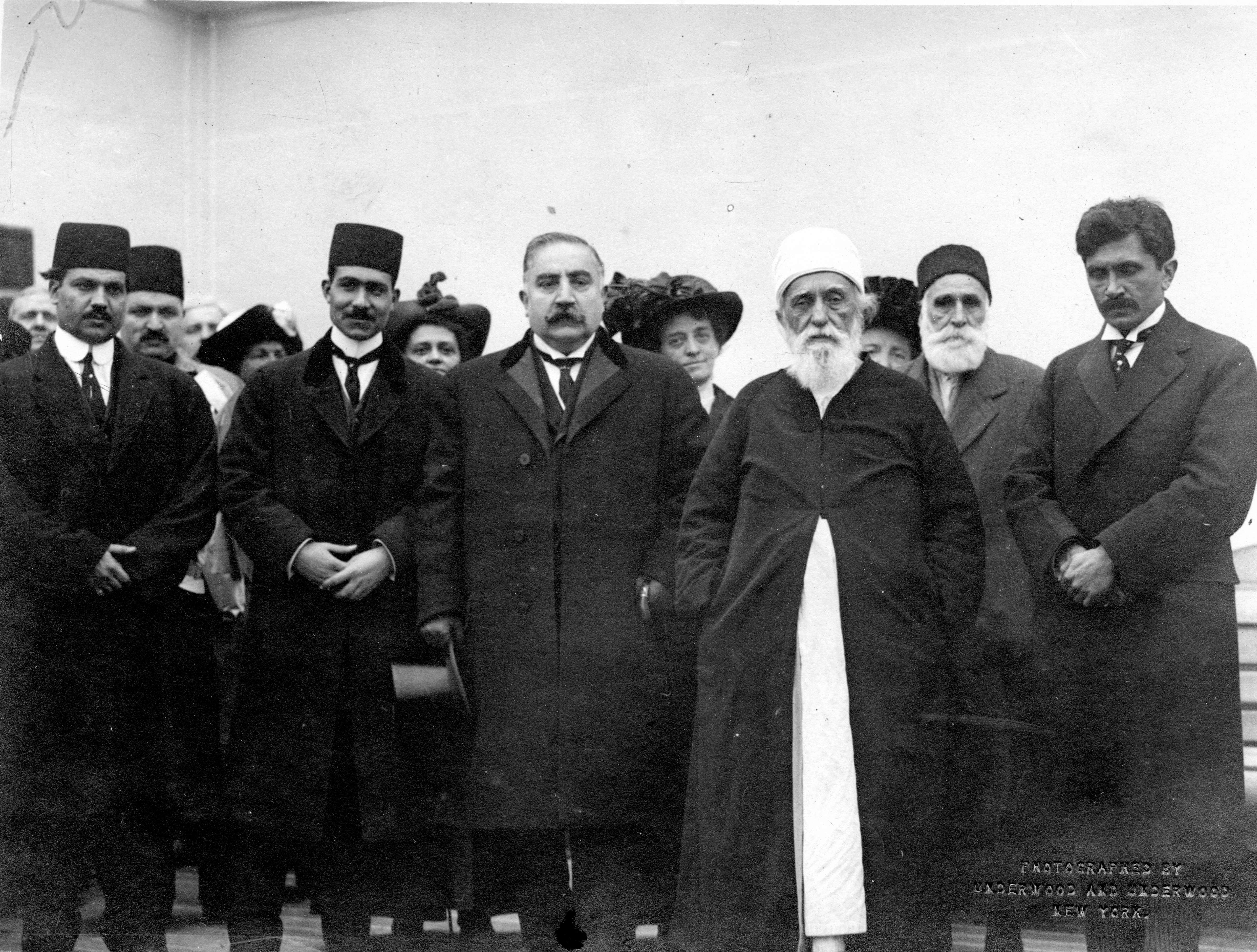
'Abdu'l-Bahá arriving in America, still aboard the Cedric on April 11, 1912 with the Turkish ambassador to His right. Also present are Alik Kuli-Khan, Zia Baghdadi, Fanny Knobloch and Pauline Hammen. Courtesy of the United States National Bahá'í Archives.
December 4, 1912
I have been in America nine months and have traveled to all the large cities, speaking before various assemblages, proclaiming to them the oneness of the world of humanity, summoning all to union, harmony and oneness. I have indeed received the greatest kindness from the American people. I look upon them as a noble nation, capable of every perfection. Tomorrow I am going away to Europe, and now I bid farewell to you all, seeking for you the divine mercy, the eternal glory and everlasting life; and I pray that you may attain the highest station of humanity. I am greatly pleased with this meeting. My happiness is great. I shall never forget you. You shall always live in my thought. I shall always pray and supplicate before the Kingdom of God and seek heavenly blessings for you.
'Abdu'l-Bahá, The Promulgation of Universal Peace
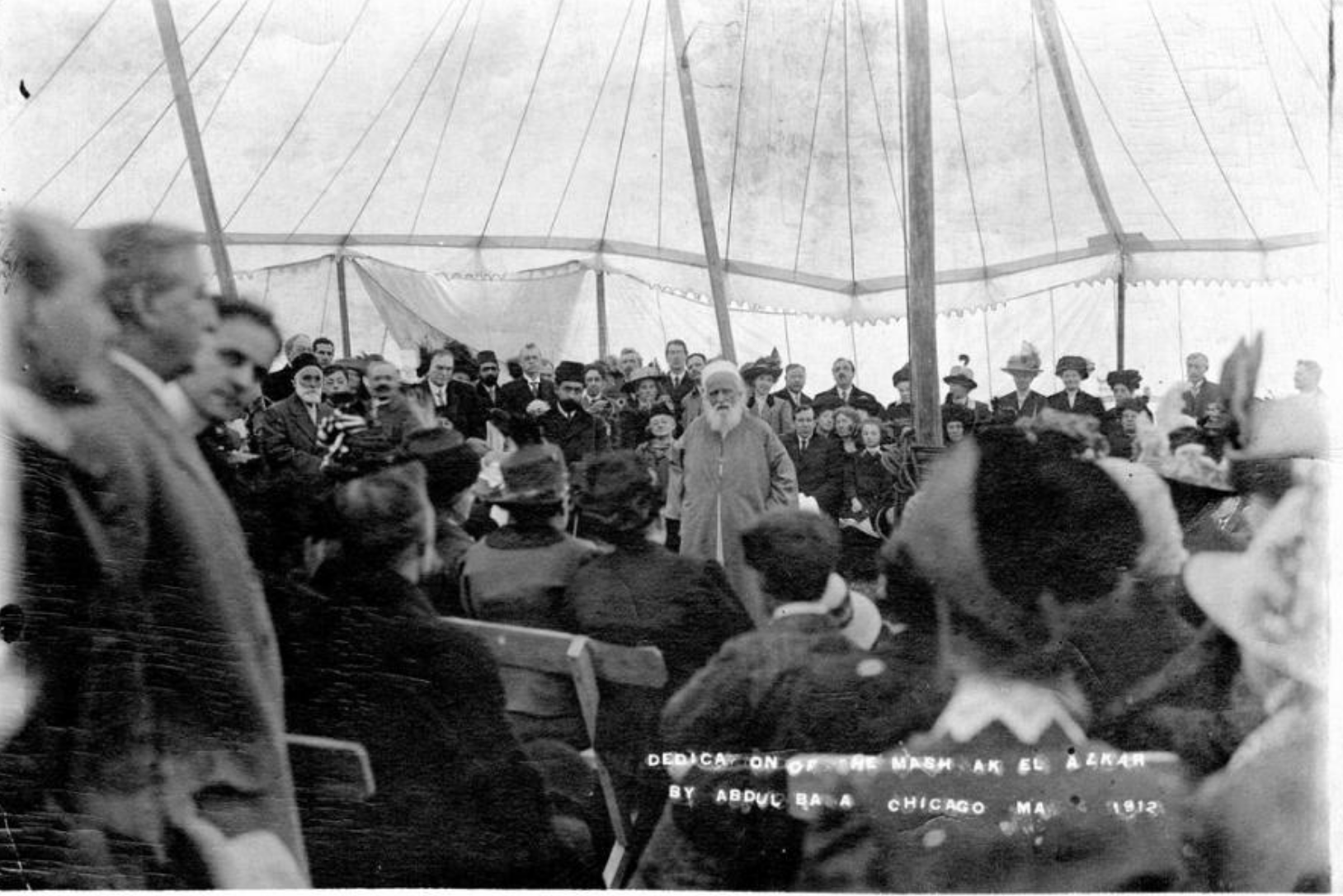
'Abdu'l-Bahá in the tent before the dedication of the House of Worship for North America, in Wilmette, Illinois on May 1, 1912. This is another of the key moments of His visit to America. 'Abdu'l-Bahá in America 1912-2012.
December 5, 1912
This is my last meeting with you, for now I am on the ship ready to sail away. These are my final words of exhortation. I have repeatedly summoned you to the cause of the unity of the world of humanity, announcing that all mankind are the servants of the same God, that God is the creator of all; He is the Provider and Life-giver; all are equally beloved by Him and are His servants upon whom His mercy and compassion descend. Therefore, you must manifest the greatest kindness and love toward the nations of the world, setting aside fanaticism, abandoning religious, national and racial prejudice.
The earth is one native land, one home; and all mankind are the children of one Father. God has created them, and they are the recipients of His compassion. Therefore, if anyone offends another, he offends God. It is the wish of our heavenly Father that every heart should rejoice and be filled with happiness, that we should live together in felicity and joy. The obstacle to human happiness is racial or religious prejudice, the competitive struggle for existence and inhumanity toward each other.
Your eyes have been illumined, your ears are attentive, your hearts knowing. You must be free from prejudice and fanaticism, beholding no differences between the races and religions. You must look to God, for He is the real Shepherd, and all humanity are His sheep. He loves them and loves them equally. As this is true, should the sheep quarrel among themselves? They should manifest gratitude and thankfulness to God, and the best way to thank God is to love one another.
Beware lest ye offend any heart, lest ye speak against anyone in his absence, lest ye estrange yourselves from the servants of God. You must consider all His servants as your own family and relations. Direct your whole effort toward the happiness of those who are despondent, bestow food upon the hungry, clothe the needy, and glorify the humble. Be a helper to every helpless one, and manifest kindness to your fellow creatures in order that ye may attain the good pleasure of God. This is conducive to the illumination of the world of humanity and eternal felicity for yourselves. I seek from God everlasting glory in your behalf; therefore, this is my prayer and exhortation.
(...) As to you: Your efforts must be lofty. Exert yourselves with heart and soul so that, perchance, through your efforts the light of universal peace may shine and this darkness of estrangement and enmity may be dispelled from amongst men, that all men may become as one family and consort together in love and kindness, that the East may assist the West and the West give help to the East, for all are the inhabitants of one planet, the people of one original native land and the flocks of one Shepherd.
(...) Your duty is of another kind, for you are informed of the mysteries of God. Your eyes are illumined; your ears are quickened with hearing. You must, therefore, look toward each other and then toward mankind with the utmost love and kindness. You have no excuse to bring before God if you fail to live according to His command, for you are informed of that which constitutes the good pleasure of God. You have heard His commandments and precepts. You must, therefore, be kind to all men; you must even treat your enemies as your friends. You must consider your evil-wishers as your well-wishers. Those who are not agreeable toward you must be regarded as those who are congenial and pleasant so that, perchance, this darkness of disagreement and conflict may disappear from amongst men and the light of the divine may shine forth, so that the Orient may be illumined and the Occident filled with fragrance, nay, so that the East and West may embrace each other in love and deal with one another in sympathy and affection. Until man reaches this high station, the world of humanity shall not find rest, and eternal felicity shall not be attained. But if man lives up to these divine commandments, this world of earth shall be transformed into the world of heaven, and this material sphere shall be converted into a paradise of glory. It is my hope that you may become successful in this high calling so that like brilliant lamps you may cast light upon the world of humanity and quicken and stir the body of existence like unto a spirit of life. This is eternal glory. This is everlasting felicity. This is immortal life. This is heavenly attainment. This is being created in the image and likeness of God. And unto this I call you, praying to God to strengthen and bless you.
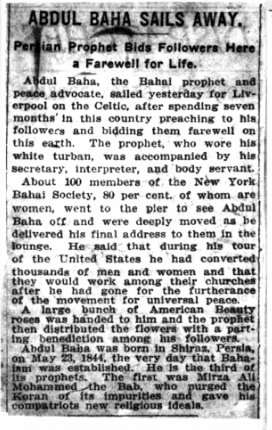
New York City Times, December 9, 1912. 'Abdu'l-Bahá in America.
In God Passes By, Shoghi Effendi mentions the eminent personalities 'Abdu'l-Bahá encounters in His Journey to America. Those for whom pictures were found online are included in the photo-montage below, and more information on them can be found by clicking on their name (the list below contains a large number of additional names than those listed in God Passes By, some from our own research and many more from contributions by eminent Bahá'í historians of 'Abdu'l-Bahá's visit to America, and they have our humble gratitude for their very valuable additions. Nobel Prize Winners have a gold border around their photographs.
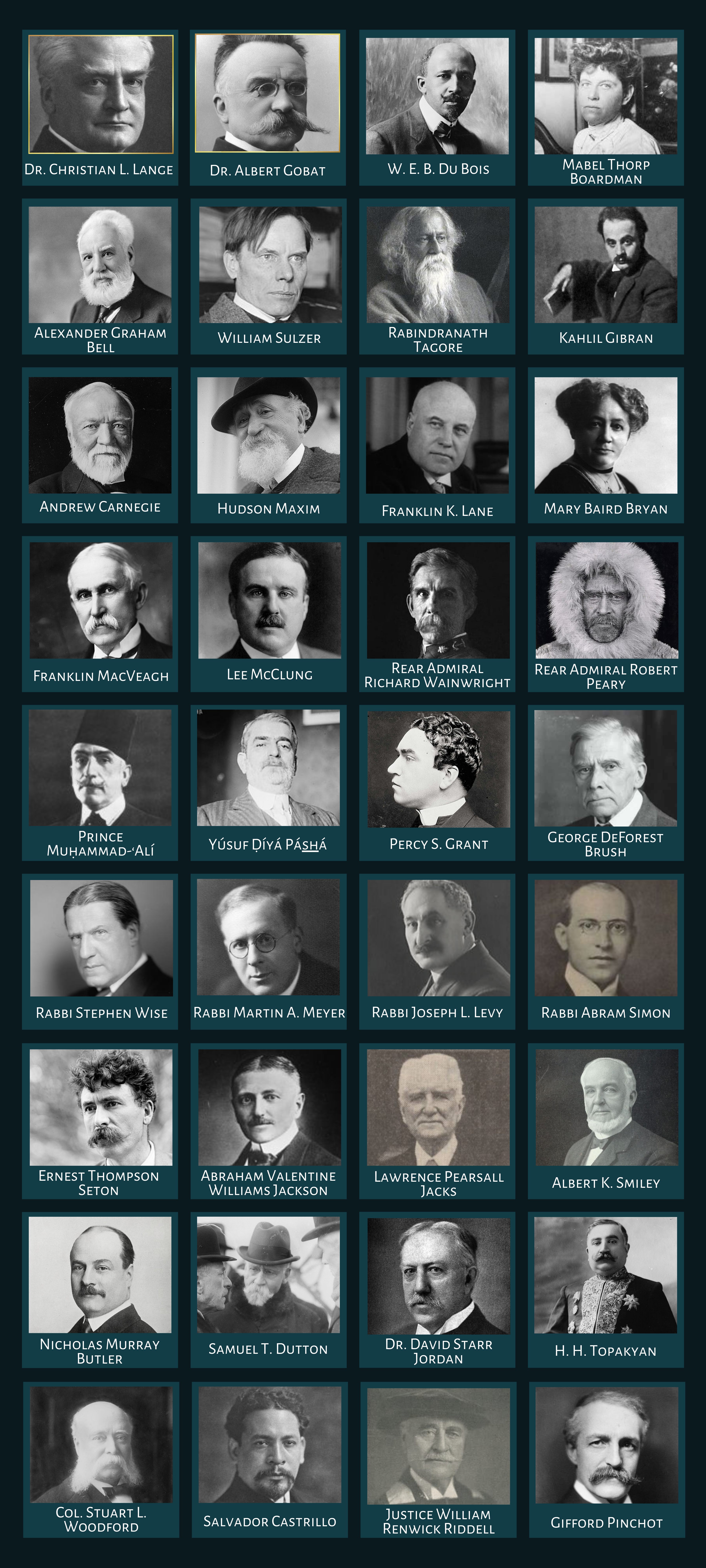
Dr. Christian L. Lange, Secretary of the Inter-parliamentary union 1921 Nobel Peace Prize;
Dr. Albert Gobat, Director of the International peace bureau 1902 Nobel Peace Prize;
W.E.B. DuBois, American sociologist, socialist, historian, civil rights activist, Pan-Africanist, author, writer and editor (article: W.E.B. DuBois and the Bahá'í Faith), Mabel Thorp Boardman, National Secretary of the American Red Cross;
Alexander Graham Bell, Scottish-born inventor, scientist, and engineer credited with inventing and patenting the first practical telephone; the Honourable William Sulzer, future Governor of New York;
Rabindranath Tagore, a Bengali polymath – poet, writer, playwright, composer, philosopher, social reformer and painter;
Kahlil Gibran, a Lebanese-American writer, poet and visual artist;
Hudson Maxim an American inventor and chemist who invented a variety of explosives, including smokeless gunpowder;
Hon. Franklin K. Lane, a member of the Democratic Party, he served as United States Secretary of the Interior and commissioner of the Interstate Commerce Commission;
Mary Baird Bryan (referred to in God Passes By as "Mrs. William Jennings Bryan"), an American writer and suffragette;
Andrew Carnegie, a Scottish-American industrialist and philanthropist, he led the expansion of the American steel industry and became one of the richest Americans in history;
Hon. Franklin MacVeagh, an American politician, lawyer, grocer and banker, he served as the United States Secretary of the Treasury;
Lee McClung, United States Secretary of the Treasury;
Rear Admiral Richard Wainwright, an officer in the United States Navy during the Spanish–American War;
Rear Admiral Robert Peary, an American explorer and United States Naval officer best known for claiming to have reached the geographic North Pole;
Yúsuf Ḍíyá Páshá, the Turkish Ambassador;
Percy Stickney Grant, the love of Juliet Thompson and pastor of the Church of the Ascension where 'Abdu'l-Bahá gave His first public talk in America;
Prince Muḥammad-‘Alí of Egypt, the Khedive’s brother; Percy Grant, the love of Juliet Thompson and pastor of the Church of the Ascension where 'Abdu'l-Bahá gave His first public talk in America;
George DeForest Brush, a famous American painter who became a Bahá'í late in life;
Rabbi Stephen Wise of New York;
Rabbi Martin A. Meyer of Temple Emmanu-El in San Francisco;
Rabbi Joseph L. Levy of Pittsburgh; and Rabbi Abram Simon of Washington, D.C.;
Ernest Thompson Seton, author, wildlife artist, founder of the Woodcraft Indians, and one of the founding pioneers of the Boy Scouts of America;
Professor Abraham Valentine Williams Jackson of Columbia University, an American specialist on Indo-European languages, and professor of Indo-Iranian languages at Columbia University;
Professor Lawrence Pearsall Jacks, an English educator, philosopher, and Unitarian minister and Principal of Manchester College, in Oxford; Justice William R. Biddle of the Ontario High Court of Justice;
Albert K. Smiley, founder of Lake Mohonk Conference on International Arbitration;
Nicholas Murray Butler, 12th President of Columbia University; Samuel T. Dutton, Superintendent of schools, Columbia University and founder of the New York Peace Society;
Dr. David Starr Jordan of Leland Stanford University;
Hayozoun Hohannes Topakyan, the Persian Consul;
Col. Stuart L. Woodford, member of the United States House of Representatives and Lieutenant Governor of New York;
Salvador Castrillo, Minister of Nicaragua, Architect of Knox-Castrillo Treaty (1911) and Member of the Nicaragua/Honduras Border Commission (no information found);
Justice William Renwick Riddell, Justice of the Supreme Court of Ontario;
Reverend Jenkin Lloyd Jones, who hosted ‘Abdu’l-Bahá at the Abraham Lincoln Center in Chicago,
Gifford Pinchot, an American forester and politician who served as Chief of the U.S. Division of Forestry, as the first head of the United States Forest Service, and as Governor of Pennsylvania;
Dr. Otfried Niepold; of Germany, professor of International Law in Berne University (no photo found);
J.P. Santamarina, an Argentinian politician (no photo found); William C. Denis of Washington (no information or photo found);
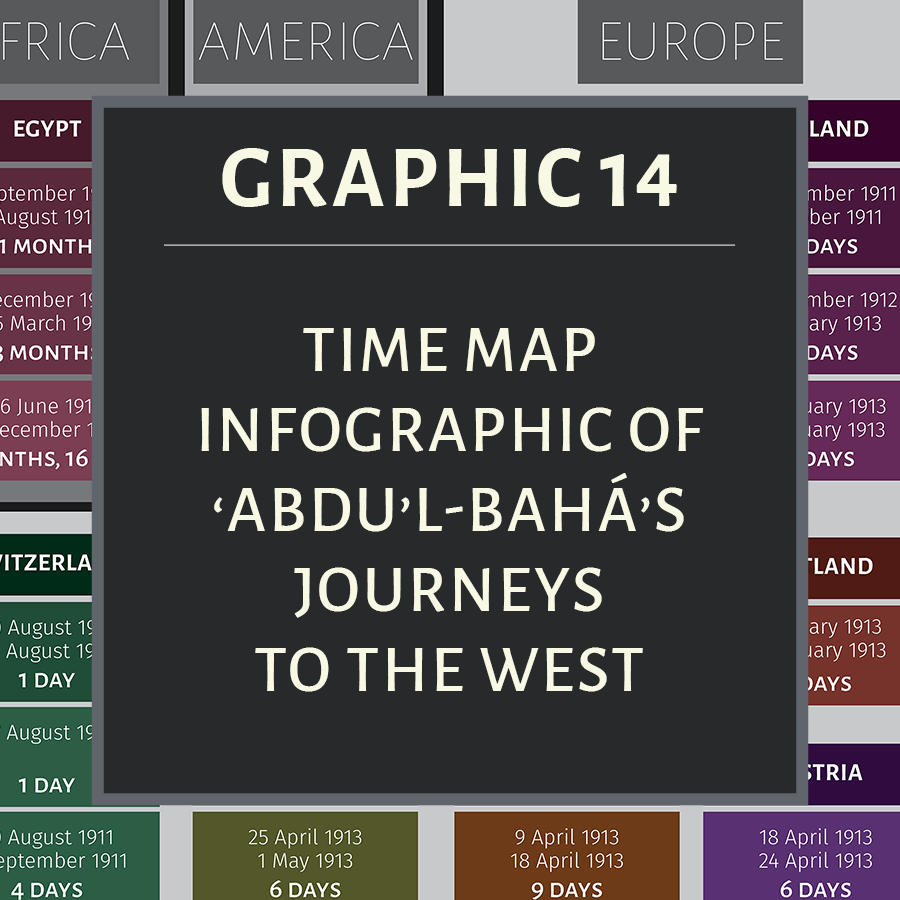
Time map infographic of each stay by ‘Abdu’l-Bahá in the ten countries ‘Abdu’l-Bahá visited during His Journeys to the West. Each stay is indicated by dates which correspond to the Timeline of His Journeys and have been gleaned over several months from Tablets, letters from the House of Justice, books, articles, pilgrim notes, footnotes, passing mentions and chronologies too numerous to cite or mention. This website was used in calculating duration between dates. A map of the total amount of time spent by ‘Abdu’l-Bahá in each country is available here. Original graphic by Violetta Zein.
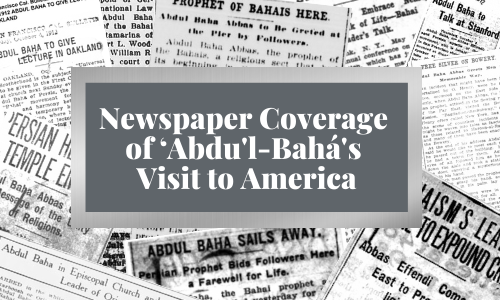
I would like to thank the United States National Bahá’í Archives for graciously providing the majority of the newspaper articles used in the slideshow. I could never have done this without them. I would also like to thank Steven Kolins, Duane Troxel, and Daniel Hermann for clipping upwards of 50,000 newspaper articles relating to the Bahá’í Faith and to ‘Abdu’l-Bahá s visit to America on https://newspapers.com. This slideshow would have been impossible without their tireleless and passionate work. Thank you also to Steven Kolins for his assistance hunting down missing articles, and Ismael Velasco, Friedo Zoelzer and Necati Alkan for their assistance with Yiddish and Czech translations.
Please follow this link to see the complete list of dates for missing newspaper article dates.
We would love to complete the slideshow with your help!
The Apostle of Peace, compiled by Amín Egea, is a curated collection hundreds among the over 2,200 press articles written about ‘Abdu’l-Bahá during His lifetime that have thus far come to light.
The Apostle of Peace, Volume I: 1871 – 1912 covers the period 1871 to December 1912 and includes ‘Abdu’l-Bahá’s first visit to Europe and his journey across North America.
The Apostle of Peace, Volume II: 1912 – 1921 covers the period from 13 December 1912 to the passing of ‘Abdu’l-Bahá on 28 November 1921. It details ‘Abdu’l-Bahá’s contact in Europe and North America with suffragist organizations, the civil rights movement, Esperantists, the Theosophical Society and with various figures and organizations linked with the spiritualist and esoteric movements and includes many articles published after the passing of ‘Abdu’l-Bahá.
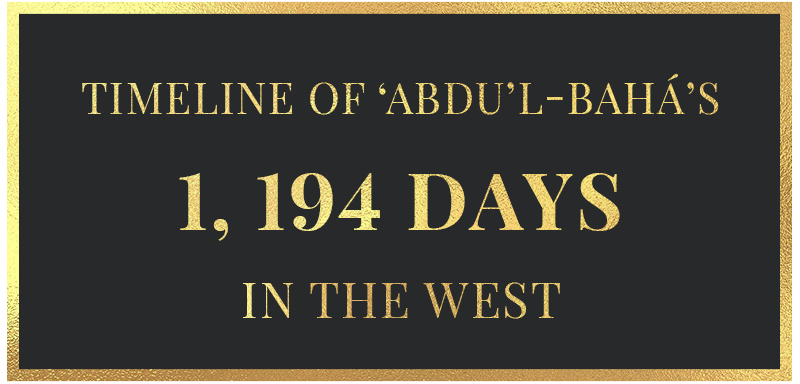
29 August 1910: ‘Abdu'l-Bahá Departs for His Journeys to the West
1 September 1910 (est) - 1 October 1910: Port Said
The date of 1 september 1910 is, we believe a very exact estimate of the date of the arrival of 'Abdu'l-Bahá in Egypt. From a letter of the Universal House of Justice dated 29 August 2010, we know that Abdu’l-Bahá leaves Haifa on 29 August 1910, The steamer journey takes two full days from Haifa to Port Said not counting departure and arrival days, so that would put 'Abdu'l-Bahá's arrival on September 1, 1912. which is corroborated by all the reports of His arrival in Egypt "in September," When 'Abdu'l-Bahá leaves Egypt on 2 December 1913, He arrives in Haifa on 5 December 1913, the same amount of travel time.
1 October 1910 - May 1911: Ramleh and Alexandria
Early May 1911: Cairo
11 August 1911: Alexandria
16 - 20 August 1911: Marseille
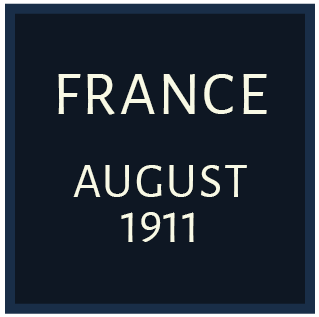
20 - 21 August 1911: Geneva, Switzerland
21 -27 August 1911: Thonon-les-bains
- 27 August 1911: 'Abdu'l-Bahá speaks about The oneness of humanity and of religions in Thonons-les-Bains
27 August 1911: Vevey, Switzerland
27 - 30 August 1911: Thonon-les-bains
30 August - 3 September 1911: Geneva
4 - 9 September 1911: London, England
- 4 September 1911: Notes of Conversations: The Arrival in London
- 5 September 1911: 'Abdu'l-Bahá is interviewed by the editor of The Christian Commonwealth, Mr Albert Dawson, and later meets with the Rev R. J. Campbell
- 8 September 1911: Discourse given at Miss E. J. Rosenberg’s Unity Meeting, in London
- 9 September 1911: The small house and the path to true happiness at the home of Alice Buckton in London
9 September 1911: Byfleet, England
- 9 September 1911: Notes of Conversations: At Byfleet
10 - 22 September: London, England
- 10 September 1911: Address given by ‘Abdu’l-Bahá at the City Temple in London
- 12 September 1911: A Heavenly Meeting: a meeting of the friends at the home of Mrs. Thornburgh-Cropper in London
- 13 September 1911: Discourse at Mrs. Thornburgh-Cropper’s, in London
- 13 September 1911: Persian-English friendship and a brief history: a meeting of the friends at the home of Mrs. Thornburgh-Cropper in London
- 14 September 1911: 'Abdu’l-Bahá sends greetings to the Theosophical Society: a meeting at the office of the Editor-in-chief of the Journal of the Freemasons and Theosophists, in London
- 17 September 1911: Discourse of ‘Abdu’l-Bahá at St. John’s, Westminster in London
- 22 September 1911: Discourse by ‘Abdu’l-Bahá given at the Unity Meeting of Misses Jack and Herrick
23 - 25 September 1911: Bristol, England
- 23-25 September 1911: Notes on Conversations: The visit to Bristol, written by by Tudor Pole
- 23 September 1911: Some of the Experiences of His Forty Years Imprisonment (From an Interview given by ‘Abdu’l-Bahá to the Weekly Budget)
25 September - 3 October 1911: London, England
- 28 September 1911: Notes of Conversations: Spiritual Relationship
28 - 29 September 1911: Vanners, England
29 September - 3 October 1911: London, England
- 29 September 1911: Meeting of Farewell to ‘Abdu’l-Bahá. Reprinted by kind permission, from the Christian Commonwealth, in London
- 29 September 1911: A Message from ‘Abdu’l-Bahá Written for The Christian Commonwealth
- 30 September 1911: Discourse of ‘Abdu’l-Bahá given at the Theosophical Head Quarters
- 1 October 1911: Notes on Conversations: A Bahá’í Wedding, in London
- 2 October 1911: Visit to the Lord Mayor
- 3 October 1911: Eleven essentials: the Bahai principles as taught by Abdu’l-Baha in London
- 3 October 1911: The Farewell
4 October - 2 December 1911: Paris
- 5 October 1911: The Holy Spirit is the source of Life: a talk given at the home of Edith and Margaret Sanderson in Paris
- 16 & 17 October 1911: The Duty of Kindness and Sympathy towards Strangers and Foreigners
- 18 October: The Power and Value of True Thought Depend upon Its Manifestation in Action
- 19 October 1911: God Is the Great Compassionate Physician Who Alone Gives True Healing
- 20 October 1911: The Need for Union between the Peoples of the East and West
- 20 October 1911, in the evening: God Comprehends All; He Cannot Be Comprehended
- 21 October 1911: The Pitiful Causes of War, and the Duty of Everyone to Strive for Peace
- 22 October 1911: The Sun of Truth
- 23 October 1911: The Light of Truth Is Now Shining upon the East and the West
- 24 October 1911: The Universal Love
- 25 October 1911: The Imprisonment of ‘Abdu’l‑Bahá at 4, Avenue de Camoëns
- 26 October 1911: God’s Greatest Gift to Man
- 27 October 1911, in the morning: The Clouds That Obscure the Sun of Truth at 4, Avenue de Camoëns
- 27 October 1911: Religious Prejudices
- 27 October 1911: The Benefits of God to Man at 4, Avenue de Camoëns
- 28 October 1911: Beauty and Harmony in Diversity
- 30 October 1911: The True Meaning of the Prophecies Concerning the Coming of Christ
- 31 October 1911: The Holy Spirit, the Intermediary Power between God and Man at 4, Avenue de Camoëns
- 1 November 1911: The Two Natures in Man
- 2 November 1911: Material and Spiritual Progress
- 3 November 1911: The Evolution of Matter and Development of the Soul
- 4 November 1911: The Spiritual Meetings in Paris
- 5 November 1911: The Two Kinds of Light and Spiritual Aspiration in the West
- 6 November 1911: Lecture Given at a Studio in Paris
- 7 November 1911: Bahá’u’lláh
- 8 November 1911: Good Ideas Must Be Carried into Action
- 9 November 1911: The True Meaning of Baptism by Water and Fire
- 9 November 1911: Discourse at “l’Alliance Spiritualiste”, in the Salle de l’Athénée, St. Germain, Paris
- 10 November 1911: The First Principle—Search after Truth at 4, Avenue de Camoëns
- 10 November 1911: The Evolution of the Spirit
- 11 November 1911: The Second Principle—The Unity of Mankind
- 12 November 1911: The Fourth Principle—The Acceptance of the Relation between Religion and Science at 4, Avenue de Camoëns
- 13 November 1911: The Fifth Principle—The Abolition of Prejudices at 4, Avenue de Camoëns
- No date given: The Sixth Principle—Means of Existence at 4, Avenue de Camoëns
- No date given: The Seventh Principle—Equality of Men
- No date given: The Eighth Principle—Universal Peace at 4, Avenue de Camoëns
- 14 November 1911: The Tenth Principle—Equality of Sex at 4, Avenue de Camoëns
- 15 November 1911: The Desires and Prayers of ‘Abdu’l‑Bahá
- 17 November 1911, in the morning: Concerning Body, Soul and Spirit at 4, Avenue de Camoëns
- 17 November 1911: The Ninth Principle—The Noninterference of Religion with Politics at 4, Avenue de Camoëns
- 18 November 1911: The Eleventh Principle—The Power of the Holy Spirit at 4, Avenue de Camoëns
- 18 November 1911, in the evening: Involvement of the faithful in political life, and showing justice in all walks of life: in the home of Monsieur Dreyfus, Paris
- 19 November 1911: The Bahá’ís Must Work with Heart and Soul to Bring About a Better Condition in the World
- 19 November 1911: Opposition and its beneficial effects
- 20 November 1911: On Calumny
- 21 November 1911: There Can Be No True Happiness and Progress without Spirituality
- 22 November 1911: Pain and Sorrow
- 23 November 1911: The Perfect Human Sentiments and Virtues
- 23 November 1911: The Italian attack on Tripoli, and human heartlessness: a talk given at Abdu’l-Baha’s lodgings in Paris during the war between Italy and Tripoli
- 24 November 1911: The Cruel Indifference of People towards the Suffering of Foreign Races
- 25 November 1911: We Must Not Be Discouraged by the Smallness of Our Numbers
- 26 November 1911: Words Spoken by ‘Abdu’l‑Bahá in Pastor Wagner’s Church (Foyer de l’Ame) in Paris
- No date given: Talk at the Theosophical Society, Paris
- 28 November 1911: This Great and Glorious Cause at 4, Avenue de Camoëns
- 1 December 1911: The Last Meeting at 15 Rue Greuze, Paris
3 - 7 December 1911: Marseille
12 December 1911 - 25 March 1912: Alexandria and Ramleh
28 - 30 March 1912: Naples, Italy
11 - 20 April 1912: New York City
- 11 April 1912: Talk at Home of Mr. and Mrs. Edward B. Kinney - 780 West End Avenue, New York
- 12 April 1912: Talk at Home of Mr. and Mrs. Howard MacNutt - 935 Eastern Parkway, Brooklyn, New York
- 12 April 1912: Talk at Studio of Miss Phillips - 39 West Sixty-seventh Street, New York
- 13 April 1912: Talk at Home of Mr. and Mrs. Alexander Morten - 141 East Twenty-first Street, New York
- 14 April 1912: Talk at Church of the Ascension - Fifth Avenue and Tenth Street, New York
- 14 April 1912: Talk at Union Meeting of Advanced Thought Centers - Carnegie Lyceum, West Fifty-seventh Street, New York
- 15 April 1912: Talk at Home of Mountfort Mills - 327 West End Avenue, New York
- 16 April 1912: Talk at Hotel Ansonia to Bahá’í Friends of New Jersey - Broadway and Seventy-third Street, New York
- 17 April 1912: Talk at Hotel Ansonia - Broadway and Seventy-third Street, New York
- 17 April 1912: Talk at Home of Mr. and Mrs. Edward B. Kinney - (Same as above)
- 18 April 1912: Talk at Home of Mr. and Mrs. Marshall L. Emery - 273 West Ninetieth Street, New York
- 19 April 1912: Talk at Earl Hall - Columbia University, New York
- 19 April 1912: Talk at Bowery Mission - 227 Bowery, New York
20 - 28 April 1912: Washington D.C.
- 20 April 1912: Talk at Orient-Occident-Unity Conference - Public Library Hall, Washington, D.C.
- 21 April 1912: Talk at Studio Hall - 1219 Connecticut Avenue, Washington, D.C.
- 21 April 1912: Talk at Universalist Church - Thirteenth and L Streets, Washington, D.C.
- 22 April 1912: Talk at Home of Mr. and Mrs. Arthur J. Parsons - 1700 Eighteenth Street, NW, Washington, D.C.
- 23 April 1912: Talk at Howard University - Washington, D.C.
- 23 April 1912: Talk at Home of Mr. and Mrs. Arthur J. Parsons - (Same as above)
- 23 April 1912: Talk to Bethel Literary Society - Metropolitan African Methodist Episcopal Church, M Street, NW, Washington, D.C.
- 24 April 1912: Talk at Children’s Reception - Studio Hall, 1219 Connecticut Avenue, Washington, D.C.
- 24 April 1912: Talk at Home of Mr. and Mrs. Arthur J. Parsons - (Same as above)
- 24 April 1912: Talk at Home of Mrs. Andrew J. Dyer - 1937 Thirteenth Street, NW, Washington, D.C.
- 25 April 1912: Talk to Theosophical Society - Home of Mr. and Mrs. Arthur J. Parsons - (Same as above)
- 25 April 1912: Message to Esperantists - Home of Mr. and Mrs. Arthur J. Parsons - (Same as above)
- 25 April 1912: Talk at Home of Mr. and Mrs. Arthur J. Parsons - (Same as above)
29 April - 1 May 1912: Chicago, Illinois
- 30 April 1912: Talk at Public Meeting Concluding Convention of Bahá’í Temple Unity Drill Hall, Masonic Temple, Chicago, Illinois
- 30 April 1912: Talk at Hull House, Chicago, Illinois
- 30 April 1912: Talk at Fourth Annual Conference of the National Association for the Advancement of Colored People at Handel Hall, Chicago, Illinois
1 May 1912: Wilmette, Illinois
- 1 May 1912: Talk at Dedication of the Mashriqu’l-Adhkár Grounds, Wilmette, Illinois
2 - 3 May 1912: Chicago, Illinois
- 2 May 1912: Talk at Hotel Plaza in Chicago, Illinois
- 2 May 1912: Talk to Federation of Women’s Clubs at the Hotel La Salle, Chicago, Illinois
- 2 May 1912: Talk at Bahá’í Women’s Reception at the Hotel La Salle, Chicago, Illinois
- 2 May 1912: Talk at Hotel Plaza in Chicago, Illinois
- 2 May 1912: Talk at Hotel Plaza in Chicago, Illinois
- 3 May 1912: Talk at Hotel Plaza in Chicago, Illinois
- 3 May 1912: Talk at Hotel Plaza in Chicago, Illinois
4 May 1912: Evanston, Illinois
- 4 May 1912: Talk to Theosophical Society at Northwestern University Hall, Evanston, Illinois
5 May 1912: Chicago, Illinois
- 5 May 1912: Talk at Children’s Meeting at the Hotel Plaza in Chicago, Illinois
- 5 May 1912: Talk at Plymouth Congregational Church on 935 East Fiftieth Street in Chicago, Illinois
- 5 May 1912: Talk at All-Souls Church in Lincoln Center, Chicago, Illinois
6 May 1912: Cleveland, Ohio
- 6 May 1912: Talk at Euclid Hall in Cleveland, Ohio
- 6 May 1912: Talk at Sanatorium of Dr. C. M. Swingle in Cleveland, Ohio
7 May 1912: Pittsburgh, Pennsylvania
- 7 may 1912: Talk at Hotel Schenley in Pittsburgh, Pennsylvania
8 May 1912: Washington D.C.
11 May 1912: New York City
- 11 May 1912: Talk at 227 Riverside Drive, New York
12 May 1912: Montclair, New Jersey
- 12 May 1912: Talk at Unity Church in Montclair, New Jersey
12 May 1912: New York City
- 12 May 1912: Talk at Meeting of International Peace Forum at Grace Methodist Episcopal Church, West 104th Street, New York
- 13 May 1912: Talk at Reception by New York Peace Society at the Hotel Astor, New York
14 - 16 May 1912: New Paltz, New York
- 15 May 1912: The Oneness of the Reality of Humankind, address at the Lake Mohonk Conference on International Arbitration
17 - 19 May 1912: New York City
- 19 May 1912: Talk at Church of the Divine Paternity at Central Park West, New York
19 May 1912: Jersey City, New Jersey
- 19 May 1912: Talk at Brotherhood Church at Bergen and Fairview Avenues, Jersey City, New Jersey
20 May 1912: New York City
- 20 May 1912: Talk at Woman’s Suffrage Meeting at the Metropolitan Temple, Seventh Avenue and Fourteenth Street, New York
21 - 22 May 1912: Boston, Massachusetts
- 22 May 1912: Talk at the Tremont Temple at the Unitarian Conference in Boston, Massachusetts
23 May 1912: Cambridge, Massachusetts
- 23 May 1912: Talk at Home of Mr. and Mrs. Francis W. Breed at 367 Harvard Street, Cambridge, Massachusetts
23 May 1912: Worcester, Massachusetts
25 - 26 May 1912: Boston, Massachusetts
- 25 May 1912: Huntington Chambers in Boston, Massachusetts
26 - 30 May 1912: New York City
- 26 May 1912: Talk at Mount Morris Baptist Church on Fifth Avenue and 126th Street, New York
- 28 May 1912: Talk at Reception at Metropolitan Temple on Seventh Avenue and Fourteenth Street, New York
- 29 May 1912: Talk at Home of Mr. and Mrs. Edward B. Kinney at 780 West End Avenue, New York
- 30 May 1912: Talk at Theosophical Lodge on Broadway and Seventy-ninth Street, New York
31 May - 1 June 1912: Fanwood, New Jersey
- 31 may 1912: Talk at Town Hall in Fanwood, New Jersey
2 June 1912: New York City
- 2 June 1912: Talk at Church of the Ascension on Fifth Avenue and Tenth Street, New York
3 June 1912: Milford, Pennsylvania
3 June 1912: Philadelphia, Pennsylvania
5 - 8 June 1912: New York City
- 8 June 1912: Talk at 309 West Seventy-eighth Street, New York
9 June 1912: Philadelphia, Pennsylvania
- 9 June 1912: Talk at Unitarian Church on Fifteenth Street and Girard Avenue, Philadelphia, Pennsylvania
- 9 June 1912: Talk at Baptist Temple on Broad and Berks Streets, Philadelphia, Pennsylvania
10 - 20 June: New York City
- 11 June 1912: Talk at Open Committee Meeting at the home of Mr. and Mrs. Edward B. Kinney, 780 West End Avenue, New York
- 12 June 1912: Talk at 309 West Seventy-eighth Street, New York
- 15 June 1912: Talk at 309 West Seventy-eighth Street, New York
15 - 16 June 1912: Brooklyn, New York
- 16 June 1912: Talk at Fourth Unitarian Church on Beverly Road, Flatbush, Brooklyn, New York
- 16 June 1912: Talk at Home of Mr. and Mrs. Howard MacNutt at 935 Eastern Parkway, Brooklyn, New York
- 16 June 1912: Talk at Central Congregational Church on Hancock Street, Brooklyn, New York
17 - 20 June 1912: New York City
- 17 June 1912: Talk at 309 West Seventy-eighth Street, New York
- 18 June 1912: Talk at 309 West Seventy-eighth Street, New York
- 20 June 1912: Talk at 309 West Seventy-eighth Street, New York
21 – 27 June 1912: Montclair, New Jersey
- 23 June 1912: Talk at Montclair, New Jersey
28 – 29 June 1912: West Englewood, New Jersey (Now called Teaneck)
- 29 June 1912: Talk at Unity Feast, Outdoors in West Englewood, New Jersey
29 June 1912: Morristown, New Jersey
30 June – 13 July 1912: New York City
- 1 July 1912: Talk at 309 West Seventy-eighth Street, New York
- 1 July 1912: Talk at 309 West Seventy-eighth Street, New York (different talk)
- 5 July 1912: Talk at 309 West Seventy-eighth Street, New York
- 5 July 1912: Talk at 309 West Seventy-eighth Street, New York (different talk)
- 6 July 1912: Talk at 309 West Seventy-eighth Street, New York
14 July 1912: Brooklyn, New York
15 - 16 July 1912: West Englewood, New Jersey (Now called Teaneck)
16 - 22 July 1912: New York City
- 14 July 1912: Talk at All Souls Unitarian Church on Fourth Avenue and Twentieth Street, New York
- 15 July 1912: Talk at Home of Dr. and Mrs. Florian Krug at 830 Park Avenue, New York
23 – 25 July 1912: Boston, Massachusetts
- 23 July 1912: Talk at Hotel Victoria in Boston, Massachusetts
- 24 July 1912: Talk to Theosophical Society at The Kensington on Exeter and Boylston Streets, Boston, Massachusetts
- 25 July 1912: Talk at Hotel Victoria in Boston, Massachusetts
25 July – 16 August: Dublin, New Hampshire
- 5 August 1912: Talk at Dublin Inn in Dublin, New Hampshire
- 6 August 1912: Talk at Home of Mr. and Mrs. Arthur J. Parsons in Dublin, New Hampshire
16 – 23 August 1912: Green Acre in Eliot, Maine
- 16 August 1912: Talk at Green Acre in Eliot, Maine
- 17 August 1912: Talk at Green Acre in Eliot, Maine
- 17 August 1912: Talk at Green Acre in Eliot, Maine (different talk)
- 17 August 1912: Talk at Green Acre in Eliot, Maine (different talk)
- 17 August 1912: Talk at Green Acre in Eliot, Maine (different talk)
24 - 29 August 1912: Malden, Massachusetts with talks in Boston, Massachusetts
- 24 August 1912: Arrival in Malden, Massachusetts
- 25 August 1912: Talk at the New Thought Forum at the Metaphysical Club in Boston, Massachusetts
- 26 August 1912: Talk at Franklin Square House in Boston, Massachusetts
- 27 August 1912: Talk at Metaphysical Club in Boston, Massachusetts
- 29 August 1912: Talk at Home of Madame Morey at 34 Hillside Avenue, Malden, Massachusetts
30 August - 9 September 1912: Montreal
- 1 September 1912: Talk at Church of the Messiah in Montreal, Canada
- 1 September 1912: Talk at Home of Mr. and Mrs. William Sutherland Maxwell at 716 Pine Avenue West, Montreal, Canada
- 1 September 1912: Talk at Home of Mr. and Mrs. William Sutherland Maxwell (different talk)
- 2 September 1912: Talk at Home of Mr. and Mrs. William Sutherland Maxwell
- 3 September 1912: ‘Abdu’l‑Bahá’s address to Socialists and Labor leaders in Coronation Hall in Montreal, Canada
- 5 September 1912: Talk at St. James Methodist Church in Montreal, Canada
9 - 12 September 1912: Buffalo, New York
- 10 September 1912: Niagara Falls
12 - 15 September 1912: Chicago, Illinois
15 - 16 September 1912: Kenosha, Wisconsin
16 - 18 September 1912: Chicago, Illinois
- 16 September 1912: Talk at Home of Mrs. Corinne True at 5338 Kenmore Avenue, Chicago, Illinois
19 - 20 September 1912: Minneapolis, Minnesota
- 20 September 1912: Talk at Home of Mr. Albert L. Hall at 2030 Queen Avenue South, Minneapolis, Minnesota
20 September 1912: Saint Paul, Minnesota
- 20 September 1912: Talk at Home of Dr. and Mrs. Clement Woolson at 870 Laurel Avenue, St. Paul, Minnesota
21 - 22 September 1912: Omaha, Nebraska
23 September 1912: Lincoln, Nebraska
24 -27 September 1912: Denver, Colorado
- 24 September 1912: Talk at Home of Mrs. Sidney E. Roberts in Denver, Colorado
- 25 September 1912: Talk at Second Divine Science Church at 3929 West Thirty-eighth Avenue, Denver, Colorado
28 September 1912: Glenwood Springs, Colorado
29 September - 1 October 1912: Salt Lake City, Utah
3 - 7 October 1912: San Francisco, California
7 October 1912: Oakland, California
- 7 October 1912: Talk to Japanese Young Men’s Christian Association at the Japanese Independent Church, Oakland, California
8 October 1912: Palo Alto, California
- 8 October 1912: Talk at Leland Stanford Junior University in Palo Alto, California
10 - 12 October 1912: San Francisco, California
- 10 October 1912: Talk at Open Forum in San Francisco, California
- 12 October 1912: Talk at Temple Emmanu-El at 450 Sutter Street, San Francisco, California
13 -16 October 1912: Pleasanton, California
16 -18 October 1912: San Francisco, California
18 -19 October 1912: Los Angeles, California
19 October 1912: Inglewood, California
19 - 21 October 1912: Los Angeles, California
21 -25 October 1912: San Francisco, California
25 -27 October 1912: Sacramento, California
- 25 October 1912: Talk at Hotel Sacramento in Sacramento, California
- 26 October 1912: Talk at Assembly Hall, Hotel Sacramento in Sacramento, California
28 October 1912: Salt Lake City, Utah
29 October 1912: Denver, Colorado
31 October - 4 November 1912: Chicago, Illinois
- 31 October 1912: Talk at Hotel Plaza in Chicago, Illinois
- 1 November 1912: Talk at Home of Mrs. Corinne True at 5338 Kenmore Avenue, Chicago, Illinois
4 - 5 November 1912: Cincinnati, Ohio
- 5 November 1912: Talk at Grand Hotel in Cincinnati, Ohio
6 - 11 November 1912: Washington, D.C.
- 6 November 1912: Talk at Universalist Church at Thirteenth and L Streets, NW, Washington, D.C.
- 7 November 1912: Talk at Home of Mr. and Mrs. Arthur J. Parsons at 1700 Eighteenth Street, NW, Washington, D. C.
- 8 November 1912: Talk at Eighth Street Temple, Synagogue in Washington, D. C.
- 9 November 1912: Talk at Home of Mr. and Mrs. Arthur J. Parsons
- 9 November 1912: Talk at Home of Mr. and Mrs. Arthur J. Parsons (different talk)
- 9 November 1912: Talk at Bahá’í Banquet at Rauscher’s Hall, Washington, D. C.
- 10 November 1912: Talk at Home of Mr. and Mrs. Arthur J. Parsons
- 10 November 1912: Talk at Home of Mr. and Mrs. Joseph H. Hannen at 1252 Eighth Street, NW, Washington, D. C.
- 10 November 1912: Talk at 1901 Eighteenth Street, NW, Washington, D. C.
11 November 1912: Baltimore, Maryland
12 - 23 November 1912: New York City
- 15 November 1912: Talk at Home of Miss Juliet Thompson at 48 West Tenth Street, New York
- 16 November 1912: Talk at 309 West Seventy-eighth Street in New York City
- 17 November 1912: Talk at Genealogical Hall at 252 West Fifty-eighth Street, New York
- 18 November 1912: Talk at Home of Mr. and Mrs. Frank K. Moxey at 575 Riverside Drive, New York
23 November 1912: Montclair, New Jersey
23 November - 5 December 1912: New York City
- 23 November 1912: Talk at Banquet at the Great Northern Hotel on 118 West Fifty-seventh Street, New York
- 29 November 1912: Talk at Home of Mr. and Mrs. Edward B. Kinney at 780 West End Avenue, New York
- 2 December 1912: Talk at Home of Mr. and Mrs. Edward B. Kinney
- 2 December 1912: Talk at Home of Mr. and Mrs. Edward B. Kinney (different talk)
- 3 December 1912: Talk at Home of Dr. and Mrs. Florian Krug at 830 Park Avenue, New York
- 3 December 1912: Talk to Mr. Kinney’s Bible Class at 780 West End Avenue, New York
- 3 December 1912: Talk at Home of Mr. and Mrs. Edward B. Kinney
- 4 December 1912: Talk to Theosophical Society at 2228 Broadway, New York
- 5 December 1912: Talk on Day of Departure On Board Steamship Celtic, New York
13 - 16 December 1912: Liverpool, England
- 13 December 1912: 'Abdu'l-Bahá arrives in Liverpool on the Celtic and stays and the Adelphi Hotel
- 14 December 1912: 'Abdu'l-Bahá addresses the Theosophical Society, Liverpool at 8.00pm
- 15 December 1912: 'Abdu'l-Bahá addresses the congregation at Pembroke Chapel Baptist Church.
- 16 December 1912: 'Abdu'l-Bahá travels to London by train
16 - 31 December 1912: London, England
- 17 December 1912: 'Abdu'l-Bahá attends a a large reception held in at Caxton Hall, at that time Town Hall for the City of Westminster,
- 18 December 1912: In the morning, 'Abdu'l-Bahá gives a talk at 97 Cadogan Gardens on ‘The Spiritual Worlds’.
- 20 December 1912: 'Abdu'l-Bahá speaks at the Westminster Palace Hotel
- 26 December 1912: 'Abdu'l-Bahá answers questions from guests gathered at 97 Cadogan Gardens, including:
- 27 December 1912: Lady Blomfield held a reception, and 'Abdu'l-Bahá speaks of the meeting of the East and the West
- 29 December 1912: King's Weigh House Chapel in London: an evening meeting at the King’s Weighhouse Congregational Church at the corner of Weighhouse Street and Duke Street, London
31 December 1912: Oxford, England
- 31 December 1912: 'Abdu'l-Bahá visits Oxford to address a meeting at Manchester College
1 - 6 January 1913: London, England
- 1 January 1913: 'Abdu'l-Bahá addresses the friends gathered at Lady Blomfield, home at 97 Cadogan Gardens
- 2 January 1913: In the evening, 'Abdu'l-Bahá addressed The Women’s Freedom League at Essex Hall.
- 4 January 1913: 'Abdu'l-Bahá gives a talk on "The Four Kinds of Love" at Lady Blomfield, home at 97 Cadogan Gardens
- 5 January 1913: Despite not feeling well, 'Abdu'l-Bahá speaks at a meeting organised by Elizabeth Herrick in the evening
- 6 January 1913: 'Abdu'l-Bahá travels to Edinburgh by train
6 - 10 January 1913: Edinburgh, Scotland
- 7 January 1913: 'Abdu'l-Bahá addresses the Esperanto Society in Edinburgh
- 8 January 1913: 'Abdu'l-Bahá gives a talk in the afternoon
- 9 January 1913: 'Abdu'l-Bahá speaks at the Manse in the afternoon
- 9 January 1913: 'Abdu'l-Bahá addresses the Theosophical Society at 28 Great King Street in the evening
- 10 January 1913: 'Abdu'l-Bahá leaves Edinburgh for London, by train
10 - 15 January 1913: London, England
- 11 January 1913: 'Abdu'l-Bahá addresses a meeting at Caxton Hall in London
- 12 January 1913: 'Abdu'l-Bahá addresses a Quaker meeting at the Friends’ Meeting House, St. Martin’s Lane, London, W.C.
- 12 January 1913: 'Abdu'l-Bahá addresses the New Congregational Church in Woolwich in the evening
- 13 January 1913: 'Abdu'l-Bahá addresses the Peace Society at Caxton Hall
- 15 January 1913: 'Abdu'l-Bahá travels to Bristol by train
15 - 16 January 1913: Bristol, England
- 15 January 1913: 'Abdu'l-Bahá arrives in Bristol and stays at Major Tudor Pole's House, the Clifton Guest House
- 16 January 1913: 'Abdu'l-Bahá returns to London by train
16 -17 January 1913: London, England
- 16 January 1913: 'Abdu'l-Bahá addresses an audience at Lady Blomfield's home at 97 Cadogan Gardens in the afternoon
17 January 1913: Woking, England
- 17 January 1913: 'Abdu'l-Bahá visits a mosque in Woking, England
18 - 21 January 1913: London, England
- 19 January 1913: 'Abdu'l-Bahá addresses members of the ‘Higher Thought’ movement in London
- 21 January 1913: 'Abdu'l-Bahá leaves England for France from Victoria Station
21 January - 1 April 1913: Paris, France
- 12 February 1913: ʻAbdu’l-Bahá addresses the Paris Esperanto Group at a special banquet in His honor
- 13 February 1913: ʻAbdu’l-Bahá gives an address on the various forms of life, the outpourings of divine grace, and the momentousness of this age at the headquarters of the Theosophical Society of France
- 21 February 1913: ʻAbdu’l-Bahá gives an address to the Alliance Spiritualiste on peace, unity, and human brotherhood at the hall of the Union Chrétienne de Jeunes Gens, the French name for the YMCA
- 31 March 1913: ʻAbdu’l-Bahá leaves France for Germany
1 - 4 April 1913: Stuttgart, Germany
- 1 April 1913: ʻAbdu’l-Bahá arrives by train from France
- 3 April 1913: ʻAbdu’l-Bahá speaks at the Bürgermuseum (the People's Museum) in Stuttgart
4 April 1913: Esslingen, Germany
- 4 April 1913: ʻAbdu’l-Bahá attends and speaks at a children's party organized by the Bahá'í friends in Esslingen
4 - 7 April 1913: Stuttgart, Germany
- 6 April 1913: ʻAbdu’l-Bahá speaks at the Oberen Museum (the Upper Museum) in Stuttgart
7 April 1913: Bad Mergentheim
- 7 April 1913: ʻAbdu’l-Bahá travels to Bad Mergentheim where he visits the Kurhaus and the Kurpark
7 - 8 April 1913: Stuttgart, Germany
- 8 April 1913: ʻAbdu’l-Bahá leaves Stuttgart by train for Budapest, Hungary
8 April 1913: Vienna, Austria
- 8 April 1913: ʻAbdu’l-Bahá speaks to a group of Bahá'ís in Vienna, Austria while changing trains en route to Budapest, Hungary
9 - 18 April 1913: Budapest, Hungary
- 9 APril 1913: 'Abdu'l-Bahá arrives in Budapest, Hungary by train and stays at the Hotel Ritz
- 10 April 1913: ʻAbdu’l-Bahá gives a talk about the the nature of divine and material civilization to a meeting of the Theosophists
- 11 April 1913: Utterly fatigued, ʻAbdu’l-Bahá nonetheless gives a talk at the Parliament Hall on the oneness of humanity
- 11 April 1913: ʻAbdu’l-Bahá gives a talk on the "Qualities of the Great Educator" to a large delegation of Theosophists in the Hotel Ritz
- 12 April 1913: ʻAbdu’l-Bahá speaks to a meeting of the Theosophical Society on the life of Bahá'u'lláh
- 14 April 1913: ʻAbdu’l-Bahá is invited by Alajos Paikert, one of the leaders of the Turanian Society, to give a talk at the Hungarian National Museum, Múzeum krt. 14-16
- 18 April 1913: ʻAbdu’l-Bahá leaves Budapest for Vienna, Austria by train
18 -24 April 1913: Vienna, Austria
- 19 April 1913: ʻAbdu’l-Bahá speaks at a gathering of Theosophists held at the home of Professor Lajos Thern
- 21 April 1913: ʻAbdu’l-Bahá speaks at the Theosophical Society lodge, where He discusses the divine verses, the complete bonds that exist between all things, and other subjects
- 22 April 1913: ʻAbdu’l-Bahá returns to the Theosophical Society lodge to give another talk on the teachings of Baháʼuʼlláh
- 24 April 1913: ʻAbdu’l-Bahá leaves Vienna by train to return to Stuttgart, Germany
24 - 30 April 1913: Stuttgart, Germany
- 24 April 1913: ʻAbdu’l-Bahá arrives in Stuttgart by train from Vienna, Austria
- 25 April 1913: ʻAbdu’l-Bahá speaks at the Bürgermuseum (the People's museum), for a second time, in Stuttgart
30 April 1913: Bebenhausen, Germany
- 30 April 1913: ʻAbdu’l-Bahá visits the royal hunting lodge in the village of Bebenhausen, near Tübingen
30 April - 1 May 1913: Stuttgart, Germany
- 1 May 1913: ʻAbdu’l-Bahá addresses the assembled friends who arrive at the train station to bid Him farewell as He leaves to Paris, France by train
2 May - 12 June 1913: Paris, France
- 23 May 1913: After an eventful day, 'Abdu'l-Bahá gives a talk on the advents of the Báb and Baháʼuʼlláh
- 6 June 1913: Ahmed Izzet Pasha, the former Grand Vizier of the Ottoman Empire, gives a dinner party in honor of ‘Abdu’l-Bahá
- 12 June 1913: 'Abdu'l-Bahá leaves Paris for Marseilles, France
12 to 13 June 1913: Marseille, France
- 12 June 1913: 'Abdu'l-Bahá arrives in Marseille by train
- 13 June 1913: 'Abdu'l-Bahá leaves Marseille by steamer on the Himalaya for Port Said
17 June - 11 July 1913: Port Said
- 17 June 1913: 'Abdu'l-Bahá arrives in Port Said on the Himalaya
11 - 17 July 1913: Ismáʻílíyyih
17 July - 13 October 1913: Ramleh, Alexandria
13 - 15 October 1913: Abú qír, Alexandria
15 - 22 October 1913: Ramleh, Alexandria
22 October - 8 November 1913: Alexandria
8 - 16 November 1913: Port Said
- 8 November 1913: 'Abdu'l-Bahá travels by steamer on the SS Jerusalem to Port Said
17 November - 2 December 1913: Ramleh, Alexandria
- 2 December 1913: 'Abdu'l-Bahá starts His voyage home, by boarding the steamer Baron Call to Port Said
2 - 3 December 1913: Port Said
- 2 December 1913: 'Abdu'l-Bahá arrives in Port Said
- 3 December 1913: 'Abdu'l-Bahá leaves Port Said in the evening, aboard the SS Baron Call, headed for Jaffa.
5 December 1913: ‘Abdu'l-Bahá returns from His Journeys to the West
References for Part VI
Naples, Italy 26 – 27 March 1912
28 March 1912 – ABOARD THE CEDRIC – ‘Abdu’l-Bahá arrives in Naples: Rabbání, Rúḥíyyih.The Priceless Pearl, Chapter 1, Balyuzi, H.M. ‘Abdu’l-Bahá: The Centre of the Covenant of Bahá’u’lláh pages 171-172, Redman, Earl. ‘Abdu’l-Baha in Their Midst, Kindle Edition, and Mahmúd-i-Zarqání, Mírzá. Mahmúd’s Diary Chronicling ʻAbdu’l-Bahá’s Journey to America
29 March 1912 – ABOARD THE CEDRIC – Shoghi Effendi is cruelly and unjustly turned back: Rabbání, Rúḥíyyih.The Priceless Pearl, Chapter 1, Balyuzi, H.M. ‘Abdu’l-Bahá: The Centre of the Covenant of Bahá’u’lláh pages 171-172, Redman, Earl. ‘Abdu’l-Baha in Their Midst, Kindle Edition, and Mahmúd-i-Zarqání, Mírzá. Mahmúd’s Diary Chronicling ʻAbdu’l-Bahá’s Journey to America
30 March 1912 – A saddened Grandfather and a brokenhearted grandson: Rabbání, Rúḥíyyih.The Priceless Pearl, Chapter 1, Balyuzi, H.M. ‘Abdu’l-Bahá: The Centre of the Covenant of Bahá’u’lláh pages 171-172, Redman, Earl. ‘Abdu’l-Baha in Their Midst, Kindle Edition, and Mahmúd-i-Zarqání, Mírzá. Mahmúd’s Diary Chronicling ʻAbdu’l-Bahá’s Journey to America
30 March – 11 April 1912 – ABOARD THE CEDRIC: Bahaipedia: Mírzá Mahmúd-i-Zarqání
The United States April – August 1912
11 April 1912 – NEW YORK CITY – ‘Abdu’l-Bahá and the Statue of Liberty: Ward, Allan L. 239 Days; ʻAbdu’l-Bahá’s Journey in America, pages 13-14.
11 & 12 April 1912 – Coast-to-coast newspaper headlines announce ‘Abdu’l-Bahá’s arrival:
14 April 1912 – NEW YORK CITY – ‘Abdu’l-Bahá’s first public address in the United States:
19 April 1912 – NEW YORK CITY – Khalil Gibran and ‘Abdu’l-Bahá: Thompson, Juliet. Juliet Remembers Gibran: As told to Marzieh Gail, Bahá’í World News Service: ‘Abdu’l-Baha’s legacy to Egypt recalled, 100 years on, Thompson, Juliet and Marzieh Gail. The Diary of Juliet Thompson, Redman, Earl. ‘Abdu’l-Baha in Their Midst, Kindle Edition
19 April 1912 – NEW YORK CITY – The visit to the Bowery: Redman, Earl. ‘Abdu’l-Baha in Their Midst, Kindle Edition, 239 Days: Day 9 – “Isn’t that the Woman of It?”, Thompson, Juliet and Marzieh Gail. The Diary of Juliet Thompson,
25 April 1912 – WASHINGTON, D.C. – Louis Gregory at the Luncheon: Redman, Earl. ‘Abdu’l-Baha in Their Midst, Kindle Edition
1 May 1912 – WILMETTE – The dedication of the Temple: ‘Abdu’l-Bahá in America: 1912-2021: Corinne True with ‘Abdu’l-Bahá at Temple Site Dedication, Bahaipedia: Corinne True, and Honnold, Annamarie, Vignettes from the Life of ‘Abdu’l-Bahá, p. 42
5 May 1912 – CHICAGO – ‘Abdu’l-Bahá Speaking at Plymouth Congregational Church: Mahmúd-i-Zarqání, Mírzá. Mahmúd’s Diary Chronicling ʻAbdu’l-Bahá’s Journey to America
14 May 1912 – NEW PALTZ – Lake Mohonk Conference on International Arbitration: Mahmúd-i-Zarqání, Mírzá. Mahmúd’s Diary Chronicling ʻAbdu’l-Bahá’s Journey to America
18 June 1912 – BROOKLYN – The filming of ‘Abdu’l-Bahá: A beautiful story of perspective: Lacroix-Hopson, Eliane. ‘Abdu’l-Bahá in New York: The City of the Covenant and Star of the West, Volume III, Number 10 (September 8, 1912), pages 209-210.
19 June 1912 – NEW YORK – ‘Abdu’l-Bahá names New York, the City of the Covenant and proclaims His station as Center of the Covenant: Balyuzi, H.M. ‘Abdu’l-Bahá: The Centre of the Covenant of Bahá’u’lláh page 220, Thompson, Juliet and Marzieh Gail. The Diary of Juliet Thompson and Lacroix-Hopson, Eliane. ‘Abdu’l-Bahá in New York: The City of the Covenant
29 June 1912 – WEST ENGLEWOOD (TEANECK) – The Unity Feast: Star of the West, Volume III, Number 8, pages 16-18, Mahmúd-i-Zarqání, Mírzá. Mahmúd’s Diary Chronicling ʻAbdu’l-Bahá’s Journey to America
and Thompson, Juliet and Marzieh Gail. The Diary of Juliet Thompson
16 – 23 August 1912 – ELIOT – ‘Abdu’l-Bahá in Green Acre: Mahmúd-i-Zarqání, Mírzá. Mahmúd’s Diary Chronicling ʻAbdu’l-Bahá’s Journey to America
20 August 1912 – ELIOT – Fred Mortensen and ‘Abdu’l-Bahá: Penoyer, Justin. Fred Mortensen and Wikipedia: Freighthopping, Mahmúd-i-Zarqání, Mírzá. Mahmúd’s Diary Chronicling ʻAbdu’l-Bahá’s Journey to America, Mortensen, Fred: “When a Soul Meets the Master” Star of the West, Volume XIV, number 12 (March 1924), pages 365-367
Canada 1912
1548 Pine Ave, Montreal: The only Bahá’í Shrine in America: Slideshare: ‘Abdu’l-Bahá in Canada, ‘Slideserve: Abdu’l-Bahá’s Journey to Canada, Baha’i Stories: Mahmúd-i-Zarqání, Mírzá. Mahmúd’s Diary Chronicling ʻAbdu’l-Bahá’s Journey to America, Montreal Bahá’í Community: ‘Abdul-Bahá’s visit; Bahá’ís of Canada: Visit of ‘Abdu’l-Bahá to Canada;
‘Abdu’l-Bahá’s stay in Montreal: Jack McLean, Abdu’l-Baha in Montreal, Mahmúd-i-Zarqání, Mírzá. Mahmúd’s Diary Chronicling ʻAbdu’l-Bahá’s Journey to America, Redman, Earl. ‘Abdu’l-Baha in Their Midst, Kindle Edition, Bahá’ís of Canada: Visit of ‘Abdu’l-Bahá to Canada
East and West: ‘Abdu’l-Bahá and the Maxwells: The story of how Abdu’l-Bahá blessed May and Sutherland Maxwell with a child – Mary (Ruhiyyih Khanum), Redman, Earl. Visiting ‘Abdu’l-Baha Vol 2: Volume 2: The Final Years, 1913–1921, Nakhjavani, Violette. The Maxwells of Montreal: Early Years 1870–1922; Bahá’ís of Canada: Canadian Origins: May Maxwell (1870–1940); Shoghi Effendi: This Decisive Hour
The United States September – December 1912
September 1912 – OSHAWA – The boy on the fence: Montreal Bahá’í Community: ‘Abdu’l-Bahá and the First Nations of Canada
8 October 1912 – PALO ALTO – ‘Abdu’l-Bahá speaks at Stanford University: Redman, Earl. ‘Abdu’l-Baha in Their Midst, Kindle Edition, Mahmúd-i-Zarqání, Mírzá. Mahmúd’s Diary Chronicling ʻAbdu’l-Bahá’s Journey to America and ‘Abdu’l-Bahá in America: Palo Alto.
12 October 1912 – SAN FRANCISCO – ‘Abdu’l-Bahá at Templel Emmanu-El: Redman, Earl. ‘Abdu’l-Baha in Their Midst, Kindle Edition, Mahmúd-i-Zarqání, Mírzá. Mahmúd’s Diary Chronicling ʻAbdu’l-Bahá’s Journey to America. ‘Abdu’l-Bahá in America: Persian Heard at Temple Emanu-El and : ‘Abdu’l-Bahá in America: Temple Emanu-El in San Francisco
19 October 1912- INGLEWOOD – ‘Abdu’l-Bahá visits the grave of Thornton Chase: Some Early Believers in the West: A transcript of audio-cassette from series “”Windows to the Past” by Grace L. Shahrokh and Mahmúd-i-Zarqání, Mírzá. Mahmúd’s Diary Chronicling ʻAbdu’l-Bahá’s Journey to America
‘Abdu’l-Bahá’s universal constant kindness and attention to service staff everywhere
❈ Montreal, 1 September 1912: Honnold, Annamarie, Vignettes from the Life of ‘Abdu’l-Bahá, p. 82
❈Buffalo, 12 September 1912: Mahmúd-i-Zarqání, Mírzá. Mahmúd’s Diary Chronicling ʻAbdu’l-Bahá’s Journey to America
❈ Glenwood Springs, 26 September 1912: Redman, Earl. ‘Abdu’l-Baha in Their Midst, Kindle Edition
❈ San Francisco, 1 October 1912: Ward, Allan L. 239 Days; ʻAbdu’l-Bahá’s Journey in America, pages 13-14.
❈ Pleasanton, 16 October 1912: Mahmúd-i-Zarqání, Mírzá. Mahmúd’s Diary Chronicling ʻAbdu’l-Bahá’s Journey to America
❈ Sacramento, 26 October 1912: ‘Abdu’l-Bahá in America: Sacramento
❈ New York, 15 April 1912: The Bahá’í World Volume XII, Page 920
❈ New York, 16 April 1912: Thompson, Juliet and Marzieh Gail. The Diary of Juliet Thompson
❈ New York, 18 April 1912 (later): Thompson, Juliet and Marzieh Gail. The Diary of Juliet Thompson
❈ Edinburgh, 10 January 1913: Redman, Earl. ‘Abdu’l-Baha in Their Midst, Kindle Edition
5 December 1912 – Farewell to America: Mahmúd-i-Zarqání, Mírzá. Mahmúd’s Diary Chronicling ʻAbdu’l-Bahá’s Journey to America, Redman, Earl. ‘Abdu’l-Baha in Their Midst, Kindle Edition, Ward, Allan L. 239 Days; ʻAbdu’l-Bahá’s Journey in America, page 208.
![]()
